
Project Gutenberg's Little Wideawake, by Lucy Elizabeth Drummond Sale-Barker
This eBook is for the use of anyone anywhere in the United States and most
other parts of the world at no cost and with almost no restrictions
whatsoever. You may copy it, give it away or re-use it under the terms of
the Project Gutenberg License included with this eBook or online at
www.gutenberg.org. If you are not located in the United States, you'll have
to check the laws of the country where you are located before using this ebook.
Title: Little Wideawake
A story book for little children
Author: Lucy Elizabeth Drummond Sale-Barker
Release Date: January 25, 2017 [EBook #54050]
Language: English
Character set encoding: UTF-8
*** START OF THIS PROJECT GUTENBERG EBOOK LITTLE WIDEAWAKE ***
Produced by Delphine Lettau, Stephen Hutcheson, and the
Online Distributed Proofreading Team at http://www.pgdp.net

BY
MRS. SALE BARKER
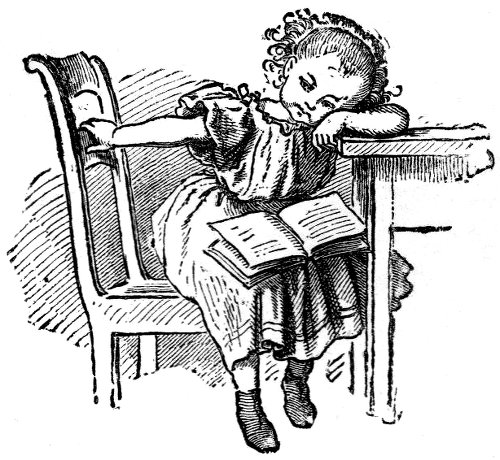
WITH FOUR HUNDRED ILLUSTRATIONS
LONDON AND NEW YORK
GEORGE ROUTLEDGE AND SONS
1877
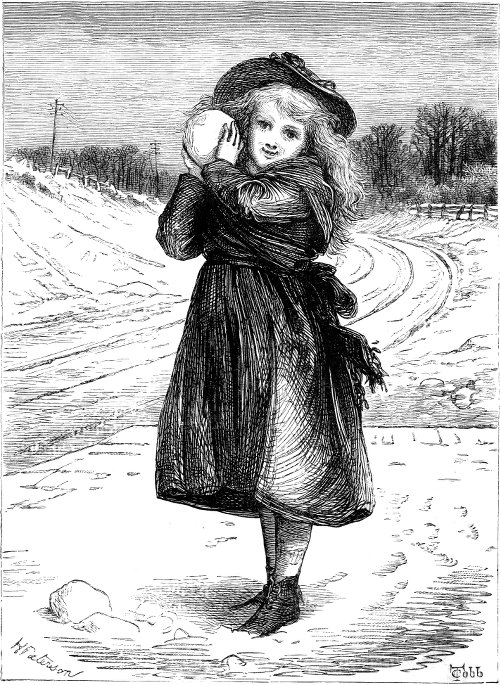

Rosie is the name of the little girl whose picture you see on the first page, with a snowball in her hands. Of course her name is Rosa really, but somehow we always call her Rosie. Has she not a bright, pretty, laughing little face, with her blue eyes, and fair hair? She is a fine strong little maiden into the bargain; a trifle wilful, perhaps, and a good deal of a romp.
Last Christmas I was staying at Cranley Grange—Rosie’s home in the country,—when one morning at breakfast her mamma said to me—“Charlie is coming home to-day; I can’t go to meet him, my cough is so bad. I wonder if you would mind driving down to the station, and taking Rosie and Frank?”
Charlie, who was the eldest son, and a great favourite of mine, was coming home for his Christmas holidays. He was about fourteen years old, while Rosie was only ten, and Frank two years younger.
I said I should be delighted to go, thinking what a pleasant drive it would be with those merry laughing children. Little did I anticipate the trial to my nerves, and the succession of frights, that were in store for me.
We were soon seated in the open wagonette, and off we started. Though I should not say seated, for the children scarcely sat down at all: they kept jumping up, changing places, pushing each other, and playing all sorts of pranks. I was in an agony of fear lest they should tumble out; and during the whole drive, I sat with my arms extended, clutching hold, sometimes of one, sometimes of the other, to save them. This was fright number one.
At last we arrived at the station;—the children still in uproarious spirits, though with cherry noses, as well as rosy cheeks, from the cold. I must tell you that there was snow upon the ground; and as, unluckily, we had ten minutes to wait for the train, they began to amuse themselves by snowballing each other. Frank set the example, and they found it such fun that I scolded, and begged them to be quiet, in vain. At last I observed Rosie standing quite at the end of the platform, where the snow was thicker, and she had collected a large snowball, which she held up in her hands. As I looked at her, and thought what a pretty picture she made, I noticed, in the landscape behind her, a little puff of white smoke. It was the approaching train, at a distance of not more than half a mile. I thought her position, at the extremity of the platform, and just at the edge too, terribly dangerous. And this may be called—fright number two.
I had just opened my lips to call out to her that the train was coming, when a whole handful of snow came dab into my face, filling my mouth and eyes. It was that little rogue Frank, who had crept close up to me, and playfully bestowed upon my face the snow he had been collecting. Recovering from the shock, I looked out again for Rosie. She was no longer in the same place; but, quite beyond the platform, and close upon the rails, I saw her kneeling down in the snow. I screamed with all my might, and a railway porter ran to her, whisked her up in his arms, and brought her safely on to the platform again. This was fright number three; and never, I think, before or since, have I been so much frightened as I was for the moment.
Directly afterwards the train stopped, and Charlie jumped out. When he heard of Rosie’s danger, he scolded her as if he had been a little grandfather, and his words seemed to have much more weight than mine. I now observed that Rosie had a tiny white rabbit in her arms, and she told us that this was what she was picking up out of the snow upon the rails. She thought it was quite excuse 4 enough for herself when she said:—“Only think, Charlie dear, haven’t I saved the life of this pretty little rabbit?”
On the way home, Charlie sat in front and drove, with the coachman beside him; but he contrived now and then to turn his head a little, and keep up his lecture to his brother and sister about their riotous behaviour all the way. Meanwhile I sat quiet, rather humbled at observing how much more respect they showed for the scolding they got from their big brother than for mine. But of one thing I am certain: nothing would ever induce me to take charge of those two lively young people on an expedition of the kind again.

The snow’s on the ground,
And the cold’s in the air;
There is nothing to eat,
And the branches are bare:
Tweet, tweet, tweet!
Open the window,
Kind lady, we pray;
Bestow a few crumbs
Upon us to-day:
Tweet, tweet, tweet!
You’ve flannel and furs
To keep yourself warm;
You are not obliged
To be out in the storm:
Tweet, tweet, tweet!
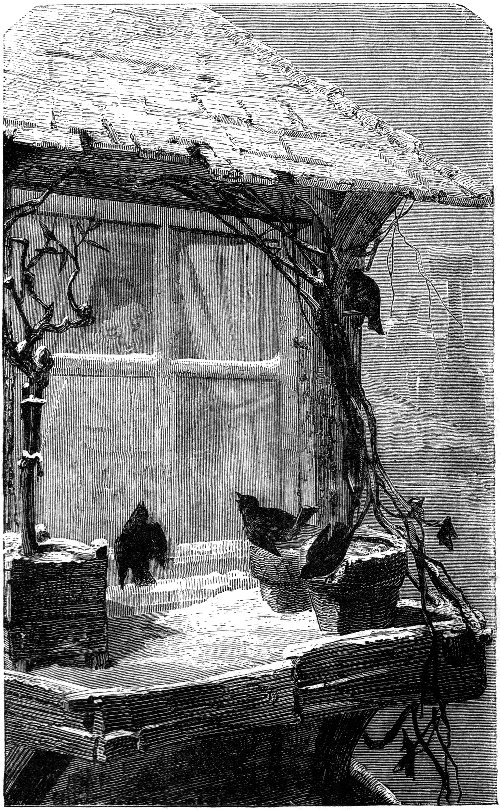
We’ve only our feathers
For bonnet and dress;
We’re cold and we’re hungry,
We freely confess:
Tweet, tweet, tweet!
Then feed us while winter
Spreads snow o’er the plain,
And we’ll sing you our songs
When it’s summer again:
Tweet, tweet, tweet!
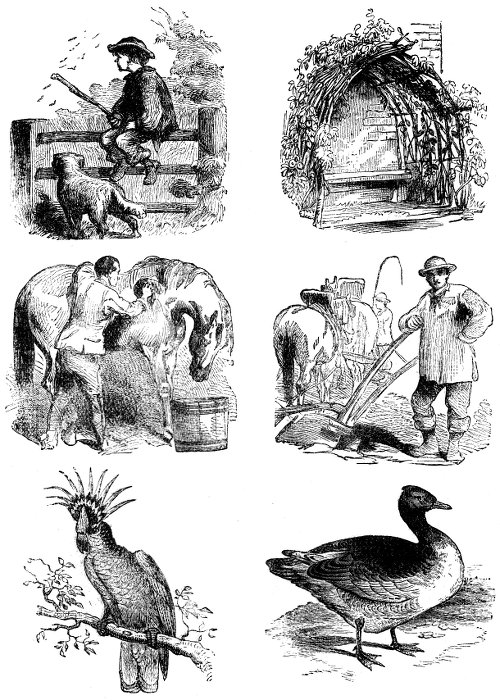
Now here is a puzzle page for you to find out. One object begins with A, one with B, one with C, one with G, one with O, and one with P.

There stood once, in the good old time—that is to say some fifteen years ago, which we may call ages for you, my little readers, who have not yet lost your pretty first teeth;—there stood, then, once, in a delightful valley, between Long-Pont and Savigny, in France, a charming country house, surrounded by a wood, which spread along the bank of a little winding river.
The house of which I speak was called a chateau—that is, a castle—by the peasants of the neighbourhood. To tell the truth, however, it was only a moderate-sized house; but it was kept in excellent order, although a very old building. In spite of its age, therefore, it wore a smiling aspect, like the faces of those amiable and good grandmammas, who smile at your pretty ways, my children.
Let us go in: I wish to make you acquainted with a little companion, whom I hope you will love very much. There he is with his mamma in the drawing-room, where the window, opening to the ground, shows us a garden beyond. At this moment he is repeating a fable to his mother. It is one which teaches that pride is a great fault; that we ought not to assume airs of superiority towards the unhappy and humble, nor endeavour to excite envy in their hearts; and that Providence, moreover, 8 takes upon itself sometimes to punish those who do so. This fable, as you have already guessed perhaps, is called—“The Oak and the Reed.”
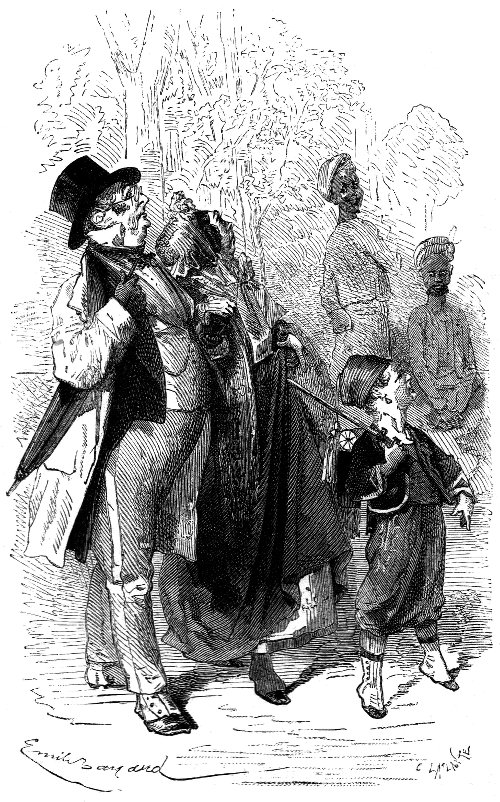
THOSE OF MY READERS WHO ARE ACCUSTOMED TO BE DRESSED UP AS SOLDIERS—TURCOS OR ZOUAVES.
My little friend’s attention from the first has been about equally divided between the fable he is repeating and a beautiful wooden horse, which stands fastened by the bridle to a tree in the garden: but before the fable is finished, it is evident that his thoughts are altogether taken up by the horse. It is a pity; because, not attending to the punishment of the oak, he will lose the moral of the fable. But let us not be more severe on him than his mamma, who does not seem much distressed about the matter. Besides, who can keep the thoughts from wandering sometimes, particularly during study?
This little boy’s name is Maurice; a nice soft-sounding name, I think; and he is five and a half years old. I am not going to say, like some mammas I know,—“This is the most beautiful child in the world, and has fair curly hair, great blue eyes, and little rosy lips.” No! In our hearts we—that is, his relations and friends—all considered little Maurice to be Nature’s masterpiece, but I won’t describe his beauty in detail; and only say that he had chestnut hair and an intelligent face.
Those of my young readers who are accustomed to be dressed up as soldiers—Turcos or Zouaves; or, if they are girls, to be clothed in silk and velvet, would no doubt like to know how my little friend was dressed. Well then, his mamma did not let him wear such fine clothes as would interfere with his exercise or his games. Perhaps some of my elegantly dressed little readers would not care to play with him when they hear that he wore neither velvet nor fur, nor even a feather in his cap; but had simply a jacket and trowsers, made of linen in summer, and of warm cloth in winter. For all that, however, he was a good little boy, and well brought up.
Directly he had repeated the last verse of the fable—which he did without thinking at all of its meaning—Maurice bounded off from the drawing-room into the garden. In a moment he had unfastened the horse, and placing his foot in the stirrup, had sprung on its back. 10 Then he called out: “Gee-up, Cressida! gee-up, my friend!”
Cressida, after shaking its head and flowing mane, started off at a gallop, putting out its legs in the most graceful way imaginable. Because I have said that Cressida was a wooden horse, you picture it to yourselves perhaps as resembling other wooden horses that you have seen,—pretty toy horses, no doubt: but either they have been only rocking-horses, or they have just moved a little means of some mechanism which does not produce the real action of a horse. Cressida was like none of these; but lifted up its legs one after the other with the grace and elegance of a thoroughbred English horse.
Yes, certainly, for a horse made of wood, it was very wonderful. It had a curving neck, a long black tail. The muscles were marked, as you see in well-bred horses; the chest was powerful, the head small, the ears delicate, the eyes full of fire, and the skin was soft and glossy. Add to all this that every time you stroked Cressida on the neck it neighed joyously, and it obeyed the bridle like the most docile Arab horse.
It had many other precious qualities; but were I to tell you all, this book would not contain the description: I should be obliged to make a second volume. I will only add, therefore, that this wonderful horse could remain without food or drink for any length of time that circumstances might render convenient.
Unfortunately I can give no precise details concerning the birth, education, or infantine peculiarities of Cressida. It would even be impossible to learn them now; for the only person who knew anything about them—the old man who gave the horse to my little friend—is no longer alive. We know very little even of this old man himself. He was a native of Nuremberg, an ancient city of Germany, where it is supposed that clocks were first invented. It seems that in his own country, Fritz—for that was the only name we knew him by—had been considered an extraordinary 11 mechanician; and he was driven away from Nuremberg through the jealousy and enmity of a rich and powerful Burgomaster of the city, who had a turn for mechanical inventions himself.
The invention upon which this Burgomaster most prided himself, was an automaton, or wooden figure, of a woman, which walked, and smirked, and smiled, like a real lady; but he could not make her speak. Fritz, who was then young, devoted himself to a similar work; and made a figure representing a young peasant-girl, who could say, “Good morning,” and inquire after your health; and, if you took her by the hand, would look down with admirable modesty and grace. The success of Fritz gave great offence to the Burgomaster; and there grew up between the two, first a rivalry, then an enmity, which at last caused Fritz to leave the city.
When little Maurice first knew him, Fritz could hardly have been less than seventy-five years old: he was so old that his hair was quite white, his head shook a little, and he only walked by the help of a stick. He lived as if he was very poor, in a small cottage near the house of Maurice’s parents. Whenever Maurice saw him, the little boy always wished him good morning, and stopped to talk to him. Fritz was very much pleased with these attentions, and began to feel a strong affection for the child; who was not slow to return it.
The child’s instinct told him that Fritz was good and unfortunate, deserving to be loved and pitied. And indeed he did deserve pity. In the decline of his life, not only did he live in poverty, but the peasants of the village he had chosen for his retreat, hurt perhaps by the coldness and reserve of his manners, used to laugh at him, and sometimes insult him. The boys of the place, generally mischievous and badly brought up, would run after him, and mimicking his German accent, inquire whether he had a cold in his head that he was obliged to speak through his nose.
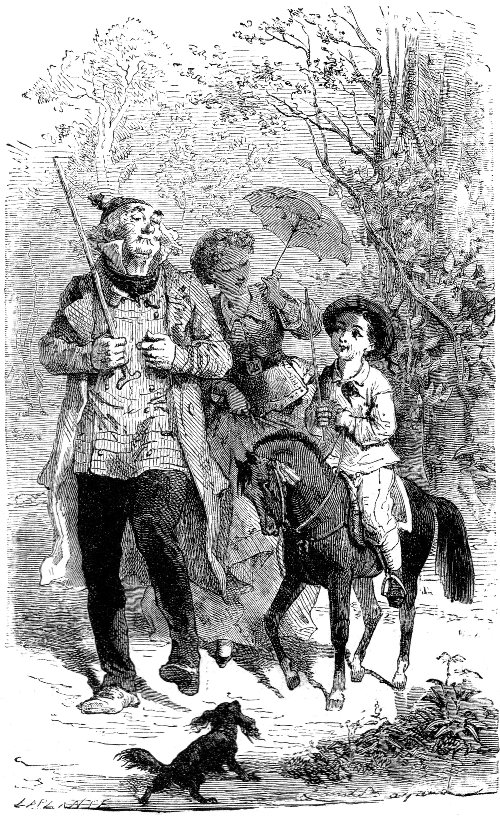
HE SHOWED MAURICE HOW TO SIT THE HORSE FIRMLY AND GRACEFULLY.
One summer evening, when Maurice and his parents were in the garden, enjoying the freshness of the air and the perfume of the flowers, they heard the bell ring at the gate, and presently Fritz came up to them, leading by the 13 bridle a pretty little black horse. In few words the old man explained the motive of his visit. He wished, before leaving the world, to make Maurice a present of the wooden horse which he had brought with him.
“A wooden horse!” they all exclaimed, for they had mistaken Cressida for a real live pony.
“It is not a being created by God,” said Fritz, “but only a thing made of wood. By some mechanism, which I will not explain to you, it is endowed with the action and movements of a real horse. Cressida is what I possess most precious in the world, and I have made up my mind to part with it only because I love your little son, and know he deserves to possess an object which I care more for than I do for the few days of life that remain to me.”
Then he explained to Maurice how to manage the horse; how to make it move, and to guide it. He took the little hand of the child and placed it softly on the pony’s neck, which immediately neighed as if with pleasure. He showed Maurice how to sit the horse firmly and gracefully; and when the little boy, who was very intelligent, understood all this, Fritz told him he might start off. The child had only to press his knees hard against the sides of Cressida, and off it went at a gallop. The rider’s heart beat quickly, but he kept his seat, and guiding the pony back again, pulled up at the spot he had started from.
Maurice’s father and mother were lost in amazement; they did not know how to show their gratitude, for Fritz was not a man to offer money to. They begged him to leave his cottage and come and live with them. Fritz thanked them, but said that he intended in a few days to leave the village to go to Nuremberg, and that at his age he could hardly calculate upon returning. He was going to see for the last time his niece and her three little children, who were the only relations that remained to him. This niece’s husband had gone to America a year ago, to settle there: he had been successful, and the wife and 14 children would follow him soon. Fritz said that before he died he was going to see them once again.
On taking leave, Fritz asked Maurice to give him a promise that he would never sell, or part with, Cressida. “Unless, indeed,” he added, “it should be for the sake of helping somebody in great distress.”
Maurice had a stable arranged for Cressida in the house, and acted as groom himself. He rose every morning at six o’clock, and went to clean and rub down his little horse, which always stood quiet the time.
And now it occurs to me, my little readers, that you would probably like to know the name of Maurice’s father and mother, which I have not yet told you. The father’s name was Felix de Roisel, and the mother was called Julie. She was very pretty and very gentle: as gentle and pretty a mamma as you have ever seen. Still she could be severe if it was really necessary: but this was not often with so good a child as my little friend.
(To be continued.)
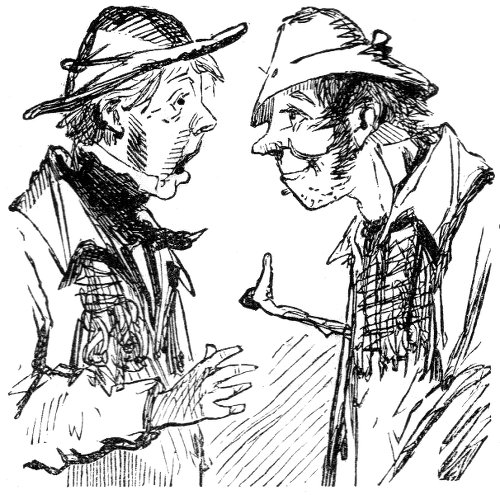
“What’s the news of the day,
Good neighbour, I pray?”
“They say the balloon
Has gone up to the moon.”
“O-oh!”
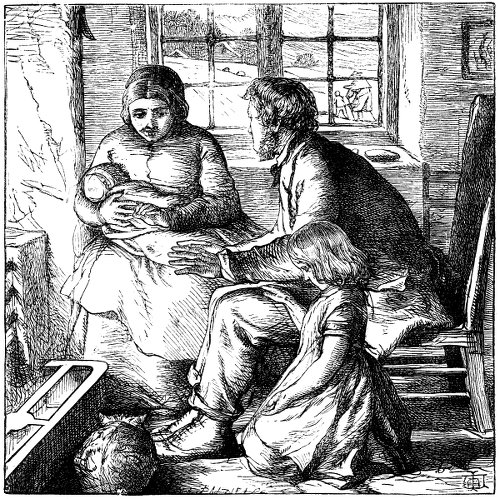

Outside, the meadows are covered with snow;
Fluffity, fluffity, fluff.
All round the cottage the winds roughly blow;
Puffity, puffity, puff
Inside, the cottagers pleasantly talk:
Chatterty, chatterty, chat.
They talk of the time when baby will walk;
Patterty, patterty, pat.
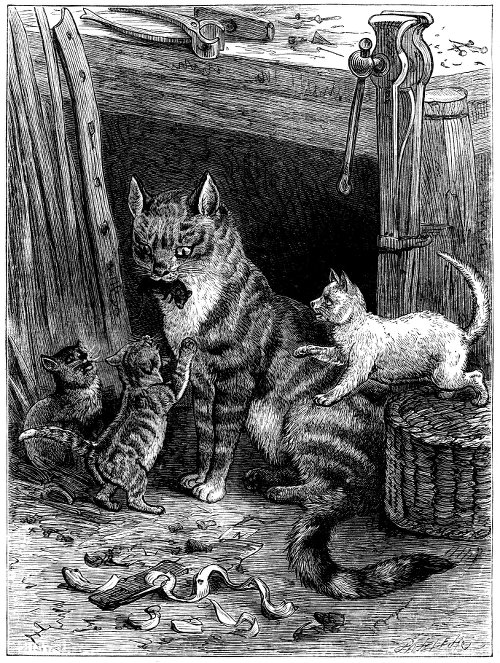

Well, my little friends, I think I need hardly describe this animal to you; for there is scarcely a home in England, rich or poor, which is without a pussy.
How the children all love the little kitten, the nursery pet, with its pretty playful ways and graceful movements! But kitty grows up too soon into the sedate old mother-cat, like the one we see in the picture holding the poor little mouse in her mouth. Ah! that to me is a terrible drawback to Pussy,—that love of killing.
I am so fond of cats that this year I went to the Crystal Palace Cat Show, where I saw some beauties: among others a tortoiseshell Tom, which is said to be a great rarity. Hundreds of cats, large and small, long-haired and short-haired, long-tailed and tailless, cats of every colour known to catdom, filled the cages, which were arranged in long rows. And I must say they bore their imprisonment with wonderful patience. For three days they had been shut up in those wire houses, like birds: and some of the cages housed a whole family. One, I remember, contained a mamma and her six children; the latter small, but very rampageous. I pitied this poor mother with all my heart: how her patience must have been tried during those three dreadful days!
Though we may not like to see cats kill small animals, Puss is often valued in proportion as she can rid the house of rats and mice. So it is, I suspect, with the cat in the picture. She is evidently owned by a carpenter, who perhaps found his workshop infested by rats and mice till he possessed this handsome tabby. She will soon rid him of them, I think: and see how she is teaching her kittens to follow her example!
But in spite of their natural instinct to destroy mice and birds, cats may be easily taught to live in friendship with these very creatures; and I will tell you a story of a pet cat which, I think, will amuse you better than hearing about the poor little mice being killed.
A lady that I know had a fine tabby cat, and also a very beautiful canary. The cat’s name was Bijou; the canary’s—Cherry. Now Bijou had been brought up from kittenhood with Cherry: that is, he had been accustomed to sit on the rug beside the fire, while Cherry sang in his cage on the table, or hanging at the window. Bijou always behaved perfectly well, and never attempted to molest Cherry.
The mistress of these two pets used to let the canary fly about sometimes in her bedroom, but she never had quite confidence enough in Bijou to do this while he was there. One day in summer the window of the bedroom happened to be open at the top without her noticing it, and the canary, after flying about the room a little while, passed out of the window. It flew round and about, from tree to tree, seeming to enjoy its liberty very much.
The lady feared she had lost it for ever, but she brought out the cage and placed it upon the lawn, thinking there was just a chance that the canary might come back to its old home of its own accord. As she stood at the window watching, she presently saw the bird alight on the lawn. A moment afterwards she saw Bijou, who had been crouching in a bed of flowers, spring out, pounce upon the little creature, and seize it in his mouth.
Then, to the lady’s astonishment, who expected to see the bird devoured, Bijou trotted with it up to the cage, and deposited the truant safely inside again. Cherry was dreadfully frightened, but not at all hurt, and after shaking its rumpled feathers into their places, sat on its perch as happy as ever.
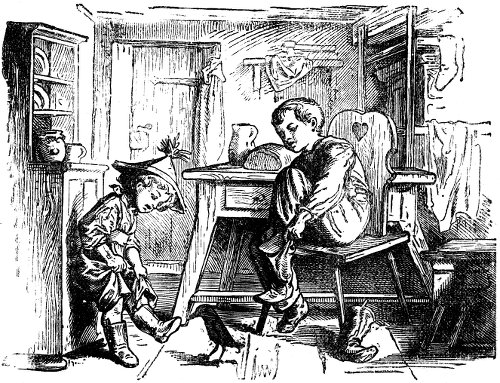

Peter was a little boy who was very fond of birds and animals. He had a raven which he taught to do all manner of tricks. Trusty Tim—that was the raven’s name—would fetch and carry like a dog, and would call upstairs to his master when anyone came to the cottage door, like a housedog barking. He would also help his master to pull off his boots, by taking the toe in his beak and giving it a tug.
Like other clever people, however, Trusty Tim sometimes made a mistake. One day Peter’s little brother, Johnny, put out his foot to see if the raven would do the same for him. Unluckily there was a tiny hole at the toe of the boot, and Trusty Tim could not resist the temptation of pecking at the hole, and taking a little bit of Johnny’s toe. And didn’t Johnny scream!

There was a monkey climbed up a tree;
When he fell down, then down fell he.
There was a crow sat on a stone;
When he was gone, then there was none.
There was an old wife did eat an apple;
When she ate two, she had ate a couple.
There was a horse going to the mill;
When he went on, he didn’t stand still.
There was a butcher cut his thumb;
When it did bleed, then blood it did run.
There was a jockey ran a race;
When he ran fast, he ran apace.
There was a cobbler clouting shoon;
When they were mended, then they were done.
There was a navy went into Spain;
When it returned it came back again.

It had been such a day! The flakes of snow had been falling, falling like feathers on the pavement all day long. It was now dark, and little Otto stood at the dining-room window, watching them still falling in the light of the lamps outside. Otto is a handsome boy of about seven years old. It is New Year’s Eve; and he is going to a party this evening. Bertha, his sister, is being dressed for it at the present time, but he had been so noisy and troublesome, up in the nursery, while the ceremony of her dressing was going on, that he was sent downstairs to wait till his turn came.
Otto had been to a good many parties, and to two pantomimes this winter; still he was not at all tired of either parties or pantomimes; on the contrary, the more he went to the more he seemed to like them. But it was only at Christmas Otto was so gay; for did he not do lessons all the rest of the year with his sister’s governess? Miss Wigly was very strict, and thought children were much better without many holidays;—“particularly little boys,” she said. But perhaps that was because she was so anxious to get Otto well forward before he went to school.
For the last ten minutes he had been staring at the snow outside the dining-room windows, then he turned round and looked at the things in the room. A bright fire blazed on the hearth, the cloth was already laid for the dinner of the older members of the family, and by the side of the fire stood a comfortable easy chair, which papa generally sat in as soon as he had done his dinner.

Otto seated himself in this chair, and began to look at a bottle of water, which stood at the corner of the table nearest to him. His attention was attracted by the odd way in which things were reflected in the water. How minute the reflections were, and how they all curved, so as to make the room look round, as if seen in a mirror! He observed, too, his own little face, sometimes lengthened, sometimes widened, according to the part of the bottle he saw it in. These observations did not prevent him from thinking at the same time what a comfortable easy chair he was sitting in, and what a nice warm fire it was.
How long he had been reflecting upon all these things he never knew, when he observed, to his surprise, that the bottle was growing bigger; and, in another moment, instead of looking at it from the outside, he found himself inside it, looking at the objects beyond. And these were all changed. There was no water in the bottle now, but the water was outside, and the bottle itself was floating upon a river. The river seemed to wind along between mountains, and had beautiful buildings and trees upon its banks. A boat, rowed by two queer little men, was fastened by a chain to the bottle; and, as they rowed, the bottle was towed along. Gold and silver fish were playing about in the water; tiny children with wings were sporting in the air. The bottle inside was fitted up like an elegant drawing-room; and—most wonderful of all!—a beautiful fairy reclined on a sofa in the midst of it.
Otto knew she was a fairy, because she was just like those he had seen at the play, dressed all in gold and silver tissue, and sparkling with jewels. Besides, although she looked grown-up, she was not bigger than Otto himself. She spoke to him also in the beautiful language used in plays:—
“Mortal child,” she said, “thou lovest well to join in the festivities of other mortals,—what sayest thou now to making one in a fairy revel?”
“A fairy party, do you mean, ma’am?” asked Otto. “It would be awfully jolly, I should think.”
“Come, then, with me,” said the fairy, rising from her sofa.
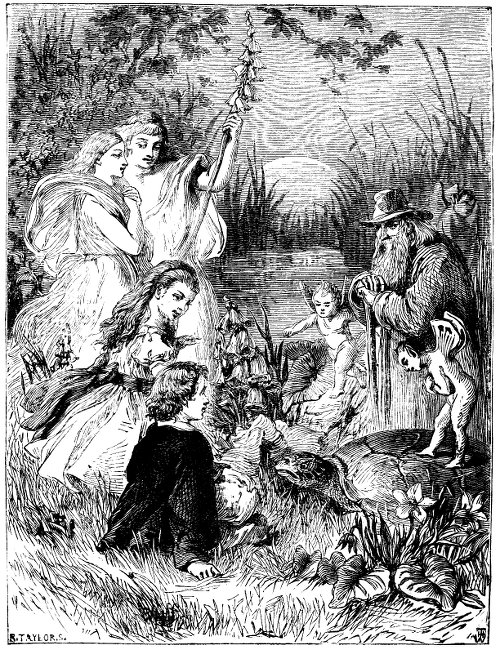
As she did so, it occurred to Otto that they would wonder what had become of him at home. He hesitated, and said,—
“Could I go back home for a minute first, if you please, ma’am, to let them know where I am? And I think my sister, Bertha, would like very much to come too, if she might.”
“Mortal boy, dost fear to trust thyself with us?” exclaimed the fairy, indignantly.
Otto felt he had offended her, but before he could reply, she had disappeared. For a moment everything seemed confused: “Just like a change of scene in a pantomime,” thought Otto to himself. Afterwards, instead of floating along upon the river, he found himself sitting upon its bank, while a very large moon rose over the water. Bertha was sitting by his side, and two lovely fairies stood by them, but not the same fairy as before. In front of him, standing up in the water, was a very shabby, damp-looking, white-bearded old man. Otto was puzzled to account for him at first, then he recollected to have seen a picture somewhere of old Father Thames, and he assumed that this old man must be the river-god. There were also some little naked fairies hovering about him, “And those,” thought Otto, “must be little streams that run into the river.” Besides all these, there was a large tortoise or turtle close to Otto, which crept up, and stared him in the face.
The old man, addressing Bertha and Otto, said,—“Tell me, children, what is your wish?”
Before Otto could put in a word, Bertha exclaimed,—“I want to go to the fairy revel.”
“Why, she seems to know all about it!” thought Otto, very much surprised. The words—fairy revel—uttered by Bertha, were repeated by voices in the air, on the earth, among the reeds, in the water, everywhere. Gradually the sounds died away in the distance, and as they did so, Otto discovered that he was alone.

“Why, they have all gone off to the fairy ball, and left me behind,” said Otto, aloud to himself. “How shall I ever get there now?”
“Jump on my back,” cried a voice from the grass. It was the tortoise: and Otto observed that it had a kind of side-saddle on its back, and a bridle in its mouth.
“Can you go fast?” said Otto, doubtingly.
“Try me!” briefly replied Mr. Tortoise.
Otto did so, seating himself as he thought a lady-fairy might do. Rather to his own surprise, he felt no alarm when the creature rose up from the earth, and bore him rushing through the air. He seemed to be rapidly approaching the moon, when suddenly a harsh voice sounded in his ears:—“Why, you’re not dressed.” He looked at himself, and perceived, to his dismay, that he had on his nightgown. “How stupid of me,” thought he; “why, I must have jumped out of bed, and come off, without dressing. What shall I do at the fairy ball?”
Again the same great voice cried,—“You’re not dressed,” and the words were followed by a merry peal of laughter. Otto looked at himself again, and now all was changed: he had on his usual little jacket, his nickerbockers, warm stockings, and shoes. He was in his father’s easy chair, and the water-bottle was on the table before him. Bertha stood there, dressed for her party, laughing with all her might; while Mrs. Crump the nurse looked very cross.
“Oh, nurse, why did you wake me? I was on my way to the fairies’ ball.”
“Fairies’ fiddlestick!” rejoined Mrs. Crump. “Come and get dressed directly.”
“Oh, Bertha, Bertha, I have had such a wonderful dream; just like being at the play. I’ll tell you all about it.”
“Well, never mind now,” replied Bertha, snubbing him with all the importance of a sister three or four years his senior. “Make haste and dress, or we shan’t go to Aunt Julia’s ball, which I care more about.”

Tis Christmas time!—the joyous time,
When, loud from belfry towers, the chime
Of merry bells, so glad and gay,
Proclaim the holy Christmas-day.
The church is decked with holly bright,
Each face is beaming with delight,
And mourners put their grief away
Upon the joyful Christmas-day.
’Tis Christmas-day, that brings to each
Something to learn, something to teach;
Something to do, if understood:
All have their mission here for good.
Good will to man and peace on earth:
Rejoice with pure and guileless mirth,
And highest praises to Him pay,
Through whom we have our Christmas-day.
Give with free hand, our choicest store
To all who need, to old and poor;
With friends rejoice, with children play,
Make happy all our Christmas-day.
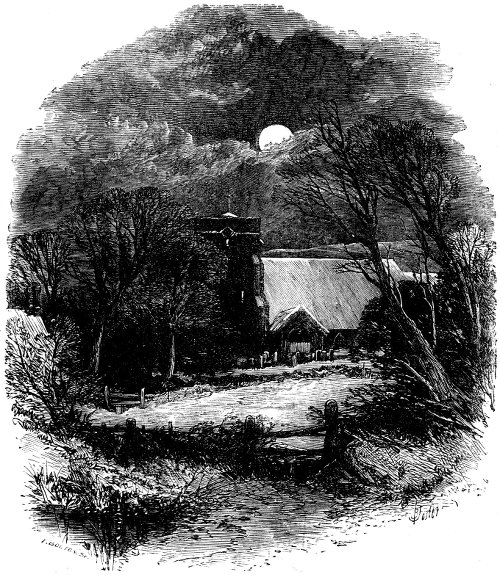
Nor let the common thought appear,
That Christmas comes but once a year;
And till next year has passed away,
Let it be ever Christmas-day.
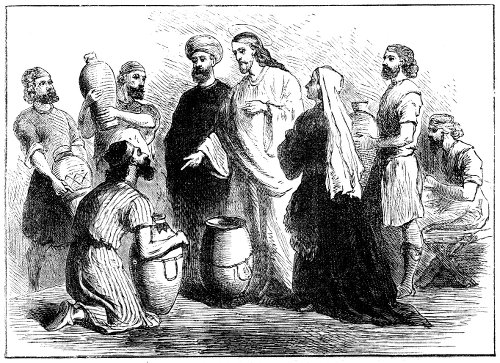
Now, darling children, come round me while we have a little talk fit for Sundays. You remember that during the past year I gave you some account of our Saviour’s teaching, and of the principal events of His life. Now I shall tell you about some of the miracles He performed.
The word “Miracle” signifies simply—wonder: but there may, of course, be many wonderful events which are not miracles. As the word is used, a miracle means strictly an act by which the laws of nature are set aside: and though the wisest of us do not understand all nature’s laws, we should be able, I think, generally to distinguish 31 what was really a miracle from what was merely wonderful. For instance, if a doctor were to cure a blind man by anointing his eyes, we might think it wonderful, but should conclude that he had discovered a cure for that kind of blindness. If the physician, however, were to give sight to the blind man by merely commanding him to see, we might then pronounce the cure a miracle.
The Jews expected that all who claimed to be prophets should perform some miracle to prove that they were divinely inspired; as did Moses, Elijah, Elisha, and several of the prophets. When the divine promise was given to Moses and others, that a great prophet should be raised up for the people of Israel, it was foretold that this prophet should be known by the greatness and variety of the miracles which he performed.
By such signs he was to be distinguished from all pretenders, and Isaiah says:—“Then the eyes of the blind shall be opened; and the ears of the deaf shall be unstopped. Then shall the lame man leap as a hart, and the tongue of the dumb sing.”
Our Saviour may be said generally to have had two objects in performing miracles. In most instances, one object was the immediate relief of suffering. But He always had the greater object by His miracles of proving that He was the Christ, whose coming had been foretold to the Jews so long before. The miracles were the signs that He was the Messiah.
The first miracle performed by our Saviour was that of turning water into wine.
We are told by St. John that there was a marriage in Cana of Galilee, and at the feast our Saviour and His mother were present. After a time the servants found that the supply of wine for the guests was running short. One of them told this to the mother of Jesus, and she, going to Him, said:—“They have no wine.”
The miracle which followed is thus related in the words of Scripture:—
“Jesus saith unto them: Fill the water-pots with water. And they filled them to the brim. And He saith unto them: Draw out now, and bear unto the governor of the feast. And they bare it. When the ruler of the feast had tasted the water that was made wine, and knew not whence it was: (but the servants which drew the water knew;) the governor of the feast called the bridegroom, and saith unto him: Every man at the beginning doth set forth good wine; and when men have well drunk, then that which is worse: but thou hast kept the good wine until now.”
This was the first miracle that Jesus did: in our next Sunday-talk, my children, I will tell you more of them.



It was the thirteenth of February; to-morrow would be St. Valentine’s day; and the children were as busy as bees preparing valentines. They were as merry, too, as they were busy; all except Annie—little Annie, the delicate one, the pet of the family. While the others were skipping and jumping about as they did up their valentines, and eager and noisy, as it is the nature of children to be, Annie sat on the hearthrug, with her hands clasped round her little knees, staring into the red fire; and her pale face looked quite old and wan from trouble.
I was very hard at work directing the envelopes for the children, while they clamoured and clustered round me; but looking at our dear little girl’s wistful face, I took advantage of a moment’s respite from my work to go and ask her what it was that seemed to trouble her so much.
“Oh, auntie,” she said, as she began to cry, “it is because Jack has taken my darling Tip away from me.”
Tip was a nice little Scotch terrier that belonged to Annie’s cousin, Jack, who had been staying for two or three weeks at Annie’s home during his holidays. Tip had come on the visit with his master, and had gone away with him only that morning. But during those two or three weeks Tip and Annie had become dear friends and play-fellows.
“I had taught him so many pretty tricks,” continued Annie, “and he loved me so: I am sure, auntie dear, he loved me better than Jack.”
“But, darling,” I said, “after all Tip is Jack’s own 35 doggie, and he is very fond of the little creature, you know, so of course he took him away with him. Now, dear, don’t fret any more, but try and be cheerful.”
Annie is a good little girl, and did try her best to be cheerful, I could see. She came to the table, and looked over the valentines with the others; but she had not forgotten her sorrows.
Presently, her little brother Tommy said to her,—“Annie, don’t you hope you’ll get a jolly lot of valentines to-morrow?”
“I don’t care,” sighed Annie, “unless Tip could send me one.”
“What stuff!” remarked Tommy: “Tip can’t send you a valentine, you know.”
“Well, he might bring me one, at any rate,” said Annie, “for I taught him to carry letters.”
Annie’s remark gave me an idea, and I formed a little plan, of which you shall hear the result.
The next morning—St. Valentine’s morning—as the children were at breakfast in the nursery, a scratching was heard at the door; and when it was opened, there appeared in the doorway—what do you suppose now? There was a little doggie, the very likeness of Tip, standing on his hind legs, with a valentine in his mouth. The valentine was addressed to Annie: and when I followed the little terrier into the room, and told her that not only the valentine, but the doggie too was for her—that I gave it to her to be her very own, she was more delighted than I can describe to you.
When I formed this little plan the day before, I had just remembered where a doggie, very like Tip, was for sale. I had bought him that very afternoon, and managed the surprise as you see. Annie very soon grew as fond of Charlie—that was the name of the little dog—as she had ever been of Tip.
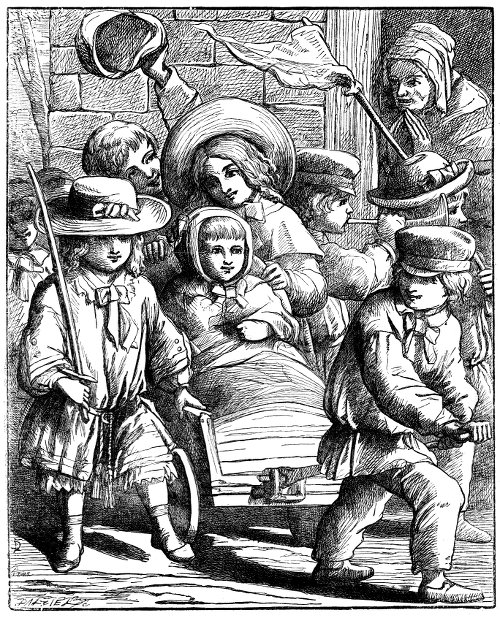

See what a pretty Fairy Queen!
Such a one is seldom seen:
A little crown of golden hair,
And little robes so clean and fair.
All behind her trumpets blowing;
All before her banners flowing;
A valiant guard upon her right,
With a sword so keen and bright;
And on her left a dame discreet
To answer her with converse sweet;
And a prancing steed before
Her triumphal car to draw.
Surely such a Fairy Queen
Has been very seldom seen:
For guards and dames and steeds appear
Her brothers and her sisters dear.
And there the kind old nurse the while
Looks on with merry jest and smile.
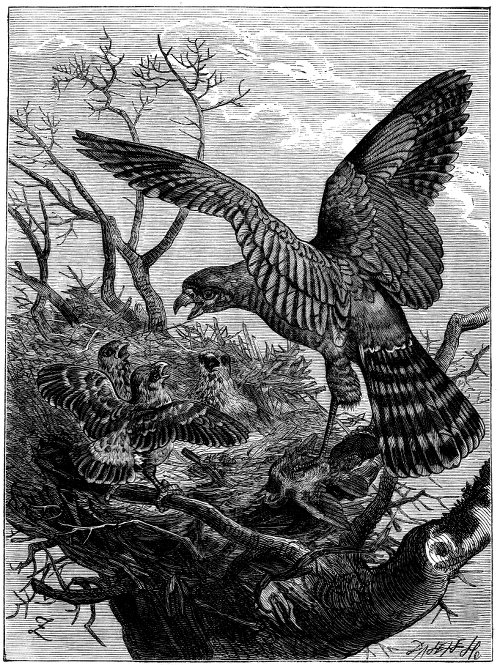
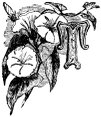
This is a picture of a bird called the Sparrow-hawk. It is rather a small kind of hawk, and contents itself with swooping down upon poor little unoffending sparrows, and such small game. Like other birds of prey, it is becoming more scarce every year in England, and being a very wild shy bird, it does not come near people or houses if it can help it. Still, when it is very hungry, or has little hungry bird-children at home in its nest, it becomes very brave and fierce, as you will see by the story I am going to tell you of what happened to me when I was a little girl.
It was, I remember, a very cold morning, and the trees were standing bleak and bare against the sky; the world looked dreary enough, and there were heavy clouds hanging over all. I had come out into the garden to bowl my hoop, when old Tidyman, the gardener, who was sweeping the snow from the paths, and who dearly loved a little chat, said to me,—
“We’ll be having a fine fall, missie, presently: it’s rare and cold surely. The birds is a’most starving: there be a sparrer-hawk a’hoverin over here as seems precious hungry. It have a nesty, I know, in that there holler tree in the park, and as soon as ever them pore little birds you see there trying to peck a bit, comes together, that there sparrer-hawk he comes after them. Looky there!” exclaimed the old man, pointing to a hawk high in the air above our heads, “if he ain’t a’hoverin over us now!”
The poor little dickies, who were pecking away at a few crumbs, which had been thrown out to them in the garden by some kind-hearted maid belonging to the house, seemed suddenly to become conscious of their danger, and flew off with a frightened twittering cry. One only—a very young and very foolhardy little sparrow—remained 40 to take a last peck. The hawk singled out this poor birdie for his prey, and allowing the others to fly away in peace, suddenly swooped down upon the little laggard, fastening his cruel beak in its poor quivering body.
This took place within half-a-dozen yards of the spot where old Tidyman and I stood talking. I was but a child of seven years old, but I hated cruelty, and always longed to help the weak against the strong; so I rushed at the hawk, hoopstick in hand. The little sparrow was already dead; but what do you think the savage hawk did? It turned upon me, and flew at my face. I put my hand up just in time, and had a piece pecked out of one of my fingers instead.
When Tidyman came up, the horrid bird flew off, not forgetting, though, to pick up and carry off the little dead sparrow in triumph. I have no doubt the baby-hawks, in their nest in the hollow tree, greeted him with open mouths, as you see them in the picture, and they were fed not only with the little dead sparrow, but also with a nice piece out of my poor little finger.
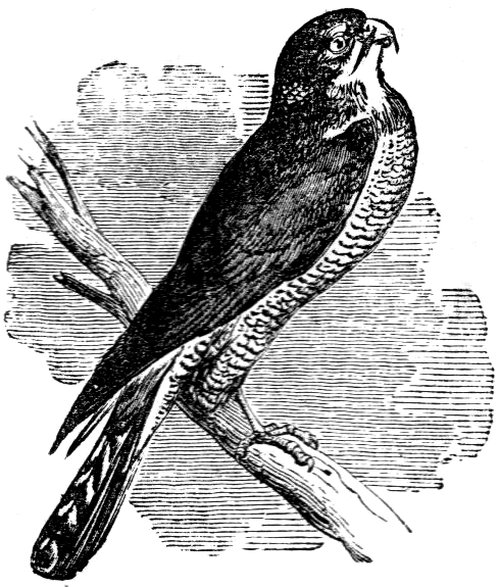

A Sister of Mr. de Roisel was married to a gentleman named Hector de Malassise, and they had an only child, a son, of about the same age as Maurice. They lived in the neighbourhood of Fontainebleau, where Mr. de Malassise had an estate. The two families, living so far apart, were accustomed to pay long visits, which generally lasted some weeks, at each others’ houses.
Soon after Fritz had made a present of the wooden horse to Maurice, it was arranged that the family of de Roisel should pay a visit to their relations at Malassise. Now Maurice, to tell the truth, did not look forward with pleasure to this visit; for Eusèbe—that was the name of his cousin—had a very bad temper, and my little friend found it very difficult to get on with him. This boy was thoroughly spoiled, and made everyone about him miserable by his caprices and his tyranny. His papa and mamma did not dare to punish, or even to scold him, for they had got an idea into their heads that, if he was thwarted or contradicted, it might bring on a nervous illness.
A country doctor being one day at the house of Mr. de Malassise, when Eusèbe was teasing his father to give him something he ought not to have, had carelessly said,—“Oh, pray let him have it, or he’ll worry himself into a nervous fever.” The doctor afterwards in vain assured the parents that he had not made the remark at all seriously; 42 he could not remove the impression his words had produced. The parental hearts had taken alarm, and from that day the father and mother were always in fear lest their dear boy should be put out, or anything should make him angry. His wishes became laws for the whole household: at his slightest frown every one about him trembled, as it is said the gods on Mount Olympus trembled at the frown of Jupiter;—and he was a pagan deity who, I assure you, was not wanting in caprices.
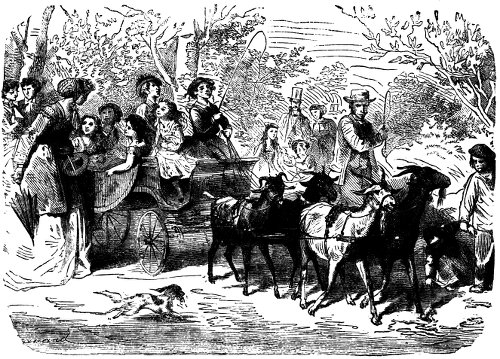
A GOAT-CHAISE IN THE CHAMPS-ELYSEES.
While his papa and mamma were waiting in trembling anxiety for this attack of nerves, which never came, Eusèbe, in spite of his bad temper, enjoyed excellent health; and ate, drank, and slept, as well as possible. They were in fact the only things he did do well.
Eusèbe always had beautiful toys, and he delighted in showing them to Maurice with an air of superiority that 43 was humiliating to his little cousin, whose toys were common and cheap. It was only natural that the latter should have some wish to retaliate, and hearing that they were going to Malassise, he thought what a pleasure it would be to take Cressida with him. Eusèbe could not have a toy-horse like that. Mr. de Roisel, however, put a stop to this project; because, as he said, if Eusèbe should take a fancy to the horse, Maurice would be expected to give it up to him; and that would not do at all. Maurice saw that his papa was right.
I need hardly say that Eusèbe always got tired of his toys very soon, and every time Maurice went to stay with him there was a new collection to be seen. On the occasion of this visit, Maurice found that Eusèbe’s favourite plaything for the moment was a goat. Not a goat of wood or pasteboard, such as you children have all possessed perhaps, but a real live one; as much alive as those you may see any day harnessed in goat-chaises in the Champs-Elysées at Paris; only she was prettier than any I have seen there.
The goat was called Jeanne, as I daresay some of my little readers are called, but they need not be ashamed of their namesake. She was a well-behaved, graceful creature, and her long silky coat, which was perfectly white, shone in the sunshine like silver. She had no horns, it is true, but this was scarcely to be regretted, for the most gentle animals are apt sometimes to use their horns against their friends. So Eusèbe had nothing to fear on this account. She wore round her neck a red collar, on which her name was embroidered in letters of gold. Eusèbe would tie a string through this collar, and lead her three or four times a day into a meadow near the house, where she nibbled the grass and flowers.
I cannot describe to you the delight with which Maurice watched Jeanne jumping about, or playing with her two little kids; and all with an ease such as nature alone can give. He could not help making a comparison between 44 her and Cressida. Then he looked into her soft dark eyes, which appeared to express thoughts: Cressida had fine dark eyes too, but somehow they were not the same thing. Jeanne liked to climb on to high banks, and would stand sometimes on the edge of a precipice, stretching out her neck to eat the leaves of some tree: Cressida was strong upon the legs too, and its knees had never been marked by a fall; still it could not have done so much. Out in the fields Jeanne seemed to listen to distant noises, which you scarcely heard; her little ears kept moving about in all directions as if to let no sound escape her: Cressida had also pretty little ears, but somehow the wooden horse never seemed to listen as Jeanne did.
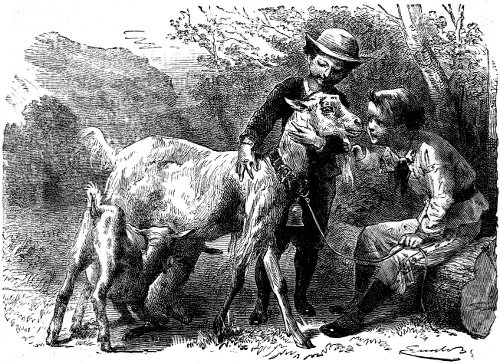
SOON SHE BECAME FAMILIAR WITH MAURICE, AND LET HIM CARESS HER.
Very soon Jeanne became familiar with Maurice, and let him caress her; while, by way of thanking him, she would 45 lick his hands: Cressida had never made such advances as this to its young master. Yet another advantage had Jeanne over the horse: when she had been running, her sides moved up and down; you could see that a heart was beating in her breast: but Cressida’s sides, beautiful and glossy as they were, never heaved after a gallop. Maurice was making these comparisons during a whole day, and in the evening was so occupied with his reflections, that instead of playing at dominoes with Eusèbe, he sat silent by the side of his mamma.
The next morning he talked a great deal in praise of Cressida, but did not cease to caress and play with Jeanne. While he was stroking her, Eusèbe suddenly said to him:—“I am beginning to get tired of Jeanne; if you like, we’ll make an exchange.”
“What do you mean?” asked Maurice.
“You shall give me Cressida; I should like to make his acquaintance very much; and then in exchange I’ll give you this goat, that you think so pretty.”
“No, I cannot give you Cressida.”
“Can’t give me Cressida! why not?”
“I can never part with Cressida.”
“You mean,” rejoined Eusèbe, “that you don’t think Jeanne is worth so much as the horse. Then the fact is that you don’t think her so pretty after all; and you’ve been telling lies in calling her pretty all this time.”
“Telling lies?”
“Yes, you have. She’s ugly in reality; she is; I think she’s frightful now. Oh, you ugly beast, I’ll kill you! There, there, there’s something for you to punish you for being so ugly.”
And he gave the poor goat several cuts on the head with a whip.
“Eusèbe,” cried my little friend, “how can you be so cruel?”
Maurice saw the tears trickling from the eyes of Jeanne, and pointed them out to Eusèbe, who only shrugged his 46 shoulders. He was not in the least ashamed of himself, and added,—
“If you don’t like me to hit her, give me your famous horse in exchange; that’s all I’ve got to say.”
“I cannot, because I’ve promised not to part with it.”
“Oh, you’ve made a promise, have you? What does that matter? Why, I make promises every evening, and break them every morning.”
“What do you say?” exclaimed Maurice.
“Why, of course, every evening mamma says to me, ‘My pretty Eusèbe, my little treasure, promise me now that you won’t put yourself into passions, nor disobey me any more; promise me that, dear, and here are some bonbons for you, and some chocolate à la crème.’ I promise of course, naturally. Afterwards, in the morning, when I want some more, she refuses, because, she says, I ought not to eat them before breakfast; but I put myself into such a terrible passion that she gives me them directly. That’s how it is, you see.”
“You are very wrong to behave in that way,” said Maurice: “but after all, your promises are not made quite seriously.”
“And what are yours, pray?”
“Mine are serious promises, and I keep them.”
“Now, that’s just because you’ve heard that men keep their promises,” replied Eusèbe, “and you want to be like a man. But the truth is, men are like me, I can tell you: they make promises to get what they want, and then they break them again to get what they want. It’s all very fine for them to say to us children—‘Don’t tell lies, be always just, keep your promises!’ Oh, I’m not to be taken in; I know all about it.”
Now, my little readers, I do not say to you that the world is peopled with only honest men: that would be deceiving you. But be assured that those who tell falsehoods are everywhere despised; and when anyone speaks 47 of them, or writes about them, it is in order to show how much they ought to be hated.
“Yes,” added Eusèbe, “you make a fine mistake when you think you are obliged to keep the horse because you made a promise.”
“That’s your opinion, but I know the contrary,” said Maurice. “Don’t let us talk any more about it.”
“Well, you won’t have Jeanne, you know.”
The next day the vintage began in the vineyards of Mr. de Malassise. Eusèbe was so much amused with all the bustle, and the coming and going of so many grape-pickers, that he had no time to think of Jeanne. This lasted three or four days, and the poor beast began to think she was free from her tormentor altogether: but no such luck for her! After that time, Eusèbe, already tired of the vintage, and particularly of the grape-pickers, who would not let him beat them, came back to make a victim of her. Maurice reasoned with him, and tried in vain to soften him.
“Very well then,“ said Eusèbe, “if you pity her so much, take her and give me your horse. Unless you do, she belongs to me, and I can do what I like with her—sell her, beat her, or kill her.”
“But your papa wouldn’t let you.”
“Oh, wouldn’t he indeed! He’d be nicely punished if he interfered.”
“I should like to know how?”
“Why, I’d have a nervous attack directly.”
Maurice was very unhappy. Do what he would to persuade himself to the contrary, he recognised the superiority of Jeanne over Cressida. He would willingly have made the exchange, but that he remembered the solemn way in which Fritz asked him to promise that he would never part with the little horse; and child though he was, he knew he was bound to keep his promise. Still, a struggle was going on in his own mind. He felt drawn towards Jeanne, as it is said little birds are sometimes fascinated and attracted by 48 the gaze of certain snakes. At last he adopted a bold resolution: he went to his father, and said:
“My dear papa, I want to go away from here.”
“Why, what’s the matter?” said his father. “What has happened? Have you quarrelled with Eusèbe?”
“Not exactly,” rejoined Maurice, “I generally give way to him; but now he wants me to give him Cressida in exchange for Jeanne.”
“Who is Jeanne?”
“It is a beautiful white goat, who has two pretty little kids; and Eusèbe beats her because he wants me to take her and give him Cressida; but Fritz told me never to part with the wooden horse. You see, papa, Jeanne is not made of wood; she lives and feels like me, and it’s terrible to see lately how he beats her. You can’t imagine how nice she is; and so grateful to any one who is kind to her. Then to see how she loves her little children!”
“Well, well, if that’s the case we must not leave her with Eusèbe any longer. Tell him I’ll make him—a present of something much more valuable in exchange for her.”
“Oh, but I know he won’t give her for anything but Cressida.”
“Why, he must be a little monster. Don’t be unhappy, my child: tomorrow morning we will leave Malassise, so you shall see no more of his cruelty, at all events.”
Once more at home, Maurice did not long remain unhappy about Jeanne. Do not accuse him of caprice, my little readers; but think how quickly your own impressions pass away or change. It is natural to childhood that it should be so.
(To be continued.)
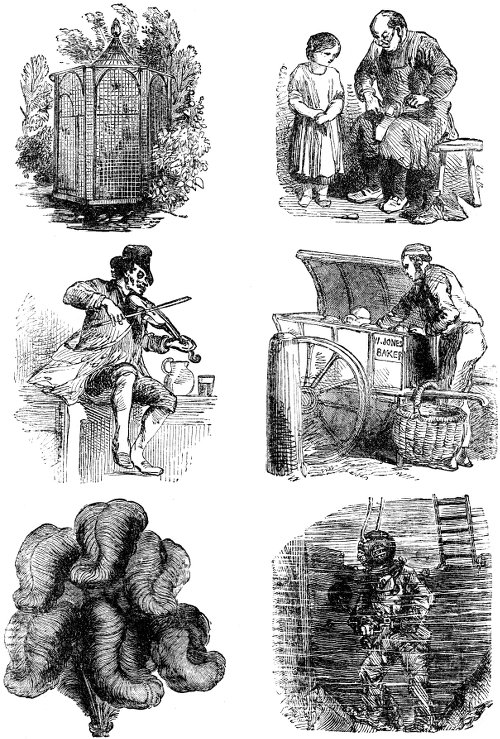
Here are six objects in this puzzle for you to find out. One object begins with A, one with B, one with C, one with D, one with F, and one with P.

Allegretto. mf.
1.
I once knew a couple that lived in a wood,
Chipperee, chip, chip, chip!
And up in a tree-top their dwelling it stood,
Chipperee, chip, chip, chip!
The summer it came and summer it went,
Chipperee, chip, chip, chip!
And there they lived though they never paid rent,
Chipperee, chip, chip, chip.
2.
Their parlour was lined with the softest of wool,
Chipperee, chip, chip, chip!
Their kitchen was warm and their pantry was full,
Chipperee, chip, chip, chip!
And four little babies peeped out at the sky,
Chipperee, chip, chip, chip!
You never saw darlings so pretty and shy,
Chipperee, chip, chip, chip!
3.
When winter came on with its frost and its snow,
Chipperee, chip, chip, chip!
They cared not a bit when they heard the wind blow,
Chipperee, chip, chip, chip!
For wrapped in their furs they all lay down to sleep,
Chipperee, chip, chip, chip!
But oh! in the spring how their bright eyes will peep!
Chipperee, chip, chip, chip!
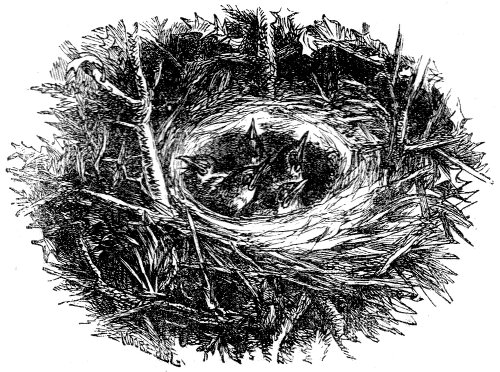
I was staying down in Kent with some friends of mine, when I made the acquaintance of the little boy whom you see lying on the ground in the picture.
One early spring morning, towards the end of February, I went out for a constitutional—that is, as I daresay you know, a walk for the sake of one’s health. I wandered off down the park into a little wood, or shrubbery, which had a green path winding through it, with arbours or summer-houses placed here and there under the overhanging trees. The wind was very keen, and patches of snow were still upon the ground, though the days were beginning to lengthen, and there were many signs of warmer weather at hand. As I walked along, I noticed now and then a young leaf showing itself above the ground, which told me of the coming primroses; and I could see green shoots, from which bluebells would soon be springing to nod their graceful heads to the passers by.
Walking along briskly, I had nearly reached one of the little arbours, when I observed several children standing in front of it. I knew them well by sight and name: they were the children of the lodge-keeper of the park, and lived close by. There were four of them, and they were all standing staring away, as hard as their eight young eyes could stare, at something inside the arbour. Reaching the spot, I discovered that the object of their curiosity was a poor little lad of about ten years of age, who was lying on the ground with his eyes closed, and his head resting against the seat. He was a fair, curly-headed, pretty boy, but his clothes were very poor and ragged, and his little face was pinched and wan. I soon discovered 53 that he was not asleep, but either benumbed by the cold, or insensible from exhaustion.
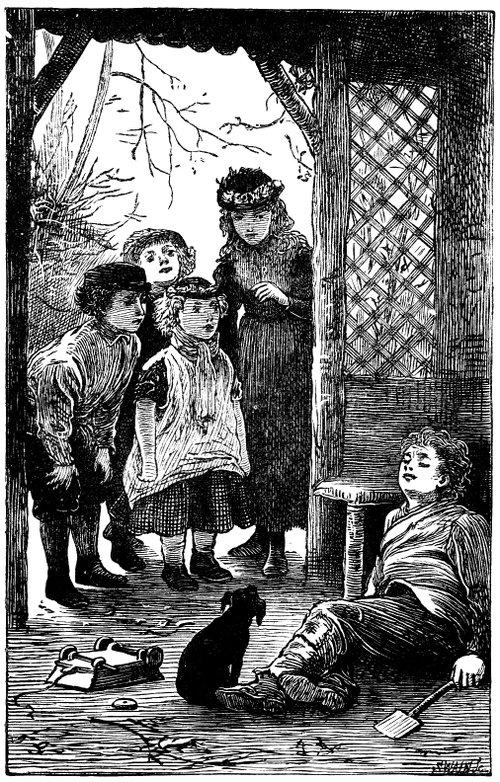
A little black and tan terrier, of no great value or beauty, was sitting by his side, seeming to watch him with 54 great anxiety; and I was surprised to see also some toys lying on the ground, but these I found belonged to the lodge-keeper’s children, who had left them in the arbour the day before, and had in fact come that morning to fetch them.
I sent off one of the children to their father to come and carry the boy to the house. The family were just collecting at the breakfast table when I returned from my early walk, bringing this poor little waif in with me. My friends took an interest in him at once, and after he had been well warmed and fed, he recovered sufficiently to tell us his story.
He was a London boy, and had lived there with his mother, who earned a scanty subsistence for them both by needlework. At her death, two or three weeks before, he was left alone in the world. Then he heard the neighbours talk of the workhouse; and having a vague dread of being sent there, he had resolved to go right away into the country. His only companion was this little terrier, which had attached itself to him in the odd way in which stray dogs will sometimes adopt a master. Begging now and then for food at farmhouses and cottage doors, and sleeping at night in sheds or outhouses, he had managed in three days to come about thirty miles from London; but he would have died from exhaustion or cold if I had not found him that morning.
This happened about two years ago, and I call him one of “my little friends,” because I still take the greatest interest in him. The family with whom I was then staying have looked after him ever since. He was sent to lodge at the cottage of a labourer, and goes to the village school, where he is such a good boy and so quick at his lessons, that I have no doubt he will get on well in the world.
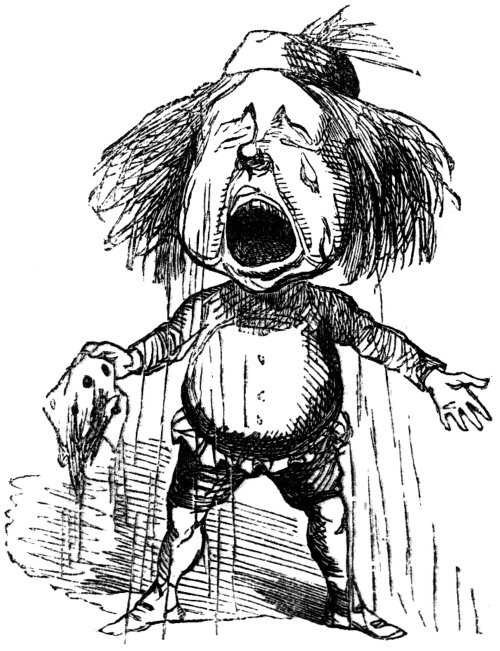

This was a disagreeable boy,
Who always fell a-crying;
No one could ever please the child,
And so ’twas no use trying.
His great mouth opened very wide,
The tears were ever flowing;
At last he cried himself away,—
And this is well worth knowing.
In case you ever feel inclined
To cry like him, my dears,
Think on this naughty foolish boy
Who melted into tears.
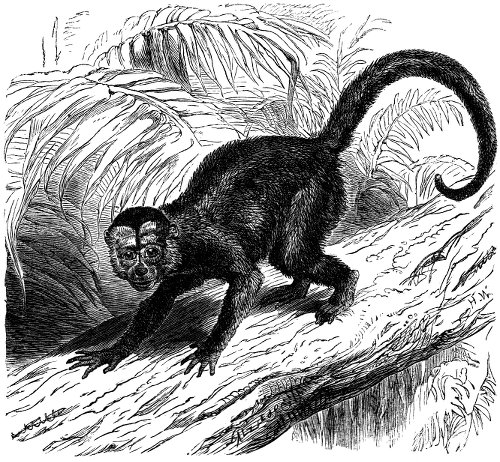

Aunt Totty is an old maid—I need not say how old,—and very fond of birds and animals, which she professes to think are sometimes very superior to men. At her own home, which is at Paris, she has quite a collection of pets. She often comes to England, however, to visit her relations, and then her little nephews and nieces—for she 57 likes children too—always get round her, and make her tell them stories about her animals or birds. One evening, when the children were gathered round her, she began in this way:—
“You want to hear about my pets, my dears? Very well: I shall have pleasure in telling you all about them; for although I have had some bites and scratches and pecks from them now and then, on the whole they are very estimable. In fact, they possess some qualities which I should be very glad to see oftener than I do in men and women: yes, and in little children too.
“The first pet animal I can remember was a monkey. I was then quite little, not more than five or six years old; and Moko—that was the monkey’s name—was almost as big as I was. I really think he considered that he and I were of the same species: at all events he used to treat me as a companion and an equal. But before Moko joined our family circle, we were very near having another monkey, who was not so amiable; and I think I will begin by telling you about him.
“In those days—that is, when your mamma and I and your two uncles were all children—you know that we used generally to live in France, and one summer your grandpapa took a country house a few miles out of Paris. Well, on a beautiful warm morning, when we children were all playing in the large garden, we heard the sound of an organ; and soon we saw, coming through the white gates and playing as he came, an organ-man, with a monkey sitting on the organ. A shout of delight resounded through the garden. When the new-comers approached we were even more delighted, for the monkey was dressed up in the funniest way possible. He looked like a tiny old man, with a cocked hat, long red coat, blue breeches, and a little pair of boots upon his feet, laced up with red laces.
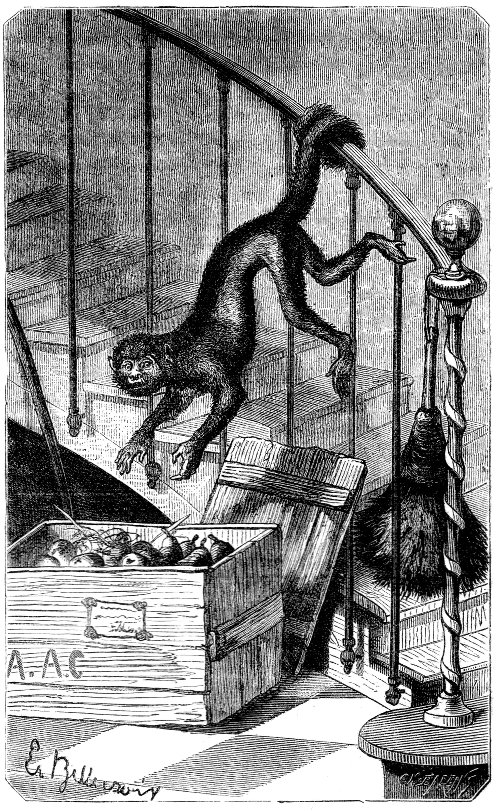
“The monkey performed all manner of tricks: he danced, he fired off a little musket, went through the sword exercise, put on spectacles and pretended to read the newspaper, and did a great deal more besides. After witnessing these wonderful performances, we conducted both monkey and man into the drawing-room, where our mamma was sitting at the open window, and we all began in chorus:—‘Oh, 59 mamma dear, pray, pray buy this monkey for us; he is such a darling!’
“Now, we were all, as children, very fond of animals,—though I am the only one, I think, who has the same liking still—and our mamma used rather to encourage us in it. In fact, we had almost a menagerie already, and this was not the first time we had teazed mamma to let us have a monkey. She seemed inclined to give way, and asked the organ-man if he would sell it. He hesitated: apparently a little struggle was going on in his own conscience, but his honesty prevailed, and he confessed that, except in his presence, and under his control, the monkey was both mischievous and savage.
“All this time the creature stood in front of a large looking-glass, bowing and scraping to his own reflection; and mamma appearing to doubt this bad character of the seemingly amiable monkey, the man at last said:—‘Let me leave him, madam, for a moment, and you shall judge.’
“The man immediately hid himself behind a sofa. When the monkey looked round, and no longer saw his master, the very expression of his withered, wrinkled little face began to change,—from an expression of good-temper it changed to one of fury. He at once jumped upon the mantelpiece, and before anyone had time to prevent it, he dashed the clock against the looking-glass, smashing both. My mother seizing him to prevent more mischief, he scratched and bit her cruelly, till he heard his master’s voice, and saw his stern face and uplifted arm. Then in a second he became the amiable tractable creature he had been before; but you may be sure we were glad to get rid of the horrid little animal.
“However, we still wanted a monkey; and great was our joy when papa brought us Moko. He bought him of a sailor, who declared he was as gentle and obedient as any dog, and had been the pet of the whole crew of the ship he had come over in. And I must say Moko was as nearly perfect as anyone I know, for he had but one fault: 60 he was very greedy. I remember one day a box full of fine pears had been left in the hall near the foot of the staircase, and we found Moko hanging by his tail to the balusters, and helping himself to the pears. He was eating them in that uncomfortable position: his cheek stuck out from the quantity he had stuffed into his mouth; and we found afterwards that he had besides stowed away a good many under the staircase as a future provision.
“I have a painful recollection of Moko stealing bread and jam away from me. He used to come behind me quite quietly when I was sitting at the table at breakfast or tea, and climbing on to the back of my little chair, he would stretch his long hairy arm over my shoulder, and snatch the bread and jam away before I knew he was there. He always selected me to attack, I suppose because I was the smallest.
“In spite of this fault, we all loved Moko very much. He was petted by the whole household. He used to join us children in our games, and always appeared to take pains not to hurt us. He was allowed to play about the garden just as he pleased, for he would always come back when he was called; and it was pretty to see him climbing from tree to tree, or hanging on to a branch by his tail, and swinging backwards and forwards.”
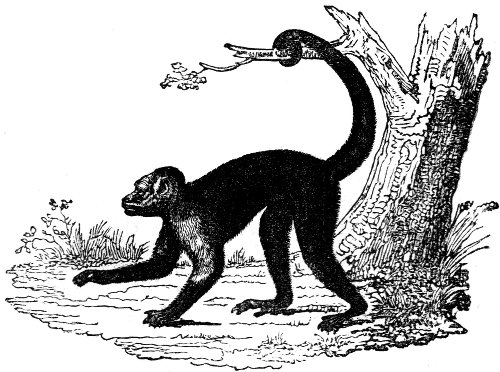
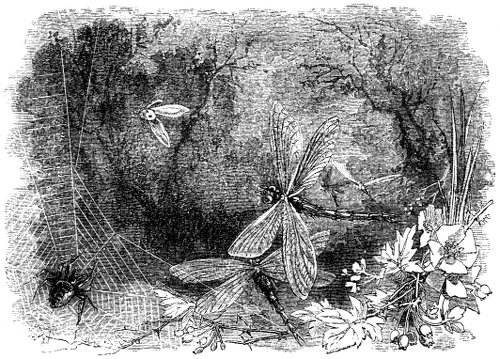

Lady-bird! lady-bird! fly away home—
The field-mouse is gone to her nest;
The daisies have shut up their sleepy red eyes,
And the bees and the birds are at rest.
Lady-bird! lady-bird! fly away home—
The glow-worm is lighting her lamp;
The dew’s falling fast, and your fine speckled wings
Will flag with the close-clinging damp.
Lady-bird! lady-bird! fly away home,
The fairy-bells tinkle afar;
Make haste, or they’ll catch you, and harness you fast,
With a cobweb, to Oberon’s car.
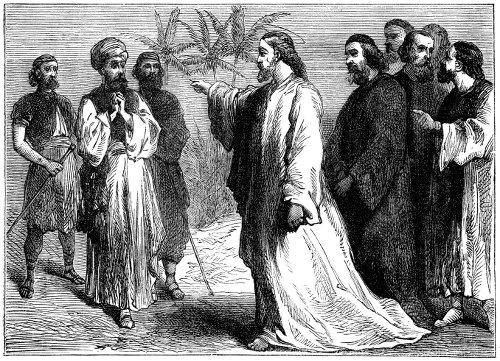

I have already told you, my little ones, how our Lord Jesus Christ turned the water into wine at the marriage feast. That was His first miracle, and one of the few He performed which were not works of healing; for He went about curing the sick, and in some instances restoring to life those who were already dead.
We are told in the Bible that after this first miracle, our Saviour left Cana and went to Jerusalem to keep the 63 Passover, and it is stated that while there He performed several miracles in the way of healing, which were so wonderful that His fame spread throughout the land. After the Passover, Christ left Jerusalem, and turned His steps towards Galilee.
Now in a city of Galilee, called Capernaum, there lived a nobleman, who had an only child, a son, that he loved with his whole heart. The child was very ill—so ill that there was no hope of recovery. The little face that the poor father loved so much grew pale and wan, and the pretty bright eyes lost their brightness. Everything that human skill could do had been tried in vain; but the father had heard of the miracles done by Jesus in Jerusalem, and knowing that He was then passing through that part of the country, he left the bedside of his dying child, and came himself to Christ.
St. John tells us—“He besought Christ that He would come down and heal his son; for he was at the point of death. Then said Jesus unto him, Except ye see signs and wonders ye will not believe. The nobleman saith unto Him, Sir, come down ere my child die. Jesus saith unto him, Go thy way: thy son liveth. And the man believed the word that Jesus had spoken unto him, and he went his way.”
From this account it appears as if the nobleman went to our Saviour only as a last resource, and scarcely believing in His power. This was why Christ said as a sort of reproof, “Except ye see signs and wonders ye will not believe.” Then the poor father prayed again to Him to come to his son, thinking that to save the boy our Saviour must see and touch him. But Christ showed him that He could heal the boy as well at a distance as near, and said, “Go thy way: thy son liveth.”
This man’s faith, you see, had grown suddenly, and became perfect; for he believed without hesitation our Saviour’s word, and returned home at once. He did not stay to question, but he went home, taking it for granted 64 that he would find the miracle performed, and that his son was living as Jesus had declared, although this was the first instance in which Christ had healed at a distance.
He believed so firmly that all would be well when he got home, that he does not appear even to have hurried on his journey; and he met some of his servants the next day before he reached his house. The servants had come out to meet him, and they were the bearers of the happy tidings of his son’s recovery. Then he anxiously inquired when the child began to get better, and they told him: “Yesterday at the seventh hour the fever left him.” And the father knew it was at that hour Christ had said to him, “Thy son liveth.” From that time, St. John tells us the nobleman and all his household were believers.
We learn, my dear children, from this miracle that sorrow and trouble often lead to good. They brought the anxious and sorrowing father to Christ, and caused not only the father but all the household to become believers. Let us trust and pray that through such suffering and such trials as may be in store for us we too may be brought nearer to God.
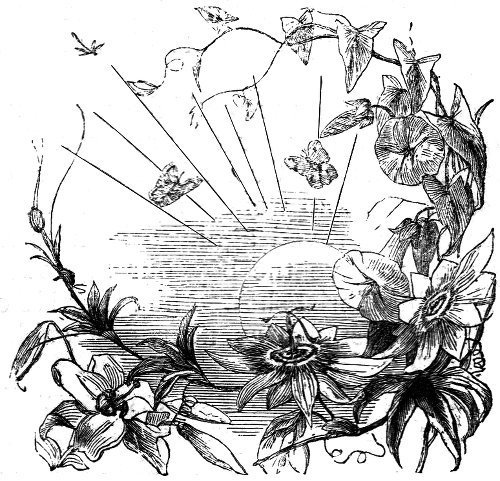
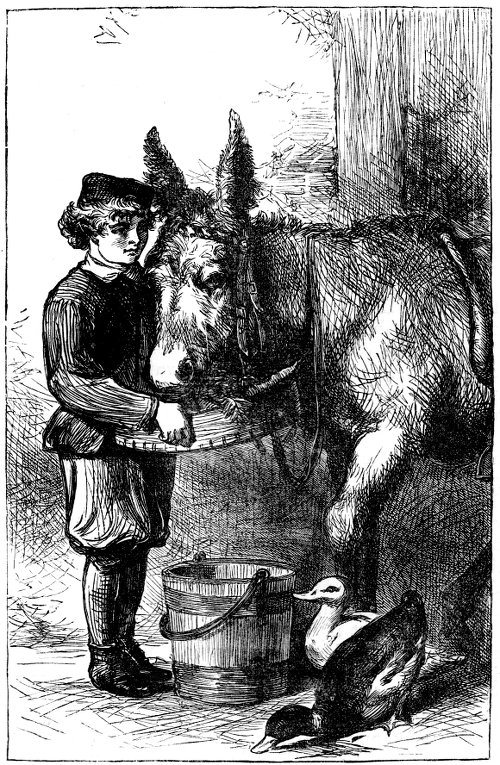

From the heading of this page you would scarcely know which I call my little friend—Jack the boy, or Jerry the donkey. Friends of mine indeed they both are; but I think I am fond of Jerry chiefly on account of the love he bears his little master.
Jack is the oldest of a large family of boys and girls; he is only ten years of age, but there are six other children, all younger than he is. On his fifth birthday he had a rocking-horse given him: it came down from London, for Jack’s home is far away in the country. How delighted the little boy was when the horse stood in the hall, covered up with thick brown paper! He knew it was addressed to him, for he could already read writing when it was large. Then, as the brown paper was taken off, what a jumping and shouting there was: for the other little ones had come down from the nursery to see the gee-gee.
You all know what a large handsome rocking-horse is like, so I need not describe it; and you can imagine what a deal of amusement and pleasure it afforded Jack for a while. However, as time went on, fresh little brothers and sisters arrived quickly; and each in turn, as he or she grew old enough, began to take delight in the gee-gee; until at last my friend Jack scarcely ever had the chance of a ride. And I must say the poor horse looked old and battered, and very different from what it had looked when only used by my little friend.
One day he said to me sadly:—“You see I am getting big for it now, and there are so many of the little ones to ride, so I give it up: the poor gee-gee is worked hard enough as it is.”
Jack was always willing to let the children ride his horse, but, worn and damaged though it was, he could not bear to see them ill-use it. I have noticed the child wince as if with pain, when his sturdy brother Maurice made a great piece of paint drop off with a heavy crack from his whip. “If the boy is so sensitive about a rocking-horse,” thought I, “how careful and kind he would be, if he had a real pony or donkey.”
When I proposed to give Jack a pony, his mamma said she thought he was not old enough to ride one yet, and seemed nervous about it, so I made up my mind that a donkey it should be. I made inquiries, and soon found a dear little creature, which I thought so pretty that I bought it at once. It was very young, and had never before left its mother. Jack named it Jerry: he took such care of it, and made such a pet of the little animal, that it would come at his call, and follow him about, and obey him, just like a large dog.
I remember one day, when we were all sitting at lunch, we heard, patter, patter, patter on the floorcloth of the hall. Presently the door, which was not closed, opened a little way. A soft mouse-coloured nose presented itself, followed by a rough hairy face, with a pair of soft full bright eyes, and after these came two long ears; then the whole of Master Jerry’s head looked round the corner at us. We all burst out laughing, as you may easily suppose; when the donkey, thinking to join in the merriment, put up his head, and raised such a “Heehaw! heehaw!” that we were obliged to clap our hands over our ears, and the whole house, I may almost say the neighbourhood, rang with the sound.
As soon as Jerry was big and strong enough to be ridden, I made Jack a present of a bridle and saddle. He used to ride about in the park and lanes; but when they came home, Jack never forgot to give Jerry a few fresh carrots, or something nice, as you see him doing in the picture.
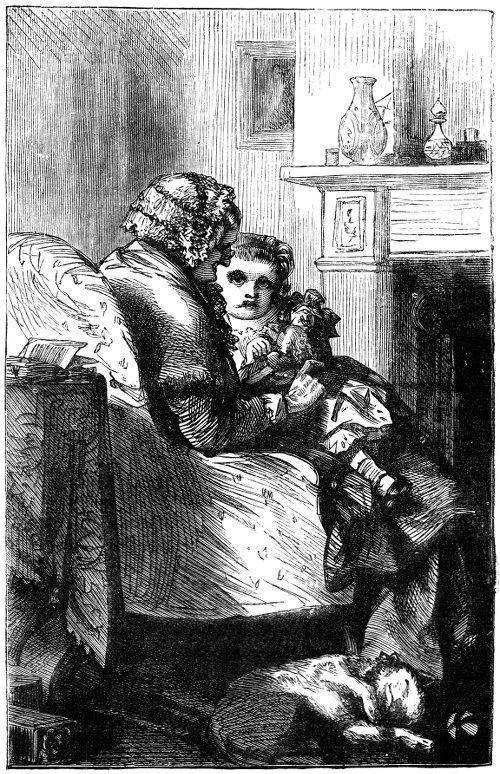
Allegretto. mf.
1.
Come, Rosy, my posy,
You’re weary, you’re dozy,
Sit upon grandmother’s knee;
Songs I will sing,
Sweet sleep to bring,
So nestle up cosy with me,
So nestle up cosy with me.
2.
And I will sing ditties
Of birds and of kitties,
That of the Well to begin:
How Johnny Stout
Pulled the cat out,
While Johnny Green let her fall in,
While Johnny Green let her fall in.
3.
Of little Miss Muffit,
Who fled from a tuffit:
Bobby that sailed on the sea;
Jack and his Jill;
Mouse at the mill;
And Baby that rocked on the tree,
And Baby that rocked on the tree.
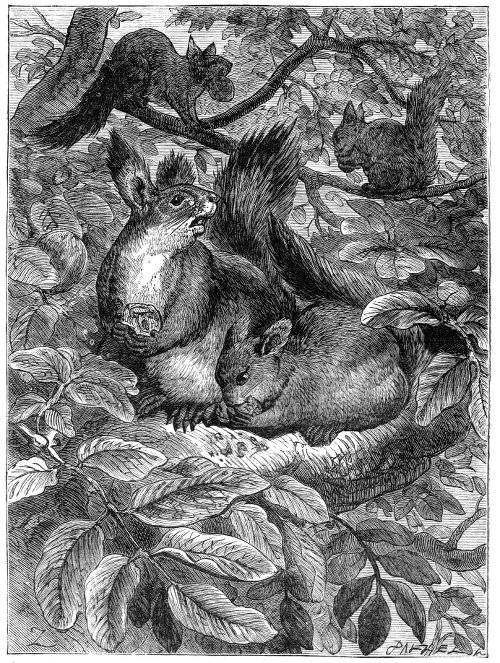

How pretty little squirrels look perched in the branches of a tree! I like to watch them as they nimbly run up the trunk, or spring from bough to bough. One or two are generally to be seen in a clump of great old beeches near a house in the country, where I usually spend some happy weeks in summer; and I will tell you a story of a little squirrel whose acquaintance I made there last summer.
I happened to be up very early one morning, long before breakfast was ready, or any of the family were down, and I went out into the garden to enjoy the fresh sweet smell of the early day. The cows were grazing in the field beyond, and now and then lowing a friendly “good-morning” to each other. Some ducks were waddling in procession down to the pond, quacking out their wise remarks as they went. The little birds were singing lustily their welcome to the new-born day. Even the old watch-dog came yawning, stretching, blinking, and wagging his tail in kindly dog-fashion, to bid me “good-day” in the summer sunshine.
As I stood under the great beech trees, taking in with greedy eye and ear the sights and sounds of country life so refreshing to a Londoner, I heard something fall from one of the trees, then a scuffle, and immediately afterwards a white Persian cat, belonging to the house, bounded towards me in hot pursuit of a dear little squirrel. I was just in time to save the poor little animal by stepping between it and the cat. The squirrel passed under the edge of my dress, and made off again up another tree; so pussy lost her prey.
Soon afterwards, when we were at breakfast, the butler told us that one of the little boys of the village, who had 72 lost a pet squirrel, had asked if he might look for it in the garden of the house. It had first escaped into some trees in the park, and he had traced it from them into the garden. It at once occurred to me that this must be the little creature I had saved from the cat. I remembered how it made straight towards me, as if asking me for protection from its enemy, which only a tame squirrel would do; and I proposed, when breakfast was over, that we should go out and help in the search.
Little Jack Tompkins stood under the beech trees, looking with tear-stained face up into the branches. Suddenly I saw his face brighten, and he called out: “I see un, ma’am; I see un! If so be no one warn’t by, I be sure he’d come to I.”
I need not say we retreated to a distance; then Jack called up the tree in a loud whisper: “Billee, Billee!” and in a minute down came the little creature on to his shoulder. I can tell you Jack was a happier child than he had been when he came into the garden. And when I told him what a narrow escape “Billee” had had from the cat, he said: “It would be hard if a cat eat he, for our old puss brought he up with her own kits.” Then he told us how the squirrel, when a tiny thing, had dropped out of its nest, and been found by him lying almost dead at the foot of a tree, and how he had carried it home, and tried whether pussy would adopt it as one of her own kittens. The cat was kind; the squirrel throve under her motherly care, and became Jack’s pet and companion.
Now, children, in this instance it was all very well to keep a tame squirrel. “Billee” seemed happy, leading the life he was accustomed to: he had been fed and cared for by human beings from his infancy, and might be as incapable of finding food, and managing for himself, in a wild state, as a poor canary would be if let loose from its cage. But generally it is cruel to imprison little wild birds and animals who have known the enjoyment of liberty.
Squirrels are interesting little creatures. Besides being so pretty, bright-eyed, and active, they are remarkably intelligent. They make their nests in trees as birds do, but with even more ingenuity than most birds. The materials of the nest are moss, leaves, grass, and fibres of the bark of trees, all neatly woven together. The nest is waterproof, and secure from the roughest gale of wind; it is, besides, carefully hidden from the view of any passer-by beneath. The food of squirrels consists of vegetables, nuts, acorns, and other fruits and seeds. These little animals have the forethought to lay up provisions for the winter; and not only do they keep a little store in their nests, but in any hole they may chance to find in the surrounding trees. Sometimes they have a dozen secret storehouses within a few leaps of their nest.

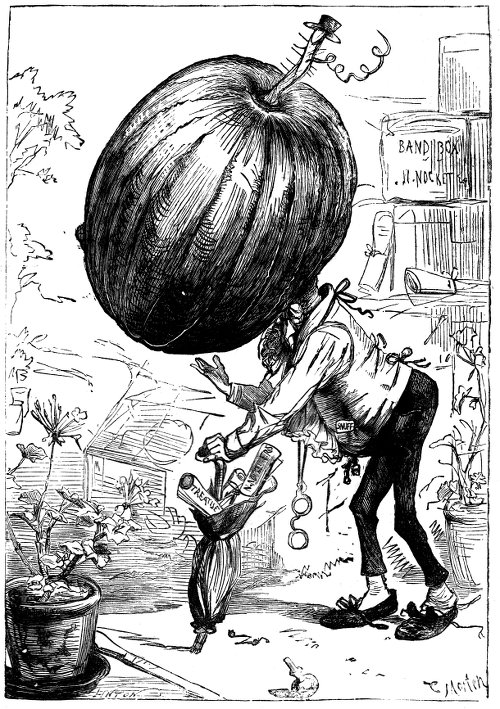

Of all the things to make you stare,—
A Pumpkin-Head, I do declare!
That such a thing could come about
One almost feels inclined to doubt.
The story’s sad, if true it be:
I’ll tell it as ’twas told to me.
A man once lived whose name was Nocket,
Who dearly loved to fill his pocket,
And for the poor he had small pity.
By trade a hatter in the city,
He from his shop went up and down
To his cottage out of town;
And in his garden took delight,
And worked in it with all his might.
A treatise he had written too
On kitchen-gardening. So you
May well suppose he heard with glee
A garden-show there was to be;
And that a prize among the rest
Would be awarded for the best
And largest pumpkin at the show.
“Ha! ha!” thought Nocket, “now I’ll grow
A pumpkin shall be such a size
It will be sure to gain the prize.”
In hothouse, where the heat was greater
Almost than in Mount Etna’s crater,
The pumpkin grew, and grew so fine
That Nocket asked his friends to dine.
And showed it to them all with pride.
“Magnificent!” the friends replied;
Excepting one, who looked quite sly,
And said, “You’ll see mine, by-and-by.”
’Twas Nocket’s next door neighbour, Wright,
Who spoke those words: and all that night
Nocket slept not; spiteful and sad,
At length he formed a purpose bad:
At early dawn, without a fall
He clambered o’er the garden wall,
And of Wright’s greenhouse ope’d the door,
Laid his own pumpkin on the floor;
There found the biggest ever seen,
Compared to which his own look’d mean.
Upon his head with might and main
He hoisted, it; and once again
He climbed the wall. Then found—worse luck!—
The pumpkin on his shoulders stuck.
In vain he wriggled, struggled, fought,
His head was in the pumpkin caught;
And from that day the thing stuck fast
On Nocket’s neck. ’Tis sometime past;
Still, if the story be but true,
We yet may see it—I or you.
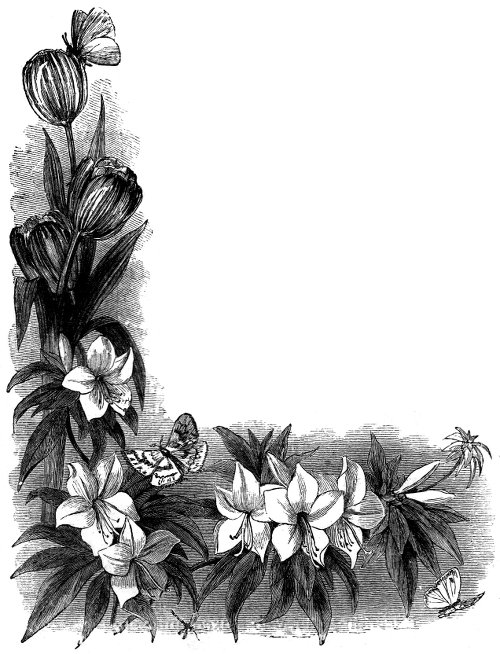

Mr. and Mrs. de Roisel were accustomed to spend the winter in Paris; and when November came on, and the time for their departure arrived, it was not without anxiety that Maurice thought of taking Cressida to live on the first floor of a Paris house. The rooms were large and handsome, it is true, but not suitable for a horse: it was necessary, however, to make the best of circumstances.
They drove to the railway station at Savigny, where Mr. de Roisel arranged for them to have a carriage to themselves, and Cressida was lifted into it, for Maurice wanted to make the journey to Paris mounted, on the back of his horse. Off they started: my little friend, firmly seated on his saddle, went along at the rate of forty miles an hour. In less than an hour, however, they reached Paris, and then Maurice confessed that he felt tired: it was the first time he had made so long a journey on horseback.
Arrived at their own house, Maurice at once set about making the pony as comfortable as he could. The first night Cressida had to rough it a little; but in the course of two or three days Maurice had fitted up in his own bedroom a stable, which corresponded with the general comfort and elegance of the rooms occupied by the family.
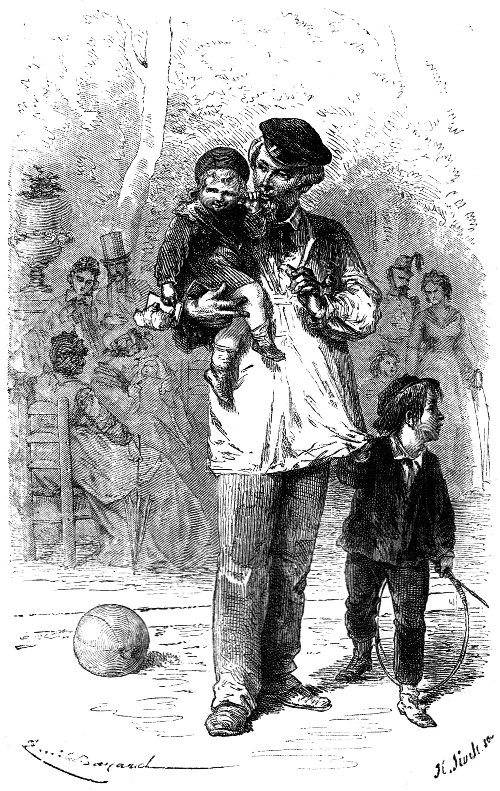
THE WORKMAN, AFTER HIS DAY’S TOIL IS OVER, WALKS THERE WITH HIS CHILDREN.
Picture to yourselves a white tent embroidered in blue, supported against the wall of the room. The entrance to it is shut up by curtains; but when open, these curtains are held back on each side by broad blue ribbons. Inside the tent, at the end against the wall of the room, are a rack and a manger of ebony. At one side stands a large chest, also of ebony: it is divided into two compartments—one 79 for corn, the other containing everything required for grooming a horse. Also at the end of the tent, hanging against the wall, are a saddle and bridle of Russia leather, and two or three whips. I must add that a beautiful sheepskin rug, white and soft as the down of a swan, takes the place of the straw put down for litter in a common stable. Such was the new abode of the pretty pony.
When it became known that Maurice possessed a wonderful horse, which, though made of wood, could gallop, and neigh, and shake his head like a real horse, he received numerous visits; and his little friends envied him his happiness. Several of them proposed to him that he should give them Cressida in exchange for some of their own beautiful toys; such as, for instance, a mule with bells, like the mules in Spain; a pretty sailing boat, intended to sail on the basin in the Tuileries; a box containing everything required for performing the astonishing tricks of the famous conjuror Robert Houdin; a whole flock of sheep with their shepherd; and one little girl offered him her most beautiful doll—a doll that had the air of a queen, and whose clothes were made of fine cambric and lace.
But what were the most beautiful toys in the world compared to Cressida? Maurice, who had so bravely resisted the temptation of giving his horse in exchange for Jeanne, found no difficulty in refusing these offers.
For some days after Maurice arrived in Paris, the weather continued mild and fine, although it was so late in the autumn; and he was able to go out several times with Cressida into the gardens of the Luxembourg. These gardens may not be particularly fashionable, but they are very beautiful all the same. You may see there elegantly dressed ladies and gentlemen, and children with clean and tidy nurses; but you also see there, in the evening, the workman, after his day’s toil is over, walking with his children; perhaps carrying one in his arms: and though he may carry it awkwardly, it is still touching to see what care he takes of it.
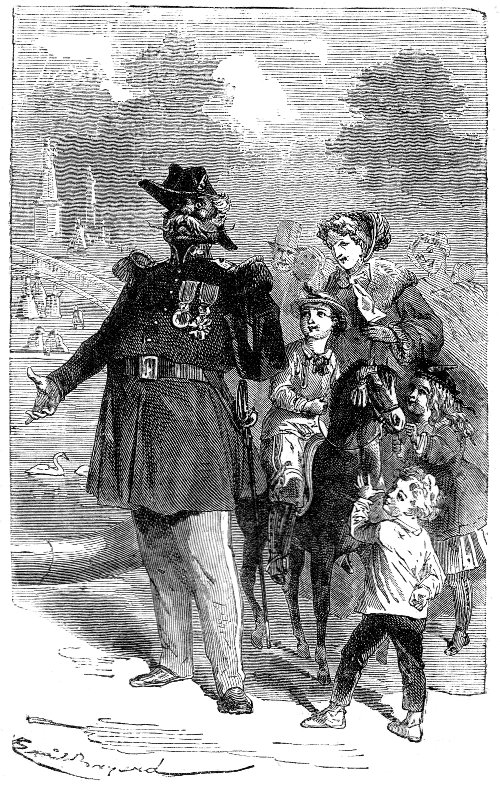
ONE OF THE KEEPERS OF THE GARDENS MAKES A MISTAKE.
My little friend, whose parents had no prejudice against the gardens for reasons of this kind, went there often, and delighted in riding up and down the great avenue upon Cressida. They made a sensation together, I assure you. 81 Not only the children, but the mammas and even the gentlemen expressed their surprise and admiration. Many people thought at first that Cressida was a real pony. I have been told, though I do not vouch for the fact, that one of the keepers of the gardens, going up to Maurice, summoned him to leave, because it was not permitted to ride there on horseback. This caused great amusement, as you may suppose, among the lookers-on. It has been said also that this mistake of the keeper was reported in the Journal des Enfants—(The Child’s Journal)—a day or two after it occurred, but I cannot say I recollect reading it. Maurice used to take his horse into the Luxembourg gardens every day that it was fine, and enjoyed his rides very much.
Maurice had an uncle—his mother’s brother—a lieutenant in the navy, who returned about this time from a distant expedition. He came to rest from his fatigues at Paris, and took up his abode with his sister, of whom he was very fond. He was a young man of about twenty-eight or thirty years of age, intelligent, and of very agreeable manners. But beneath this amiable and gentle surface, he possessed a strong will, and a resolute devotion to whatever he might consider to be a duty.
The uncle and nephew soon became great friends, and were almost inseparable. They used to go out walking together, and sometimes the uncle would teach Maurice his lessons. In the evening they often went together to the circus or to an exhibition of some sort. But when they passed the evening at home, Maurice was almost more amused; for he never tired of looking over books of sketches, which his uncle had made during his voyages.
There were sketches representing the Red Indians of America; the natives of Australia; the inhabitants of the islands in the Southern Pacific, and of the coasts of Africa. Maurice was astonished to see faces painted in all the colours of the rainbow; and he wondered at the singular ideas savages have of making themselves look more beautiful. 82 He saw some with pieces of wood fixed into their under lips, to make them hang down; some with their teeth blackened; others with their eyelids painted red. There were also sketches of Laplanders, who were certainly not handsome,—not figures that a sculptor would choose for models. Maurice’s uncle gave him an account also of the manners and customs of all these people, and my little friend learnt with horror that among savages, there are those who roast and devour their fellow-creatures with the same relish with which we eat good roast beef and mutton.
Then his uncle showed him landscapes of strange countries, all drawn by himself, and sketches of the principal cities he had visited; afterwards, drawings of foreign birds and flowers, such as are not to be found in Europe. All this interested Maurice, and while it amused him, gave him lessons in natural history and geography. You will easily understand how fond he was likely to become of such a kind companion and teacher.
The uncle always showed a great interest in Cressida, admired its mechanism, and was fond of watching the little horse and its rider as they went along together. One day, when he had been looking at them for some time with a very thoughtful air, he said suddenly:—
“I wish I had a horse like Cressida.”
“Why not buy one then?” replied Maurice.
“Ah, you know very well that is impossible. There is no such horse to be had anywhere.”
“That’s true,” rejoined Maurice; “but why do you want a wooden horse—you who are so big, and can ride a real horse, if you wish?”
“No real horse—not the most beautiful in the world—could be the same to me as Cressida,” rejoined the uncle. “It may seem like a caprice, but it is not. I am going to sea again very soon, and I confess I should like to take Cressida with me. I could amuse myself with him on board ship. He would be a great resource during the long tedious hours when there is nothing to do. Besides, 83 if I had the horse I should feel myself less separated from you all; and it would remind me of you particularly, Maurice, whom I shall be so sorry to leave.”
“Ah, my dear uncle, what you desire is impossible. I cannot give you Cressida.”
“I don’t expect you to give it me for nothing, of course.”
“Indeed I wish I could give it you for nothing.”
“Listen, now, to what I intend to do: I will leave you in exchange all my books of sketches.”
“Oh, pray stop, uncle,” cried Maurice, feeling more and more unhappy; “what you are saying makes me so miserable. You know I promised Fritz never to part with Cressida.”
“But every day people make promises which they do not keep: besides, Fritz did not know that I should ever wish to have the horse, when he asked you to make that promise.”
“Still, I gave my word.”
“Yes, the word of a child: what does that signify?”
“Does age make a difference? Are not children expected to keep their promises?”
“Oh, I don’t mean to say exactly that,” replied the uncle. “Your own conscience must teach you how that ought to be. But I think it strange that you should prefer that old Fritz to me.”
Now you must not suppose, my little readers, that Maurice resisted his uncle’s persuasion with the calm steadfastness of a grown-up man, whose mind is quite clear as to his duty, and who is quite decided to keep to it. No: poor little Maurice found his heart drawing him one way and his conscience another. At last he wisely determined that he would take an opportunity, when alone with his father, to ask his advice: but the young lieutenant did not give him a chance of doing this, for he began again upon the subject the same evening.
“I have been reflecting,” he said to Maurice, “and I 84 think my books of sketches are not sufficient to give you for your horse. Listen now: besides the books, I will give you a real pony. Perhaps he will be rather bigger than Cressida; but I will buy one as much like Cressida as possible.”
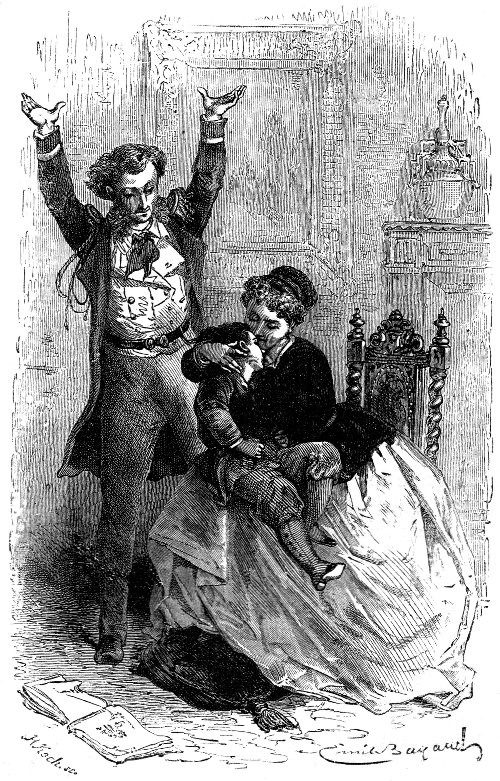
“YOUR SON IS A HERO!”
“Well, but,” said Maurice, “why not keep the live one for yourself? You can even call it Cressida if you like.”
The young officer was a little put out by this suggestion, but after a minute he replied:—“I could not take a real horse with me on board ship; but a wooden horse is different. Now look here: not only will I give you the pony, but you shall have a groom expressly to take care of it; and both groom and pony shall be kept at my expense while I am away. I will pay, besides, for you to have some lessons in riding, so that when your papa goes out on horseback to the Bois de Boulogne you will be able to ride by his side.”
“You will do all that?”
“Yes, really, I will do all that.”
“Ah, no, no! I cannot give you Cressida. If that poor Fritz should ever come back, I will tell him all; and perhaps he will let me give you the horse.”
“You behave to me like a selfish and ungrateful child.”
“Oh, uncle, uncle,” exclaimed poor little Maurice, and he began to weep bitterly, “is it possible that you say this to me seriously? Ah, well! then you shall have——” He was going to say,—“you shall have Cressida;” but as he spoke his mother entered the room. Her presence seemed to remind him that he was going to break his promise after all; and he went on:—“You may think what you please, uncle, but I will not give you Cressida.”
“Really!” exclaimed the young man with an appearance of delight which astonished Maurice.
“And now go away from me, pray,” said Maurice, still crying bitterly. “I am ill; I think I am going to faint:” and he ran into the arms of his mother.
“Your son is a hero!” cried the young officer, joyfully, addressing his sister. “He is a hero, I say.”
“And you—you are cruel,” replied the mother, caressing her son, who was sobbing convulsively.
“But did you not hear,” said the young man, “how he kept to his word,—how he refused to give me Cressida?”
“It is not right,” said the mother, “to torture a child by such a trial. Suppose out of love for you he had given way; you would have reproached him for listening to the dictates of his heart rather than obeying his sense of duty. Let me tell you that what is a virtue in grown-up people, is not always so in a child. It is through their affections that we govern children, and you would teach him to combat his tenderest feelings. Besides, you set a bad example: you were practising a deception in pretending that you wanted the horse.”
“What! uncle,” cried my little friend, who began to recover, “was it only make-believe when you asked me for Cressida? You only wanted to see if I should keep my promise? You would not have loved me any longer, perhaps, if I had given it to you; and yet I should have given it because I love you.”
“You hear that,” said Mrs. de Roisel.
“What a great man this little fellow will make some day!” exclaimed the uncle.
I daresay my little readers can see, though the uncle did not, how near Maurice was to yielding and giving up Cressida at last. We will allow the young officer to remain in ignorance upon this point, but let us tell him that it is always better to prevent faults than to provoke them.
(To be continued.)
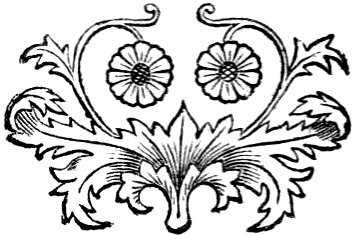

Now, children, try to find out this puzzle page. The names of two of these objects begin with C, one with E, one with G, one with I, and one with M.
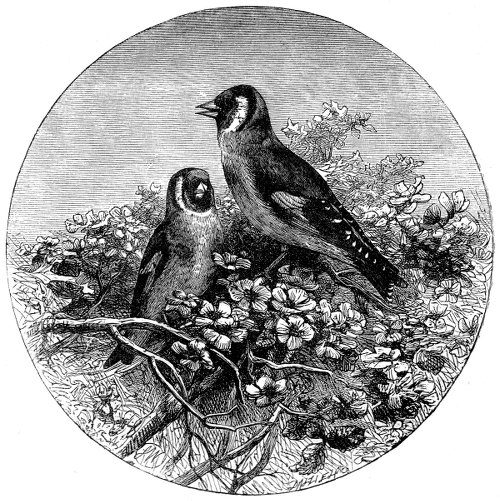

Birds are in the woodland, buds are on the tree,
Merry spring is coming, ope the pane and see.
Then come sportive breezes, fields with flowers are gay,
In the woods we’re singing through the summer day.
Fruits are ripe in autumn, leaves are sear and red,
Then we glean the cornfield, thanking God for bread.
Then at last comes winter, fields are cold and lorn,
But there’s happy Christmas, when our Lord was born.
Thus as years roll onward, merrily we sing,
Thankful for the blessings all the seasons bring.
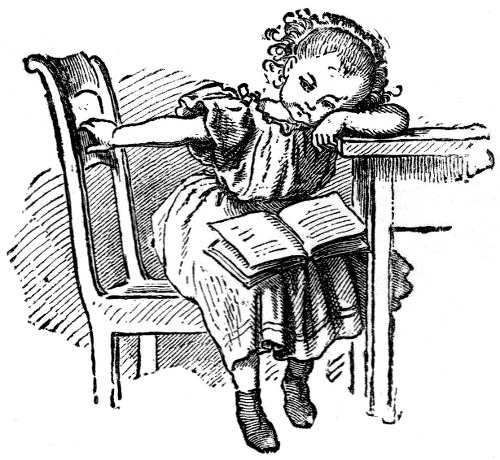
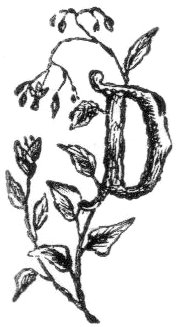
Darling little Lily! This is just how I found her one day after somebody had given her a picture book of Cinderella.
“What is my little woman thinking about that she looks so sad and solemn?” asked I.
“I so sorry for Umbrella,” answered Lily, quite sharp and pat, thinking she had hit upon the name finely; “but I not be sorry any more, for my mamma come, and mamma love me.”
I finished the story to her, when her pity changed into joy at “Umbrella’s” happy marriage with the young prince.
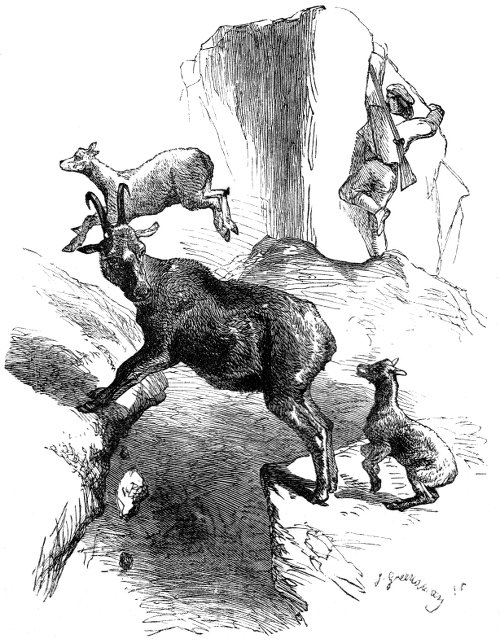
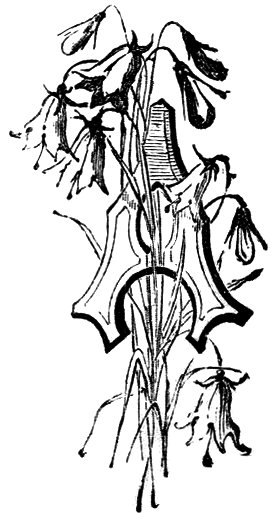
A hunter in the Tyrol, while engaged in his dangerous employment, spied a chamois with two little ones on the top of a rock. The little chamois were leaping and sporting by the side of their mother, and she, while watching their gambols, was on the alert to see that no enemy came near to hurt them. The hunter peeped over a rock at the happy family, and determined, if possible, to take one of the young ones alive. When the old chamois caught sight of him, she was in a sad state of alarm: she ran up to her little ones, and tried to lead them on to leap from one rock to another; but they were too young to leap far. In the meantime the hunter was clambering nearer and nearer, and would soon reach them.
Presently they came to a chasm, not very wide across, but of immense depth. One of the little chamois was big and strong enough to leap across it, the other was not. At last the mother hit upon a plan: she made her body into a bridge across the chasm, placing her forefeet upon the further rock. The young chamois, understanding her intention, sprang upon her as lightly as a kitten, and reached the other side; when they all scampered off. The hunter did not dare to follow them over this dreadful chasm, and they were soon safe beyond the range of his gun.
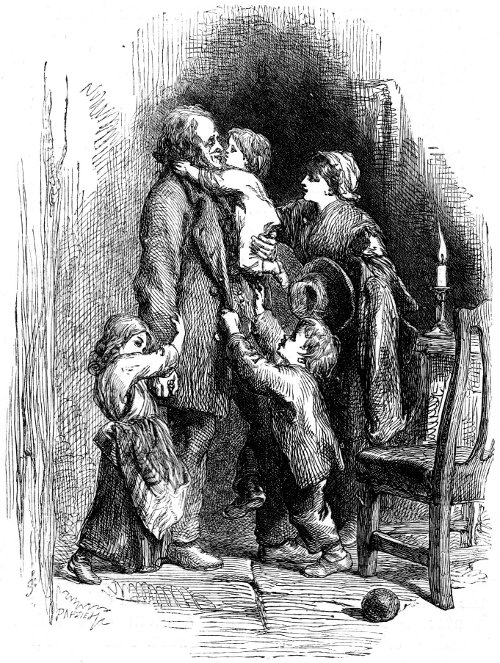
What could we without them,
Those flowers of life?
How bear all the sorrows
With which it is rife?
As long as they blossom,
Whilst brightly they bloom,
Our own griefs are nothing,
Forgotten our gloom.
We joy in the sunshine,—
It sheds on them light;
We welcome the shower,—
It makes them more bright;
On our pathway of thorns
They are thrown from above,
And they twine round about us,
And bless us with love.
Bright, beautiful flowers,
So fresh and so pure!
How could we, without them,
Life’s troubles endure?
So guileless and holy,
Such soothers of strife;
What could we without them,
Sweet flowers of life?
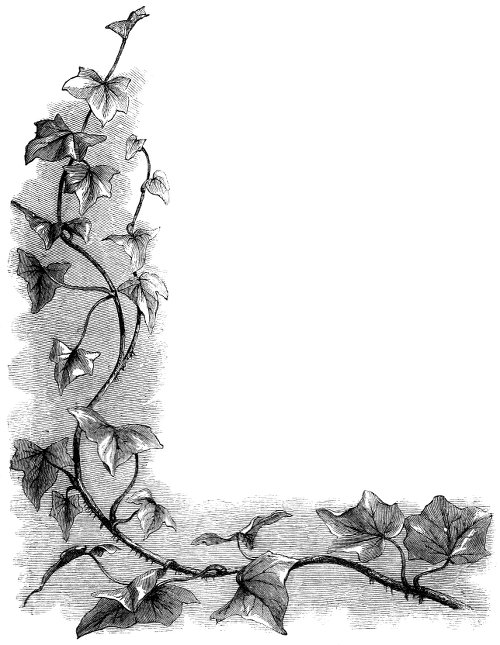

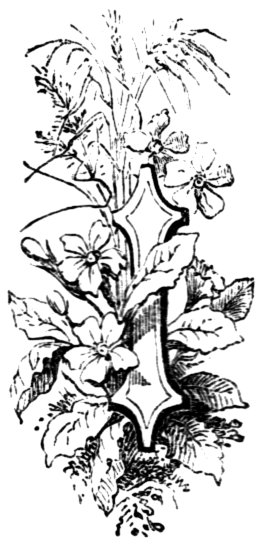
I must tell you to-day, my dear children, about one of the miracles of our Saviour of which I daresay you have already heard. Perhaps, too, you have seen engravings of the picture from which the woodcut above is taken. It is a large painting by Raphael, a great Italian artist of former days, whom you will know more about when you are older.
After our Saviour had healed the nobleman’s 95 son—the miracle I described to you in our last Sunday-talk—we are told in the Bible that He left Cana and went to Capernaum, a town on the shore of the lake, or sea, of Galilee. The country surrounding this beautiful lake is now desolate and barren; but at the time when our Saviour lived upon earth, it was fertile and thickly populated. On the banks of the lake were towns and villages; on its waters boats plied, engaged in pleasure or trade; and many fishermen carried on their calling.
One evening our Lord walked on the shore of the lake, teaching His disciples, when He found Himself surrounded by a multitude of people. They pressed about Him, eager to hear Him preach; and in order to let them hear and see Him better, He entered into one of the fishing-boats which belonged to Simon Peter. And Christ prayed Simon Peter to thrust out the boat a little from the land: then He sat down, and taught the people from the boat.
We are not told what was the particular purport of His teaching on this occasion, but when He had done, He resolved to render what He had said more impressive by performing a miracle before the eyes of all the people. He turned to Simon, and told him to cast forth his nets to catch fish; upon which, St. Luke tells us, Simon answered: “Master, we have toiled all the night and have taken nothing; nevertheless at thy word I will let down the net.”
This is the language of obedience and faith. The net was at once cast into the sea, and it enclosed such a quantity of fish that it began to break. In the boat with Christ, besides Simon Peter, was another fisherman, named Andrew; and they beckoned to their partners, James and John, the sons of Zebedee, who were in another boat, to come to their assistance. Both boats were filled so full of fish that they were almost sinking.
Scripture does not give us any account of the impression this miraculous draught of fishes made upon the multitude 96 that were looking on from the shore; but the first thought of Simon Peter seems to have been a sense of his own unworthiness. Falling down at our Saviour’s feet, he cried: “Depart from me; for I am a sinful man, O Lord.”
With mingled feelings of humility, gratitude, and awe, he entreated Jesus to depart from one who was so guilty and undeserving. But he did not know the love of Christ towards him, or the gracious design of this miracle. His fears were soon calmed. “Fear not,” said Jesus to His trembling disciple: “from henceforth thou shalt catch men.” From that time Simon Peter, and his companions, Andrew, James, and John, were to be employed in preaching the gospel. These poor, ignorant fishermen became endowed with wisdom and eloquence; and in the wonderful draught of fishes they might foresee their future success. They were to be “fishers of men”; the world the sea in which they were to labour.
St. Luke says of them: “When they had brought their ships to land, they forsook all and followed Him.”
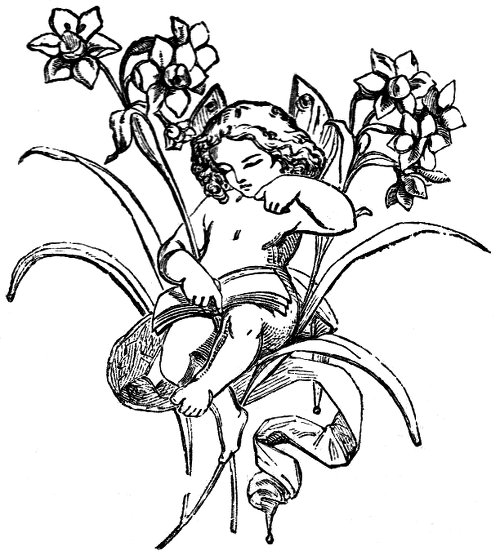
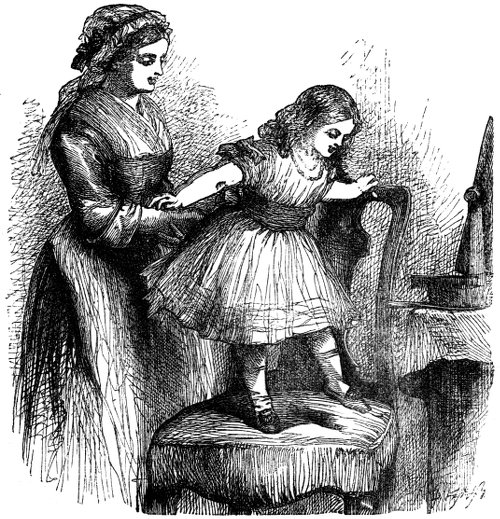

The little girl you see in the picture is one of the very nicest of my little friends. She looked just as you see her there on the day of her party, which was given in honour of her fourth birthday. I remember going into the nursery while she was being dressed. Nurse was just arranging her sash, while she stood on a chair in front of the looking-glass, admiring her little self generally; but most admiring her pretty blue shoes, which just matched her sash.
When she saw me at the door, she cried out: “I ready now; wait for me.” And jumping off the chair and seizing my hand, she tripped away downstairs, chattering merrily as she went. The time of the year was the end of April, and Ruby’s home being in the country, and the weather very fine and warm, some of the festivities took place out of doors in the garden. There were dances, and all sorts of games, on the dry sunny lawn, a soft westerly wind blowing on the happy children the while, bringing health and enjoyment with its sweet balmy breath.
While their fun was at its height, a curious figure appeared upon the lawn. It was a queer-looking old woman with a nutcracker face, carrying a large basket under her arm. She went hobbling along here and there, in and out, among the children. From the basket came balls, tops, dolls, and all sorts of toys, for the younger ones; useful presents for the bigger children. Was there ever such a curious old woman, or ever a basket that held so much? How they all laughed when presently she threw off her mask, bonnet, and cloak; and behold! Ruby’s papa stood before them.
Now it was tea-time, and the little people trooped into the house. After tea they were requested to walk into the drawing-room to be introduced to Count Shuffalongofriski, the Polish dwarf, and his friend Captain Sovveritall, the wonderful giant. Going into the room, they beheld a little man standing on a table placed in the recess of a large window, the curtain being partly drawn round the table. The dwarf wore a turban and large beard: he had a long pipe in his mouth, and was dressed up in shawls. He seemed very affable and pleasant, jabbering away continually in some unknown language, while now and then he threw a handful of crackers among the children to be scrambled for.
Presently an enormous figure appeared stooping to come through the door of the room. He was covered up with a long cloak, and was an oddly made giant too, for his 99 shoulders seemed to stick out little more than half-way up him, and he had a tiny little face, with a voice much weaker than the dwarf’s. He stalked up to the dwarf’s table and stood beside him. At last a little boy of the party, being very curious, lifted up the giant’s cloak to peep beneath, but happening to pull it at the same time, down it fell, and there stood Ruby’s papa again, with her little brother Johnnie on his shoulders.
And now the boys were becoming uproarious, and tried to peep behind the curtain to find out how the dwarf was made, when their attention was attracted by the sound of a fiddle playing outside. They saw, in the fading light of evening, a poor blind man being led up the carriage drive by a barefooted little girl about the size of Ruby. As the blind fiddler and his little girl turned the corner of the drive towards the hall-door, they passed out of sight from the drawing-room windows, and I observed that Ruby and three or four other children ran into the hall to meet them. The boys, however, turned once more to pursue their investigations concerning the dwarf, and were becoming quite riotous, when I thought I might as well see what was going on in the hall, for I heard the fiddler playing lustily.
Entering the hall, what do you suppose I saw? I saw Ruby and four or five other little girls, including the fiddler’s child among them, dancing away with all their might to the inspiriting music of the fiddle, fiddler and children seeming as happy as possible together. But the strangest sight of all was to see Ruby’s pretty blue shoes upon the dirty stockingless feet of the fiddler’s child, while Ruby herself had only her white silk socks to dance in.
Dear little Ruby! hers was the true spirit of charity, though certainly not well directed.
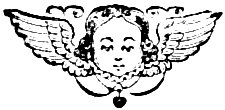
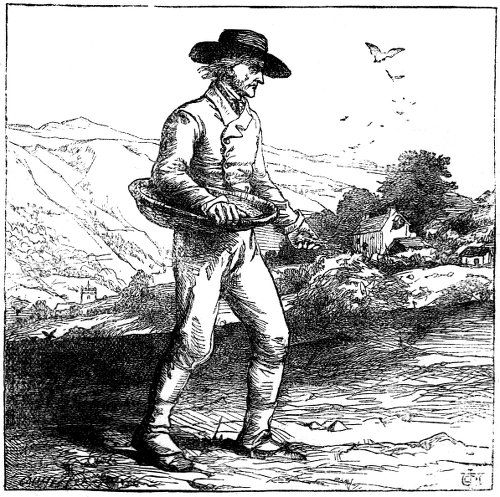
Allegretto.
1.
“Caw! caw!” says the crow,
“Spring has come again, I know:
For, as sure as I am born,
There’s a farmer planting corn;
I shall breakfast there I trow,
Long before his corn can grow.”
2.
“Quack, quack!” says the duck,
“Was there ever such good luck!
Spring has cleared the pond of ice,
And the day is warm and nice,
Just as I and Goodman Drake
Thought we’d like a swim to take.”
3.
“Croak, croak!” says the frog,
As he leaps out from the bog;
“Spring is near, I do declare,
For the earth is warm and fair;
Croak! croak! croak! I love the spring,
When the little birdies sing.”
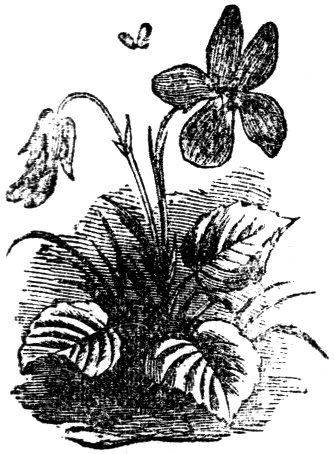

Some months later, when the Spring had come on, and the sun was beginning to give warmth, while the air was already perfumed with violets, Maurice was walking, one beautiful morning, in the Luxembourg gardens. He had Cressida with him, whom he sometimes rode and sometimes led, and Jacques the old servant was also there. A number of children were in the gardens, playing at different games, and enjoying themselves in the bright sunshine. They were chattering away too as gaily as the little wild birds overhead were singing in the soft air.
Maurice alone was not amusing himself, and old Jacques the servant walked after him in silence, looking as sad as his young master. Alas! my kind-hearted little readers, you will be grieved, I know, when you hear the cause of my little friend’s sadness: Maurice’s father was seriously ill.
That very morning Maurice had been present, without any one knowing it, at a consultation between two famous doctors, who were attending his father. He happened to be in the drawing-room, standing at a window and half hidden behind the curtain, when they came in, and they had not observed him. Although he did not understand all they said, he heard enough to cause him great unhappiness and alarm. He had now come into the Luxembourg gardens—not because he thought of amusing or enjoying himself, but because his mamma had wished him to go out.

MAURICE WAS PRESENT AT A CONSULTATION.
While he was sitting on Cressida’s back, with the reins thrown carelessly on its neck, and moving at a slow walk to suit his thoughtful and sad mood, he noticed that a little girl, rather older than himself, was coming towards him as 104 if she wished to say something. She was accompanied by a lady, too young to be her mother, of a graceful figure though simply dressed. The little girl, whose face expressed a bold and decided character, called out to Maurice,—
“Young gentleman, sell me your horse.”
“Sell Cressida!” cried Maurice, with astonishment. “Oh, no, certainly not.”
“I will pay you with ten pieces of gold money that I have here in my purse.”
“What! you’ve got ten pieces of gold money of your own?”
“My very own.”
“Do just let me look at them,” begged Maurice.
“Look!” said she, opening a pretty little purse with an air of triumph.
“What a lot of gold!” exclaimed my little friend, and he put out his hand to touch it. Then drawing his hand quickly back, he added: “No, no, I cannot sell Cressida. But tell me, who has given you all this gold?”
“It was my papa. Yesterday was his birthday, and I repeated to him a bit of poetry—such pretty poetry!—wishing him many happy returns of the day. Miss Henriette—she’s my English governess, the young lady you see there—she had written it out for me. When I repeated the lines to papa, he gave me these ten napoleons, and he told me to buy something handsome with them for myself,—anything I liked.”
“But I have no idea of selling Cressida,” repeated Maurice.
“You’ve not had him long then, I suppose—not got tired of him yet?”
“I don’t remember exactly how long; eight or nine months perhaps.”
“Nine months! It’s an age; I never kept a plaything for nine months.”
“What do you do then?”
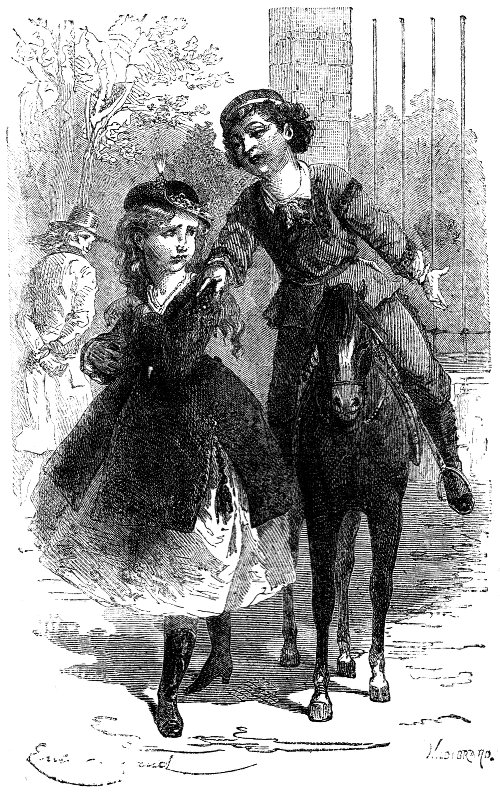
“NO, NO, I CANNOT SELL YOU CRESSIDA.”
“I give them away or I break them. Don’t you get tired of having the same toys always?”
“Cressida is not a common toy to me.”
“Oh, he’s very handsome, no doubt; I thought at first 106 he was a real pony. But with ten napoleons you can buy another,—you can buy a white one, and that would be a change, you know. Come, you’ll alter your mind, won’t you?”
“No, certainly not.”
“Oh, yes.”
“Indeed, I’m sure I shall not.”
“You are not like me then,” replied the little girl, “I am always changing my mind. Yesterday, what I wished for most in the world was a set of cups and saucers of Sèvres china for my doll; this morning I wanted most a coral necklace for myself; then I wanted an ermine muff; and now I want to buy your horse. Don’t I change my mind often? But your horse I really wish for very much: the fact is I never saw one like it at any toy-shop.”
“I should think not,” said Maurice.
“But I shall only care for it, you know, till I have a real pony. My papa has promised to buy me a real pony in a year.”
“Your papa is rich then?”
“Is my papa rich! I should think so indeed. My papa is a wine-merchant, and he has made thousands upon thousands and millions upon millions in his business: he’s going to make a great deal more yet too, I can tell you.”
This heaping up of millions upon millions caused Maurice to open his eyes very wide.
“What is your name?” he asked of the young girl.
“I am called Adrienne,” she replied.
“Adrienne what?”
“Adrienne Fallachon, since you wish to know. But that will not be my name always, for my papa intends me to marry a duke or a prince when I am old enough. Some little girls I know turn up their noses at me because my papa is a wine-merchant, and I told him of it one day. Oh, he was in such a passion! What names he did call them! He took me up on his knee, and said he loved me doubly since my mamma died; and he declared he would 107 make such a deal of money to give me when I marry that I should be a princess, or a duchess at the least. That’s what he said: isn’t he a good papa?”
“Oh, yes, indeed he is. But those little girls were very ill-natured, I think.”
“Yes, were they not? Suppose now we become great friends. I shall be here every day, and sometimes we’ll play together: do you agree?”
Maurice said he should be very glad.
“But I’ve told you my name,” went on Adrienne; “tell me now in return, what’s your name?”
“Maurice de Roisel.”
“Maurice de Roisel! that’s a pretty name. Have you a title? If you have, I’ll marry you when you’re grown up.”
“Oh, as for a title, I really don’t know, but I’ll ask mamma if I have one.”
“Do; you need only be a duke, you understand.”
Saying this she went off to play with her hoop, and Maurice continued his ride, with Jacques walking by his side.
As Maurice approached the gate of the garden, he beheld a sight which filled his kind young heart with pity. Seated on the pavement outside the garden, and leaning against the iron railing, was a young woman with three pretty children. They appeared to be in the deepest despair, but there was a certain dignity in their grief; they wept silently, and seemed anxious to avoid the notice of the passers-by. As he watched them, he thought to himself—his mind dwelling upon his own anxiety—“I wonder if their father’s dead that they cry so bitterly?” He did not like to speak to them, however, but only looked at them from a little distance through the railings. Presently one of the children—a charming little girl—looked up at Maurice, and then he ventured to approach and ask her what made them so miserable.
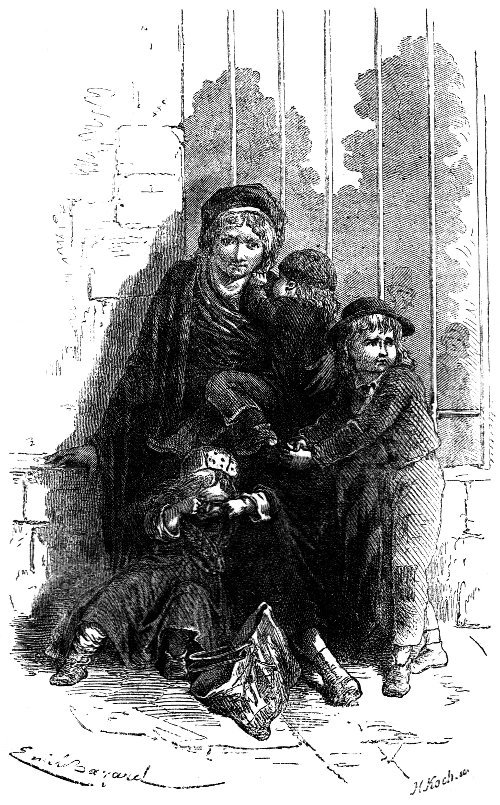
THEY APPEARED TO BE IN THE DEEPEST DESPAIR.
“Alas!” she replied, speaking bad French with a German accent, “it is the greatest misfortune that could befall us: we are separated for ever from our father. Our poor dear papa is expecting us at New York, where he has some land, and where we could be rich and happy; and 109 now it is impossible for us to go to him. Alas! there is nothing for us but to die.”
“To die! Oh, don’t say that—it’s dreadful,” rejoined Maurice.
“Yes, it is dreadful,” continued the girl. “And my poor father—Ah, what grief for him too!”
“But how does it happen that you cannot go out to join him?”
“We have not the means; we are without money.”
“Money? I’ve got some money.” And Maurice hastened to offer the contents of his little purse—about five or six francs.
The little girl did not take them, but turned to her mother, who was pressing to her heart her other two children, handsome boys of three and four years old. The mother and her daughter spoke together for a minute in German.
“Why do you not take what I offer?” said Maurice.
“Because,” replied the girl,—for her mother could not speak French,—“because, though it is a good deal for you to give, it would be of no use to us. To save us we want two hundred francs—that is, ten gold napoleons. Who would give them to us?”
“Ten pieces of gold money,” cried my little friend. “Wait a minute; I know somebody who has them.”
He gave Cressida into the care of Jacques, and running after Adrienne, took her by the hand, and led her up to this poor family.
“Give your money to these good people,” said he.
“No, indeed!” replied Adrienne, astonished; “my papa told me to buy something with the money for myself, and I’m not going to give it to beggars.”
“But just consider, Adrienne,” said her English governess, who had followed her, “whether you would not do well to give some help to this unhappy woman and her little children: such a kind action would be all the kinder if you do it by the sacrifice of something you intended to buy for yourself.”
“But my papa does not wish me to make sacrifices,” said Adrienne. And nothing that her governess or Maurice could say would induce her to part with her money.
Maurice thought for a moment of going home to his mother to ask her for the two hundred francs; but remembering that she would certainly be in his father’s sick-room nursing him, he felt that it would not do to disturb or trouble her now. Then he turned to Jacques.
“Can you lend me two hundred francs, Jacques?”
“Two hundred francs!” cried Jacques; “why you would not surely give so much to people you know nothing about. But at all events I don’t possess two hundred francs.”
“Is it so large a sum then?” inquired Maurice.
“It is more than my wages for half a year come to.”
“My dear young gentleman,” said the governess, addressing Maurice, “I see you have a good heart, but perhaps it would be wise, before you think any more about helping this poor woman, to inquire what has happened to throw them suddenly into such a state of destitution. You see they are quite nicely dressed, and do not look at all as if they were accustomed to ask for charity.”
In answer to the questions of the governess and Maurice, the little girl, who was the only one that could speak French, explained that they were Germans from Nuremburg: that they had arrived only that morning in Paris by railway from that city, intending to go on from Paris to Nantes, where they were to embark for New York. Their father had gone out to New York about two years before to settle there: he had been prosperous, and they were going to join him. Their baggage had been already seat on from Nuremburg to Nantes, and put on board the vessel in which their passage had been engaged and paid for by their father at New York, the captain being a friend of his.
She said that when they got out of the train at Paris that morning, they missed a little portmanteau, the only luggage they carried with them, which contained, besides 111 some change of linen, all the money they had. It had either been stolen or lost in the confusion of getting out of the train. So they found themselves now in this great city without friends and without money, and—worst of all—the vessel would sail to-morrow evening, and unless they could go on at once their passage would be lost.
She told her story with such earnestness and simplicity that no one could doubt its truth; and the governess made one more effort to excite the compassion of her pupil. But Adrienne was quite insensible to the suffering of others, and ran off, bowling her hoop.
“Still,” said Maurice, looking after her, “I know one way of finding the money, if I could but make up my mind to do it: I could sell my horse to Adrienne.”
“What do you say, Master Maurice?” exclaimed Jacques. “It is impossible. Sell Cressida, that you refused so bravely to part with to your uncle! Think of your promise to Fritz.”
“When I made that promise, Fritz told me expressly that I might sell it only in order to help any one who was in great distress. Would not he have wished to help this poor woman and these children? That I am sure he would. Still it breaks my heart to part with Cressida: I can hardly bear to think about it: but I will do it.”
Adrienne ran up with her hoop at this moment, and her joy was unbounded when she heard that Maurice consented at last to sell Cressida to her for the ten pieces of gold. She kissed Maurice and she kissed the little horse. She clapped her hands and danced about with delight.
As soon as her expressions of joy had begun to subside Maurice said to her very seriously:—“I have one favour to ask of you.”
“What is it?”
“That when you get tired of Cressida you will not throw it aside, or give it to the first person who comes in the way, without knowing whether it is taken care of or not. The favour I ask is that you will just think of it, and care for 112 it a little sometimes, even after it no longer amuses you.”
“Oh, yes, that I certainly will,” said Adrienne. “I’ll keep it myself as long as it’s in good condition; that is, till I break it, I mean; and when I have quite done with it, I won’t be so cruel as to throw it away, or give it to the first who asks me. No, you may be quite easy about that: I’ll tell you what I’ll do. When it’s broken, I’ll make it a present to the children of my nurse. They are great fat country children, with cheeks like rosy apples; but oh, so stupid! and not difficult to please, I assure you. If Cressida has lost two or three of its legs they will admire it all the same, and it will amuse them immensely.”
This picture of the probable future in store for the little horse was not calculated to comfort Maurice, whatever it was meant to do. Indeed he felt very much inclined to be off the bargain, and tears began to trickle down his cheeks.
If the actors in this scene had not been so engrossed with the matter they were discussing, they would certainly have noticed a rather old gentleman, who was walking up and down, with his hands behind him, at a few paces from where they stood, and who was evidently listening to all they said. At this moment, when Maurice was looking very unhappy—for his delight at helping this poor family did not prevent his feeling a sort of horror to think that Fritz’s wonderful mechanical work should pass into such bad hands,—just at this moment, the old gentleman came straight up to them, and spoke to Maurice.
What he said to Maurice, and what he did, are too important to the course of this story to come in at the end of a chapter; and I will reserve them for the beginning of the next. But I do not mind letting my little readers know at once that Adrienne did not have the horse after all.

Here are six objects for you to find out, children; one begins with D, one with G, one with L, one with N, one with P, and one with Y.
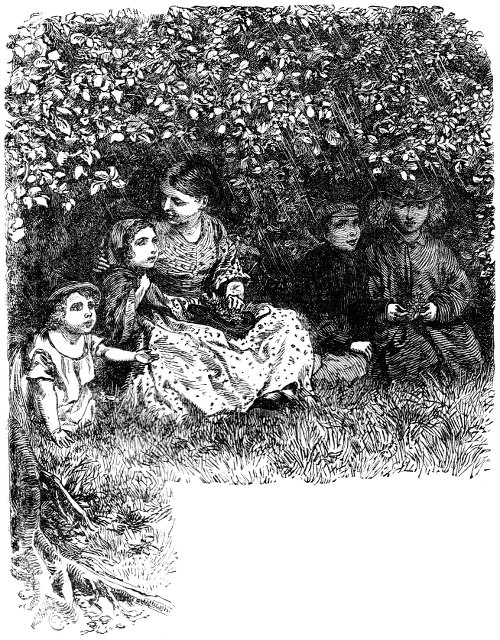
It’s raining, it’s raining, so heavily, heavily,
The only dry place is just under the tree;
There let us scamper, so merrily, merrily,
Keeping together as close as can be.
Look at the rainbow, so glorious and wonderful,
Stretching its great arch far up in the sky,
While all around the clouds heavy and thunder-full,
Tinge fields and trees with their stormy red dye.
Look, how the hills are all purple behind us;
See, how the sky is all gloomy and black,
Francis and Willy, indeed you must mind us,
Rain is still falling—this moment come back.
Yes, on that side the bright sun is now shining,
Tinting the tops of the trees with its glow:
Raindrops and sunbeams, their splendours combining,
Colour the beautiful rainbow, you know.
Do you not hear how the heavy drops clatter
On the broad branches that cover us now?
We are not shorn, like the sheep, so no matter;—
See, how they shelter themselves near the cow.
Old Nurse, perhaps, is afraid of the thunder,
Guessing in vain where her children can be;
After such torrents of rain, she will wonder
To find us all dry ’neath the broad chestnut-tree.

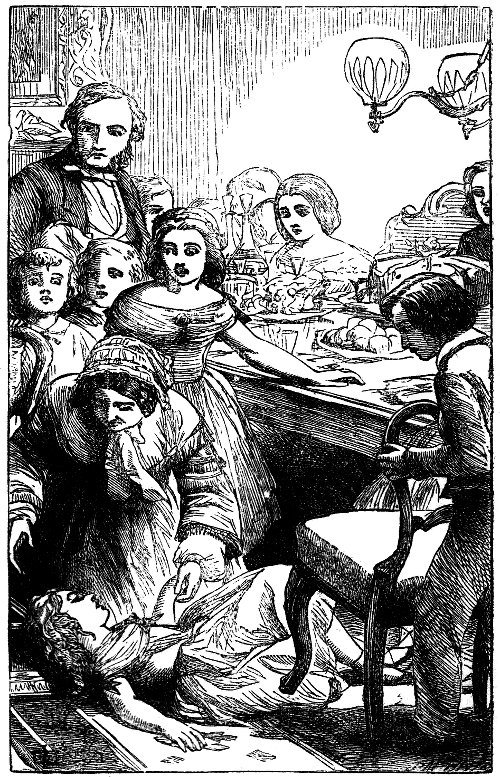
A little boy called Tom was very fond of teasing. He used to call—“Bo!” in the baby’s ear, and startle the poor little 117 thing. One Sunday he pinned a pocket-handkerchief on to nurse’s back as she was going to church, and she thought people were admiring her when they looked back. Another day he put some bran into her teapot, and nurse wondered why her tea was not so good as usual. Then he got a frightful mask, and jumping out of a dark corner, with a howl, nearly frightened the nursery-maid into a fit.
One day there was a child’s party. It was sister Mary’s birthday. When the children were taking their seats at supper, naughty Tom went behind Mary just as she was sitting down, and pulled her chair away. Mary fell, and hit her head against the fender.
Poor Mary was seriously hurt, and for a minute or two she lay insensible. Then Tom was really sorry, and repented what he had done. For all that, though, he was well whipped, and sent off to school next day. I daresay you will agree with me that he deserved his punishment.
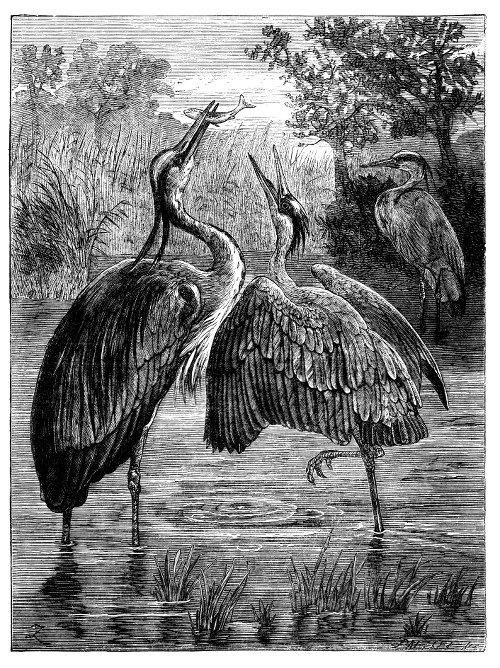

To-day our natural history picture shows three very funny long-legged birds; they look at first sight very like storks, but these birds are herons.
The heron, though much less common than in former days, still holds its place among familiar British birds, being occasionally seen on the banks of almost every river or lake. This bird is about three feet in length, the bill being longer than the head, and the wings when spread measure five feet across; with these large strong wings it can fly to a great height. The heron lives on fish, which it swallows whole, and in great numbers; it can neither swim nor dive, but it wades into the water as far as its long legs will carry it with safety, and stands there as still as if carved out of wood, with its long neck drawn in, and its head resting between the shoulders. It will watch with patience for hours till a fish or a frog comes within its reach, when it stretches out its long neck suddenly, and snatches up its prey with its sharp bill. It mostly prefers to stand under the shadow of a tree, bush, or bank; and from its perfect stillness, and the sober colour of its plumage, it seems often to escape the observation even of the fish themselves.
In old times in England, the sport called hawking, which consisted in the chase of herons by hawks or falcons trained for the purpose, was a very favourite one among both gentlemen and ladies. Young hawks procured from their nests in Iceland or Norway, and carefully trained, were of great value. The sport was generally enjoyed on horseback, and both ladies and gentlemen usually carried the hawks perched upon their wrists, the birds’ heads being covered with a hood till the moment came for letting them fly.
When the heron was discovered, he would soon become 120 aware of the approach of the hawking party; and spreading his broad wings, and stretching out his long neck in front, and his long legs behind, would rise majestically in the air. Then the hawk’s hood was removed, and as soon as he caught sight of the heron, he was let fly in pursuit.
Now a hawk cannot strike unless it is above its prey, and the heron seems instinctively to be aware of this. It used to be thought a fine sight to see these two birds striving to rise each above the other. Round and round they went, wheeling in a succession of circles, always higher and higher. At length the hawk rose high enough to shoot down upon the heron. Sometimes he was received upon the long sharp bill of the latter, and simply spitted himself; but generally he would break the wing of the heron, or clutch him with beak and claws, when the two came fluttering down together.
This sport has now fallen into disuse, and English herons lead a peaceful life enough. There are some at the Zoological gardens, and I think you will laugh to see them standing there at the edge of their pond, with heads sunk between their shoulders, looking like long-nosed old gentlemen in pointed tail-coats.
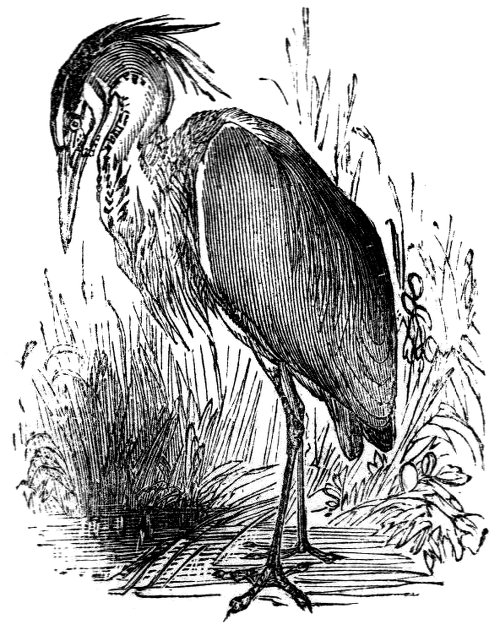
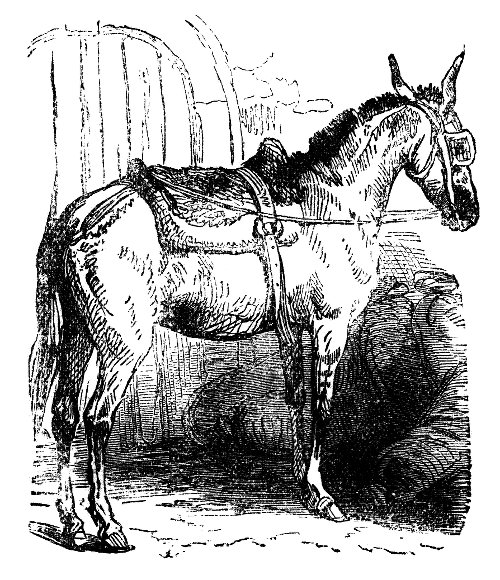

The next of her pets that Aunt Totty told us about were a mule and a dog.
“Yes, my dears,” said Aunt Totty, “Marquis was certainly a splendid animal; as large as a fine horse, as strong as a bull, and wonderfully fleet. We used to drive him about in a light two-wheeled carriage, a kind of cabriolet, which was the carriage most used in that part of France in those days. I must tell you that what I am going to relate happened when I was quite a little child, 122 which of course is a long time ago, and we were living at the time in a chateau, or large country-house, in the south of France. There were large forests in that part of the country, and the house was a long way off from any town.
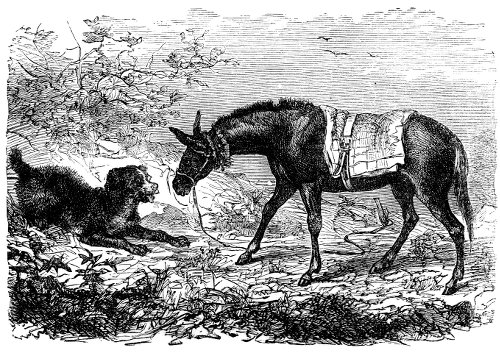
“Now, handsome and strong Marquis certainly was, but that was about all you could say in his favour, for he had a detestable temper. I hardly know why I call Marquis one of my pets, for we children were never allowed to drive him, hardly even to stroke him, lest he should kick or bite; and he was addicted to both these bad habits. Whenever he thought he had hurt anyone, or done mischief of any kind, you might see him shake all over, as if he was having a good quiet laugh all to himself. Once he succeeded in breaking the traces and getting free from the carriage: then he indulged in something more than a quiet chuckle, and fell to neighing or braying—for I hardly know which to call it—with all his might, till we were nearly deafened by the horrid noise. I remember another occasion, 123 when he succeeded in upsetting the little carriage and breaking the shafts. My mother and I and the coachman were all thrown out. Luckily we were not much hurt; and while we were picking ourselves up, Marquis stood looking at us with an air of triumph, and amused himself by kicking up the dust with his hoofs till we were almost smothered.
“Marquis had, however, one tender place in his heart, and that was occupied by our dog Coco. Coco was a spaniel; no great beauty perhaps; but he was as good and amiable as Marquis was the reverse. How two creatures so unlike in disposition—one so good-hearted, the other so vicious—could have struck up such a friendship, I never could make out. If Coco went into the field where Marquis was grazing, the mule would run up to him directly, and I have even seen the two rub their noses together as if they were kissing. Coco had a comfortable bed in the kitchen, but he preferred at night going to sleep upon the straw in the little out-house which served as a stable for Marquis.
“The winter we were at the chateau happened to be unusually severe, and snow was on the ground for many days. It was always known that there were wolves in the forest, though they were rarely seen; but during the cold weather it was said that one or two had approached the village. One evening we were all sitting round the fire, Coco being in the midst of us, when he suddenly pricked up his ears, as if he heard a sound outside, and immediately rushed out of the room. Directly afterwards we heard a dreadful howling, and papa and the boys ran out to see what it was. They found Coco and a wolf waging a dreadful combat just outside the door of the shed where Marquis was kept. This was not the regular stable for the horses, and was rather separated from the other buildings of the chateau. On the approach of human beings the wolf ran off, but he had inflicted a mortal wound upon poor Coco, who was just expiring when his rescuers arrived. He died to defend his friend Marquis.”

Merry time, when cowslips bloom;
Merry time, when thrushes sing;
Merry time, when wild rose sprays
Far abroad their branches fling.
Merry time for girls and boys,
When the cowslips first appear,
Gilding meadows with their cups,—
Happiest time of all the year!
When the bees, with busy hum,
Play amongst their golden bells,
And the butterflies are come—
All of joy and pleasure tells.
Happy children! roaming far,
Gather cowslips at your will;
Fill your baskets—fill them full—
Thousands will be left there still.
Oh! the joyous time of youth,
Like the spring-tide of the year;
Could it but, like cowslip-bells,
Come again each coming year!
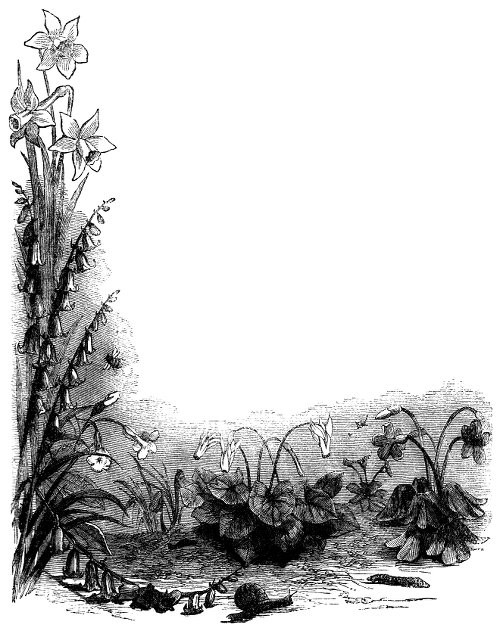
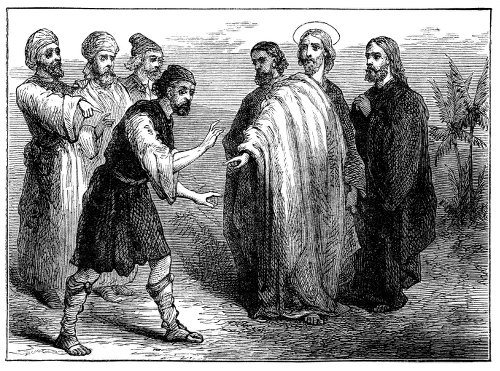

Our Saviour’s next miracle, after the miraculous draught of fishes which I described in our last Sunday talk, took place also at Capernaum, and consisted in healing the mother of the wife of Simon Peter the fisherman. Peter had become a disciple of Jesus, and indeed was soon afterwards created one of the twelve apostles. The Master often visited the house of His disciple; and one day on entering it, He was told that 127 Peter’s wife’s mother lay seriously ill. Christ immediately went into the room of the sick woman; stood over her, and holding her hand, bade the fever leave her. She arose at once from her bed, perfectly well; not merely better; not weak, as people usually are on first recovering from a fever, but quite well. St. Matthew says of her:—“And she arose and ministered to them:” meaning that she was able to get up and attend to her household duties as usual.
Our Saviour now went down to Nazareth, where, as you know, my dear children, He was brought up, and where He had lived for many years unknown and in poverty. He there performed many wonderful miracles, healing the sick, and doing good to the poor or afflicted who came to Him. But you must not expect me to describe to you all His wonderful works of this kind; I shall tell you only of the most important, that you may learn the loving kindness and mercy of Him who “bore our sins and carried our sorrows.”
It often happened on the Sabbath, in the cool of the evening, that the sick were brought out on their beds or couches to Jesus to be healed. They were not brought till the sun was setting, for fear of breaking the commandment which forbids all manner of work on the Sabbath: but the Jewish Sabbath ending at the setting of the sun, people did not scruple to bring their sick to be healed by Jesus after that hour. And He healed all that were brought to Him.
But once on a Sabbath day, before the hour of sunset, a man came to Him for help. The hand of this man was withered and helpless, and he came to Christ hoping that He would heal it. We are told in the Bible that the Scribes and Pharisees watched Jesus to see whether He would heal on the Sabbath day, that they might find an accusation against Him for breaking the commandment. But Jesus knew their thoughts, and said to the man which had the withered hand: “Rise up and stand forth in the 128 midst.” And he arose and stood forth. Then said Jesus unto them: “I will ask you one thing: Is it lawful on the Sabbath day to do good or to do evil; to save life or to destroy it?” And looking round upon them all, He said unto the man: “Stretch forth thy hand!” And he did so, and his hand was restored whole as the other.
Now our Saviour did not mean by performing this miracle to teach that the observance of the Sabbath should be lightly thought of. The teaching of our Lord and His example do not tend to lessen our reverence for this holy-day. But what He intended to show was that works of mercy are quite consistent with the holiness of the Sabbath, and that the Sabbath was intended for the advantage and happiness of mankind.
You would think that the gentle reproof of our Lord would have made these Scribes and Pharisees repent: but it was not so. They felt that they were put to shame before the people, and their rage and hatred against our Saviour increased. They felt that they could not stand before His teaching, even had this teaching not been sustained as it was by such signs and wonders. They were losing influence, and if Christ was allowed to go on, their own power would be gone.
Then the Pharisees and Scribes went and held council together against Jesus, consulting how they should destroy Him.


I think you would like to hear about a little friend of mine called Frank. That is, he was a little friend of mine, for he is grown into a man now; and though a friend still, he is by no means little, being above six feet high. However, what I am going to tell you of him occurred years ago.
Frank’s father died when he was quite young, and his mother, marrying again, went out to India; so it happened that he lived in London with his grandfather and grandmother. They, of course, were quite old people, and he was always very glad to spend a part of his holidays with some cousins at their house in the country, which was very near to where I lived. I was not quite grown up at that time, but I was so much older than Frank that he looked upon me as a very wise person, and one quite fitted to give him advice.
Now Frank had a great talent for drawing, and I think that was what drew us together, for I had a turn that way also. He used to sketch the beautiful scenery in the neighbourhood; and, although he only sketched in pencil, he obtained good effects of distance, gave correctly the foliage of the different trees, and, above all, he seemed by natural genius always to choose just the subjects which formed a nice composition as a picture.
He was at this time about twelve or thirteen years of age, and whenever he talked to me about his own future, which he very often did, I could not help encouraging him to become an artist. His grandfather, I knew, had other views, and intended him to be a merchant, there being some advantageous opening for him in that way. Still I advised Frank at least to let his grandfather know how much he wished to be an artist, and to show him some of his sketches; “because,” as I said, “if he consents, it is time you should be put in the way of studying art properly.”
Well, Frank followed my advice. After spending his holidays in the country, he went to pass one day in town at his grandfather’s before going to school. In the evening after dinner, when he was sitting with his grandfather and grandmother, he suddenly broke out with:—
“Grandpapa dear, I want to be an artist.”
“An artist!” said grandpapa; “why, what fancy is this? I didn’t know you had a taste that way. Here, let me see if you can draw this.”
He placed before his grandson a small ancient vase, which he took from a glass case; for Frank’s grandfather, I must tell you, was a great collector of ancient things—relics, and curiosities.
Frank took his place at the opposite side of the table, and set to work. At last he brought the paper round to grandpapa. There was the vase, very fairly and correctly copied:—But I think I had better give you an account of what happened in grandpapa’s own words, as he told it all to me some time afterwards.
“The vase was well drawn, no doubt,” said grandpapa, “but after all it was nothing extraordinary; and I was giving the paper back to Frank, when I noticed that there was some drawing on the other side. Looking at it again, I saw two heads—mere sketches, but better likenesses I never saw. One was his grandmamma; there she was to the very life. The other—well, the other was a caricature, rather than a portrait, of me. I was made to appear ugly and ridiculous, instead of the good-looking old gentleman I am;” (He said this laughing) “still, it was a likeness, I confess. I tried to be angry, but laughed instead, and exclaimed: ‘Ah, Frank, Frank! you shall be an artist if you like; you certainly have talent, but you must turn it to better account than by making caricatures of your old grandfather.’”
Frank is now grown up, and has already obtained some fame as an artist. I saw two pictures of his at the Royal Academy exhibition the other day, which were admired and praised by everybody.
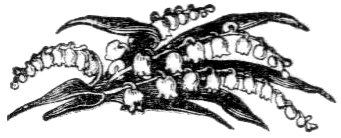
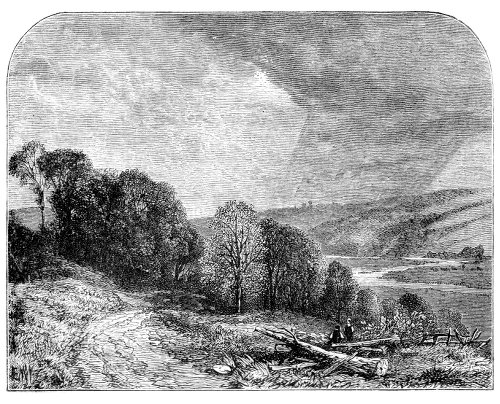
Moderato legato.
1.
While it patters, while it pours,
Little folks are kept indoors:
Little birds sing through the rain,
“Dreaming flowers, awake again!
From the damp mould lift your bloom;
Scent the earth with rich perfume.”
2.
See the flow’rets, one and all,
Answer to the cheery call;
Crocuses begin to thrill,
Violets thicken on the hill,
And the fields look sparkling bright,
With the clover, red and white.
3.
When it patters, when it pours,
Little folks are kept in-doors,
Looking through the window pane,
Covered o’er by drops of rain;
While its tinkling sound repeats,
“Blossoms crown the earth with sweets.”
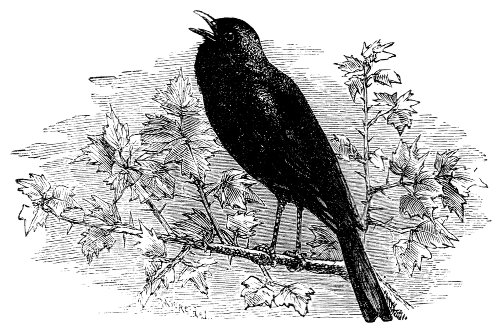
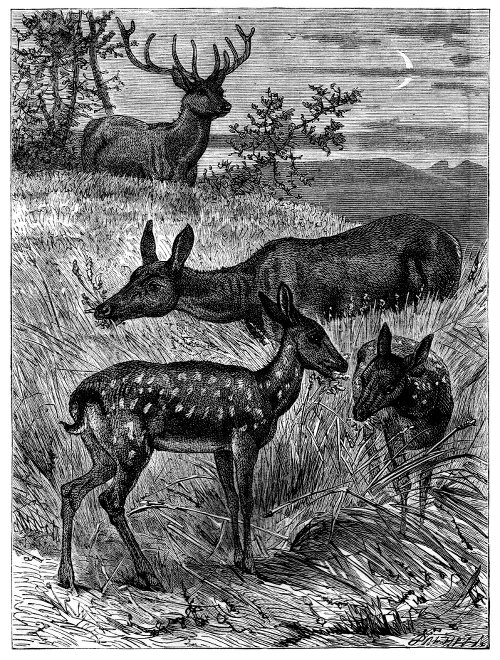

Look at that fine stag in the picture, keeping guard while the does and fawns are feeding! How watchful he looks, with his head erect; and how grandly his antlers spread out, as we see them against the soft twilight sky! Deer in their wild state are timid creatures; at least, they are very much afraid of human beings; and it is difficult to approach them. Shooting the wild deer in the Highlands of Scotland is considered excellent sport: it is called Deer-stalking. Large herds are to be found there among the mountains, but the greatest caution and skill are needed to get near enough to have a shot at them without being observed. Of course the deer we see in parks are comparatively tame: they are generally fallow deer; while those of the Highlands are a larger and stronger species, called red deer.
I daresay many of you little people who read this have been to Richmond park, and seen the herds of graceful fallow deer there. If you go up very gently to them perhaps they will come and eat bread out of your hand. At least I remember when I was a little girl, and passed a summer at Richmond, I succeeded once in making two young fawns come and share my biscuit with me. Shall I tell you how it happened?
One morning I had not learnt my lessons as well as usual; perhaps I had been watching the butterflies from the window flitting about in the sunshine instead of looking at my book; at any rate Miss Dobson, my governess, thought it necessary to punish me. Now I was too big to be put into the corner, being nine years old; and the mode of punishment she always adopted was to avoid speaking to me for an hour or so, and at the same time to put on an expression of face at once severe and sorrowful.
After school hours we went out for our walk in the park as usual, and, as I was an affectionate and very talkative child, you may suppose that Miss Dobson’s gloomy face and freezing silence made me very miserable. If I ventured upon a remark the answer never extended beyond “yes” or “no”; sometimes not even that. We had two great dogs, which generally went out with us on our walk; but when I was under punishment, even their companionship was not allowed.
At last Miss Dobson seated herself under a great oak, and began to read a book she had brought out with her. Then I wandered a little way off, picking the pretty wild flowers that grew amongst the fern. The birds were singing in the sunshine, the bees were humming, everything with life seemed to enjoy that life but me. Some deer were lying under the shadow of the trees not far away, and I observed that two pretty little fawns, standing nearer to me than the rest, were watching me. I had some biscuit in my pocket, intended for the dogs; and taking a piece in my hand, I walked up very softly to the little creatures. They looked at me, as I approached, with a frightened glance from their great dark eyes; but I fancy there must have been a sad and subdued expression in my childish face which took away from my appearance what might have terrified them, and on consideration they decided to remain.
Holding out the biscuit, I dropped it near them; then up jumped Mrs. Doe, and came forward to see what it was I offered to her children. I threw her a piece also, which she took and munched gladly, and the little ones followed her example. I cannot describe to you what a comfort it was to me in my trouble to find that these pretty creatures were not afraid of me, and did not shun me. I no longer felt solitary; no longer without friends or companions. Presently they took the biscuit from my fingers, and when I had no more to give them, they still thrust their soft noses into my little hand, and let me stroke them.
But my pleasure did not last long. A fine stag, the leader of the herd, who was lying in the midst of them, and who, I suppose, had been half asleep, seemed suddenly to become conscious of my presence, and took alarm. Jumping up, he bounded away, followed by the rest of the herd, and my two little friends went after the others.
Looking at them as they fled away from me, I felt more forlorn and solitary than ever, and tears came into my eyes. Presently Miss Dobson came up to me; she had been watching me from a distance, and now finding that I was crying, her manner changed, and she was very kind. In fact, my punishment was over for the time, and I think she began to find that it was a kind of punishment which I felt more than she intended.
Two legs sat upon three legs,
With one leg in his lap;
In comes four legs,
And runs away with one leg;
Up jumps two legs,
Catches up three legs,
Throws it after four legs,
And makes him bring one leg back.
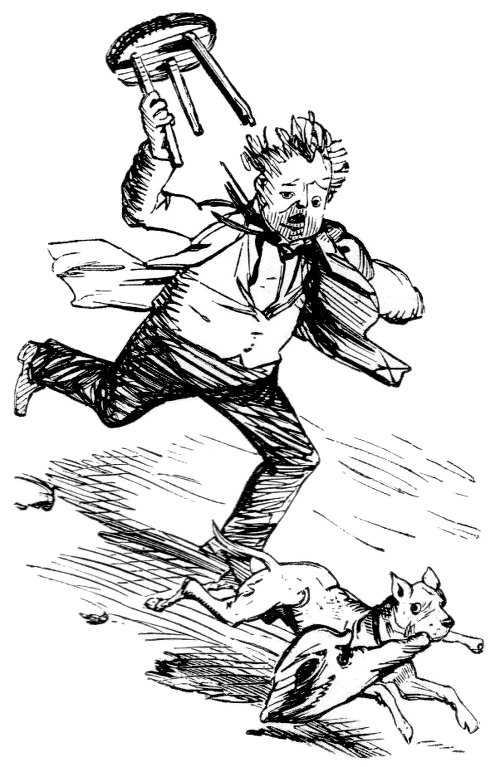
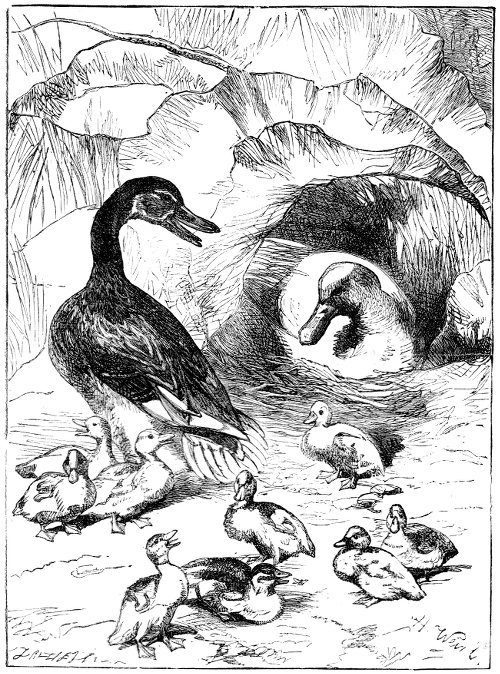

Old Mother Duck has hatched a brood
Of ducklings small and callow;
Their little wings are short, their down
Is mottled grey and yellow.
One peeped out from beneath her wing,
One scrambled on her back:
“That’s very rude,” said old Dame Duck;
“Get off! quack, quack, quack, quack!”
“’Tis close,” said Dame Duck, shoving out
The egg-shells with her bill;
“Besides, it never suits young ducks
To keep them sitting still.”
So rising from her nest, she said,
“Now, children, look at me:
A well-bred duck should waddle so,
From side to side—d’ye see?”
“Yes,” said the little ones; and then
She went on to explain:
“A well-bred duck turns in its toes
As I do—try again.”
“Yes,” said the ducklings, waddling on:
“That’s better,” said their mother;
“But well-bred ducks walk in a row,
Straight—one behind another.”
“Yes,” said the little ducks again,
All waddling in a row:
“Now to the pond,” said old Dame Duck—
Splash, splash, and in they go.
“Let me swim first,” said old Dame Duck,
“To this side, now to that;
There, snap at those great brown-winged flies,
They make young ducklings fat.
“Now when you reach the poultry-yard,
The hen-wife, Molly Head,
Will feed you with the other fowls,
On bran and mashed-up bread;
“The hens will peck and fight, but mind,
I hope that all of you
Will gobble up the food as fast
As well-bred ducks should do.
“You’d better get into the dish,
Unless it is too small;
In that case I should use my foot,
And overturn it all.”
The ducklings did as they were bid,
And found the plan so good,
That, from that day, the other fowls
Got hardly any food.
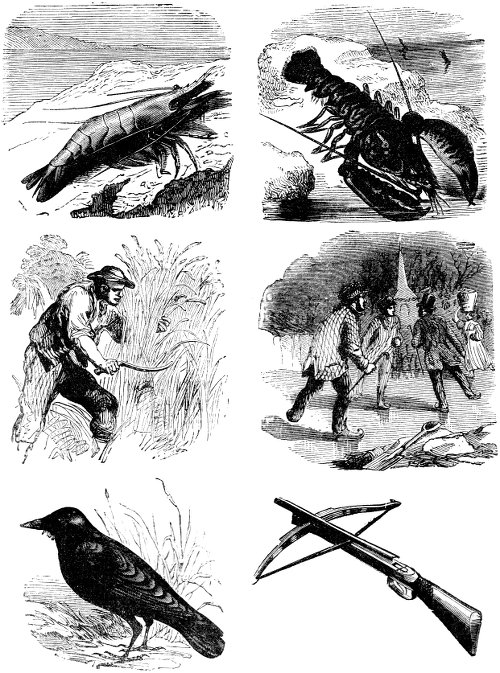
Here is a puzzle page for you. The names of two of these objects begin with C, one with L, one with P, one with R, and one with S. Now try if you can find them out.
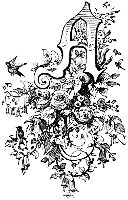
At the close of the last chapter I told you that an old gentleman had been looking on from a little distance, while Maurice and Adrienne were discussing the sale of the horse. At last the old gentleman came up to Maurice, and said,—
“Are you going to sell that little wooden horse, whose mechanism is so ingenious?”
“Yes, sir,” replied Maurice, crying while he spoke.
“You seem very sorry to part with it. Tell me exactly why you sell it.”
Maurice pointed to the poor family, sitting there against the railing of the garden; and related all that had passed.
“You are a good boy,” said the gentleman; “listen now: I also wish to help this poor woman. Will you let me join you in the good work? That will not make your merit the less.”
“Oh, I don’t think about my own merit,” said Maurice.
“You are right,” replied the gentleman; “charity does not think of self. I mean to say, if you would practise charity in a true and holy spirit, you must forget yourself completely. You are too young, perhaps, to understand 143 all that; but if you remember my words, they will grow up in your mind as a young tree grows in a good soil. Now, as to helping this poor woman and her children: she wants two hundred francs, you say. I will give her half that sum from myself; and I will lend you another hundred francs, that you may give them to her on your own part. Then instead of selling your clever little horse to this young lady, you shall leave it with me for a time as security for the repayment of the hundred francs. Your mamma gives you money sometimes, I daresay?”
“Yes, sir.”
“Very well; put aside all the money she gives you till you have got together a hundred francs. It won’t take you long. You must do without sugar-plums, and cakes, and many a toy that you would otherwise buy. In less than six months I have no doubt you will have the money. Let me see; this is the twelfth of February: we will fix the twelfth of August as the day when you will bring me the hundred francs and take back your horse.”
“But suppose I have not the money by that time?” urged Maurice.
“Oh, you’ll have it. All I fear is that your father or mother may give it you on purpose to pay me, and not let you save it out of your usual pocket-money. But I will see them or write to them about that. Remember, my dear boy, that an action is only really noble when it requires self-sacrifice of some sort.”
My little readers may imagine with what eagerness Maurice accepted this proposition. Adrienne at first was very angry, and sulked and pouted for a few minutes; then seeing some young friends come into the gardens, she ran off to play with them, and seemed to forget the horse very soon.
The gentleman tore out a leaf from his pocket-book, and wrote on it in pencil a formal acknowledgment of his having received the wooden horse in pledge for a loan of one hundred francs; the horse to be restored within six months on 144 repayment of the money. He signed his name to the paper, and handed it to Maurice.
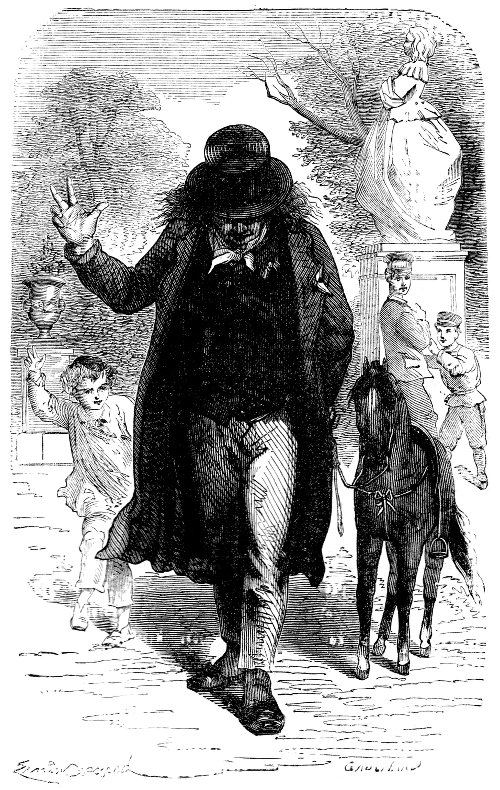
HE WENT AWAY, LEADING CRESSIDA BY THE BRIDLE.
On reading it, Maurice was surprised to see the name of Duberger. He recognised it as the name of one of the 145 most distinguished members of the Academy of sciences; a name of European celebrity. The little boy looked up at his new friend with an expression of curiosity and admiration, at which the latter seemed both amused and pleased.
Mr. Duberger at that time was not really old—at least not old for a philosopher and man of science. He looked old because his long hair was grey, his figure was stooping, and his dress neglected. But, for all that, his appearance was calculated to inspire respect and sympathy, while his face wore an expression at once of goodness and intelligence. He embraced Maurice, bidding him tell his father and mother all that had happened; he went away leading Cressida by the bridle, and leaving Maurice to give the two hundred francs to the poor woman himself.
Thus at last Maurice and his horse were parted, though after all he was not breaking his promise to Fritz. He had resisted the temptation of exchanging Cressida for Eusèbe’s pretty goat—the gentle, graceful Jeanne. He had resisted persuasions, entreaties, and the offer of many a beautiful toy. Even when his uncle, by way of trying him, pretended that he wished to have the little mechanical horse to amuse him on board ship, Maurice had remembered, and still kept, his promise. Now, he parted with Cressida for the sake of helping a poor family in distress; and Fritz had expressly said that for such an object only Maurice might sell the horse. Besides, was he not to have the horse again in six months?
When he presented the money to the poor woman, she showed some confusion at receiving so large a sum from the hands of a child. Maurice explained to the little girl, who acted as interpreter, that he was not their only benefactor.
“Duberger! Maurice de Roisel!” the poor little girl repeated several times; then continued, “I will teach my brothers to say those two names; we will never forget them; they will be as dear to us as the names of our own father and mother. Our name is Kirchner: our father is Leopold Kirchner, formerly of Nuremburg, where he was a blacksmith 146 well known throughout the city for his skill. Now he is rich, and a proprietor of land in the United States of America, a country beyond the seas a long way from here.”
The mother took Maurice’s two hands in hers, and said some words in German.
“My mother says,” explained the little daughter, “that you are born with divine charity in your heart, and she prays God to lead you by the hand through your life, on the path that leads to heaven. She prays, besides, that happiness may fall on you and all who are dear to you.”
“Pray, above all,” replied my little friend, deeply touched, “that my dear father may be restored to health.”
With these words he took leave of the poor family to whom he had proved such a benefactor, and hastened home, anxious to learn how his father was going on.
“My father!—how is he?” he asked of the servant, as the door was opened.
“My master has been asking for you, sir,” replied the servant; then, seeing the tears in Maurice’s eyes, he added: “but you must not let him see you cry, or he will think he is worse than he really is.”
“The tears come to my eyes in spite of me,” replied my little friend, drying his eyes and checking his tears as well as he could.
Maurice went into his father’s room, which appeared almost dark to him. The poor invalid’s eyes were weak and could not support the light. Maurice, impressed by the silence and darkness of the room, walked as quietly as possible on tiptoe up to his mother, whom he could distinguish sitting by the side of the bed. She was praying silently to herself, but on seeing her little boy, she took him in her arms, and leant with him over his father’s bed, who pressed him to his heart.
“My child, my dear child!”
Maurice could restrain his tears no longer, and his father observed it.
“Why do you cry, my darling boy?” said he; “you 147 think me very ill? But don’t be alarmed; God is all powerful, and may save me yet. Take courage; it will all pass away. I shall be cured before long; and, when the weather gets fine, I will take walks in the Luxembourg gardens with you and Cressida. Do not cry like that, my child, you will make yourself ill.”
My little friend’s emotion was uncontrollable, and he was led out of the room by his mother, while the poor father sank back upon his pillow exhausted with the few words he had spoken.
The next morning, when Jacques came into Maurice’s room to wake him, the first words spoken by the little boy were to inquire after his father. Jacques replied that the doctor, who had been there late the evening before, had declared that his patient was better, and had told Mrs. de Roisel that he had great hope now of his recovery. Maurice felt happier than he had done since he was present at the consultation of the doctors the morning before. Then, as he looked round the room, he saw Cressida’s empty stable, and occupied as his thoughts were by his father, he still felt inclined to shed a tear at the sight.
“Do you know, Jacques,” he said, “I had a dream about Fritz in the night. I thought that I saw him, and I was afraid he would ask me what I had done with Cressida; but instead of that, he took me in his arms, and embraced me, and called me his dear good boy.”
The hope expressed by the doctor that Mr. de Roisel would yet recover proved to be well founded, and when the month of April came on he had regained his strength sufficiently to bear a journey to Nice, so as to escape the sudden changes of temperature to which Paris is subject in the spring. He made the journey, accompanied by his wife and son. Arriving at Nice, they took a pretty villa, having a view of the sea on one side, and, on the other, delicious garden, in which my little friend was surprised to find rose-trees, lilacs, and other plants in full bloom, which at Paris had scarcely begun to bud.

THEY HEARD A GREAT NOISE OF CRACKING OF WHIPS.
The climate of Nice agreed with Mr. de Roisel so well that they stayed there nearly four months, and it was already the beginning of August when the family returned once more to their own home—the pretty comfortable old house where I first introduced Maurice to my little readers. Maurice was heartily glad to be back again at his own country-home, where he had his own little garden, where he knew everybody in the village, and where even the trees in the wood, and the little winding river with its pretty water-lilies, seemed like old friends to him.
The very first day of his arrival at home, the little boy ran off to the cottage of Fritz, to see if he had returned. He found it shut up, and no one in the village had heard anything about him since his departure. Although Maurice felt rather anxious at Fritz’s prolonged absence, it yet afforded him a sort of satisfaction; for he would have been 149 sorry that Fritz, on their first meeting, should find him without the horse. A few days more, and he hoped to be in possession of it again.
In fact he had already collected together, out of the savings of his pocket-money, the sum of a hundred francs; and the day after their arrival at home, his father wrote to Mr. Duberger to say that he should have the pleasure of bringing his little boy, on the twelfth of the month, to pay him a visit and to redeem the horse.
On the morning of the twelfth, my little friend and his father were just preparing to start, when they heard a sound of carriage wheels and horses’ hoofs, accompanied by a great noise of cracking of whips, on the drive leading to the house. A minute afterwards a carriage with four horses and postillions drew up at the door.
From this carriage descended Eusèbe and his father. They were not expected, and never were visitors less wished for. Mr. de Malassise began by making their excuses for arriving so unexpectedly, and explained the reason. He said that Eusèbe had heard only the day before of Maurice’s return, and a violent fancy had seized him suddenly to come and pay a visit to his cousin. It had been impossible to persuade Eusèbe to delay the visit till they could write and give notice of their intention. Eusèbe, he said, had insisted upon starting early that morning; and had he been thwarted, that terrible attack of nervous fever, so much dreaded by his parents, might have come on at last. So they had made the journey with post-horses, and there they were!
It was a sad disappointment to Maurice that his visit to Mr. Duberger should be put off, but there was no alternative; and after all it was only a delay of perhaps a couple of days. Cressida could remain without inconvenience for another forty-eight hours at Mr. Duberger’s.
So thought our little Maurice; but we shall see presently what serious consequences arose from that delay of only a couple of days.

Little pretty butterfly,
Fluttering ’mid the flowers,
Thou must live so happily
Through thy life’s short hours.
Little pretty butterfly,
Where the flowers are blowing,
Where the pretty song-birds sing,
Where the trees are growing;
There we see thy bright wings burn,
Fluttering free from sorrow:
Ne’er a task hast thou to learn,
To be said tomorrow.
Through the glad warm summer,
Fluttering on thy way,
With no thought or trouble
For a future day.
But when comes the autumn,
Thy short life is o’er,
In the wintry gardens
Thou art seen no more.
Fluttering on in lightness,
Soon thy life is past,
Vanished in its brightness—
Bright things do not last.
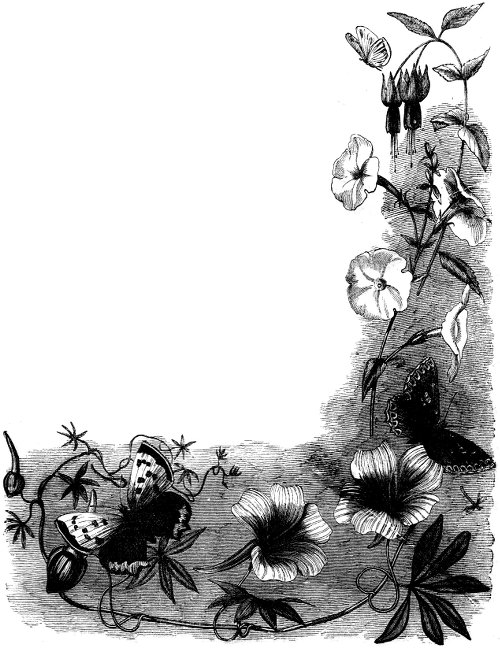
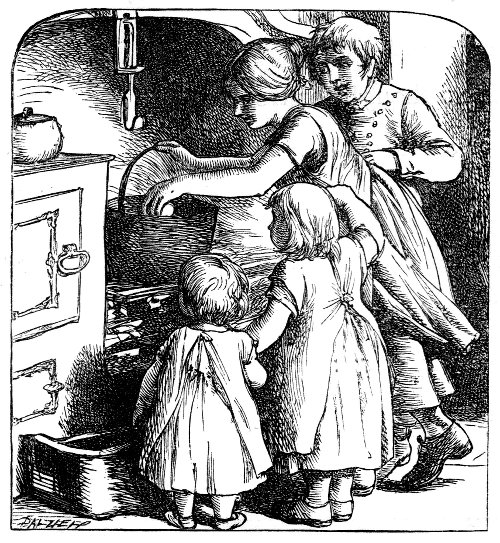
Once upon a time there lived a poor woman who had five children. The eldest, Tom, went to school, but the others stayed at home with Jane, the eldest girl, to take care of them; Jane was seven years old.
One day Jane’s mother went out, telling Jane to be quiet, and careful with the little ones, and on no account to touch anything that could hurt them or herself. For some time after their mother went out 153 the children were good and played with some old dolls. But presently Jane thought she would light a fire;—was she not naughty? She got on a chair to reach the matches from the mantel-piece, and in doing so, she knocked down an iron candlestick upon her brother Willy’s head. Willy screamed, and no wonder, for he had a great cut on his forehead. As soon as Willy stopped crying, Jane lighted the fire, and then she thought she would boil some potatoes; she found a saucepan, and popped them in.
The children crowded round her; she raised her arm to drive them off, over went the pan with the boiling water all over them. Jane’s ankle was terribly scalded, as well as Willy’s arm and Peter’s leg; and baby was scalded all over.
Just then in came mother. The doctor had to be sent for, and it was weeks before the children were well. So much for disobedience.



In a cottage that stood on a great range of mountains in Germany, there once lived a poor woman who had a little child and a flock of sheep. Now, one day she sat with her little child in the forest, and gave the child some porridge out of a pipkin, and the sheep were nibbling the grass in the glades around. But in the thick parts of the forest there were 155 wicked wolves, and when the sheep went further away under the trees, the woman thought, “Perhaps the wolves may attack them.” So she gave the child the bowl with porridge in it, and a wooden spoon, and bade her eat it; saying, “Be sure not fill the spoon too full,” and off she went after the sheep.
And as the child sat alone, and ate and ate, there came a big she-wolf out of the forest; and she ran straight to the child and took hold of her by the jacket at the back, and carried her into the forest. So when the mother came back the child was gone; the bowl was there, but the spoon was not with it, for the child had held the spoon fast in her little hand. Directly the poor mother saw the child was gone, she thought the wolf must have taken it, so she ran back to the village, and called the people to come and help her to find her child.
Meantime a man who had lost his way in the wood, and was wandering about among the bushes, heard a sound of talking near him, and thought at once, “There must be some people here;” and a little voice kept saying, “Go, or I’ll give you something!” And when he looked through the bushes, to see what this might be, behold! there sat a little child on the ground, and six little wolf-cubs round her, which kept snapping at her hands; but the old she-wolf was gone. Each time that a little wolf-cub snapped at her hands, the child hit it on the nose with the wooden spoon, and said, “Go, or I’ll give you something!”
The man ran up quickly, and beat off the wolf-cubs with his stick, so they all ran away. Then he took up the child in his arms, for he feared the old wolf might come back. In a short time he met the villagers coming out to kill the wolf, and with them was the child’s mother. How rejoiced she was! How she thanked the man, and still more God, that her child was saved!
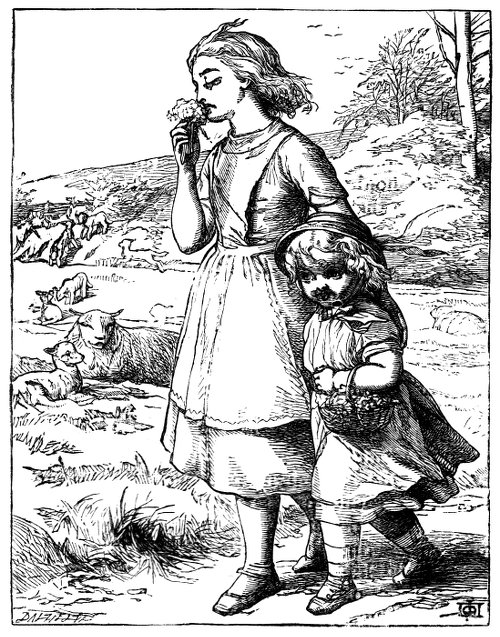
I walk’d in a field of fresh clover this morn,
Where lambs play’d so merrily under the trees,
Or rub’d their soft coats on a naked old thorn,
Or nibbled the clover, or rested at ease.
And under the hedge ran a clear water-brook,
To drink from when thirsty or weary with play;
So gay did the daisies and buttercups look,
That I thought little lambs must be happy all day.
And when I remember the beautiful psalm,
That tells about Christ and His pastures so green,
I know He is willing to make me His lamb,
And happier far than the lambs I have seen.
If I drink of the waters so peaceful and still,
That flow in His field, I for ever shall live;
If I love Him, and seek His commands to fulfil,
A place in His sheepfold to me will He give.
The lambs are at peace in the fields when they play,
The long summer’s day in contentment they spend;
But happier I, if in God’s holy way
I try to walk always, with Christ for my Friend.
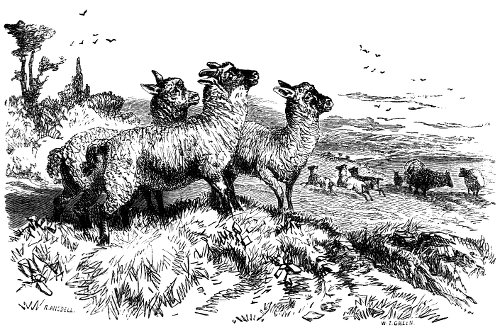
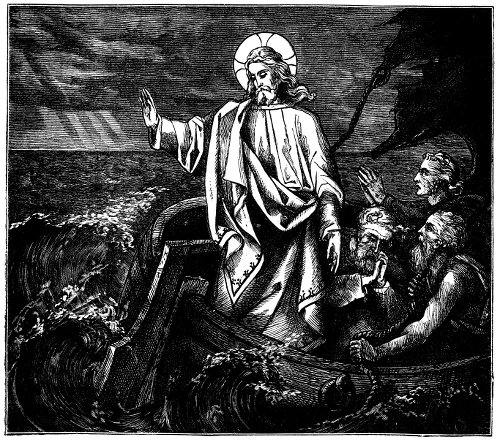

In our last Sunday talk I told you how our Saviour healed the man with the withered hand: and how angry the Pharisees were at His doing so on the Sabbath. You understand, my children, that Christ was not teaching us to regard the Sabbath with less reverence, but He showed us by His example that works of mercy and kindness are consistent with the holiness of Sunday. 159 Christ said, “It is lawful to do well on the Sabbath day.” To attend the sick, comfort the afflicted, teach the young and ignorant,—these are all good works; and to do these is “to do well.”
The Pharisees and Scribes were always on the watch for something, either in the doctrines that Christ taught, or in His acts, which might serve as a ground for arresting Him and bringing Him to trial. But besides the open enmity of these men, our Saviour had a difficulty to contend with in the want of thorough and perfect faith even in those who dearly loved Him—His own disciples; and some of the miracles He performed had for their object chiefly to confirm and strengthen the faith of His followers. The miracle I am going to tell you of—the stilling of the tempest—was one of these, and was witnessed only by the disciples who were with Him in the ship.
Not only was faith necessary for the disciples in order to give them confidence in the protection of God while they helped our Saviour in His work, or when they should have to continue it after Him, but perfect faith was needed before they could acquire the power of performing miracles. On one occasion, when some of them had attempted the miraculous cure of a boy, and failed, they asked Christ the reason of their failure. He replied: “Because of your unbelief. If ye have faith as a grain of mustard seed, ye shall say unto this mountain, Remove hence to yonder place; and it shall remove, and nothing shall be impossible to you.”
The apostles—that is, the chosen few, who continued the mission of our Saviour after His crucifixion—had the power of working miracles conferred upon them. We may assume therefore that their faith was perfect. But let us come to the miracle I have to tell you of today.
Our Saviour had been teaching the people all day from a boat on the lake of Galilee; the people being ranged along the shore, so that they could all hear without crowding in upon Him. When evening came on, He desired 160 the people to return to their homes, and bade His disciples put their boat from the land, and depart to the other side of the lake. As they left the shore, the water was smooth and calm, and the cool air blew gently from the mountains. Christ, tired out with the exertion of the day, lay down to rest and fell asleep.
The boat bore them over the rippling waves, and the disciples conversed most likely about the teaching of our Saviour which they had heard that day. They thought very probably that their faith in Him was quite strong: but it was soon to be tried. A terrible storm arose suddenly; the wind blew furiously; the great waves arose around the little vessel, and broke over its sides; the sail was torn, the mast broken. Then the disciples, in terror, rushed to our Saviour to wake Him, saying, “Lord, save us! we perish.”
Christ said unto them: “Why are ye fearful? oh, ye of little faith!” and He rebuked the winds and the sea, and there was a great calm.
But even after this the disciples did not seem thoroughly to understand our Saviour; for the scripture tells us that “they marvelled, saying, What manner of man is this that even the winds and the sea obey Him?”
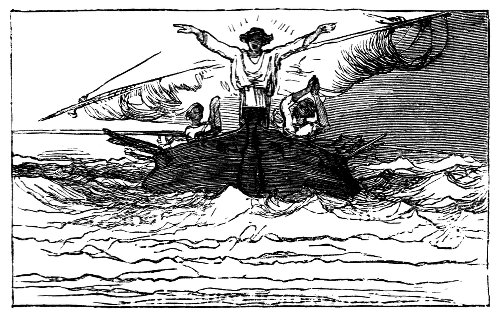
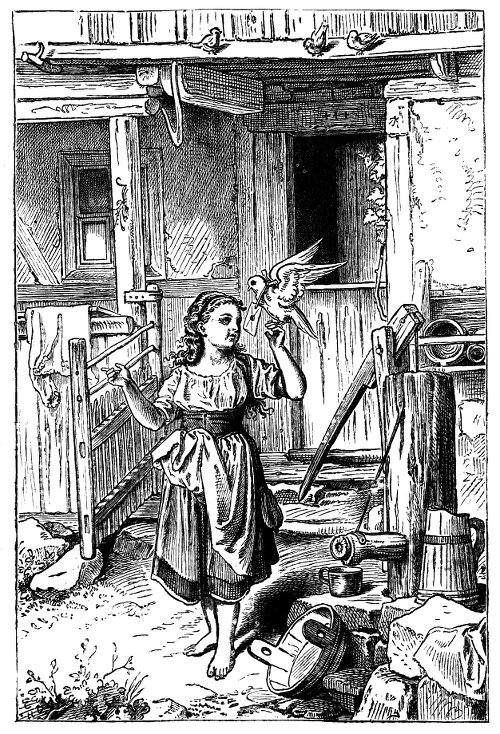

Lena is the name of the little friend of mine I am going to tell you about. You may see by the picture that she is not an English child, nor does she belong to the class which we call gentlefolk. Lena is German, and the daughter of a fisherman; nevertheless she is one of my dearest little friends. She lives in a cottage on the banks of the river Rhine, a short distance from the city of Coblenz. Her father earns his living as a boatman and fisherman upon the river; her mother takes care of the cottage, of their only child, and of the poultry: she finds plenty of time for making lace besides. I will tell you how I came to make little Lena’s acquaintance.
I passed one summer not long ago at Coblenz, at a villa on the banks of the river just outside the city. One evening, after a very hot day, I wandered a little way along the road by the side of the great beautiful river. I watched the lights gradually appearing, like fireflies in the distance, in the windows of the old castle or fortress of Ehrenbreitstein, which crowns a rocky hill on the opposite bank; and I watched, too, the lights and shadows borne on the breast of the swift river beneath. I stood looking at the restless ever-flowing water, comparing the river in its course to my own life, or to the lives of others; and thinking many thoughts which you, my little readers, would hardly understand.
At length my meditations were disturbed by a woman who came out of a cottage close by, and who, walking to the edge of the bank, there sat down, threw her apron over her head, and began to cry bitterly. It seemed as if she had come out of the cottage on purpose to have a good 163 cry without disturbing some one within. After a moment’s hesitation, I went up and begged her to tell me what was the matter. She replied that her little girl was very ill with low fever, and the doctor had told her that very evening that he had scarcely any hope.
This woman was Lena’s mother. I asked her to let me see the child, whom I found flushed and restless, tossing from side to side in her bed. Poor little Lena! The cottage was near my own house, and I went every day after that to see her. Often did I watch part of the night by her sick bed while her mother rested. At length our little patient began to recover; and while she was still too weak to walk, she delighted to sit at the cottage door, and listen while I told her stories.
Now, besides the poultry about the cottage, Lena had a pair of white doves, and in one of my stories I had told her of a letter being sent by a carrier-pigeon. Lena took it into her head that one of her white doves should carry letters from her to me after I returned to England. One day, when she was almost well, I found her standing at the door of the cottage, with the dove perched upon her hand, and a letter tied round its neck. She had been trying if it would carry a letter to me to my house close by; but it had only wheeled round and round and come back again to her. She said sadly: “If it does not know how to take a letter that little distance, how will it ever take one to England?”
Dear simple Lena! she did not understand that pigeons will only return to places where they have lived; but we have managed to correspond without the help of carrier-pigeons. I have seldom seen a prettier picture than she presented that day, standing at the cottage door with the white dove upon her hand.
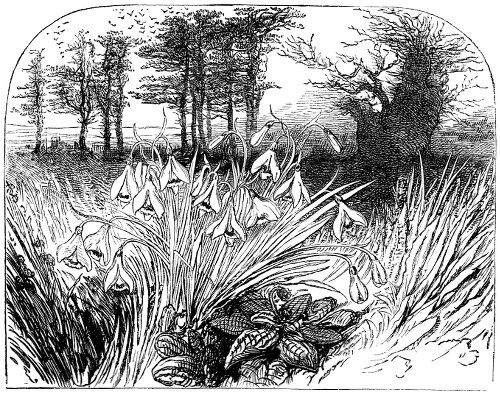
Allegretto.
1.
The flower-bells are ringing! come one, and come all;
Come plain and come pretty, come great and come small.
The flower-bells are ringing! come quick, and you’ll say,
Some queer little people have joined in our play.
2.
They’ll do us no harm, and may do us some good;
They’d make us all happy and wise, if they could.
In cups of the flowers they love dearly to dwell;
Now listen, and hear them each ringing a bell!
3.
“Come, boys and girls, come to our flower-school and learn
The lessons we find in each lily and fern;
We’ll teach you to seek for the fair and the good,
In city and village, in field and in wood.”
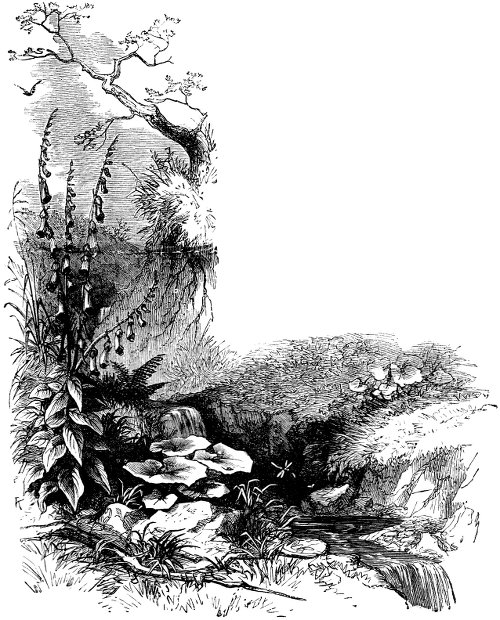
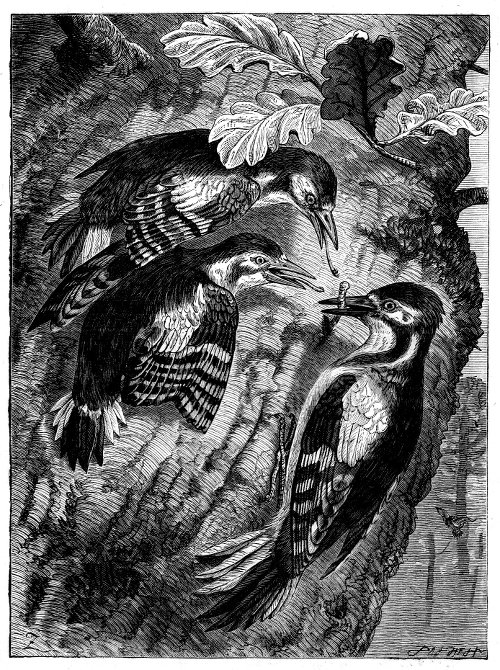

Here we have a picture of Woodpeckers. See how they cling to the bark of the tree with their claws, and how eager the two little ones seem for the prize their mother has just captured. The woodpecker is a bird of very singular habits. It lives upon the insects which exist in the bark of trees, and is remarkably adapted by nature for obtaining this kind of food. Its bill is long and sharp and powerful; and with its hooked claws it clings to the tree while it sways its body to and fro to give force to the strokes of its bill. The object of these strokes is to shake the insects out of the tree, and they are given with wonderful force and in rapid succession. Then the bird thrusts its long tongue into the crevices, and the tongue being barbed at the end and covered with a sort of gum, it secures a vast number of insects as well as their eggs.
In the quiet of the woods the sound of the woodpecker tapping may be heard at a great distance. I remember once, when I was a little girl, being very much frightened by the noise: I will tell you how it happened.
The house where I lived in the country not only had a large garden, but beyond that was a little wood, which we called the shrubbery. This wood had a broad walk winding through it, with seats placed here and there. One beautiful summer morning I and my brother, who was some years older than I was, were sitting together upon one of these seats under the shade of the trees. He was on his way to go out fishing, and was only stopping to do something to his fishing tackle. Wanting a pair of scissors, he sent me into the house to fetch them, ordering me about in the sort of way in which big boys are apt to order their little brothers and sisters.
I soon returned with the scissors, but no longer found my 168 brother where I had left him. The truth is he had gone off on his fishing expedition without waiting for my return. However, I looked about for him, and presently I heard a sound like somebody hitting a tree with a stick. “Ah, ah, so you are hiding, are you, Master Maurice?” thought I; and I looked behind different trees, one after another, thinking every moment to discover him. Then I began to fancy that the sound, although so clear and distinct, was some distance off; so I wandered on, still following it, and looking about as I went. Now and then the tapping ceased, but always went on again after a minute.
At last I began to be frightened, and called out:—“Maurice, dear Maurice, where are you? You are frightening me.” The tapping ceased from that moment, but my alarm did not. That such a noise should have been made without anybody to make it seemed to me very like something supernatural. I began to cry, and at the same time set off running towards home. I dared not look behind me as I ran, and when I reached the house, was at first too frightened and excited even to explain what was the matter. I must tell you that I was only seven years old at that time.
I remember the old gardener said, when he heard the story, that he suspected that it was only a woodpecker tapping; but I refused to believe that a bird could make so loud a noise. It was not till long afterwards, when I happened to both hear and see one, that I became convinced the old gardener was right.
The woodpecker is a handsome bird, about the size of a pigeon, of a greenish colour, with black and white marks upon the wings, and a crimson stain upon the head. It is heard much oftener than seen, for, being very timid, it is ingenious in hiding itself. It does not build a nest like other birds, but seeks for a decayed place in the trunk of some tree, where it scoops out a hole. There Mr. and Mrs. Woodpecker establish their little home: there the eggs are laid, and the young ones are reared.
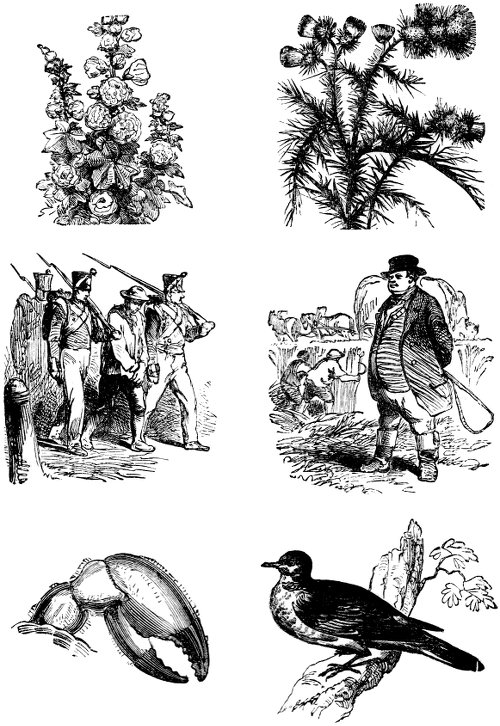
Now see if you can find out the names of all these objects. One of them begins with C, two with D, one with F, one with H, and one with T.
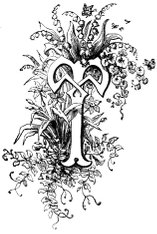
The visit of Mr. de Malassise and Eusèbe only lasted two days. Eusèbe went away very well satisfied with himself, for in those two days he had contrived to alarm his father several times by putting himself in a passion, and had teazed his cousin so ingeniously that he more than once brought tears into his eyes.
The morning after the departure of these unwelcome visitors, Mr. de Roisel and Maurice started off on their expedition to see Mr. Duberger, and to bring back the horse. They were going two days later than was intended, but a letter had been already sent to Mr. Duberger, explaining why they were obliged to postpone their visit from the twelfth of August to the fourteenth. That gentleman did not live habitually at Paris, but at a place called Palaiseau, which was not more than two or three hours’ drive from Maurice’s home. Mr. de Roisel drove Maurice in a light chaise with one horse; and they started very early, in order to avoid the heat of the day.
Palaiseau is a large straggling village situated in a pleasant valley; and on the hills around are many pretty country houses, one of which was inhabited by Mr. Duberger. Neither Maurice nor his father had been there before, so, 171 on arriving in the village, they had to inquire which was the house. Just in front of the little inn of the village stood three or four men, conversing earnestly, and Mr. de Roisel inquired of them for the house he wanted. One of them replied:—
“It is a good half mile beyond the village, sir; and stands quite alone on the right hand side of the road. We were just talking about a report there is in the village this morning, that Mr. Duberger’s house was broken into by thieves last night; but the accounts are so different I hardly know if any of them are true.”
Mr. de Roisel touched his horse with the whip and hastened on, feeling very anxious and alarmed. After driving about half a mile along the road, he pulled up again to ask his way of a woman who was standing at the door of a cottage.
“Do you want to see Mr. Duberger?” exclaimed the good woman. “Ah, poor dear man! Only to think there are wretches in the world who would do him an injury! But they do not belong to these parts, I’m certain. He does so much good, that no one here would hurt a hair of his head.”
“Good heavens! Has he been murdered?”
“Murdered! No, no: but he was robbed last night of a great many valuable things. That’s bad enough, I hope. If you want to see him, sir, that’s his house, yonder among the trees. The turning there on the right leads directly up to it.” Saying this she pointed to a house, which, seen from a distance, had a good appearance.
They turned up what might once have been a handsome avenue of trees, but many had died or been cut down, and never been replaced. A number of sheep were grazing beneath the trees of the avenue, and there reigned over the place that air of quiet and peace which brings repose both to the eyes and heart.

SHE SAID, “I WAS SURE YOU WOULD NOT BE READY.”
Reaching the iron gate of the courtyard, Mr. de Roisel got down to ring the bell, but finding that the gate was not fastened he opened it, and the chaise drew up at the stone steps of the entrance door. The house appeared large, but very much out of repair. The walls were crumbling in parts, and broken shutters hung at the windows; 173 but this appearance of decay or disorder seemed rather the effect of negligence than of poverty.
They soon heard the sound of slow footsteps approaching from the inside, and an old woman, having the look of a housekeeper, appeared at the door. Glancing at our travellers, she turned back into the house, and they could hear her call out to some one within:—“It’s the gentleman who wrote to you the day before yesterday. I was sure you would not be ready to receive him.”
“Well, well, Marianne,” replied a man’s voice, “I’m making all the haste I can.”
“Sir,” said the old woman, coming forward again, and addressing Mr. de Roisel, making at the same time a curtsey after the manner of a peasant, “you are welcome. If you will trouble yourself to walk into the drawing-room, my master will join you there in an instant. Michel will take the horse to the stable, sir. See, he’s coming as quickly as he can. He doesn’t run very fast; his legs are like mine—a little stiff. In truth, he’s no longer young. He has been our gardener, sir, for more than fifty years.”
Michel was a little withered old man, bent from age, and from the habit of stooping at his work.
“Sir,” said he, in a shaking voice, “excuse my slowness; I have no longer the activity of a youth. Besides, I had a good walk this morning to go after the police.”
“It is true then, this robbery I have heard of? What has been stolen? Any money?”
“No, unfortunately,” replied the old woman; “if it were only money my master would not care so much. He thinks little about money—not enough, indeed. But the thieves have carried away some precious and curious things that never can be replaced. Still we ought to thank Providence that we all remained fast asleep while the robbers were in the house. If we had wakened up, perhaps they would have cut our throats. But come in, I beg, sir.”
As they entered the room, Marianne went on:—“It must be confessed that my master himself is partly to 174 blame for what has happened. He never would have the doors fastened or the windows barred up. He trusts everybody. But won’t you sit down, sir?” (Here she put forward some chairs) “You see we might all have been murdered, sir. That would have mattered very little for Michel and me; we are so old; but for him!—I tremble to think of it.”
While the old woman chattered away, Mr. de Roisel looked round the room, but he saw nothing there to justify the character which Mr. Duberger bore of being an enlightened collector of curiosities and works of art, as well as a man of science. The furniture was extremely old, and of the fashion of fifty years ago. Some badly executed drawings hung on the walls; and an old-fashioned clock stood on the mantelpiece.
“What!” said Mr. de Roisel, observing it, “can it be past eleven?”
“Oh, no, sir,” replied Marianne; “pardon me, it is not yet ten. That clock is an excellent one, only if you do not understand its ways, it is apt to mislead. The thieves did not take anything from this room last night: they seemed to know where the valuable things were to be found. The furniture of this room, sir, my master sometimes says would not sell for fifty francs altogether: still it is of value to him—and to me also,—for it belonged to his grandmother, my first mistress. This old furniture is associated with the recollection of one we loved. These drawings were made by her, and her husband had them framed as you see. My master adored his grandmother, and these old things are precious to him for her sake.”
Mr. de Roisel felt a strong sympathy for the man who united such tenderness of heart with the rare intellect which had made him celebrated. Maurice also was touched, and took the withered hand of Marianne in his own.
“You are very good, my little gentleman; you remind me of my master in his childhood.” Then she went on: “After the death of my first mistress, I served the mother 175 of Mr. Duberger. She died too young to see the success and honours of her son: I have never quitted my master since.”
At this moment Mr. Duberger entered.
“Leave us now, my good Marianne,” said he. Then embracing Maurice, he exclaimed: “Why, how you have grown! I think the good God watches over children that have kind hearts. You have been growing up in happiness and health, as a flower blossoms in the spring-time.” Then turning to Mr. de Roisel, he added: “I received your letter, sir, and regret very much indeed that the day of your coming was postponed.”
“I fear we have come at a very inconvenient time.”
“Oh, it is not that; but you are one day too late.” Then taking Maurice on his knee, he went on: “You are a brave boy, and no doubt have deprived yourself of a good deal in collecting these hundred francs; but they are useless after all. When we met in the Luxembourg gardens, I thought it better for you that your charity to the poor woman should cost you some real sacrifice; but I was wrong to take your horse in pledge for the money. Now I am your debtor, and a debtor who cannot pay.”
“I understand,” said Maurice, as he burst into tears; “the thieves carried off Cressida last night. But it is not your fault.”
“Yes, yes, it is my fault. I was wanting in prudence; I kept neither doors nor windows fastened. I am much to blame.”
“Not so, indeed, sir,” said Mr. de Roisel; “it has been a chance which nobody could foresee. But do you not think the thieves may yet be discovered?”
“Probably. I think they will betray themselves in trying to sell the things they have stolen.”
“Let us hope so,” rejoined Mr. de Roisel.
With this hope, and the chance it afforded of the recovery of the horse, Maurice tried to console himself.
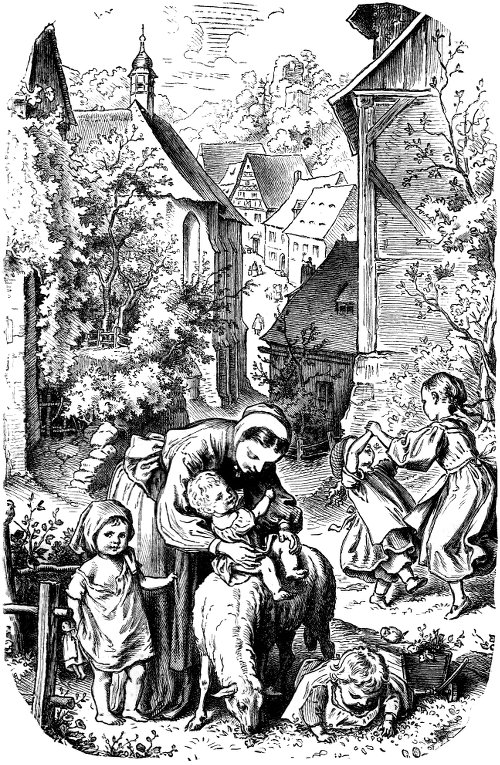

Baby, do you like your ride?
Baby on the baa-lamb!
Baby’s mother is beside
Baby riding baa-lamb.
Sisters too are dancing near
Baby,—near her baa-lamb;
On the ground is brother dear,
Almost touching baa-lamb.
Little birdies even stop,
Perching close to baa-lamb,
Now they chirp, and now they hop,—
They have no fear of baa-lamb.
Yet another sister there,
Comes to look at baa-lamb:
Her clothes and shoes are left,—oh, where?
Through haste to see poor baa-lamb.
The summer’s day too soon is past
For children and for baa-lamb;
You see our pleasure cannot last—
Not even rides on baa-lamb.
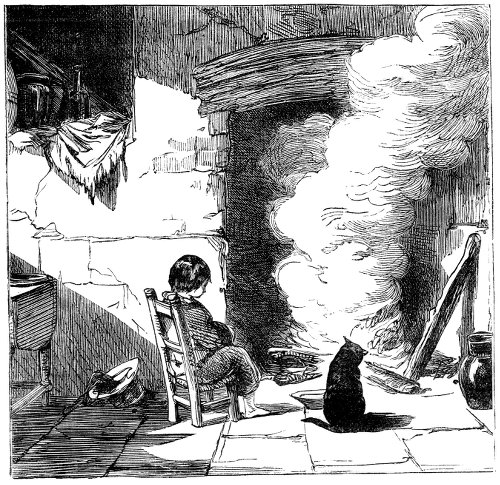
Little Willie sits by the fire thinking. He lives in this cottage alone with his mother, who is out just now, and I will tell you what Willie is thinking about so earnestly. He is a clever good boy, and is making up his mind that he ought to go out into the world and seek for work, and try to earn his own living, instead of being dependent on his mother, who is very poor. He determines he will tell her so directly she comes in, and ask her leave to go.
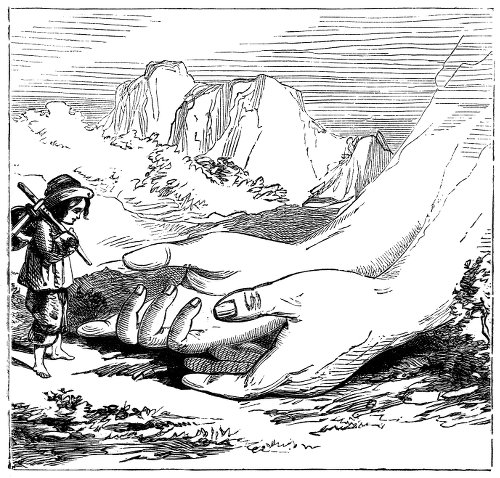
Here is Willie, with his little bundle at his back, on his first day’s journey to seek his fortune. As he walks along he is startled to observe a white cloud resting on the ground, directly in his path. From this cloud come forth two enormous hands, and a voice from the cloud says:—“Don’t be afraid, Willie; I come to be your friend. No eyes but yours will be able to see me, but only persevere in your wish to work, and I will be ever near to help you.”
Willie, somehow, does not feel frightened, but says:—“Thank you, good hands.” And then they vanish.
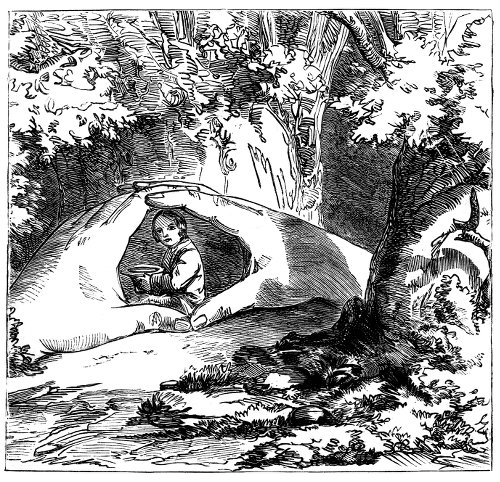
The help promised to Willie by the hands makes him so happy that he runs and leaps with joy; but as evening draws on he feels very tired. He lies down under some trees, and eats some bread and cheese brought with him in his wallet. He is in a forest now, and thinks he hears the howling of wolves in the distance; still he is so tired that he must go to sleep. Presently he sees the giant hands spread themselves over him, forming a sort of tent. His heart is full of gratitude as he says his prayers, and falls asleep, feeling how safe he is beneath those giant hands.
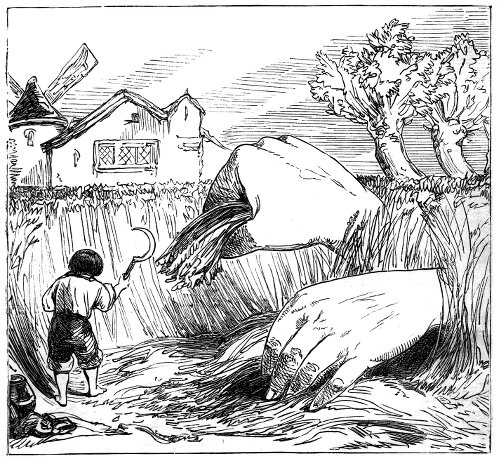
The next day Willie obtains employment in the service of a farmer. Here we see him in the corn-field reaping, and doing as much work as two strong men could do. But under the shelter of the high corn are the giant hands at work helping him. Willie whistles and cuts away: his sickle glistens as the corn falls under its long sweeps.
In the evening the farmer comes into the field, and stares to see the long rows of well-tied sheaves. He looks at Willie with astonishment, and promises himself that he will do his best to keep so good a servant.
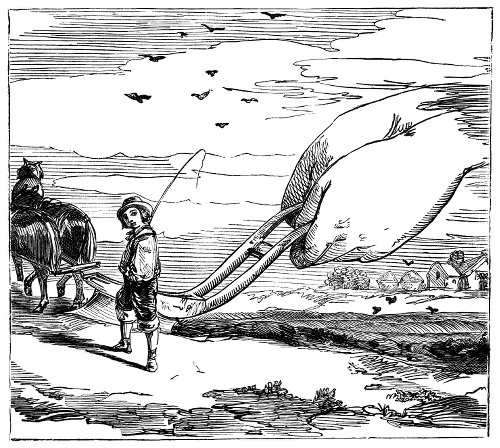
“If he can reap so well, perhaps he can plough,” says the farmer to himself, as he leaves the cornfield; and the next morning sees Willie employed as a ploughman. The giant hands guide the plough, unseen by any but Willie; and the land is ploughed in furrows as straight as the flight of an arrow. The farmer watches from his window, and again blesses his good fortune. As time goes on, he feels grateful to the industrious lad, who seems to take pleasure in working for him; and gradually Willie is placed over the other labourers and trusted with everything.
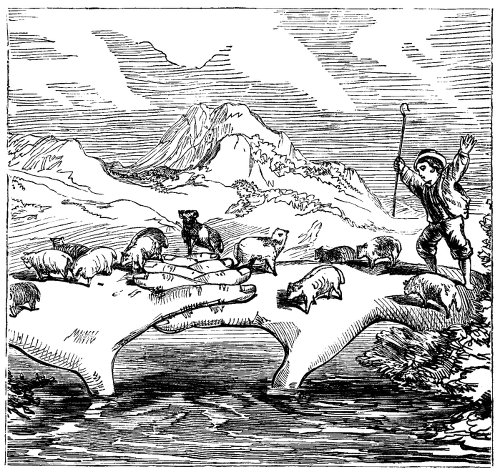
One day, while the sheep are out on the hills, a heavy storm comes on, and the low ground between the hills is quickly flooded. Willie goes out to bring in his master’s sheep, but by the time he has collected them, the water is pouring on like a river in a narrow valley which separates them from the farm. “How I wish the hands would help me now!” thinks Willie. In a moment the giant hands spread themselves over the turbid water, forming a bridge. He drives the sheep across, and reaches the farm in safety, to the joy of all, for they have given him up for lost.

One night Willie is wakened up by a cry of “Fire! Fire!” He dresses in a moment, and rushes out into the farmyard. Here he finds his master and the farm-servants running about, frantic with terror; pigs are squealing, geese cackling, everybody is shouting, but there is no water handy. The flames are making their way from room to room, and now reach the chamber of the farmer’s pretty daughter. She is still there; what is to be done? The staircase is burnt; no ladder will reach the window; and there stands the girl, in the midst of the smoke, screaming, 185 and stretching out her arms for help. Willie looks on in despair. Suddenly the giant hands appear to him, and placing themselves against the side of the house, form a ladder with their fingers, up which he quickly springs. He catches the girl in his arms, and in a moment brings her down, safe and sound, to her weeping father.
Now I daresay my little readers have been sufficiently interested in these seven scenes in the life of Willie to wish to know what became of him. Well then, Willie had such good wages that he was able to send money to his mother, and as soon as he grew to be quite a man, he married the farmer’s pretty daughter, whose life he had saved. Everybody liked him, and he soon took the entire management of the farm.
But now do you know the meaning of these giant hands? They signify the strength and power arising from industry, talent, and perseverance. The giant hands will come to help all those who, in the right way, try to help themselves.
When Willie was a rich farmer and had a large family, he used to say to his children: “Be honest, kind, industrious, and persevering; then the giant hands will come to help you.”
Multiplication is vexation,
Division is as bad,
The Rule of Three doth puzzle me,
And Practice drives me mad.
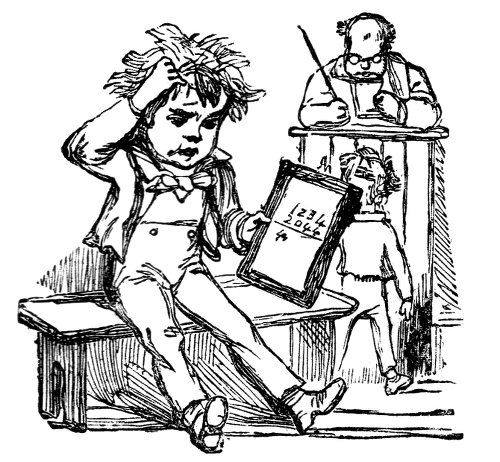
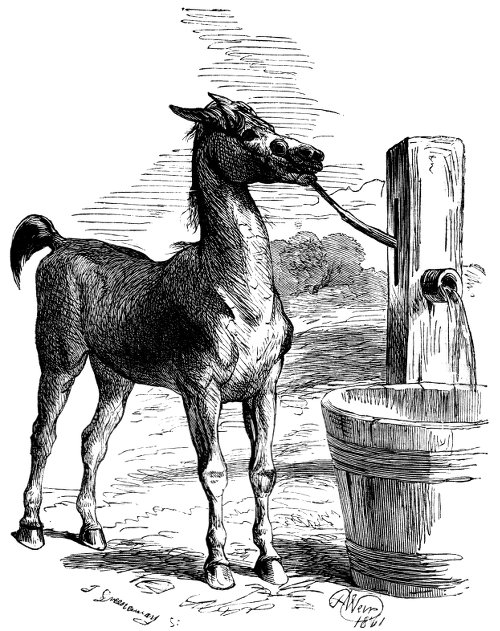
I am sure you would like to hear about an old horse that belonged to my papa when I was a little girl.
Tom had been so handsome when he was young, and thought so much of, that my father kept him long after he was past work. Tom used to lead a very happy life of it in a nice large field, where he had plenty to eat all the summer-day, and no work to do. But there was no pond in this field, only a pump, with a large tub to hold the water; and one of the men used to fill it every day for old Tom.
However, one day, when hay-making was going on, there was a great deal to do for all hands about the place, and Bob the odd man, whose work it was to give old Tom water, was busy helping cart the hay. So when the old horse felt thirsty, and went to his tub for water, he found it empty. He gave a great neigh, and a stamp with his foot; but finding that nobody came, he thought he would help himself, and fell to pumping water into the tub for himself, as you see him in the picture.
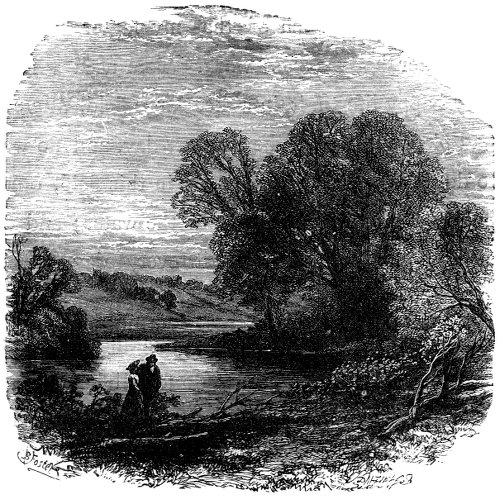

I walked by the side of a tranquil stream,
That the sun had tinged with its parting beam;
The water was still, and so crystal clear
That every spray had its image there.
And every reed that o’er it bowed,
And the crimson streak and the silvery cloud,
And all that was bright, and all that was fair,
And all that was gay was reflected there.
But I took a stone that lay beside,
And I cast it far on the glassy tide;
And gone was the charm of the pictured scene,
And the sky so bright and the landscape green.
And I bade them mark how an idle word,
Too lightly said, or too deeply heard,
Or a harsh reproof, or a look unkind,
May spoil the peace of a heavenly mind.
Though sweet be the peace, and holy the calm,
And the heavenly beam be bright and warm,
The heart that it gilds is all as weak
As the wave that reflects the crimson streak.
You cannot impede the celestial ray
That gilds the dawn of eternal day,
But you may so trouble the bosom it cheers,
’Twill cease to be true to the image it bears.



The next miracle I have to tell you of, my dear children, is one which shows particularly our Lord’s divine quality of mercy. It is called “the raising of the daughter of Jairus,” which means—restoring her to life.
Our Saviour was one day at the house of His disciple Matthew at Capernaum, when a man of importance in the city, a ruler in the synagogue, named Jairus, came to Him. This 191 man had an only child, a daughter about twelve years old, who was lying at the point of death; and he came to Jesus in the hope that He would cure her.
Generally, the poor and lowly were the first to believe in our Saviour. The rich were slow to accept the self-denying doctrines which He taught; the learned were too wise in their own esteem to listen to His instruction. But when they were in affliction both the rich and the learned sometimes came to Jesus to seek His aid. So it was in this instance.
We may imagine what the unhappy father suffered at the prospect of losing his darling child,—at the thought of her fading away from him, and sinking into the grave. As he was rich, we may suppose that all had been done by the doctors that could be done; so now in an agony of despair he turned to seek our Saviour. No doubt he thought of all the miraculous cures Jesus had effected, as he went towards Matthew’s house, where he found our Saviour at the door teaching a crowd of people. Jairus immediately fell at His feet, and with heart-felt earnestness “besought him greatly” that He would come and see his child.
Jesus rose, and went forth, followed by a number of people, while Jairus led the way to his own house. The poor father would have walked quickly, every moment seeming an age till he reached his sick child’s bedside, but the crowd pressing round, interfered with their speed, and soon there arose another cause of delay.
In the crowd was a poor woman who had been very ill for a long time. She had consulted many doctors, but none could cure her; and at last she had spent all her money in trying to regain her health. Hearing that Jesus was near, she approached Him in great fear and trembling. She was almost crushed by the crowd, as she struggled to come near Him; but at length succeeded so far as to be able to stretch forth her hand, and touch the border of His mantle. In a moment she felt that she was recovering 192 from her illness. Our Saviour stopped, and turned towards her, when she cast herself at His feet, fearing for her presumption. But He looked graciously upon her, for He knew why she had touched His garment; then speaking to her, He said:—“Daughter, be of good comfort; thy faith hath made thee whole.” And from that hour she was cured.
After this incident, Jairus was again hurrying on, leading the way to his house, when messengers met him with the agonizing intelligence that the child was already dead—gone beyond the reach of human help. Thereupon Christ turned to Jairus, saying:—“Be not afraid; only believe, and she shall be made whole.” For it was as easy to Him to bring back the dead, as to restore the living.
He went into the house with three of His disciples and the parents of the child. Then He addressed words of comfort to the father and mother, saying,—“The damsel is not dead but sleepeth;”—meaning that her death would only be like a short sleep, because He was going to bring her back to life.
Then taking hold of the little girl’s hand, as though He were about to waken her from a pleasant sleep, He said: “Talitha cumi!”—that is, “Damsel, arise!” The words were no sooner spoken, than the colour returned to her cheeks, her eyes opened, and she arose as if just awakened from a refreshing sleep.
We are told that “the parents and all present were astonished with a great astonishment.” We may also suppose how great was their delight, and how unbounded was their gratitude to our blessed Lord.
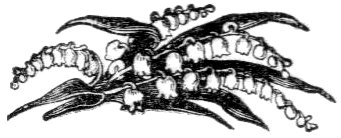
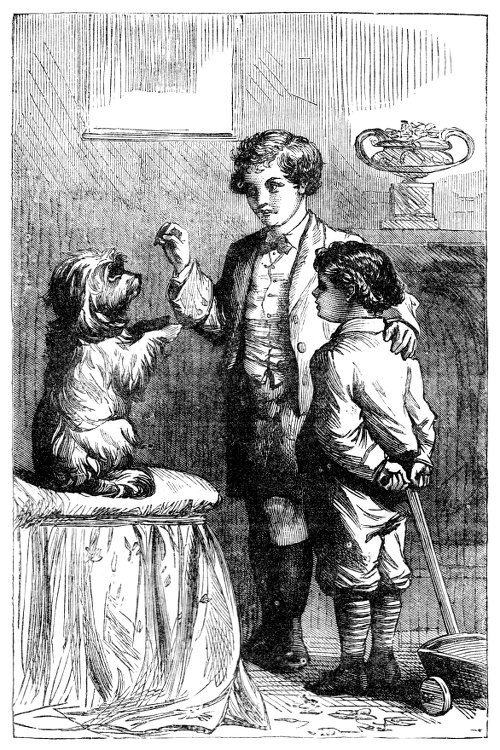

In giving you an account of Alec, one of my little boy friends, I must give you at the same time an account of Elfie, one of my little dog friends, for the two are inseparable. Both these friends of mine are Scotch; and I met them first when the little boy was yet in petticoats, and the doggie a tiny little puppy that had just left its mother.
The two young things grew up together, Elfie, the dog, becoming every day more of a companion for Alec, the boy. But the dog grew old the fastest, and when the event I am going to tell you of occurred, Alec was about nine years old and Elfie about seven; which is in fact quite old for a dog, and an age at which he is likely to be as wise as ever he will be.
Alec had no brother, but he had a cousin at whose house he used to spend a good deal of his time. Little Arthur was about four years younger than Alec, and would follow him about like his shadow, looking up to his big cousin as an authority on all matters. He learnt from Alec to consider Elfie the most wonderful dog in the world, with more sense than most people. He thought Elfie understood everything that was said to him, and could do almost everything he was told to do. Many an hour the three would spend together; and Alec and Arthur never appeared tired of seeing Elfie go through the common dog’s trick with a piece of sugar on his nose. When the word “Trust” was said to him, he let the sugar remain on the tip of his nose, while he only squinted at it with all his might. Directly he heard the words “Paid for” he would jerk it into the air, and snap it up as it fell. This is how the three are amusing themselves, you see, in the picture.
One morning when it was very hot, Arthur’s mamma 195 and I were sitting under the shade of some trees in the garden, working and reading. We knew that little Arthur was about somewhere in the garden or the grounds with his cousin Alec, who, we thought, was old enough to keep the little one out of harm’s way. Suddenly we heard a sound of panting and puffing, and saw Elfie tearing across the garden towards us. With his short legs and long hair he appeared as if he was rolling over the ground: his little red tongue was hanging out of his mouth, and we could see his bright eyes gleaming with excitement through the overhanging locks of hair.
“What can be the matter with the dog?” exclaimed Arthur’s mamma, jumping up. “Has he gone mad?”
As she spoke, Elfie began barking furiously, and seizing her dress in his mouth, tried to drag her away. A thought struck me, and I cried out,—“Something is wrong with the boys, and Elfie has come to let us know!”
In the direction Elfie had come from, but hidden from our view by trees, was a large piece of water: towards this we hastened. Fortunately Arthur’s papa was sitting in the library, of which the window was open: we called to him as we ran, and he followed as fast as he could. Coming in sight of the water, our worst fears were realized. Only a few yards from the bank, but in quite deep water, we beheld the canoe floating bottom upwards, and the two boys clinging to it; or rather, Alec clinging to the canoe with one arm, and with the other supporting Arthur, who had fainted.
The father plunged in instantly, and in a moment brought Arthur to shore, and placed him in his mother’s arms. Alec, left alone, easily supported himself by the canoe till his uncle returned, and brought him also on to the bank. The fault was Alec’s, who had taken out the canoe from the boat-house without permission; but what praise could be too great for Elfie, who had probably saved two lives by his intelligence? We all agreed he was the most wonderful doggie in the world.
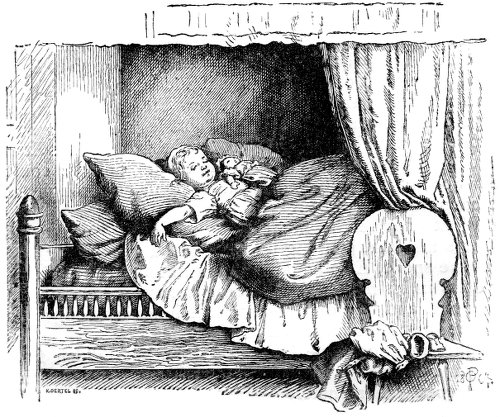
1.
Wake up, little Maud, ’tis a sunshiny day,
The kitten is up, and already at play;
And Maud like the merriest kitten can run,
And scamper, and frolic, and laugh at the fun.
2.
Wake up, little Maud, for on thicket and tree
The birdies are singing as gay as can be.
As sweet and as clear can my little Maud sing
As ever the merriest bird on the wing.
3.
Wake up, little Maud, for the flowers are awake,
The sweet breezes are blowing on mountain and lake;
The world is all beauty and brightness to-day,
Then wake, little Maud, with the roses to play.


The course of my story obliges me now to follow the doings of Maurice’s cousin Eusèbe through one chapter. His goat Jeanne had died some time ago; to her had succeeded a monkey, then a dog; afterwards some birds, and last of all a lamb. With his usual caprice these had all been discarded in turn, and he had at this moment no animal to pet or to torment. It was a hot day towards the end of August, and Eusèbe lounged about in one easy chair after another, trying in vain to occupy or amuse himself. Suddenly, the idea occurred to him that he would like to pass a few days in Paris.
Now Mr. and Mrs. de Malassise were just thinking of going to stay for a few weeks at Dieppe, which was a place more suitable certainly for the hot weather than Paris. But Eusèbe had taken a fancy to Paris; and to gain his point, he acted the little comedy which always succeeded so well with his parents: he screamed, and rolled over and over on the ground like a mad child. They were frightened, and started off with him the very next morning, leaving the shady woods of Malassise for the dust of the Boulevard des Italiens, where they usually lodged when they came to Paris.
On the afternoon of their arrival, Eusèbe asked his father to take him for a walk as far as the square of the Bastille. He had heard that street-jugglers often performed their tricks there: and, hot as it was, he insisted 199 that his mamma, a delicate weak little woman, should walk with them.
They had walked as far as the gate of St. Denis, when a man approached them, who had some little watches for sale fit for children. He went up to Eusèbe, who, although such a big boy, was not above stopping to look at the glittering watches with their bright chains attached. Then the man said in a low voice,—
“Would you like to buy a beautiful horse, my prince?”
This title of prince was pleasant to the ears of Eusèbe, and with an air of kind protection, he replied,—
“What is it you ask, my good fellow?”
“I ask if your lordship feels disposed to make the purchase of an extraordinary and beautiful wooden horse.”
“I have rocking-horses of all sorts and sizes,” rejoined Eusèbe.
“I doubt it not, your Highness.”
This title of highness completed the work of turning the little boy’s head; and putting on the air of being a very great person, he said,—
“Why, you seem to know who I am.”
“Indeed, who does not know your lordship?”
Now of course this cunning fellow did not really suppose that Eusèbe was either a prince or a lord, but saw very well that he was a spoilt child, and thought it would be a good opportunity for selling Cressida—for Cressida it was that he was offering,—and he dared not sell it publicly.
Mr. and Mrs. de Malassise, who had walked on a little in front, now stopped, and the former called out, “What’s the matter?”
“Sir,” replied the man, when he came up to them, “I have a beautiful wooden horse to sell, which walks and moves about like a real horse.”
“Be off!” said Mr. de Malassise, who did not like the look of the man; “we don’t want to buy it.”
“Would you just come and see it, noble sir? it is at 200 my house, only two steps from here. It has the movements of a live horse.”
“No, No!”
“But you need not buy it, sir, if you would only come to see it. It is an extraordinary horse.”
“Papa, I want to see it,” said Eusèbe.
“No, no, my dear,” urged his father.
“Papa, I will go to see the horse,” and Eusèbe began to cry.
“Why oppose him, my dear?” said Mrs. de Malassise, “as he is so anxious to see the horse. Suppose he should have an attack of the nerves out here! what should we do?”
“There, you hear, papa; why do you oppose me? I’m going to have an attack of the nerves, I feel I am.”
“Oh, let us go and see the horse then, pray,” said Mr. de Malassise, resigning himself with rather a bad grace.
They had followed their guide for about a quarter of a mile, when an empty hackney-coach passed. The man stopped it, saying, “Perhaps, sir, the lady will be tired if she walks all the way; had you not better take this hackney-coach? I will get up on the box, and direct the driver.”
“Why, you said it was only two steps,” urged Mr. de Malassise.
“Oh, it is not far,” replied the man.
“Yes, yes, let us have the coach; I can’t walk any more,” exclaimed Eusèbe.
So of course they got into the hackney-coach, while the man who had the horse to sell seated himself beside the coachman. On they went, right out of Paris, into the narrow streets of a suburb inhabited by very poor people. On they went still, while the houses became more scattered, and the roads were so bad that the horses could hardly get along.
At last the coachman pulled up, and taking out his pipe, he began to light it, as he said, “I won’t go no further; the patience of a hackney-coachman has its limits, these 201 roads ain’t fit for any carriage, and the sun’s hot enough to kill a camel of the desert, much more horses like mine.”

“THE HORSES COULD HARDLY GET ALONG.”
Mr. de Malassise had lost patience also, and called out to their guide in an angry voice, “Now, my man, tell me at once, where are you leading us to?”
“My noble gentleman,” the man replied, “do not be angry; I did not think it was so far, but you can see the house now; and, if the lady will get down from the carriage, we can reach it on foot in two minutes.”
Mr. de Malassise looked out of the carriage window on one side, and his wife on the other. They saw a few scattered houses of the meanest description, and began to view their position with dismay; but Eusèbe found it an amusing adventure.
“I wish, now,” he said, “we were in Sicily, and then we might be attacked by brigands in such an out-of-the-way place as this. I read about them in that little book you gave me yesterday, you know, mamma.”
At this remark Eusèbe’s mother began to laugh as if it were very funny and brilliant; even his father was almost restored to good humour by it. And when Eusèbe added—“only, neither that man nor the coachman are as handsome as brigands”—the father and mother exchanged looks of congratulation at the wit and humour of their son.
They walked a short distance along the dirty, badly-paved street, and entered a small low house almost in ruins. You may imagine how well it was furnished, when I tell you that Mrs. de Malassise was obliged to stand, because the master of the house—that is, the man who conducted them—had but one chair to offer her, and that was lame of two of its legs. He opened a large closet, the door of which was concealed, appearing only like a panel in the wall, and he led forth a pretty little black horse, scarcely bigger than a large dog;—but I need not describe Cressida a second time to my young readers.

“HOW DID YOU COME BY THIS HORSE?”
Now although Eusèbe had often had Cressida described to him by Maurice, he had never happened to see the little horse; consequently he did not recognise it on the present occasion; nor had he ever imagined Cressida to be so wonderful as he found this horse to be. He had no sooner seated himself in the saddle than the pressure of his knees against the sides of the horse caused the legs to move, and it walked round the room. Then, when Eusèbe in his delight very naturally began to pat it on the neck, this had the effect of causing the little horse to neigh 204 joyfully, just like a real pony. Eusèbe’s father and mother were as much astonished and delighted as he was.
“How did you come by this horse?” inquired Mr. de Malassise, in a voice which sufficiently showed the suspicions he entertained.
“It was given to me by a friend of mine,” replied the man.
“That was a generous friend. And how much do you ask for it?”
“Eighty francs, though I know it is worth a great deal more.” Then seeing that the small price he asked had only made his customer more suspicious, he went on:—
“My noble gentleman, I will tell you the truth. Formerly I was rich, and sold toys in a shop on the Boulevard; but misfortunes came upon me, I had to give up my business, and of all the beautiful things I had, this wooden horse is the only one I kept. I kept it for my children to play with; but, alas! noble sir, it has pleased heaven to take them away from me. Ah, my children! my children! they resembled your beautiful son. I would have kept this horse always in remembrance of them, but hunger, sir—hunger compels me to sell it.”
He dried his eyes with the back of his hand.
“Poor man!” said Mrs. de Malassise, much touched. Then she whispered to her husband, “My dear, I would give him twenty francs, and leave him the horse he is so fond of.”
“I see no reason for giving him twenty francs, and I think we should be wise to have nothing to do with the horse either. I suspect it’s a matter which the police will have something to do with sooner or later.”
“Oh, what a hard heart you have! and how suspicious you are!” rejoined the wife. “I am sure the poor man is truthful. Just look at his despair.”
The man was sitting on the ground, hiding his face with his hands. He seemed to have partly heard the whispered conversation, and said, “Her ladyship is an angel of 205 charity, but I should not regret parting with the horse when I knew it would be in the hands of such a good young gentleman.”
Eusèbe at last put an end to the hesitation of his parents in a very simple way.
“Now, then,” he said, “why don’t you buy the horse?”
“No, no,” said his father, “let us go away.”
“Papa,” cried Eusèbe, “I won’t go away from here till you buy the horse.” And he began to tear his hair, and stamp on the ground, uttering piercing shrieks.
“I want the horse! I want the horse!” he cried.
“My noble gentleman,” urged the man, “what are eighty francs to you? When I was rich I would have given more to spare my children’s tears.”
“Oh dear! oh dear! I feel that I am going to fall,” cried Eusèbe, turning round and round.
“Oh, calm yourself, my child,” cried his mother.
“Eusèbe, my dear boy,” said his father kindly, “I will give you another horse. You shall have the most expensive that can be found.”
“No, I want this one; I want this one.”
“Well, well, you shall have it—there; only don’t cry.”
“But I want it directly.”
“You shall have it directly. We will take it away with us.”
Eusèbe became calm as if by enchantment. He had not really shed a tear, but his eyes were red from being rubbed, and his hair was pushed up in indescribable disorder.
“Come, kiss me,” said his father.
“Yes, papa; but do you know that twice to-day I have very nearly had an attack of nerves through your fault.”
Matters being thus comfortably arranged at last, the eighty francs were paid, the horse was put into the coach, and they all returned to the Boulevard des Italiens. Here Eusèbe amused himself the whole evening by riding his pretty little horse round and round the drawing-room.
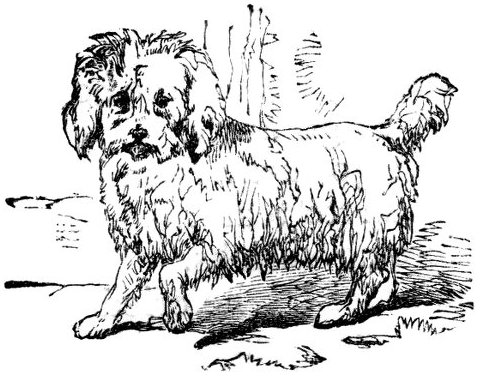
The Dog will come when he is called,
The Cat will run away;
The Monkey’s cheek is very bald,
The Goat is fond of play.
The Parrot is a prate-apace,
Yet knows not what he says;
The noble Horse will win the race,
Or draw you in a chaise.

The Pig is not a feeder nice,
The Squirrel loves a nut;
The Wolf would eat you in a trice,
The Buzzard’s eyes are shut.
The Lark sings high up in the air,
The Linnet in the tree;
The Swan he has a bosom fair,
And who so proud as he?
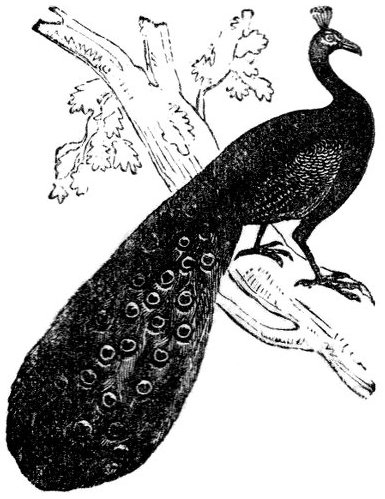
Oh, yes, the Peacock is more proud
Because his tail has eyes;
The Lion roars so very loud,
He’d fill you with surprise.
The Raven’s coat is shining black,
Or, rather, raven grey;
The Camel’s hunch is on his back,
The Owl abhors the day.
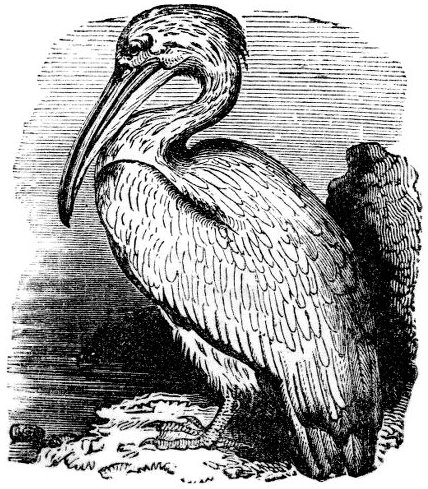
The Pelican she loves her young,
The Stork its parent loves;
The Woodcock’s bill is very long,
And innocent are Doves.
The little Wren is very small,
The Humming-bird is less;
The Lady-bird is least of all,
And beautiful in dress.
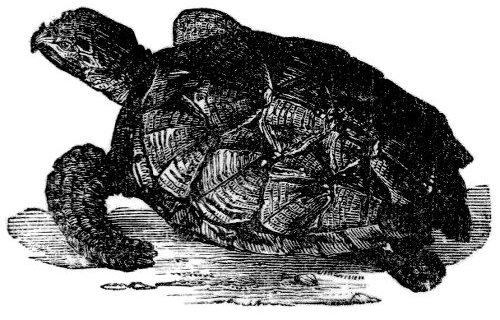
The Turtle—citizens’ delight!—
Doth wear a coat of mail;
The Glow-worm shines the darkest night
With lantern in its tail.
The streakèd Tiger’s fond of blood,
The Pigeon feeds on peas;
The Duck will gobble in the mud,
The Mice will eat your cheese.
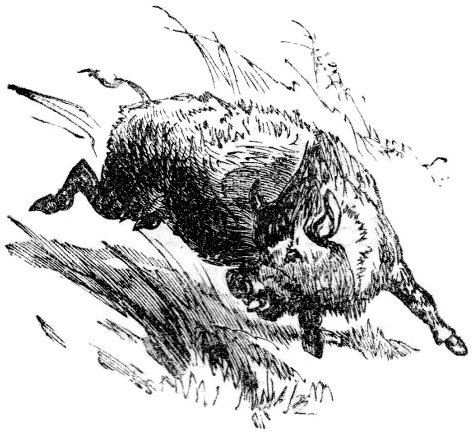
In Germany they hunt the Boar,
The Bee brings honey home;
The Ant lays up a winter store,
The Bear loves honey-comb.
The Hen guards well her little chicks,
The Cow, her hoof is slit;
The Beaver builds with mud and sticks,
The Lapwing cries “Pee-wit!”
The child that does not these things know
Might well be called a dunce;
But you in knowledge quick must grow,
For youth can come but once.

Mr. Lovesport has left his native land in search of larger game, and more adventurous and dangerous sport than he can find in England. One day in southern Africa he has cautiously approached a herd of antelopes, and is just within the distance for a shot, when he observes a sudden commotion among them, some bounding one way, some another, as if in terror. Looking round to discover the cause, he finds himself face to face with an enormous lion. The lion pauses to consider whether he will have an antelope for dinner or Mr. Lovesport. Our intrepid hunter takes advantage of the pause to shoot him through the heart.
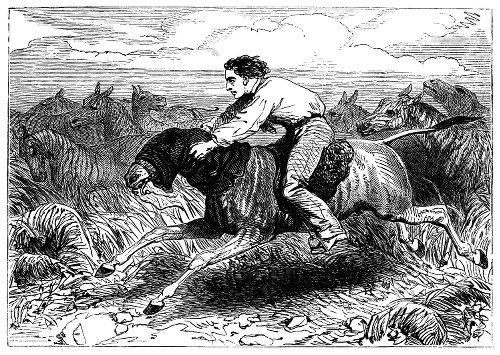
This is the way Mr. Lovesport once rode a Quagga. It is a kind of zebra, or wild ass, and is considered untameable. A friend of Mr. Lovesport—a colonist in southern Africa—had caught one, and had tried in vain to tame it. Our hunter offered to ride it, if they could put on saddle and bridle. This was at length accomplished: he mounted, and the quagga galloped away, away till he reached a herd of his own species, who all came round, curious to know what thing he had upon his back. Our hero became anxious to return, and, taking off his jacket, contrived to wrap it over the eyes of the beast; then once getting its head in the right direction, spurred it on, till it stopped exhausted at his friend’s door.
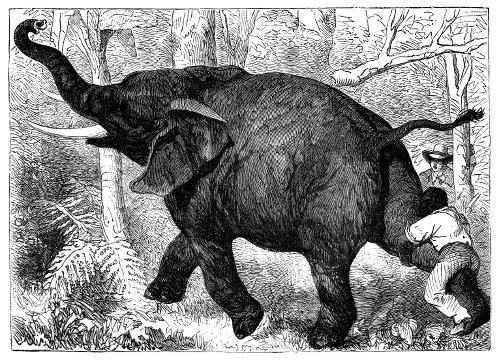
In one of his hunting expeditions, Mr. Lovesport finds an elephant asleep under some trees. He has only one attendant with him, a negro, named Jumbo; and this man takes it into his head that he will tie the elephant’s leg to a tree with some strong rope he has, while it sleeps: and see what it will do when it wakes up. He had just finished his work when the huge creature awoke. In a moment the rope was snapped, but unluckily Jumbo was entangled in it, and remained for a moment attached to the elephant’s leg, which he had to cling to that it might not step on him. In this way he was carried some distance, though without being seriously hurt. Our hunter did not fire at the elephant, lest, becoming furious, it might crush the little creature clinging to it.
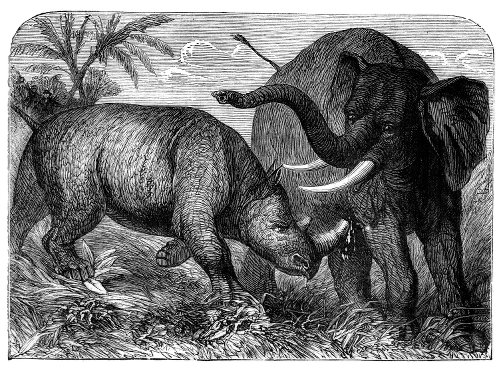
This is a scene where our hunter was a looker-on, not an actor. He was on one of his expeditions with Jumbo, when they heard the trumpeting sound made by an elephant when angry. Looking through the trees, they saw a huge creature stamping with his feet, and tearing up the grass with his trunk. Presently a rhinoceros approached, as if the two had appointed to meet and fight upon that spot. The battle did not last long. The poor elephant could not guard the under part of its body from its enemy’s horn; and it fled away, perhaps mortally wounded, leaving a stream of blood upon its path. This is the last scene for to-day of Mr. Lovesport’s adventures, but perhaps he will send some more another time.
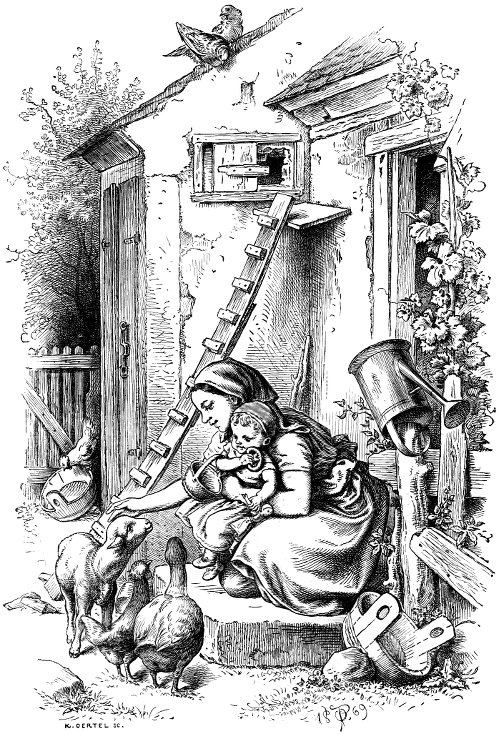

Little kid is bleating, bleating,
“Pray, give me some cake;”
Little baby’s crying, crying,
“Mine it mustn’t take.”
Goosey-gander, waddling, waddling,
Wants to have some too;
Cock-a-doodle, strutting, strutting,
Crows out, “How d’ye do?”
Henny-penny’s pecking, pecking
Up the husks and grain;
Mother’s petting, spoiling, spoiling
Everyone, ’tis plain.
Summer air is blowing, blowing
Fragrance all around.
See the blossoms, falling, falling
Softly to the ground.
All the world is shining, shining
Radiant with the sun.
Summer glory shedding, shedding
Light on every one.
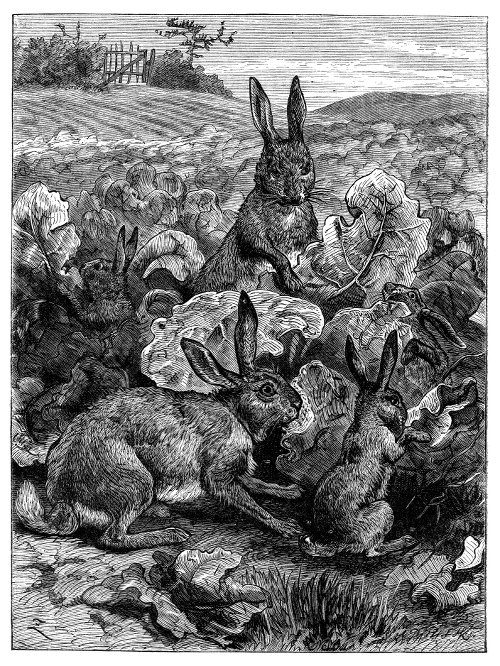
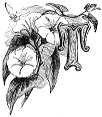
The picture on the opposite page shows us a family of hares enjoying themselves in a field of cabbages. How pretty, and yet how queer-looking they are! I think that one standing up in the middle, with his ears so straight up, must be Mr. Hare, while the others are Mrs. Hare and the children. They are eating away as fast as they can, while the good papa looks on, and listens with those long ears of his for the sound of any approaching footsteps. If he hears any noise of a kind which he considers alarming, he will give notice to his wife and little ones; then they will all scurry off so fast that they will soon be miles away from the spot where they have been frightened.
A hare never walks or trots, because the hind legs are so much longer than the front ones, but it goes along in a succession of bounds. Hares can take great leaps, too, in height as well as in distance: they have been known, when pursued, to jump over very high hedges, and even walls of moderate size. One curious quality in a hare is that it never becomes fat, however rich the pasture may be on which it feeds; consequently it can go very long distances without fatigue.
Though rabbits are easily domesticated, it is very unusual to see a really tame hare; and you will be surprised to hear that the only one I ever met with was in a house in London. I went one day to call upon a gentleman—an artist—who was very fond of animals: indeed, among other things, he often painted animals. I found him in his studio, working away at his picture, with three dogs and a cat and her kittens all in the room with him. I sat for some time talking and admiring his picture, when presently I heard an odd sort of knocking or rubbing at the door.
“I hear some one at the door,” said I, after the noise had been going on for some time, thinking my friend did not hear it.
“Oh, that’s only stupid old Tommy; he is such a bother; he never seems able to settle anywhere now he’s so old.”
“Who is he?” I asked, thinking he was speaking of some stupid old person.
“Would you like to see him?” said the artist; “he is not particularly handsome now, and he is dreadfully impudent.”
Walking to the door he opened it, and who should come hopping and leaping into the room but a gigantic hare. He hopped past me first, and then turning round, came quite close, and stood up on his hind legs. He made one long ear stick forward and the other backward, looking more comical than I can tell you; and he twisted his curious, sensitive, moveable nose round and round, while he stared at me with his immense prominent eyes till I thought they were going to drop out.
“That isn’t manners, Tommy,” said my friend; “it’s very rude to stare so: lie down.” Whereupon good obedient Tommy crouched down, with his nose between his two front paws; laid his ears back flat on his neck, and did his best, I am sure, not to stare—but that he could not help, by reason of the peculiar nature of his eyes.
I caressed him, and found him as tame and gentle as a little dog. Indeed my friend had had him from the time he was a very tiny creature.
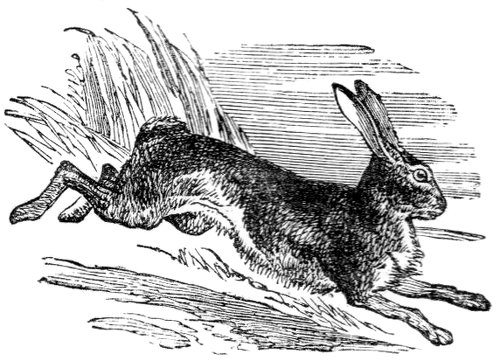
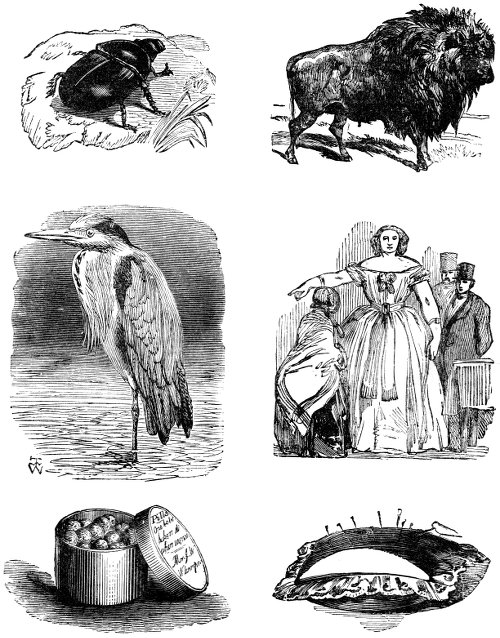
Now here is a puzzle-page for you. Of these six objects that you see, two begin with the letter B; one begins with G; one with H, and two with P. Can you tell what they all are?

A Fox once fell into a deep well, and could not get out again. A Goat, wishing to drink, came to the well, and seeing the Fox, asked him if the water was good. The Fox did not say he had fallen into the well, but pretended he stayed in the well from choice; and saying the water was the best he had ever tasted, begged the Goat to jump down and try it. The 219 Goat jumped down, and drank; and then sly Fox told him that they were imprisoned in the well. “But,” said he, “we may still get out if you will place your fore-feet upon the wall; I will then run up your back and escape, and help you out afterwards.” The Goat did as the Fox asked, and Mr. Fox, running up his back, soon got out of the well, and then ran off. The Goat called after him, when the Fox, turning round, cried out these words:—“You foolish old fellow! If you had as many brains in your head as you have hairs in your beard you would have looked before you leaped.”
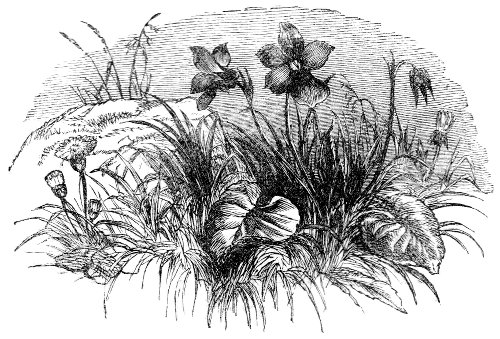
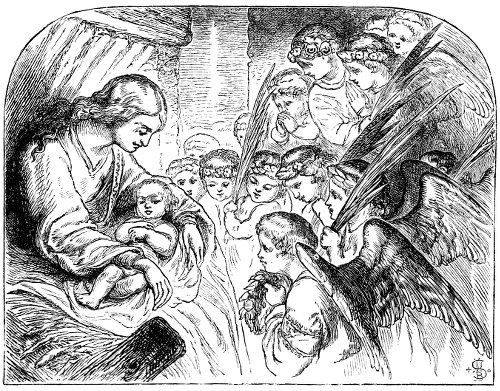
Mother, what are angels made of?
Have they feet and hands like ours?
Are they things to be afraid of?
Do they hide among the flowers?
Mary says they are not creatures
Made of flesh, and bones, and blood,
Though they have the sweetest features,
And are glad when we are good.
Fanny thinks they’re always roving
Here and there on wings of light;
Gentle things, all kind and loving,
Guarding us by day and night;
Made by God to keep from danger
Little ones at school or play;
Just like those that watched the manger
Where the infant Jesus lay.
Tell me, mother—dearest mother!
Oh, I do so want to know.
Susan says that “little brother
Is an angel.” Is it so?
Darling, this is all that’s told us
In the word of Him above,
That those beings who behold us,
In their unseen arms enfold us,
Creatures are of Light and Love.
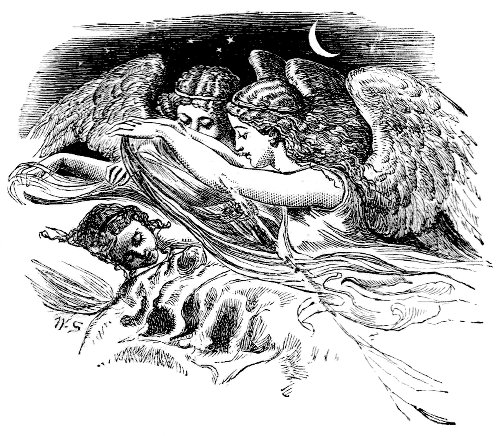
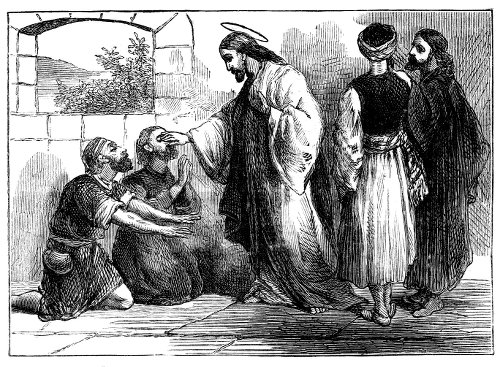

The next miracle that I shall tell you about, my dear children, is one which is represented in the picture above; it is our Saviour giving sight to two blind men.
When He left the house of Jairus, the ruler, whose daughter He had raised from the dead, the scripture tells us that two blind men followed Him. As they followed, they kept crying out, “Thou son of David, have mercy upon us!” They meant by this entreaty to 223 implore Christ to have pity upon their darkness and misery; to consider how helpless and useless they were; and, as He had just restored to life a child already dead, to have mercy upon them, and give them back their sight.
It is evident that these men thoroughly believed our Saviour to be the true Messiah, whose coming had been foretold by the prophets; for one of the signs by which the true Messiah was to be known, according to the prophecies, was His giving sight to the blind.
Our Saviour at first, as though to try the faith of these two poor men, appeared not to regard them. But they followed Him into the house where He was going, groping their way as they best could, and repeated their prayer, “Oh, son of David, have mercy on us!” Then Jesus, as St. Matthew tells, said unto them, “Believe ye that I am able to do this?” and they replied, “Yea, Lord.” Then He touched their eyes, saying, “According to your faith be it done unto you.” And their eyes were opened.
We may observe that Christ appeared to make faith a condition upon which the success of the miracle was to depend, and it is evident that these poor men had perfect faith. What unspeakable joy and gratitude they must have felt on finding their dark night suddenly changed into bright day. Without pain, without any operation, simply by the touch of Christ upon their sightless eyes, had one of the greatest of earthly blessings been given to these two men.
There is another miracle I shall have time to tell you about to-day, my children, which was performed soon after the last. It consisted in the feeding of a multitude of people—five thousand—upon five barley loaves and two small fishes. It took place on the shore of the sea of Galilee.
A great multitude of people had followed our Saviour to listen to His teaching, and He had led them some distance away from any town. He preached to them a long time, and was still continuing His instructions when the 224 shades of evening began to gather round. Then the disciples reminded Him that the day was declining, one of them saying, “This is a desert place, and now the time is far passed: send them away that they may go into the country round about and buy themselves bread, for they have nothing to eat.”
But our Saviour was too compassionate to send the people away hungry, and He intended Himself to give them food. He said to His disciples, “How many loaves have ye? go and see.” And when they knew, they said, “Five loaves and two fishes.” Christ then commanded them to make all the people sit down upon the grass; He took the five loaves and the two fishes, and brake the loaves, and gave the pieces to His disciples to give among the people: He also divided the two fishes, and gave them in the same way. Then the multitude, as the Bible tells us, ate and were filled: and, what is more, the disciples afterwards gathered up several basketsful of the fragments that were left.
Thus, by our Lord’s power, those five loaves and two fishes were made sufficient to feed and satisfy that great multitude of five thousand people.
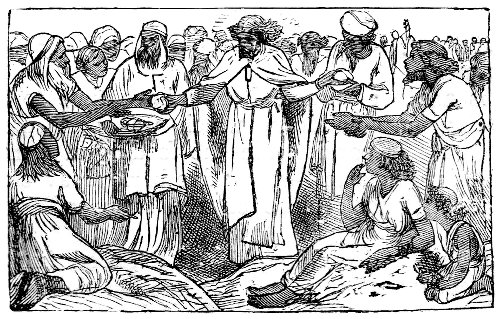


I am sorry to say I have to tell you to-day of one of my little friends, whom I cannot hold up as an example to any of my little readers. Dora is an only child, and a very spoilt one too,—though I ought to mention that I think she is improving of late; and her improvement dates from the event I am going to describe. It was a severe lesson for her, but I hope and believe it will prove a useful one.
Dora had a very naughty and stupid habit, whenever she was found fault with, of saying she would run away. One day, when the family were staying at Hastings, nurse scolded her for drawing upon her books, and threatened to tell mamma.
“I like to draw upon my books, and I will!” replied Dora; “and if mamma scolds me I shall run away.”
“Well,” rejoined nurse, losing patience for once, as she afterwards confessed, “and it would be real kindness to us all, miss Dora, if you did.”
Whereupon Dora walked out of the nursery, highly offended.
A little while afterwards mamma asked for Dora to go out with her on to the sands. The child was nowhere to be found. Nurse supposed her to have gone into the drawing-room: mamma thought her still in the nursery. The house was searched in vain. Then nurse remembered the conversation which had taken place:—Dora had really run away!
The alarm and distress of the father and mother were 227 beyond description. The child was only seven years old: what could have become of her? Servants were sent out in all directions—on to the sands; to the pier; into the streets: but she was nowhere to be found. Then nurse had a happy idea. You must know that in many country towns like Hastings, an old custom is kept up of having a Town-crier. When people lose anything, like a watch, a purse, or a dog, they employ this man. He goes about the town ringing a bell to attract attention, and then reads from a piece of paper, in a loud voice, a description of the thing lost; offering a reward for its discovery.
Nurse very sensibly thought a lost child might be cried about the town as well as anything else; and a handsome reward was offered for the recovery of this naughty little girl.
But what had become of Dora in the meantime? She had run out of the house suddenly in her fit of anger, carrying her doll in her arms, but without hat or jacket. At first she was delighted to find herself alone and free in the streets, and laughed as she thought how frightened nurse would be. But after walking for a little while, she discovered that she had lost herself: for she had only been at Hastings two or three days, and did not even know the name of the street she lived in. She had hoped to frighten nurse, but never thought of being frightened herself; yet that was what it had come to.
She sat upon a doorstep and began to cry. Presently somebody spoke to her. Then Dora thought of stories she had heard of children being stolen, and started up and ran away. So she wandered about for two or three hours, till at last the Town-crier came close to where she stood in a doorway. She heard him read the description of herself, and the people standing by recognised it also. The crier had a kind face; she let him take her by the hand, and thus was led home again, followed by a crowd of children.
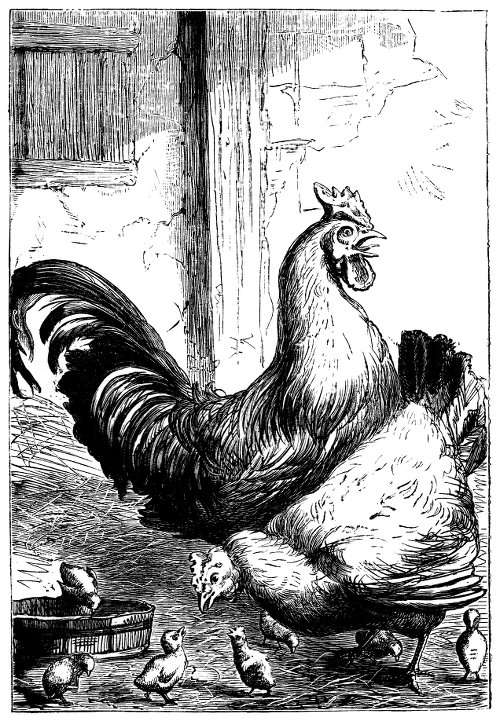
Allegretto. mf.
1.
From the old barn floor
to the cottage door,
Struts forth the old white hen;
Very proud she feels,
for at her heels
She has a brood of ten.
She’s glad to get out
and roam about,
Quite tired of sitting still;
And now they will go,
For she tells them all so,
To the meadow down by the old mill.
2.
For we there shall meet
Many worms to eat,
And beetles green and brown;
But, she says, “D’ye hear,
Don’t go too near
The mill-pond, or you’ll drown.”
They waddle along
The weeds among,
And learn to scratch and pick;
But each little fellow
Is covered with yellow,
And has a queer bill for a chick.
3.
Very soon the hen,
With her brood of ten,
A beetle sees beyond;
As she runs to pin it,
In a minute
All jump into the pond.
She opens her eyes
In great surprise
To see them swim with ease,
And says, “Well, I never!
Now, pray, did you ever
See any such chickens as these?”


For the subject of our natural history picture to-day we have some Grouse. There is a nice little family of grouse, consisting of papa, mamma, and four children, all taking a pleasant walk among the heath and fern. At the same time the old birds are searching for the wild berries, the buds of the heath, and the seeds which form their principal food. Look how eager the young ones are to have their share of some nice berries, which mamma grouse has just found!
These birds are only met with on moors or wild heaths, and chiefly in mountainous countries; indeed Scotland is the country where they are now principally found, and people often go there on purpose for the grouse-shooting. I daresay some of my little readers already know that grouse-shooting begins on the 12th of August, a great day for sportsmen. From the way in which game is now preserved in England, partridge-shooting has come to be a tamer sport than it used to be. Many brace of partridges may sometimes be brought down during a short walk over cultivated fields, and such sport seems less manly than taking long fatiguing walks over breezy moors, as sportsmen have to do in search of grouse.
The grouse is a very wild and shy bird, and both skill and caution are required in approaching them; they live in flocks, called “packs,” and form their nests, as partridges do, upon the ground. Their plumage is a rich brown, mottled with paler spots; the tail is black, with the exception of four of the feathers, which have red marks on them: over the eye also is a rough bare red spot. The bill of the grouse is short, arched, and very strong; and the legs of this bird, as the winter approaches, become feathered. 232 As an article of food, the grouse is very delicate, and has an excellent flavour.
The bird I have been describing is the red grouse; that is in fact the common grouse. But there is also found in Scotland, though less frequently, the black grouse, which is a much larger bird. The red grouse is rather bigger than a partridge.
I once made the acquaintance of a tame grouse—one at least that had been domesticated. The gentleman it belonged to had picked it up out of its nest when a tiny thing on the moors in Scotland; and being a great bird-fancier, and having a collection, he had brought it in a cage to his house in Kent. When I saw Peter—that was the name given the grouse,—he was quite tame, but very ill-tempered. You might take him up if you pleased, but he always pecked the hand that did so. Peter was supposed to live habitually in a wicker cage, but in truth he had pretty well the run of the house. More than once he had taken flight beyond the premises, but had returned for his food. One day however he was missed, and never came back. His fate may be surmised from the fact that about the same time a party of gentlemen in the neighbourhood, being out shooting—it was September—were surprised to find a grouse among the game they had killed.
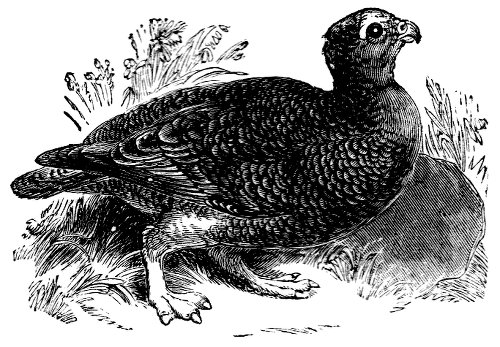

A few days after Eusèbe came into possession of the horse, in the way described in the last chapter, he went off with his father and mother to Dieppe for sea-bathing. He took Cressida with him, for he wished to show it to some little friends whom he expected to meet there.
His fondness for the wooden horse did not last long. Instead of being reasonable and gentle with it, like Maurice, he was continually wanting this ingenious automaton to do more than it was intended to do. When it failed, he would grow impatient, call it obstinate, and beat it with all his might; sometimes he would spitefully pull the hair from its mane, and try to tear out its eyes. The best that could happen for the poor little horse now would be for its master to get tired of it, and cast it aside entirely.
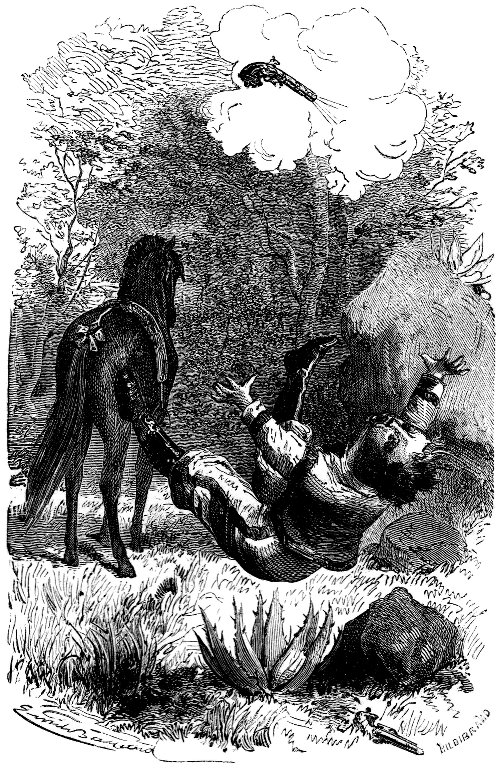
THE RECOIL OF THE PISTOL THREW HIM ON HIS BACK.
The garden of the house occupied by Mr. and Mrs. de Malassise at Dieppe was ornamented with grottoes, rocks, cascades, rivulets, all in miniature, as if intended to amuse children. Eusèbe was fond of jumping about among the rocks and rivulets, and one day he took it into his head that Cressida should do the same. He took the horse at a gallop up to a little stream, only two or three feet wide, intending it to leap across; but it galloped into the water instead, leaping not being one of the movements it was constructed to make. Eusèbe took it up to the water two or three times, not sparing threats or blows while he did so, but in vain. Then he began to scream, as usual when he was in a rage, and looking about for some means of satisfying his anger, he remembered that his father kept a loaded pistol on the upper shelf of a closet in his dressing-room. 235 He ran upstairs, and by mounting on a chair, contrived to reach the pistol, which was a double-barrelled one. Returning again into the garden, and still as furious as ever against the poor little horse, he went close up to it and fired off both barrels at once.
The horse was not so much damaged as Eusèbe himself. The child held the pistol in both hands, the left hand being close to the muzzle, and the result of his exploit was that not only did the recoil of the pistol throw him down on his back, but his hand was wounded and burnt by the explosion. He fainted from the pain, and in this state was picked up by his father, who ran into the garden at the sound of the shot.
Mr. and Mrs. de Malassise, instead of being angry with their son, laid the blame of the accident on the unfortunate horse; and a servant was at once ordered to break it in pieces, and throw it upon the fire.
In consequence of this accident Eusèbe had an attack of fever, and was obliged to keep his bed for some days. Most children in his place would have been taught a useful lesson by the suffering he thus brought upon himself. Not so Eusèbe: he only took advantage of the anxiety his parents felt about him, to be more tyrannical and capricious than before.
About this time Mr. and Mrs. de Roisel came also with their son to pass a few weeks at Dieppe, and Eusèbe was not yet quite restored to health when my little friend went to see him. With tears in their eyes Eusèbe’s parents related the accident which had happened to their dear child; and it did not seem to occur to them that there was anything in the affair for which he could be found fault with. But Maurice felt indignant at what he considered cruelty even towards a wooden horse. He was thinking of Cressida while he listened to the story; but as Eusèbe’s horse was not particularly described by his parents, it never occurred to Maurice that it could be his own lost Cressida.
A few mornings later Maurice was taking a country 236 walk with his father and mother a little way out of Dieppe, when, as they approached a small village, they heard the loud and angry voices of children.
“Gee-up, gee-up! Get on, lazy beast!” said one voice.
“He can’t carry so many,” said another.
“He can’t move!” exclaimed a third.
“I tell you he can.”
“Tell you he can’t.”
“You shall see. Hi! Gee-up, gee-up! Go along!” and immediately the sound of a shower of blows, rained upon the back of some poor animal, reached the ears of Maurice, who, without stopping to reflect, ran as fast as legs of eight years old can run, in the direction of the noise.
He stopped at the entrance to a farm, where, in the courtyard, he saw five or six boys, and as many little girls, all clustered round a small pony. Two boys and a girl had contrived to seat themselves upon its back; two or three more were dragging it along by the bridle, while another beat it with a stick behind. The pony hung down its head in a way that was pitiful to see; it appeared to have a shoulder dislocated, and a leg was broken above the knee, and bandaged up. Its difficulty in “going along” seemed quite accounted for.
“Are you not ashamed,” cried my little friend, “to ride, three of you at once, upon a little pony who is lame and ill?”
At first the boys were inclined to answer by some impertinence, but seeing Mr. and Mrs. de Roisel coming up behind Maurice, they rather sulkily got down from the pony. Then the poor animal, relieved from their weight, raised its drooping head, and a sudden suspicion flashed across the mind of Maurice. He cried out,—
“Oh! it is Cressida!”
Maurice ran back to his parents to tell them of his discovery; but instead of explaining himself, he could only say,—“Come, come quickly!”
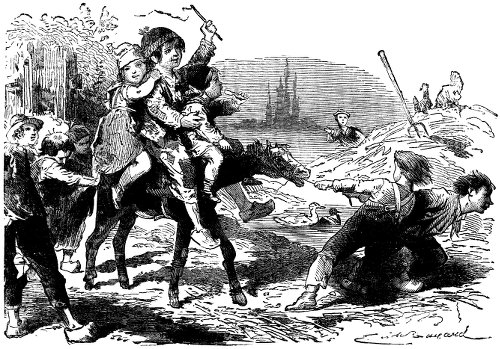
TWO BOYS AND A GIRL HAD SEATED THEMSELVES UPON ITS BACK.
He took his mother’s arm, for he was so agitated he could scarcely stand.
Mr. de Roisel at once asked who was the owner of the unfortunate Cressida. It was one of the boys present: but the mother of this boy, being at work in the next field, observed that something was going on, and she now came up out of curiosity to see what was the matter. When Mr. de Roisel said he wished to buy the horse, she replied that she would sell it willingly.
“How much do you ask for it?” said he.
“You can give me whatever you please, sir.”
“A napoleon—is that enough?”
“Indeed, sir, it is too much,” she replied, “for the horse cost me only the trouble of asking for it. But if you like to give so much, sir——”
“Where did you get it?” asked Mr. de Roisel.
“Well, I got it in this way, sir. You must know I go twice every day into the town to take milk to different houses. One afternoon I was at the house of a rich gentleman, when I heard him call out to the servant to throw this little horse into the fire. It was in much better condition then than it is now, and though it might not be good enough for that rich gentleman’s children to play with, it was quite good enough for mine. So I begged the servant to give it me rather than burn it, and he let me have it. There you see, sir, how I got it without paying anything. We poor people do not buy wooden horses for our children.”
Mr. de Roisel gave the napoleon to the good woman, and some money also to her little boy.
“May God for ever bless you, my good gentleman,” said she, astonished at his generosity; and she almost suspected that he must know of some hidden treasure inside the little horse.
When Eusèbe heard how Maurice had recovered Cressida, he was furious, and wanted the servant to be immediately sent away who had spared the little horse from burning. That evening Mr. de Malassise gave an account of the circumstances under which he had bought the horse, and spoke of the suspicion he had felt from the first of the man who sold it. The next day information was given to the police, and it was not long before the seller of the horse was arrested. He proved to be one of the thieves who had broken into Mr. Duberger’s house. His accomplice was a man who went about the country as a pedlar, selling ribbons, silk-handkerchiefs, and toys. In this way he used to obtain access to houses, learning where valuable things were kept, and what were the habits of the family. The two together had committed the robbery: both were tried and convicted.
Mr. Duberger recovered only a small portion of the objects of art that had been stolen, but he was much rejoiced to hear that Maurice had got back his horse.
It was the month of October, and Maurice had returned to his own country home, where Cressida was installed once more in its old stable. But the poor pony had lost its former activity; it could not go faster than a walk, and even that with difficulty.
One morning Maurice was in the garden, when he saw Fritz approaching him, walking as fast as his old legs would carry him, and having an open letter in his hand. My little friend ran to meet him, when the old man embraced the child with tears in his eyes, and called him his benefactor. Seeing that Maurice did not understand why he used the word, Fritz tried to explain, but for some time he was too much affected to say anything intelligible.
“Ah, my poor niece!” he exclaimed, “she owes her life to you! Is it possible, so young a child! But I never thought you like other children. You have saved the life of a poor woman and her three little children. Nobody would believe it; yet it is true; it is all told here.” And he pointed to the letter in his hand.
At this moment Mrs. de Roisel came up, and welcomed Fritz back again. Then he soon became sufficiently calm to explain himself clearly. It appeared that the young woman, with her three children, whom Maurice had met in the Luxembourg gardens, and had been so kind to, was the niece of Fritz. No sooner had she arrived in America than, overflowing with gratitude, she wrote her uncle a long account of what had happened to them, telling him how they had been saved by a young child named Maurice de Roisel. It was this letter that Fritz held in his hand. He had returned from Nuremberg to his cottage in the village only the evening before, and had come the first thing this morning to express his gratitude to Maurice.
“But how,” asked Fritz, “came you to have so large a sum of money by you to give?”
“Oh, I did not give it all myself: besides, I was obliged to part with Cressida.”
“Is it possible?” cried Fritz, starting back and turning pale. “You didn’t sell it?”
“Alas!” replied Maurice, “it was only by parting with Cressida that I could procure the money.”
“You were right: I must not complain. If it was the only way, you did right.”
“But, oh Fritz! you cannot imagine in what a state I found my poor Cressida again.”
“What!” cried the old man, with the joy of a child, “you have Cressida again then? You should have told me so at first; it would have saved me pain. But you did well to sell it, else how could my poor niece have joined her husband?—my niece who is almost my daughter!”
Then Maurice related Cressida’s adventures, and the wooden horse was brought out for Fritz to look at.
“It is not seriously damaged,” said he, after examining it. “In a few days I will restore it to what it was a year ago: but bear in mind, I am the only doctor that can effect a cure. If, when I am no longer alive, it should be damaged in the same way, there is no one who could mend it. Watch then carefully over it in future.”
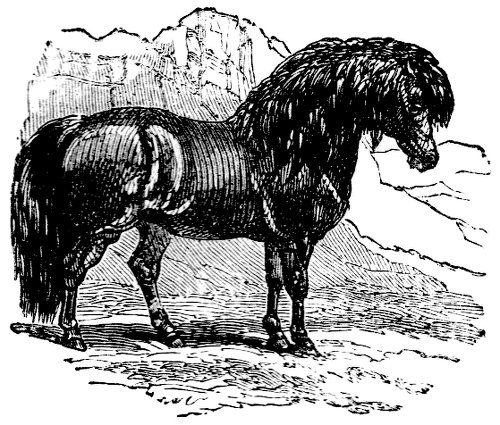
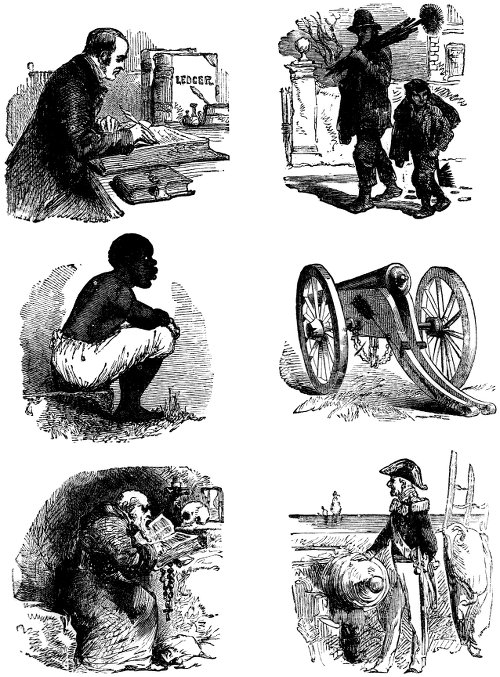
Now, children, see if you can find out the names of these different objects. Three of them begin with A, one with C, one with H, and one with S.
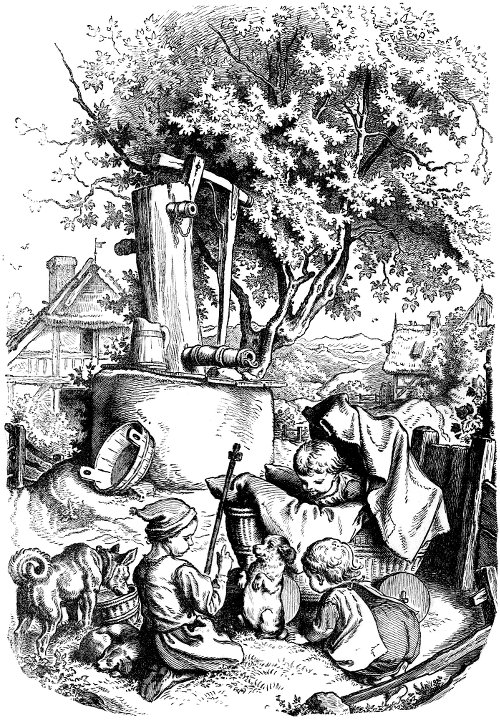

Now, Master Puppy,
Sit up, if you please;
This is for your good,
Not in order to teaze.
When a nice little doggie
Seems anxious to learn,
A kind little master
Will not from him turn.
Now you must not be snappish,
But just do your best;
A five minutes’ lesson,
And then you shall rest.
Little Katie and Baby
Are anxious to see
If you try, like a good pup,
To imitate me.
Old Boxer, your friend too,
Is curling his tail,
And pricking his ears,
For fear you should fail.
But if you are careful,
I plainly can tell,
You will grow quite accomplished,
And do very well.

JACK AND DOBBIN.
There were two horses that belonged to my grandpapa when I was a little girl, that I think you will like to hear about; for although they were only common carthorses, employed to do farm work, they set a good example to children. They never quarrelled, but were always good friends; they worked together, and rested in the field together, and always kept together.
I will tell you what happened one day. It was a winter’s morning, bitterly cold, and when Jack went to drink at the pond he found it was frozen over. He struck the ice two or three times with his foot to break it, but it was too hard, so off he trotted to Dobbin, who was standing a little way off, and neighed his trouble to him. Dobbin returned to the pond with Jack, and they both struck the ice together with their great heavy feet, and broke it; so that Jack could have his drink. Were they not clever?
We may often learn a lesson from animals; and I hope, my children, you will imitate these sensible nice horses, and always help each other.
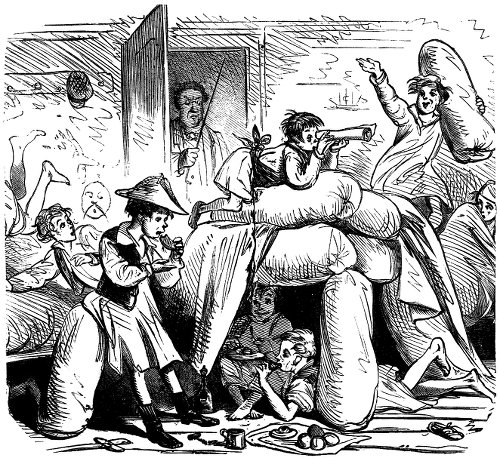

This picture reminds me, children, of some funny stories that I have heard your Uncle John tell, when he and I were boy and girl together, of his exploits as a schoolboy. According to his account, not only he, but most of his schoolfellows, used to lead merry lives enough at school. They had a great deal of what he called excellent fun, though I am afraid it sometimes bordered upon mischief or naughtiness. 247 I used to consider that he and his schoolfellows were regular heroes, as I listened to his stories when he came home for the holidays; and even now I must confess I cannot help laughing when I think of some of his naughty pranks.
Uncle John first went to a large school when he was eleven years old, and I remember now the tremendous hamper of good things he took with him. The boys who slept in his bedroom were so pleased with the contents of his hamper that they determined to make a great feast. To add to their enjoyment they imagined themselves to be settlers in the back woods of America or Australia. They built a log-hut with bolsters, and had a sort of pic-nic. One of them mounted on the top of the log-hut to look out with his telescope for any approaching savages, while the others enjoyed their suppers in and about the hut. When their fun was at its height, the door softly opened, and in walked Dr. Birchall, spectacles on nose, and cane in hand. What followed may be imagined.
You would not recognize Uncle John himself, whom you know only as a man six feet high, in that little lad on the right hand side of the picture, half hiding under the bedclothes. As a new boy he had no share either in the riot or its punishment; except indeed in so far as his hamper had supplied the means of riot. Still, what he saw made a deep impression on his mind; and particularly he thought a great deal of the inconvenience arising from the sudden appearance of the master.
You know that Uncle John is an engineer now, and even as a little boy he had a great turn for mechanical inventions. Well, he pondered over some means by which such a sudden interruption to the enjoyment of his schoolfellows might be prevented in future; and I will tell you what he did.
It happened that the large room in which he slept formed the upper floor of a wing of the house, which had been added to it when it became a school; and there was no access to this room from the principal staircase of the 248 house. You had to pass through the room below, and go up a little separate staircase to reach to floor above. The lower room was also a bedroom for the boys, and Uncle John’s little scheme was this:—
He made a hole with a gimlet in the frame of one of the windows of his bedroom, passed a piece of string through the hole, and carried it outside the wall of the house down to a similar hole in a window-frame of the room below. To the end of the string in the upper room was fastened a small rattle, while the other end of the string—that in the room below—was taken into the bed of a boy who slept near the window.
This admirable little invention once in order, there was more rioting in the upper room than ever; and the master, disturbed by the noise, soon went, cane in hand, to stop it. The instant he set foot in the lower room, the boy there who held the string in bed gave it a little pull; the rattle sounded—ting! ting!—in the room above, and in an instant every boy was in bed and snoring. Perhaps they had been playing at leap-frog the moment before, but as Dr. Birchall entered the room—and he crept up the staircase very quietly that he might catch them unawares—he found some twenty boys lying in bed, seemingly sound asleep, though snoring unnaturally loud.
The doctor was so disconcerted by this unexpected state of things that he retired at once, fancying perhaps that his ears had deceived him when he thought he had heard a noise in the room. The same thing happened two or three times: the doctor was puzzled, and the invention appeared a complete success; but at last all was discovered.
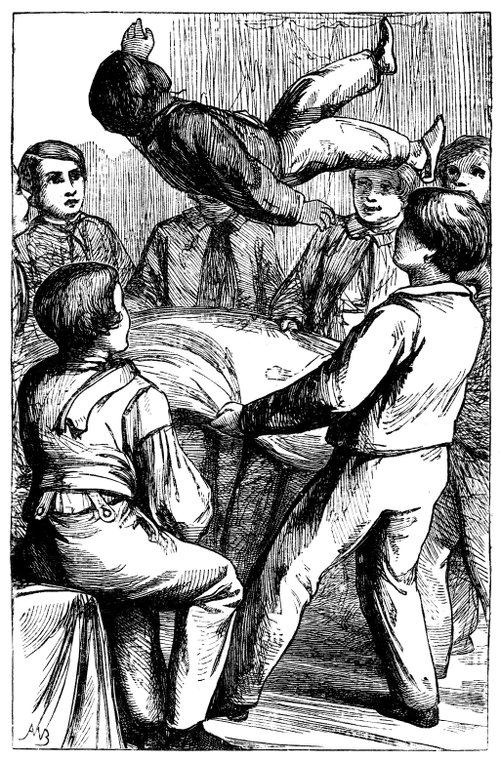
The boys one evening began imprudently to play at “Tossing in the blanket” before they were undressed. The rattle sounded, and they had just time to hide away the blanket. But the doctor coming in, and finding they were only then beginning to undress, knew they must have been at some mischief, and began questioning one after another. Unluckily, while he was in the room the rattle sounded again by accident: perhaps the boy in the room below had pulled the string by moving in bed. The doctor looked about, found the rattle hanging just below the window, saw the string, opened the window, and traced its course outside, went down into the room below and understood the whole arrangement. Then he put the rattle in 250 his pocket, and went away without saying a word. The boys declared he had such difficulty in keeping himself from laughing, that he was afraid to speak lest he should burst out.
However, next day every boy in that room had a slight punishment, and so the matter ended.
Now I will tell you another of Uncle John’s pranks at school. There was a large tree in the playground, the upper branches of which spread out very near to the windows of the bedroom I have been describing. One evening Uncle John got hold of a large hand-bell, which was used for ringing the boys up in the morning, and climbing up the tree, he fastened it by a piece of string to a branch near the top. Then another boy threw him the end of a long string from a window of the bedroom into the tree, and he fastened it to the bell in such a way that, when it was pulled in the bedroom, it made the bell ring in the tree. Having accomplished this arrangement, he came down from the tree and went to bed.
At ten o’clock at night the household was disturbed by the loud ringing of this bell. The master, in his dressing-gown, came out into the playground and soon discovered where the sound came from; but of course supposed that some boy had climbed up into the tree, and was ringing the bell there. It was the middle of summer, and a beautiful moonlight night, so the boys could see from the windows all that took place. Dr. Birchall stood at the foot of the tree, looking up, and exclaimed angrily,—
“Come down, you naughty boy! Come down, I say, directly. Oh, I’ll give you such a flogging! Stop that horrible noise, I tell you, and come down!”
The bell still went on ringing. At last the string—being pulled too hard, I suppose, in the excitement of the fun—broke; and the bell tumbled down from the top of the tree, falling very near the old schoolmaster. This was worse than all.
“What!” he exclaimed, “you throw the bell at me? 251 Why, if it had hit me on the head, it might have killed me. Oh, you wicked boy! I’ll expel you, sir. I’ll find out who you are if I stop here till morning.”
At last, however, his patience was exhausted, and he went away, but left an old butler to watch the tree all night. The boys from the windows could see this man settle himself comfortably on a seat which was at the foot of the tree. He lighted his pipe, and prepared to carry out his master’s orders, and watch till daylight. By three o’clock in the morning the dawn broke; then the man began to look up occasionally into the tree. Now and then he walked a little distance away, first in one direction, and then in another, to look into parts of the tree that he could not see from underneath. He kept this up till the sun had risen, and it was broad daylight; then at last he became convinced that it was impossible there could be a boy in the tree. He walked slowly into the house, still smoking his pipe, with a puzzled expression on his face.
And I suspect he was not the only person who felt puzzled. The next day the boys were going home for the holidays, so that no further inquiry could be made. I wonder if Dr. Birchall ever found out how it had been managed!
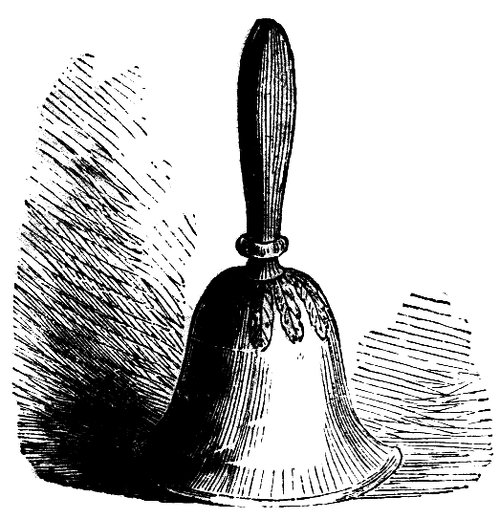
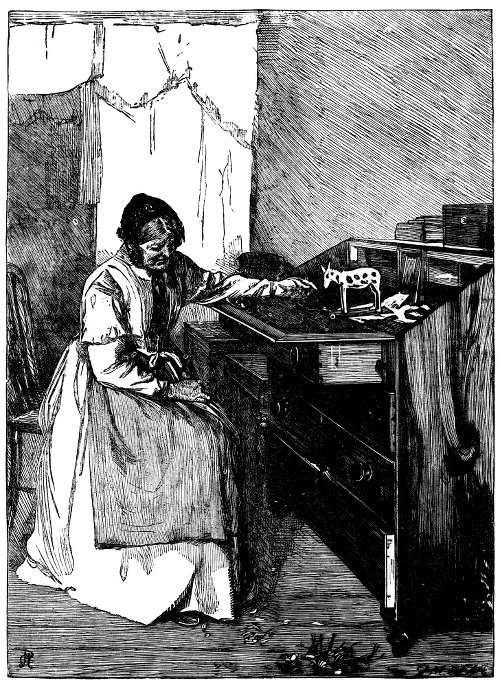

Only a common room,
Old, carpetless, and bare!
Only a poor old home!
A poor old woman there!
She sits with her eyes downcast,
And thinks of the bygone years;
Looks at the treasures gathered there
When her heart held hopes and fears.
Hopes that lived but to die,
Like the sweet one that gave them birth;
Fears which changed to despair,
When she sat by her lonely hearth.
Despair is now dulled by time,
But it quickens and lives again,
As she opens the old bureau
To see treasures that still remain.
Only a broken toy—
An old mis-shapen thing!
Yet endowed with cruel strength
To inflict a sharp heart-sting.
A few old withered flowers
Have fallen to the floor,—
Where, where are the little hands
That gathered them long before?
Oh terrible, cruel power!
That lies in inanimate things,
To open the old deep wounds
Time had touched with his healing wings.
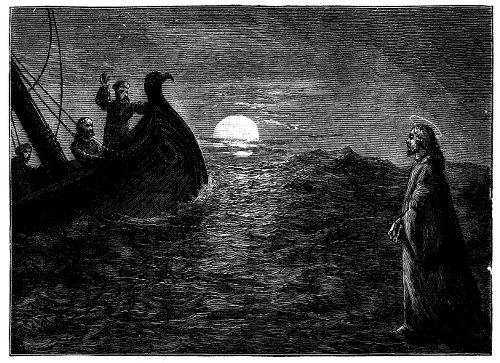

The miracle I have to tell you of to-day, my children, is called—Christ walking on the waters. It followed closely upon that I described in our last Sunday talk; I mean, that of our Saviour feeding a multitude of people with five barley loaves and three small fishes.
As evening came on, the multitude that had been fed, dispersed; and Christ desired His disciples to enter into 255 their boat, and go before Him to the town of Bethsaida, where they might pass the night, while He went up into a mountain alone, intending seemingly to spend the night in prayer.
The disciples had not gone far upon their voyage, when the light breeze which was bearing them on their way, changed into a strong adverse wind. It had become dark, “and the sea arose by reason of a great wind that blew, and the ship was tossed with the waves.” They were overtaken in fact by one of those sudden squalls to which the lake, or sea of Galilee is liable. In vain they rowed with all their strength; the contrary wind drove them out of their course into the middle of the lake.
In such an hour of danger they must have thought of the time, not long before, when they were caught in another storm on the same sea. But then their Master was with them in the boat; at His command the sea became calm, and the wind ceased. How they must have wished that He were with them now, or that they could call Him to them, that His voice might once more hush the tempest into peace, and control the winds and waves! They had entered the fourth watch of the night, which, as the night was divided into only four watches, means that the morning was approaching, and the storm was still raging fiercely, when they beheld a human figure approaching, walking on the surface of the water as if upon firm ground.
Sailors and fishermen have been in all ages superstitious, and those of that day generally held the belief that storms were raised by spirits, who delighted in the turmoil of the elements, and in the terror and destruction that were caused. Some superstitious thought of this kind seems to have been the first that entered the minds of the disciples, as they saw the figure approaching on the water. What followed is thus described by St. Matthew:—
“And when the disciples saw Him walking on the sea, they were troubled, saying, It is a spirit; and they cried 256 out for fear. But straightway Jesus spake unto them, saying, Be of good cheer; it is I; be not afraid. And Peter answered Him, and said, Lord, if it be thou, bid me come unto thee on the water. And Jesus said, Come. And when Peter was come down out of the ship, he walked on the water to go to Jesus. But when he saw the wind boisterous, he was afraid; and beginning to sink, he cried, saying, Lord, save me! And immediately Jesus stretched forth His hand, and caught him, and said unto him, O thou of little faith, wherefore didst thou doubt?”
The want of a thorough, unbounded faith and confidence in the power and divinity of our Saviour, was a fault which He had to contend against even in the disciples, who beheld His miracles almost daily. Peter and others who were in the boat became afterwards apostles of Christianity, and performed miracles themselves, when their faith must have become perfect; but it seems to have grown up gradually; and the words of Christ signify that Peter failed to walk on the water himself on this occasion only through his want of faith.
St. Matthew goes on to tell us that when our Saviour came into the ship, the wind ceased. Then the disciples came round Him, worshipping Him, saying,—“Of a truth thou art the Son of God.”

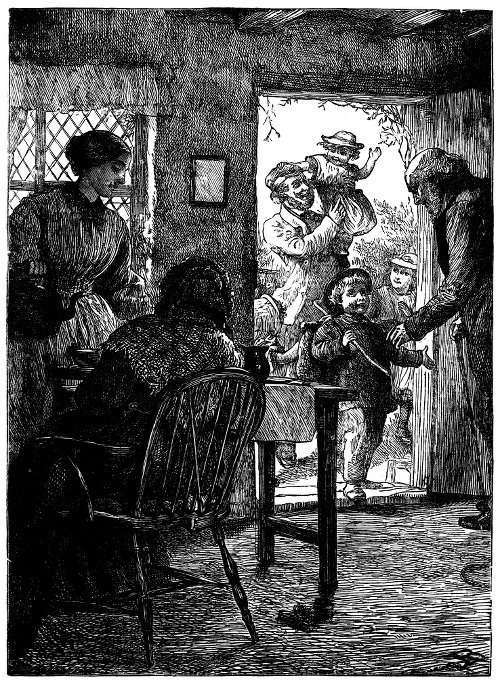

Sammy is a great friend of mine, and a brave boy too, I can tell you: he is only seven years old, but quite a little man. Sammy’s grandmamma was my nurse when I was a child, and through her I came to know him. She married a fisherman at Hastings one summer when we were staying there, and has lived from that time to this in a cottage on the beach just out of the town. Her husband no longer follows the calling of a fisherman, for he is very old; but he lets out rowing boats, of which two or three are generally to be seen drawn up on the beach close to the cottage.
The daughter of this old couple married a shipwright, and has four children, of whom Sammy is the eldest. She, her husband, and all the children, live with her father and mother in the cottage on the beach. How they all squeeze in, I do not pretend to know: it is a puzzle to me, but they manage somehow.
I had not seen my old nurse for some years—indeed not since her daughter’s marriage—when, being at Hastings not long ago, I went one afternoon to pay her a visit. I approached the cottage from the beach, and entered at the door of a sort of kitchen which I found open. The proper entrance to the cottage, it appears, is from the road at the other side, where there is a little garden. However, I went in, and finding the kitchen empty, went through it to another open door leading into a sitting-room. Through this door, without being observed myself, I beheld one of the pleasantest sights that has ever met my eyes.
The children had evidently been out to meet their father on his way home from work, and they were all coming through the garden and just entering the opposite door together, as you see them in the picture. Sammy marched in front, carrying his father’s basket of tools upon his shoulder as proudly as if he bore a treasure. Father himself was carrying little Topsey, the youngest child, upon his shoulder, who pulled his hair and crowed and laughed all the time; while the other two children, Mary Jane and Florence Bessy, walked, or rather jumped and danced, on either side of him. The old man in the cottage was smiling a welcome to them as they came in: in short every face, from the youngest to the eldest there, looked bright and happy.
As I stood there observing, I mentally thanked heaven for the happiness which love and good temper can bring to the poorest cottage. My presence was soon noticed: my old nurse appeared heartily glad to see me, and showed me her grandchildren with great pride; but I did not remain long, for I saw that their tea was ready, and I was disturbing them. Afterwards I was often at the cottage; but I must hasten on to describe what first made me rank Sammy among my little friends.
One morning I was rambling along the shore, sometimes walking on the sand, sometimes on the slippery green rocks, reading occasionally a few lines of a book I had in my hand, but more frequently looking out to sea and watching the fishing boats riding bravely on the waves, when I suddenly became aware that the tide had risen quickly, and that I was hemmed in on a sort of island. I found water in front and on each side of me, while behind me was a ridge of rocks too rugged and slippery to climb.
Now my life was in no danger I daresay, but the prospect of having to walk through the water up to my knees was disagreeable. Very near me, but separated by some impassable rocks, stood the cottage of my old nurse, looking 260 tranquil and pretty in the sunshine; while close by it, in a little cove formed by a wooden breakwater, a small boat was moored. I approached as near as I could and called for help. Presently little Sammy made his appearance in answer to my cries; but instead of returning into the cottage to obtain help from some grown-up person, he set to work at once to unmoor the boat, jumped into it, and began paddling along with a single oar round the breakwater and the rocks to where I stood.
I was in an agony of fear lest he should be carried out to sea, for he was certainly too little and too weak to have made head against any current or wind that there might be. However, the boat soon touched the sand close to me. I scrambled in, getting very wet the while, and then by our united efforts we got her off again and paddled her round to her own little harbour.
Once in safety, I exclaimed: “Oh, Sammy, how dangerous for you to come alone! why didn’t you call somebody?”
“I thought you’d drown furst,” said Sammy, with a grin; “but grandfather’s ill and father’s out, so I wor the only man at home, yer see.”
“And a true little man you are,” said I to my friend Sammy; and I am sure my little readers think so too.
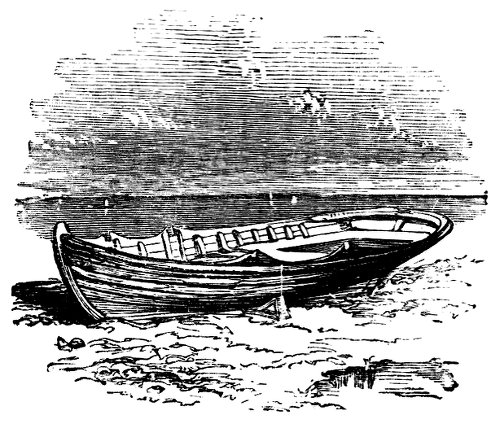
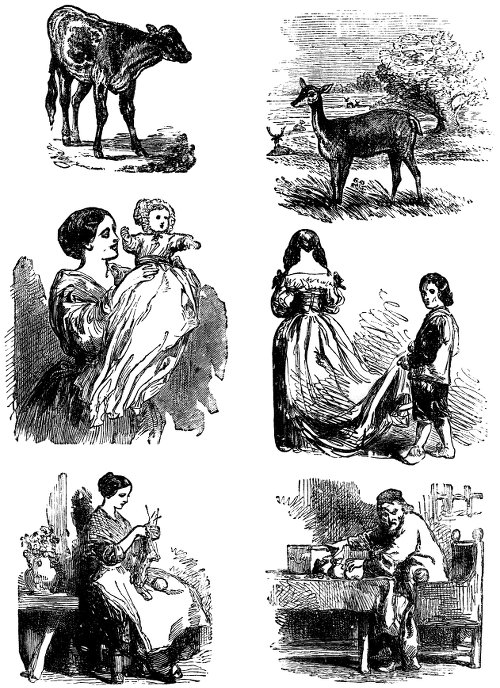
Now, dear children, see if you can find out this puzzle page. One of these objects begins with a B, one with C, one with F, one with K, one with M, and one with P.
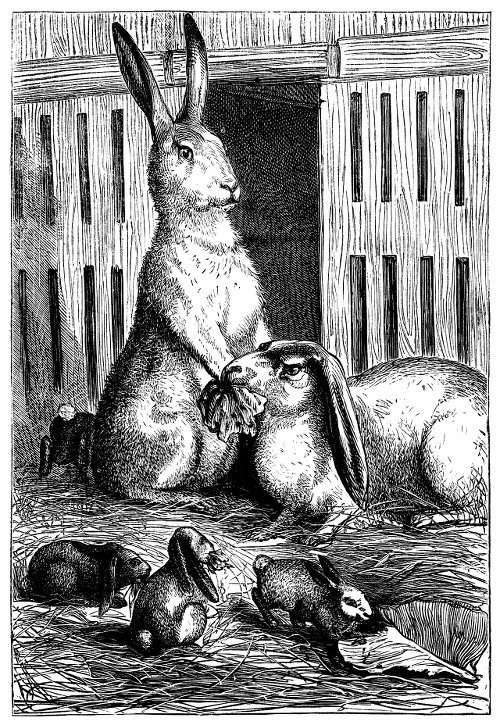
Cheerfully. mf.
1.
Come out, little rabbits here’s something to eat:
The birds are all singing their music is sweet.
The morning is lovely with sunshine and shade;
Come out, little rabbits, and be not afraid.
2.
Some nice water-cresses we have for you here,
Some bran and some clover, so come, do not fear;
The dog will not harm you, the cat is away,
Come Bunnie, come Minnie, for food and for play.

We must suppose that an interval of a year and a half has passed since the events happened which I related in the last chapter. The family of de Roisel are staying at Paris, as usual during the winter; and this chapter opens on a certain day, soon after Christmas, when they had guests to dinner. Eusèbe, and his father and mother, were there; also Adrienne Fallachon, accompanied by her father and her English governess. Maurice had met Adrienne again in the Luxembourg gardens, and at length the two families had become acquainted.
The dinner was in the middle of the day on account of the children, and afterwards, to amuse them as they sat round the fire, a singular sort of game was introduced. All were to confess in turn such faults or follies as they were conscious of in themselves, and to relate what bad, or silly, or ridiculous actions these faults had led them into,—it being understood that the grown-up people were only to speak of the faults and follies of their childhood.
They had just settled down to the game when Mr. Duberger came in. He joined in it at once, and related, with great goodnature and perfect candour and simplicity, 265 a multitude of absurdities and mistakes which he had committed in complete innocence, but through negligence and absence of mind. He made every one laugh heartily at his stories.
Eusèbe was the only one of the party who had nothing to relate, for he knew of no imperfection in himself. Some of those present tried to help his memory a little; but no! he could remember no fault he had ever committed. He recollected, and related, only deeds of heroism, which did not fail to cause a slight astonishment in his hearers.
Adrienne, who, under the watchful care of her governess, had much improved in character since we knew her before, spoke of her own caprice and selfishness; and said she always should consider she had caused the misfortunes which befell Cressida, through refusing to give her ten pieces of gold to the poor woman.
“And what did you do at last with those ten napoleons?” asked Mr. Duberger.
Miss Henriette, the English governess, replied for Adrienne: “To tell you that, sir,” she said, “would not be keeping to our game.”
“But I can tell you what she did with them,” said Maurice. “When she went home that day, she had such a scolding from Miss Henriette for her hardness of heart, that she was very sorry indeed, and I have heard she cried a good deal. Well, a day or two afterwards a poor workman was killed, in falling from the scaffolding of a house, that was being built close by. Adrienne heard that he had left a widow and children in the greatest distress; and what do you think she did? She asked Miss Henriette to take her to see this poor woman, and gave her the ten napoleons. I know too that she has often been kind to poor people since, and given away her pocket-money.”
“It is all quite true,” said Adrienne’s father. “I should have told you of it long ago, but Adrienne made me promise that I would not.”
The little girl blushed, and her governess, who was 266 sitting by her, took her hand; but at this moment the general attention was drawn in another direction. A servant came into the room, and spoke in a low voice to Mrs. de Roisel, who replied aloud: “Ask them to come in here, of course.”
The next moment the servant announced Mr. and Mrs. Leopold Kirchner; and a lady and gentleman with three children entered the room.
The name of Fritz’s niece—the poor woman whom Maurice had helped—was known to every one present; it was known also that her husband, having already made a good fortune in America, was about to return to Europe with his family, but their arrival at this time was unexpected. Their dress showed that they had but just come off a journey, and it was evident that, on arriving in Paris, their first thought had been to pay a visit to Maurice.
Finding so many persons in the room, the new-comers stood for a moment confused; and Mrs. de Roisel hastened forward to welcome them.
“Oh, father,” exclaimed the little girl, “here is Maurice. I know him, though he is grown much bigger in two years.”
Maurice was immediately embraced and kissed by every member of the family in turn.
“It rests with God,” said Leopold Kirchner, with deep emotion,—“it rests with God to reward such actions as yours; but if ever it should happen that we can be of any service to you, remember that all we possess, and all we can do, is at your command. But we had another benefactor at the same time.”
“Yes, that was Mr. Duberger,” Maurice hastened to say, glad to turn attention away from himself. “Here he is!”
“Sir,” said Leopold Kirchner to him, “I am not surprised to see you here. My wife’s uncle, Fritz Keller, who wrote to us very often about Maurice de Roisel, told us how you had become his friend and that of his parents. 267 It is natural that those who have good hearts should come together, and esteem and love each other. I find no words, sir, in which I can express my gratitude to you.”
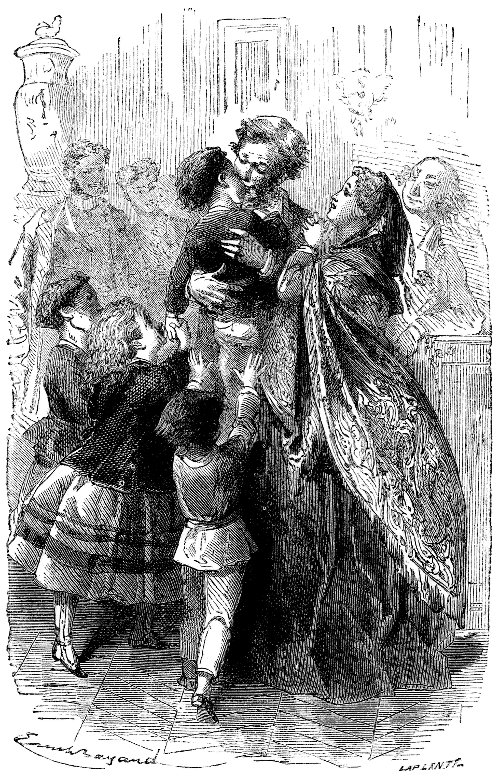
MAURICE WAS EMBRACED BY ALL THE FAMILY.
There was an evident sincerity, and a certain dignity too, in this language that went to the hearts of all. Then 268 they talked of Fritz, who had died at a great age towards the beginning of the winter; and Maurice brought in Cressida to show the horse to his new friends. He had learnt from Mr. Duberger how to value it, and no longer used it as a plaything. Mr. Duberger always declared it to be the most remarkable and ingenious automaton that had ever been made.
When Cressida was brought in Eusèbe informed his parents that he must go away. He had not amused himself at all, and the sight of Cressida always put him out of temper. He regretted so much that when the little horse belonged to him, he had not destroyed it.
Something tells me that among my little readers there may be a few—perhaps the oldest or most clever—who wish to ask me certain questions. They may say to me:—
“Now what moral lesson do you draw from your story? That boy, Eusèbe, who is about the naughtiest and most disagreeable boy that ever lived, is left just as well off, and as happy as the dear good little Maurice. An author can make shadow or sunshine fall upon his paper as he pleases: then he should punish the bad, and make the good happy.”
In reply, I say to you: My dear little gentlemen and my pretty young ladies, you must know that Providence, which watches over us from above, does not institute special rewards for virtue, as men may do; nor has any system like ours for punishing the bad. Yet Providence is always just. To those who do good no other reward is sometimes accorded than that of being good: but, in truth, that is the best reward of all. If a man bestow charity in 269 the hope that God will, as a reward, render him prosperous, he is not really charitable, but only a speculator who risks a little in the hope that he may gain much. Nor can we always see how Providence punishes the bad. They may be rich and prosperous, yet they may suffer from the hatred that is in their hearts, and from the envy they feel towards those who appear happy.
But to satisfy my little readers I will leap over the fifteen years which separate the present time from that at which my story began, and see what has become of the principal characters.
To begin with Eusèbe. You may meet him everywhere; at the theatres, in the park, at races, always with his glass in his eye, generally with a cigar in his mouth, and dressed in a conspicuous and ridiculous fashion. But you may ask perhaps what he does? Nothing: that is the only thing he is capable of doing. With a cold heart and an empty head he has no friendships, nor has he intellect enough even to enjoy his amusements.
That attack of the nerves which his parents always dreaded, but which never came, was an excuse for not working at college; and when his education was supposed to be finished, it was discovered one fine day that he knew nothing and was fit for nothing. But I am forgetting: he has one occupation, which is the misery of his life. His occupation is to envy. When any of his old college companions or his schoolfellows are successful in literature, science, or art, he is miserable. It is torture to him to hear them praised. He does what he can to detract from their merit and renown; and finds a certain satisfaction—perhaps a slight consolation—in laughing at them for their application and industry.
“How a fellow can be such a fool as to work hard in that way!” he will say with an air of superiority.
In short, Eusèbe would like to sweep away all genius, talent, and wit from the face of the earth, and when there remained only fools upon it, he might be king among them. 270 And now, my little readers, what do you think of Eusèbe? Is he happy, do you suppose?
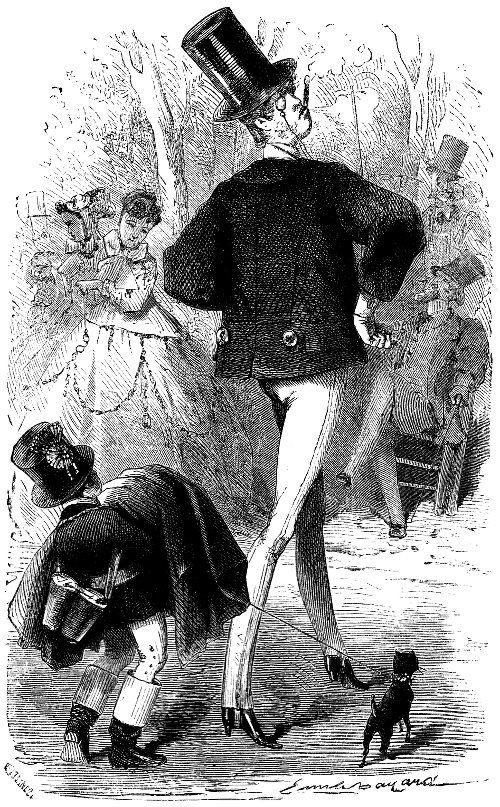
WITH HIS GLASS IN HIS EYE, AND DRESSED IN A RIDICULOUS FASHION.
You ask now if Adrienne Fallachon became a duchess after all?
No; far from it. She grew up wiser and less ambitious than her father. She has lately married a young lawyer, a cousin of her own, whom she loved. So she has not even changed her name, which is still Fallachon.
And Maurice?
Maurice has lately left college, where he has greatly distinguished himself. As a young man, he is still as kind, gentle, and brave, as he used to be when a boy; and is as generally loved as his cousin Eusèbe is disliked. His talent and his inclination both seem to point to a literary career, as the one he will take to; nor can any be more honourable or useful when the writer teaches what is true, and good, and noble. I am sure we all wish him success and happiness.
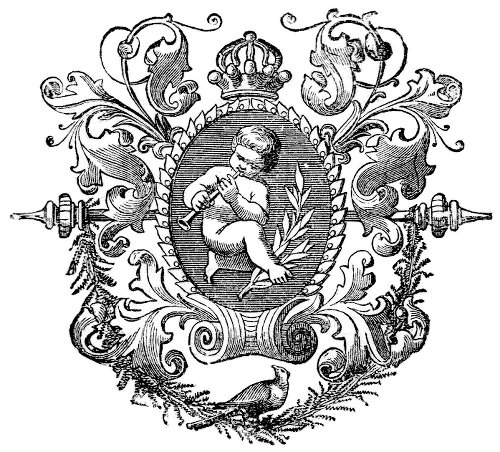


A wonderful house is Little-doll Hall,
With toys, and dollies, and sweetmeats, and all;
Up in the attic, a goodly show,
There are three lady-dolls all in a row.
Old Mother Hubbard and Old Dame Trot
Are busy a-washing the linen;
And Princess Prettypet, down below,
Sits in the garden spinning.
Behind, the maid, a very old maid,
Is carrying out the clothes:
I don’t know if there’s a blackbird near,
Prepared to snap off her nose.
And there stands the little maid by the well,
And a little doll sits on the brink:
Her name is Belinda Dorothy Ann,
And that’s a fine name, I think!
A little bird sits on the garden pale,
And his voice is clear and good,—
He’s one of the robins who covered up,
With leaves of the berries on which they did sup,
The children in the wood.
Jack Sprat lives there also, and Hop-o’-my-Thumb,
And Jack the Giant-Killer;
And Humpty-Dumpty, and Puss in Boots,
Likewise the Jolly Miller.
And the nice little man who had a small gun,
Whose bullets were made of lead,
He used to live there, but is not there now,
Because, poor fellow, he’s dead.
All these might you see, as plain as could be,
And many a fairy wight;
But this cannot be, because—don’t you see?—
They’re every one out of sight.
And all that you find there, children and mother,
Have been in some fairy tale or other;
And therefore the good little children all
Are fond of going to Little-doll Hall;
And if you’re a good child, I and you
On some fine day will go there too.
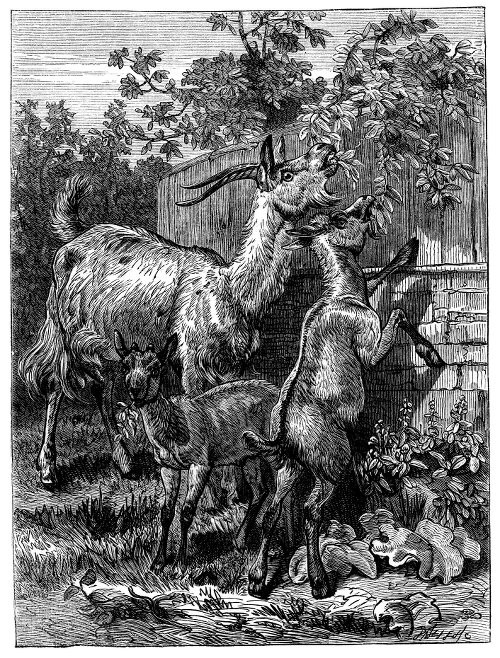

This, you see, is a picture of goats, enjoying a feast of nice fresh young leaves from that tree which hangs over the paling. How greedily the little kid there, standing on his hind legs, reaches up to eat, while the other little fellow stands with pricked-up ears and wide-open eyes, holding a sprig of some tree in his mouth. He has heard a noise, and is on the watch, fearful lest some enemy should come, and ready to spring away in a moment.
This picture just represents a family of common European goats. They are fleet, active creatures. In their wild state they delight in climbing rocks, and bounding about at the edge of precipices, as sure-footed as the chamois. Even our tame goats here at home are so fond of climbing that they always get on to some high place, even on to the tops of houses or outbuildings, when they have a chance.
You know, children, how tame and gentle these creatures can be made, for I am sure there is scarcely one of the readers of “Wide-Awake” but has ridden in a goat-chaise at some time of his or her life; yes, and has sat up in state, and held the reins, and driven the poor little willing goat too. But I trust that the little hands have been merciful the while, and that the poor goat’s mouth has not been jerked and dragged till every tooth in its head ached. And how about the whips? Goats’ skins are not very sensitive perhaps, but I am terribly afraid that some little children whip their goats till they must smart again. Now if your consciences accuse you—and I address myself to any of my little readers—make up your minds never to be 276 cruel to goats, or any other living creature, again. Few things are more horrid to me than a cruel child.
When I was in India I had a number of goats: they were kept to give milk. I grew quite fond of them, and they knew me so well that they would come trotting after me, baaing at me for bread or sugar, whenever I walked out in the compound. There was only one disagreeable quality about my goats: they were not sweet-smelling, and on that account were not very pleasant pets.
I have been told that at the Cape of Good Hope large flocks of these animals are kept, and they are very sagacious, requiring no goat-herd to look after them. In this respect they are very different from sheep: they start off in an orderly flock of their own accord to find their food in the morning, and they return in the same orderly fashion in the evening.
Goats are almost the only animals that will face fire. On some occasions when stables have caught fire, they have been known to save the lives of horses by setting them a good example, and boldly leading the way through smoke and flame out of the burning stables.
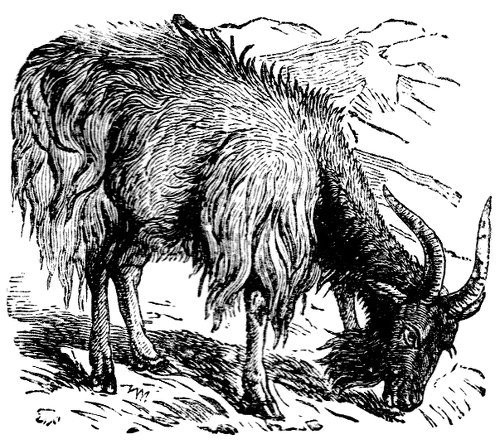
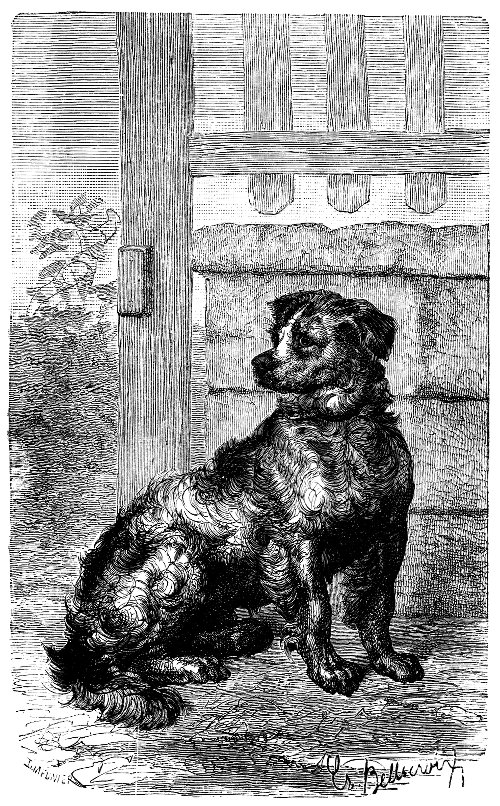
The next of her pets that Aunt Totty told us about was a dog called “Tiger.” This was what she told us.
“Tiger,” said Aunt Totty, “flourished about 278 the same time as Moko, the monkey I described to you the other day. He was a very big dog, something between a Newfoundland and a Mount St. Bernard. He belonged to my old nurse and foster-mother, who lived on a little farm not very far from Marseilles. Her husband, who was now a farmer, had once been a soldier, and was a brave and worthy man.
“Once, after I had had the measles, I was sent for change of air to stay a week or two with my old nurse. The chateau, where we then lived, was not many leagues away; still for some reason the change of air was considered necessary for my complete cure. How I enjoyed the visit I can scarcely tell you. I had everything entirely my own way, and of course had a holiday from all lessons. From the moment I entered the house, Tiger adopted me as his playfellow and friend. I loved him dearly, and had a great respect for him at the same time, for never was dog at once so gentle and so terrible. He would jump upon me to caress me, and knock me down flat under the weight of his great paws, while I in turn used to sit upon his back, roll on the top of him when he was resting, and unmercifully pull his ears and his tail.
“He was mine to do as I liked with, for my nurse would deny me nothing, and I chose to adopt Tiger for my own. Everyone loved the brave big dog who knew him: but now I must come to the point of my story.
“One evening, at twilight, I was out playing with my little foster-brother a short distance from the cottage, on the outskirts of a large wood. We were sitting on a bank talking, and he was telling me of a ghost which, he said, had been frightening everybody in the neighbourhood of late.
“‘Ah,’ cried little Pierrette, shuddering, ‘this frightful ghost makes the grown-up people run away: what should we do if we saw it now?’
“‘Nonsense,’ I answered, ‘a boy ought never to be frightened——.’ I got so far when, to my horror, I saw, 279 coming out of the dark wood, a tall white figure, which came walking slowly towards us. As it approached slowly, slowly, a cold shiver ran down my back, my eyes seemed starting from my head, and shrieking out, ‘The ghost, the ghost!’ I ran back towards the cottage. Pierrette—in consequence perhaps of what I had just said—stood his ground boldly; at least for the moment.
“For my part I thought of nothing but myself, and rushed screaming into the house. Pierrette’s father, Pierre, ran to the door, hearing my cries, and could himself see the terrible ghost at a distance. He at once took down an old gun from above the chimney-piece—one which, I believe, had figured in Napoleon’s campaigns—and hastily loading it with deer-shot, marched out in the direction of the phantom. Walking a few steps, he called out in a voice which he strove in vain to make firm,—
“‘Who goes there?’
“The ghost made no answer, but waved his arms about in the air.
“‘Who goes there?’ again cried Pierre. ‘If you do not answer, I shall fire.’
“Again the ghost only waved his long arms—arms which appeared to me to reach the sky. Pierre put the gun to his shoulder, he pulled the trigger, but it did not go off; it was old and out of order. Then a shout of diabolical laughter broke the quiet night, echoing all around. And I regret to say my nurse’s husband fled—positively fled; caught his foot against a stone, tumbled on his nose, picked himself up again, and ran into the cottage—though I must do him the justice to say that he caught me by the hand, and dragged me in along with him.
“Once safe inside, we both thought of Pierrette,—where was he? And I told how he had stood still when I ran away. Then a happy thought occurred to me: I called Tiger from his kennel; and as, on looking out, we could no longer see the ghost, we all—father, mother, I, and Tiger—went out to look about for the boy.

“After searching a little while in vain, we returned to the cottage, where, at the door, we found Tiger and Pierrette lying down together waiting for our return—the little boy having fallen asleep with his head comfortably resting on the dog’s body, just as you see them in the picture.
“The next evening, as soon as it began to grow dark, we watched for the ghost, and saw it appear again almost at the same hour in the same place. But this time the brave Tiger was let loose upon him at once.
“The phantom had only advanced a little way from the wood, and was beginning to wave his long arms, when Tiger, without the least hesitation, sprang upon him, howling with rage. The ghost showed no fight at all, but at once turned and fled. In running, he got his feet entangled in the sheets which he was wrapped up in, and 281 fell to the ground. Tiger was upon him in an instant, and the ghost cried for mercy.
“Pierre and some other peasants came to the rescue, when they found that they had been so frightened only by one of themselves—a drunken, idle fellow, who, rather than work, played this trick. And why? Well, partly for fun, no doubt, but also in order to steal his neighbours’ fowls and vegetables; for he thought that no one would venture to come out at night to interfere with the ghost.
“The fame of Tiger’s exploit was so great, that he was soon afterwards purchased at a high price by the owner of some flocks of sheep, which pastured in the mountains; and who said very reasonably:—‘The dog who dare attack a ghost will never be afraid of wolves.’”
When I go walking along, long, long,
I always keep singing a song, song, song.
It shortens the way,
By night or by day,
If you keep singing a song, song, song.
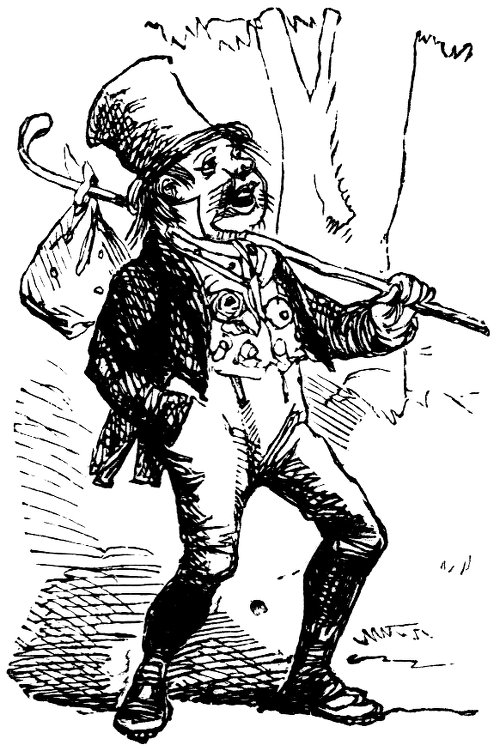

Little Peter Pryor must needs pry into everything. Here you see him in the kitchen, taking a look into the saucepan to see what there is for dinner. Cookey looks very kind, and not at all angry. But Peter’s mamma just comes in and says: “Now, Peter, I will not have you 283 prying; you have no business here; go out of the kitchen directly.”
Peter drops the lid of the saucepan, scalds his fingers, slips from the stool, and scrapes his chin. I am afraid nothing will cure Peter of prying, except some really bad hurt.
One day this silly little boy got into the fireplace, (luckily there was no fire,) and began climbing up the chimney to see where the soot came from. A quantity fell on him, and he soon came back—not a bit frightened, only laughing,—and said to his Nurse,—
“Look’ee, Nana, Peter hab turned into back boy!”
He thought it great fun, but Nurse did not.
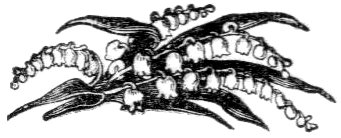
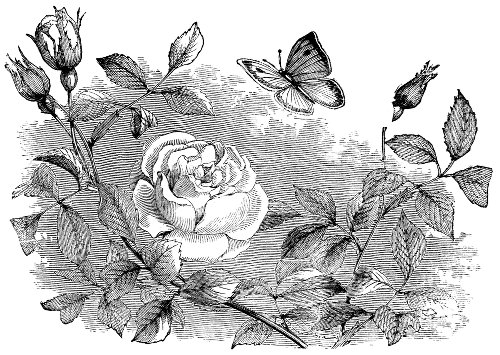
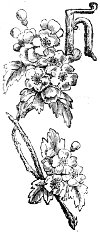
How stilly, yet how sweetly,
The little while they bloom,
They teach us quiet trustfulness,
Allure our hearts from selfishness,
And smile away our gloom:
So do they prove that heavenly love
Doth every path illume.
How stilly, yet how sadly,
When summer fleeteth by,
And their sweet work of life is done,
They fall and wither, one by one,
And undistinguished lie:
So warning all that pride must fall,
And fairest forms must die.
How stilly, yet how surely,
They all will come again
In life and glory multiplied,
To bless the ground wherein they died,
And long have darkly lain:
So we may know, e’en here below,
Death has no lasting reign.
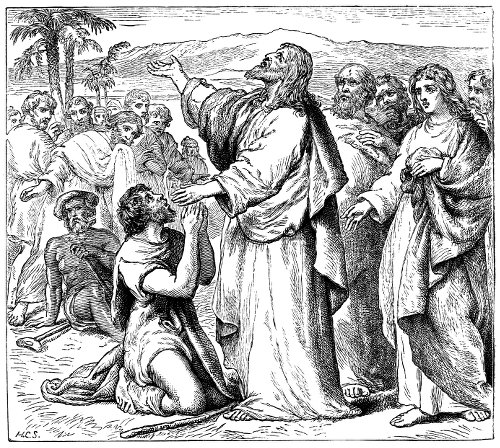
Among the miracles which our Lord next performed was that of giving speech and hearing to a deaf and dumb man. This man was brought by his friends, who placed him before the Saviour, with the earnest request that He would put His hand on him. St. Mark thus describes the miracle:—
“And they brought unto Him one that was deaf, and had an impediment in his speech; and they besought Him to put His hand upon him. And He took him aside from the multitude, and put His fingers into his ears, and He spat, and touched his tongue. And looking up to heaven, He sighed, and saith unto him, ‘Ephphatha,’ that is, ‘Be opened.’ And straightway his ears were opened, and the string of his tongue was loosed, and he spake plain.”
We cannot always determine the reasons that influenced the actions of our Lord; nor indeed is it necessary we should. We cannot doubt, judging by other miracles, but He could have cured the man by a word, or the mere exercise of His will; yet on this occasion He chose to touch the man’s eyes and his tongue, and to sigh a mental prayer to His Father.
His reasons for taking the man aside from the multitude we can more easily surmise. It may have been as a lesson to His disciples, to teach them that they should not make a vain display of their works of mercy; or it may have been that, not wishing to excite still further at the moment the enmity of the Pharisees, He desired that the fame of His miracles should not be further spread. But whatever our Saviour’s motive in taking the man aside, it is evident that the multitude crowded about Him, and beheld the miracle; for St. Mark goes on to say:—
“And He charged them that they should tell no man; but the more He charged them, so much the more a great deal they published it; and were beyond measure astonished, saying, ‘He hath done all things well: He maketh the deaf to hear, and the dumb to speak.’”
The Scripture tells us that, after Jesus had performed this miracle, great multitudes came unto Him, bringing with them those that were lame, blind, dumb, or maimed. These poor suffering creatures were cast down at Jesus’ feet, and He healed them. “And the people wondered when they saw the dumb to speak, the maimed to be 287 whole, the lame to walk, and the blind to see; and they glorified the God of Israel.”
Christ performed a great many more miracles, my children, than I shall be able to tell you about, and you must read of them for yourselves in the Bible when you grow a little older. Most of our Saviour’s miracles were, as I have before told you, miracles of healing, and works of mercy; but, on one occasion about this time, He performed a miracle to pay what was called the tribute money.
This tribute was a tax levied for the support of the temple at Jerusalem. It consisted in the annual payment of a coin called a dedrachma—two drachmas—by every person over twenty years of age. It was devoted chiefly to the purchase of such things as were used for the sacrifices in the Jewish sanctuary. This tax was sometimes called “The ransom money, or atonement for the soul,” and was paid equally by rich and poor, to show that the souls of all were considered to be equal in the sight of God. It was an acknowledgment that all were sinners, and all alike needed to be ransomed.
We are told by St. Matthew that when Jesus and His disciples came to Capernaum, “They that received tribute money, came to Peter, and said, Doth not your master pay tribute?”
Peter, who had heard our Lord teach His followers to give to all their dues, answered promptly to the inquiry, “Yes,” and then went into the house where Jesus was. Our Saviour, although not present at the conversation with the collector of tribute, knew perfectly well what had taken place, and He anticipated what Peter was about to tell Him by saying,—
“What thinkest thou, Simon? of whom do the kings of the earth take custom or tribute? of their own children or of strangers?”
Peter, you must know, was sometimes addressed by his first name of Simon. Now Christ, in putting this question to him, meant to ask whether He, as the Son of God, to 288 whom the temple was dedicated, ought to pay tribute for its support, as kings do not tax their children. Nevertheless, He added words signifying that lest the Pharisees should charge Him with despising the temple and its services, the tribute should be paid. And He went on: “Go thou to the sea, and cast an hook, and take up the fish that first cometh up; and when thou hast opened his mouth, thou shalt find a piece of money: that take, and give unto them for me and thee.”
Peter obeyed. He went and caught the fish, found in its mouth a shekel—equal to four drachmas—and with it paid the tribute.
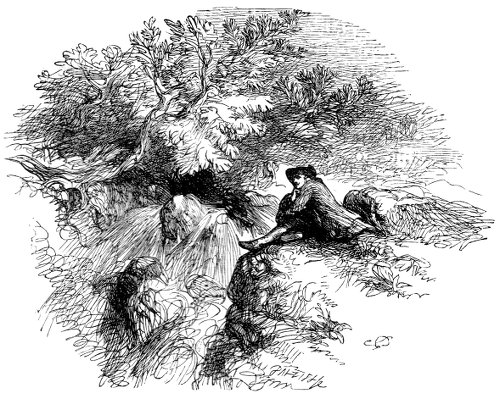
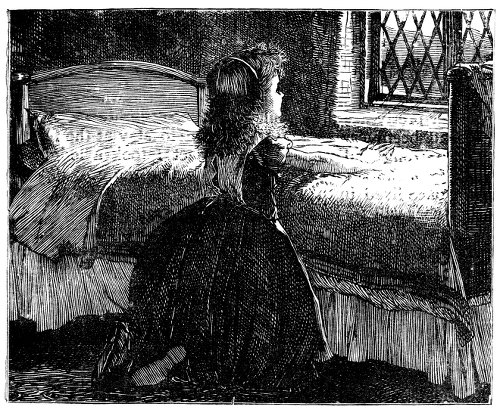

The little friend that you see in the picture is a little girl that I knew long ago. As you can judge from the picture, her father and mother were not what we call gentlefolk. But simple country people as Margaret’s parents were, they had as warm hearts—yes, and as good manners too—as you would meet with anywhere.
Margaret’s father was just an honest English farmer, and her mother a worthy active farmer’s wife, while little Margaret 290 herself was the perfection of a merry country girl. She was up early to help her mother in the morning. She would rise at cock-crow, wash and dress herself, make her own bed, and then kneel down, as we see her in the picture, and say her prayers. And if it was summer, the sun, in rising would cast his slanting rays in at the window, and gild her pretty head the while with his soft light.
I had been very ill, and went down to stay at the farm to get strong and well again. In fact I took a lodging there for a short time. But I already knew the people, for I had once lived in the neighbourhood. It was the month of October when I went down, after having been long confined to my sick room in London; and I can remember now how beautiful the woods looked, as I drove from the station up the hill to the farm-house. The leaves of the oak were already mellowing into bronze; the beeches were changing to a deep orange; and here and there the pale yellow of the chestnut showed in relief against the dark green of the unchanging fir. The whole landscape glowed in the warm lights and shadows of autumn colouring.
The old farm-house was perfect in point of cleanliness and comfort. I soon regained my health and strength, and was beginning to think of returning home again, when the sad event happened which I am going to tell you of.
Little Margaret used to wander in and out, and round about, near her father’s farm, just as she pleased. She was known and loved by everyone, great and small; by the young children particularly, who would run out of their cottages as she passed to see and speak to her. One evening she was returning home across a plot of open ground near the farm, when she saw, drawn up out of the road, one of those houses on wheels which gipsies travel about in. A woman stood outside with a little brown baby in her arms; and Margaret could not pass without saying a word to the baby.
“But it doesn’t look well,” said Margaret to the mother.
“No, missie, nor ’tain’t well neither,” replied the woman; “and I have one inside a deal worser. I don’t know what ails ’em. Would yer like to step inside and see the child?”
Margaret ran up the steps without a moment’s hesitation, and found a poor sick boy about seven years old stretched upon a hard mattress, tossing from side to side in what was evidently a bad fever. The good-hearted child said to the woman,—“I am sure your little boy is very ill; I will run home and ask mother what you had better do for him.”
She hurried home full of the subject, and I was sitting in the garden when she came running in. I asked the reason of her haste, when she told me of the sick children. From her description, the idea at once occurred to me that they were sick with scarlet fever; and the parish doctor, whom we asked to go to see them, afterwards confirmed my opinion.
Those children, however, struggled through the terrible illness; but, alas! our little Margaret—I say our because a strong love had grown up in my heart for the good and pretty child—sickened with the fever, which she had caught during those few minutes spent in the fever-stricken cart. Days of wearing anxiety and nights of watching followed. It was heart-breaking to see the little head rolling from side to side upon the pillow, while the pretty eyes looked with unmeaning gaze upon us all: the voice too, that we had so loved to hear, sounded strange as it talked in the wild delirium of fever.
After a time the fever abated, and the child became more tranquil, though weaker. One day some sad words fell from the little parched lips: “Mother dear,” she said, “set me up a little; I want to see out of the window, and say good-bye to everything.”
The poor mother raised her up, and Margaret could see the soft evening sky, and the outside world just melting into twilight under the warm smile of the setting sun.
“Is it, as they say, mother, more beautiful there?” she whispered, pointing to the sky.
“Where, darling?” asked her mother.
“In heaven,” said the child, “which I shall see so soon.”
“Not soon! Oh, my darling, not soon! don’t say it!” cried the poor farmer’s wife.
“Yes, very soon. Don’t cry, mother dear.”
And Margaret was right. Only a few days more, and the setting sun shed its warm light upon her grave.
This is a very, very sad story; and perhaps has brought tears into the eyes of some of my dear little readers. I hardly know why I have told it, except that my stories would not be like reality, if they were always happy. The world has shadows as well as sunshine.
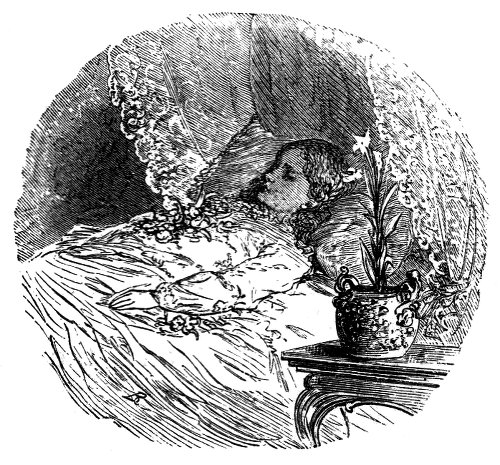

Now here are six objects for you to find out. One begins with B, one with C, one with D, one with F, one with G, and one with J. My little boy found them all out in less than five minutes.

1.
Overhead on the boughs you may see me,
I’m off in a flash if you tease;
And I swing on the green twig above you,
As it gracefully bends to the breeze.
All the sweet summer time I am playing,
And cutting up capers so queer;
’Tis the happiest season for squirrels,
The holiday time of the year.
2.
And when Autumn is dressing the wild wood
In raiment of scarlet and brown;
When Jack Frost comes to shake all the treetops,
Till the nuts and the acorns come down;
Then the squirrel’s rich harvest is welcome:
I gather a plentiful store.
You may know where my snug little house is,
By nuts that you see at my door.
3.
All the winter, secure from the weather,
I live in my streets underground,
So concealed you can’t see my snug dwelling,
Where I sleep from the cold safe and sound.
Don’t you think I am clever and skilful,
And all my contrivances good;
Don’t you think that we gay little squirrels
Are the happiest folk of the wood?
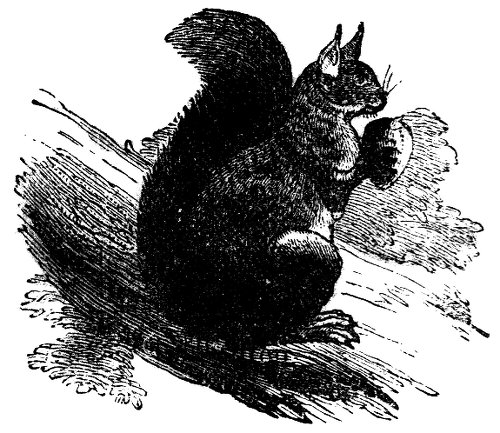


My little readers have, none of them perhaps, ever seen this bird: it is not very common in England, though found in most parts of the globe. This one we see in the picture is feeding its young with an insect, or beetle; but the Shrike is a very voracious and cruel bird. It not only eats insects, reptiles, little mice and such things, but attacks the young unfledged nestlings of smaller birds than itself, and devours them. This is why it is called by the ugly name of Butcher Bird. Fancy the horrid thing devouring the tender, weak, and helpless young of its own species! Poor little baby-birds settled comfortably in their nests, waiting for the return of papa or mamma with food, are pounced upon by these cruel creatures, carried off, torn limb from limb, and used to feed a nestful of little butcher birds!
I never saw a Shrike but once, and that was many years ago. I was driving with a relation of mine, the wife of a country clergyman, to visit a sick child, the daughter of one of the parishioners. As we drove up to the farmhouse, we met the child’s father, who was a small farmer, coming out at the door with a gun in his hand. After inquiring about the child, we naturally asked what he was going to shoot, for it was not the shooting season. He told us in reply that he had just seen a grey shrike up in an apple tree in the orchard, and he was going to have a shot at it.
“For it be a rare bird, that it be,” added he; “this be the furst as I’ve seen since I wor a boy, and loike 298 enough I mayn’t never see another, so I be a’going to shoot un.”
Although the bird is so cruel itself, I did not feel inclined to see it killed, so I wished the farmer good morning. But he did “shoot un,” I afterwards learnt; in fact, he butchered the butcher bird, and had it stuffed too, and put into a glass case. In this condition I saw it. It was a handsome bird; the general colour of it was grey, but it had a white breast, and some strong black marks upon the head, wings, and tail. Its size was about that of a pigeon.
There is another kind of Shrike, which is found in South America, and is called the Bush Shrike. This bird is rather larger, and more powerful than the European Shrike, and has a handsome tuft of feathers on its head. It is found in forests and thick brushwood, where it passes its time in a constant search for insects, reptiles, and the young of other birds, which it devours like the European Shrike. It possesses a strong and rather hooked beak, and is a formidable enemy to any creature it may attack.
But the country in which the Shrike lives on the best terms with man is New South Wales. There it is very common, and in appearance resembles the Shrike of Europe. It is called by the colonists the Piping Crow, on account of the rich and varied strain of song it pours forth in early morning and towards evening. In this gift of song it seems to differ from the European bird, or at least, if the latter possesses such a merit, it has not been observed. In New South Wales the Shrike prefers the open localities to the wooded districts, and in particular shows a preference for those parts which have been cleared by the settlers. In fact, in that country, the Piping Crow is looked upon as being a particularly trustful bird,—trustful, I mean, of man. It will build its nest in the plantations or gardens of the colonists, who, particularly in the back settlements, do all they can to encourage it for the sake of its pleasant morning and evening song.

A famished Wolf was prowling about in search of food one morning. As he passed the door of a cottage built in a forest, he heard a mother say to her child,—
“Be quiet, or I will throw you out of the window, and the Wolf shall eat you.”
The Wolf sat all day waiting at the door. In the evening he heard the same woman fondling and petting her child, and saying,—
“He’s a good boy now, and if the Wolf should come, we will kill him.”
The Wolf, hearing these words, went home, gaping with cold and hunger. On his reaching his den, Mistress Wolf inquired of him why he returned tired and supperless, so contrary to his wont. He replied, “Why, forsooth! because I believed what a woman said!”
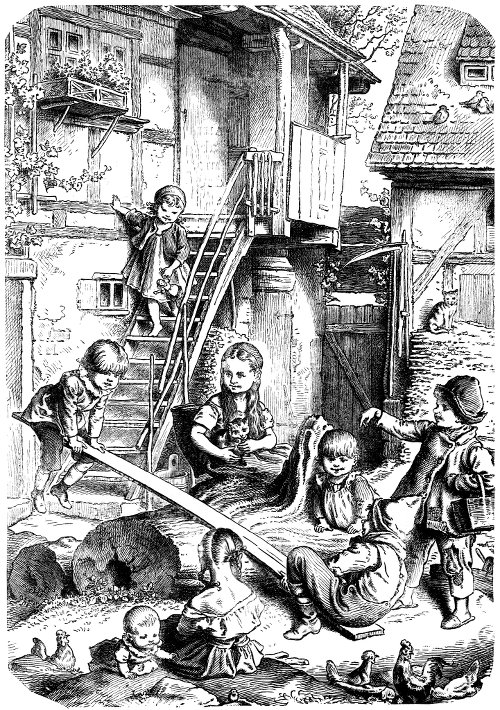
See-saw! up in the air we go,
High, high up; and down, down low.
That boy in the cap’s such a regular lump,
No wonder he comes to the ground with a bump.
The little man tossed up so high in the air
Has the best of the fun; it is really not fair.
His sisters and brothers look on with delight,
While the kitten and fowls think it quite a grand sight.
The chickens go, “Cluck, cluck!” the boys shout with glee;
And all seem to say: “Who so happy as we?”
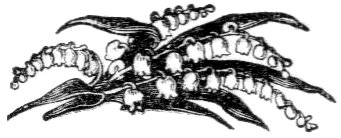
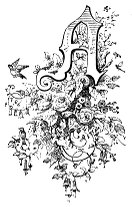
A pretty little girl is Tiny, and she is also now a very nice one, but she used to have one great fault—she was very conceited. She fancied herself the prettiest and cleverest child in the world, and when she was with other little girls of the village where she lived, she was in the habit of telling them very plainly what she thought of herself; which, you may imagine, was not the way to make them like her. One day she had a lesson, however, which, I am glad to say, quite cured her; and I am going to tell you how the happy change was brought about.
That little girl you see in the picture, standing on the other side of the brook, is Tiny. This brook is in a little wood close to her mother’s cottage, and she has just been looking at the reflection of her own pretty face in the water, and thinking how much prettier it is than any other faces she ever sees. While she is occupied in this way, she hears somebody laugh, and looking up, sees a beautiful lady and an ugly little dwarf standing on the other side of the brook. The lady has bright wings upon her shoulders, and both she and the dwarf are laughing at poor little Tiny.
Tiny does not quite like being laughed at, but has no doubt they are admiring her all the same. She is very much astonished, though; when she hears the lady say:—

“Well, Tiny, I suppose you think yourself quite perfect. You are a vain little creature; and if you remain through life the same, nobody will love you, and you will never be happy: I will help you to become wiser. I am going to give you a pair of wings, with which you will be able to fly about, and see and hear a great deal which will serve as a useful lesson to you. The wings will only last till sunset, but you will have time to find out that there is vanity in others as well as yourself, and to judge how silly it is.”
After saying this, the fairy with her attendant dwarf disappear. But Tiny feels a strange pricking at her shoulders, and presently finds herself raised up from the ground by a pair of wings, which have grown out suddenly. She was always small for her age; and that is the reason she is called Tiny; but now she discovers that she has become no bigger than a little bird.
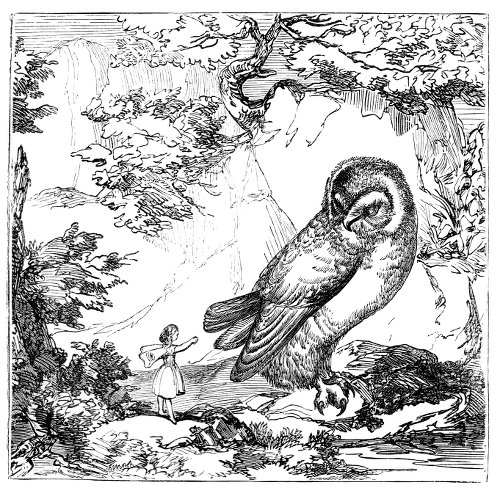
After flying a little way, she settles down among some pretty wild flowers, and finds herself close to a large owl. “What are you?” he says, for he cannot see well in the daylight. “Please, sir, I’m a little girl, only a good fairy has given me wings, that I may see the world, and grow wiser.” “Ha, ha, ha!” laughs the owl, “see the world indeed! Why, I’ve lived in the same barn all my life, and I’m the wisest bird there is; everybody knows that.”
“What a conceited, stupid old thing!” says Tiny to herself as she flies away.
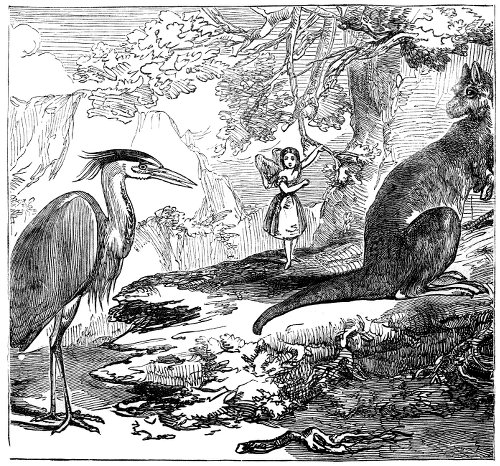
Presently she sees a stork and a kangaroo, who appear to be at high words. “What an enormous tail you’ve got!” says the stork to the kangaroo; “and are those little bits of things your forelegs? Why, you are perfectly ridiculous.” The kangaroo replies: “Silly bird! my form is perfect, and my beautiful tail is a wonder in itself, for it helps me to take my immense leaps. Go away to your swamp, and hide your own long sticks of legs, do.”
“That’s pretty well on both sides,” thinks Tiny; “each considers himself the most beautiful animal in the world.”

“Croak! croak!” cries a frog, squatting on the bank of a stream; and the sound attracts Tiny. At the same moment, a fish, popping his nose out of the water, exclaims, “Stop that horrid noise! I can’t get my little ones to sleep.” “Don’t bother me about your little ones,” says the frog; “and why don’t you come out of the water if you’ve anything to say? But you’ve no legs: you’ve nothing to stand upon: you are an imperfect creature.” The fish rejoins, “As for you, you only hop; and when you are in the water, why don’t you swim gracefully, like me?”

Next Tiny alights on a terrace in a garden, where she sees a pretty white cat. Tiny calls, “Puss, puss!” when immediately out pops from among some cabbages a pert young hare. “Did you call?” he inquires. “You!” says the cat contemptuously, “are you Puss?” “Yes, indeed, I am called Puss by a great many people.” “Why, where is your tail, if you are a cat?” “Tail! pooh! what does a tail matter? Look at my fine long ears!”
“Just like the others,” thinks Tiny, as she flies away; “always quarrelling; and always praising themselves.”
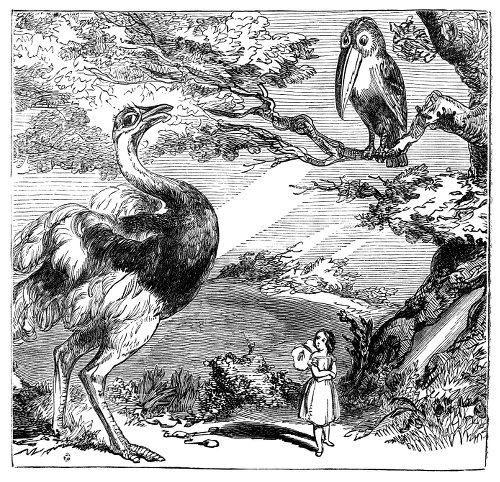
Here we have an ostrich and a toucan. I think Tiny must have flown a long way to meet with these strange birds: but she finds that they are quarrelling like all the rest. The toucan is mocking the ostrich, because, with all its feathers, it cannot fly; and the ostrich laughs at the toucan for its enormous beak.
“I wish they wouldn’t all find fault with each other so much,” Tiny begins to think; “I am sure the ostrich is very beautiful, and I daresay the toucan has some good qualities, though his nose is rather ridiculous.”
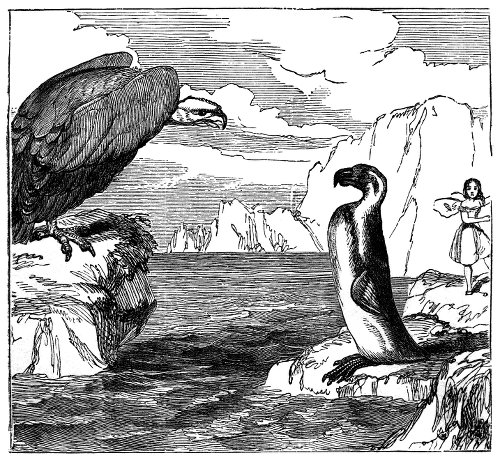
Then Tiny must have flown to a colder country, for here are a penguin and an eagle. “A nice cool breeze here!” says the penguin to Tiny, as he flaps his little wings, which look like leather. “Don’t waste your time in such company, little girl,” says the eagle; “that half-bird, half-fish is a disgrace to the family of birds, of which I am king.” “I may be humble and ugly,” rejoins the penguin, “but he is a bird of prey, without kindness or pity.”
The eagle looks so fierce at this retort that Tiny thinks it wise to fly away.
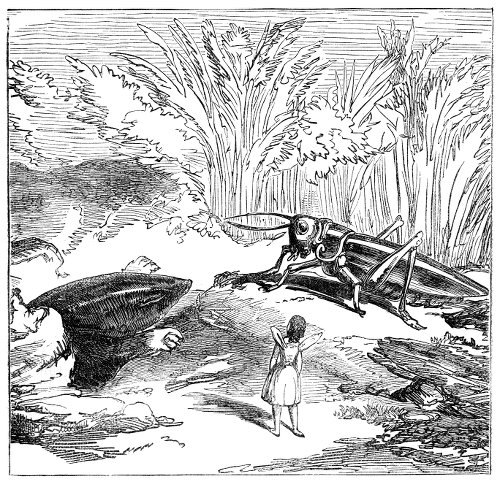
Tiny remembers now that the fairy had said her wings would last only till sunset, so she thinks it is time to fly towards home; for the sun is getting low already. You see, they are fairy wings, so she can fly just as fast as she pleases; and in a few minutes she alights in the wood, near the spot she had started from.
The first thing she sees, close to her in the long grass, is a handsome grasshopper. “How d’ye do, dear?” chirps he. “I am very glad to see you, for I am bored to death 311 with the conversation of this stupid mole.” As he speaks, he points out to Tiny the mole’s nose just peeping out of a molehill. “You see,” he continues, “instead of being like me, instead of having bright sparkling eyes, and wearing a splendid green coat, all over gold, he is a very poor creature, with scarcely any eyes at all; and he spends his time almost always under ground, so of course he knows nothing, and is very dull company.” “What good do you do, with your green coat and gilding?” replies the mole. “You do nothing but chirp, while I devour the vermin that would eat up the roots of the corn. So that, although buried, I am useful to others.”
“Certainly the mole has the best of the argument there,” thinks Tiny. At that moment the sun goes down: Tiny’s wings drop off on to the ground, and at once shrivel up and disappear; she recovers, too, her natural size. Then she sees her mother’s cottage through the trees, and a candle just lighted is burning in the window.
As she walks towards it, she talks to herself as if she were somebody else. “Now, Miss Tiny,” she begins, and she touches her own breast with the point of her finger as she speaks,—“now, Miss Tiny, let us think a little. The good fairy told you you should learn a lesson and grow wise. Let us see what you have learnt. All these creatures are more or less conceited, and, just because they are so, they are always quarrelling; and how disagreeable and ridiculous they make themselves, to be sure! I wonder if Miss Tiny is as disagreeable and absurd as they are? If she is, she won’t be so any more. From this day, she will always try to see whatever there is that’s good and nice and pretty in everybody else, and make the most of it.”
Tiny keeps to her resolution; the consequence is, that everybody loves her, and she is happier than ever she has been before.

There was an old woman called Nothing-at-all,
Who lived in a dwelling exceedingly small;
A man stretched his mouth to its utmost extent,
And down at one gulp house and old woman went.
The man he was troubled with terrible pain,
And wished the old woman and house up again;
He groaned and he yelled, but could get no relief,
And he died of his gluttony, ’tis my belief.
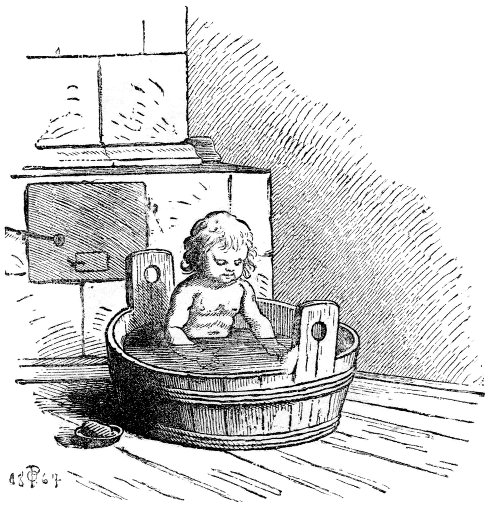

“Unpleasant!” says the Sponge, “very unpleasant to be squeezed like this.”
“Nonsense, you stupid thing,” says the water; “what are you made for I should like to know, if not to be squeezed. You are not nice soft, lukewarm water like me.”
“Don’t talk so much, but mind your own business, and think how I go on rubbing,” says the soapy Flannel; “rub, rub! if I didn’t rub so hard we should never make a clean little girl.”
“I am glad to say that this little ear is quite clean now,” says the Towel, slyly; “now we have only the other one to do. I have rubbed the little pink cheeks till they glow again.”
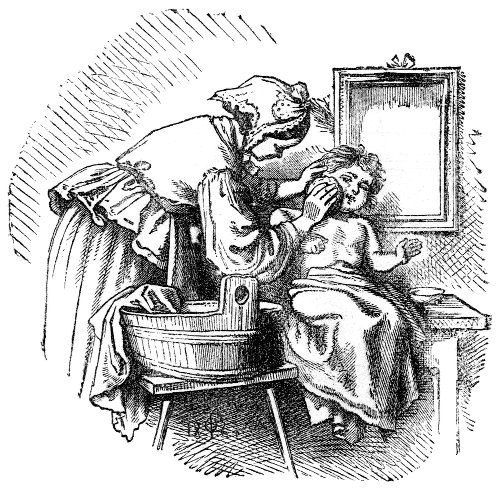
“First this little right shoulder, and then the left,” says the little clean shirt. “How white and dimpled they are! it is quite a pleasure to touch them: I think they must belong to a very good child.”
“Well, we haven’t got any thinner either in the night,” exclaim the socks to the little round fat waddling legs.
“Come, come, come, little horse, and be shod!” say the shoes.
Up comes the brush, bristling finely. “Let me see what I can do here,” says he; and soon the pretty golden locks are disentangled. And comb giving his assistance, a nice parting is made, and then Brush says, “I think we have done our work very nicely.”
“Over the head without spoiling the pretty curls,” says the Petticoat. “Yes, that’s the way we do it.”
“Now I’m coming!” says the little Frock, like a person of importance for whom all the rest have been waiting. It knows quite well it is a pretty blue frock, all trimmed with 315 braid, and that the little child chose the stuff to make it; and that it is her favourite frock.
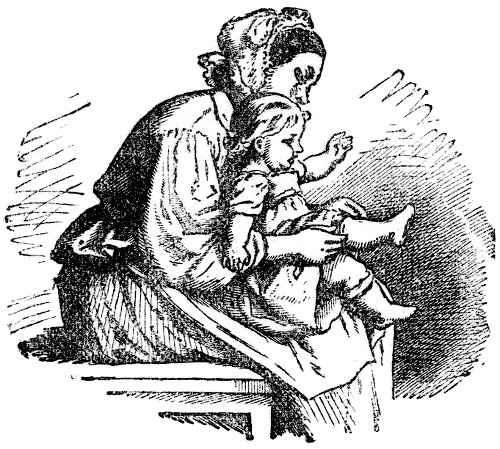
“Now, if you please, I must come, for I am quite as important, if not so gay as you,” says the pinafore; “besides, I have two little pockets.”
“I live in one,” says the Pocket-handkerchief, “and before I get into it, I should like very much to know if the little nose is quite nice and tidy.”
Mr. Pocket-handkerchief being quite satisfied, a chorus of voices shout, “All ready now!”
“Ah! but here is a tear, a stupid little tear, on my darling’s face. Never mind, I’ll kiss it off,” says Mamma, who came into the nursery at that minute.
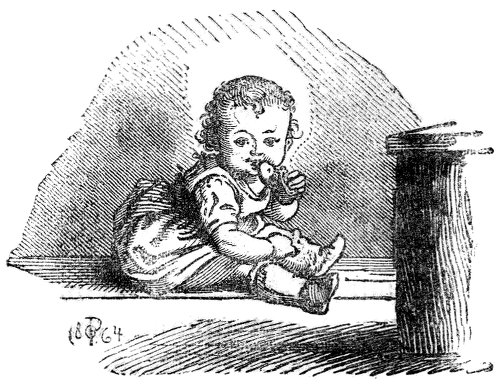
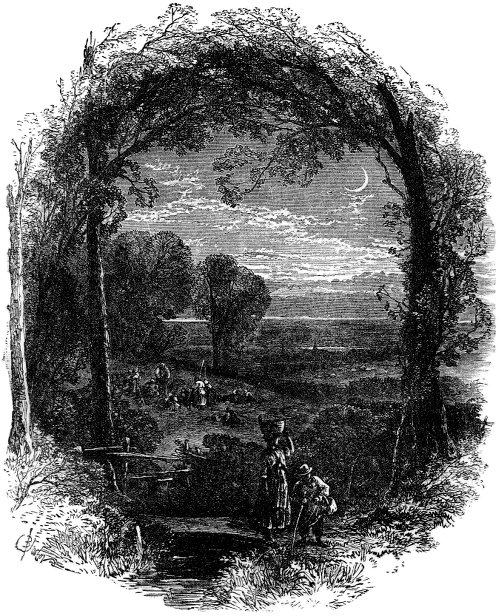
The sun has set, the sky is calm,
And yonder uplands dim,
With all the little trees, stand out
A sharp and fringe-like rim.
A roll of clouds like indigo
Hangs in the lower sky,
All edged above with crimson fire,
And piled up gloriously.
And far behind are flakes and flaws,
And streaks of purest red;
And feathery dashes, paling slow,
Still linger overhead.
And far, far off—how far it looks!—
The sky is green and clear,
And still in front a little flight
Of black clouds saileth near.
Oh! wondrous sight! oh! joyous hour!
Ye workmen passing by,
Why stay ye not your boisterous mirth
To gaze upon the sky?
Ye merry children playing near,
Why stop ye not your play,
To see how God with glory crowns
The closing of the day?
Oh! would that they whose weary minds
The things of sense enthral,
Upon whose lives but scanty rays
Of grace and beauty fall,—
Would that they knew what noble store
Of purest joy and love
Is given to bless the poor man’s lot,
And lift his heart above.
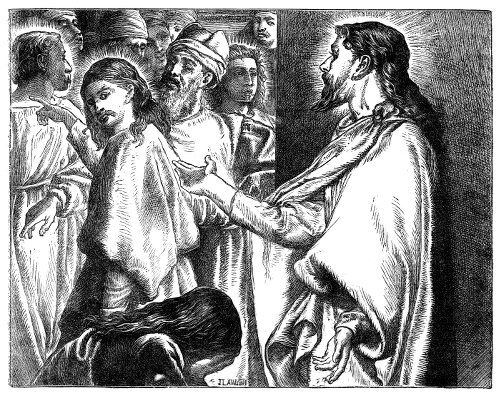

One of the most common faults—or rather, I should say, one of the most common sins—that we meet with in the world, is that of ingratitude. Some are ungrateful from pride or conceit, thinking that the kindnesses or services of others are due to them of right. But most people are ungrateful simply from thoughtlessness: yet this very thoughtlessness—the want of thought 319 for others—has its root in what is the foundation of all faults—selfishness.
Even in dumb creatures—from whom, by the way, we may often learn good lessons—we seldom see ingratitude. If you are kind and gentle to a dog or cat, a horse or bird, it will be thankful, and generally manage in its own fashion to make you understand its gratitude. My darling children, never be ungrateful! Be grateful to God first of all—be grateful to God for everything. Be grateful to your father and mother; and be grateful also to all those who show so many kindnesses to you. Never forget to thank them both with heart and lip.
I am going to tell you to-day of an instance of man’s ingratitude: not that of man to man, but of ingratitude to our Lord Jesus Christ.
We are told by St. Luke that,—“It came to pass as Jesus went to Jerusalem, He passed through the midst of Samaria and Galilee. And as He entered into a certain village, there met Him ten men that were lepers, which stood afar off; and they lifted up their voices, and said, ‘Jesus, Master, have mercy on us.’ And when He saw them, He said unto them, ‘Go, show yourselves unto the priests.’ And it came to pass that, as they went, they were cleansed.”
I must tell you that this leprosy, with which these poor people were afflicted, was a terrible disease common among the Jews at that time. It was a disease of the skin, which was hereditary, and also was caught by contagion. Hence those afflicted with it were prohibited by strict laws from associating with other people. They might not enter the walled cities at all, and in the villages they were obliged to live apart from the other inhabitants. You see these lepers “stood afar off” while they cried out to Jesus for mercy.
We must suppose that before anyone recovering from the leprosy was allowed to associate with his fellow-citizens, he had to go before the priests, that they should 320 pronounce him cured; and this explains the injunction of our Saviour—“Go, show yourselves to the priests.” The lepers had faith, and turned at once to obey. They had scarcely moved a step when the change in their condition seems to have taken place; and we may imagine their joy and surprise, on looking at each other, to see the ghastly and loathsome hue of the leprous skin change for the bloom and freshness of health. But now we come to the sad instance of ingratitude.
St. Luke goes on to tell us—still speaking of the lepers:—“And one of them, when he saw that he was healed, turned back, and with a loud voice glorified God; and fell down on his face at Jesus’ feet, giving Him thanks.”
Thus we find, out of these ten, one only showed himself grateful, and thought, before aught else, of glorifying God, and giving thanks to Jesus. The other nine, in their joy at the blessing which had just been bestowed upon them, forgot the Bestower of that blessing. They hastened on, thinking only of their own good fortune, and eager to make known their recovery to the priests, that they might be restored to communication with their fellow men.
Our Saviour only remarked upon this instance of ingratitude:—“Were there not ten cleansed? but where are the nine?”
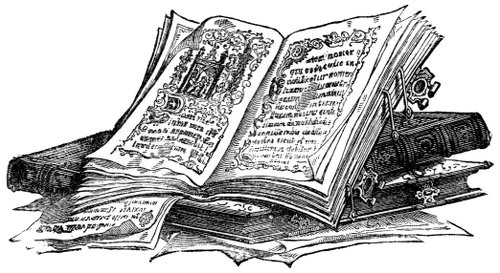
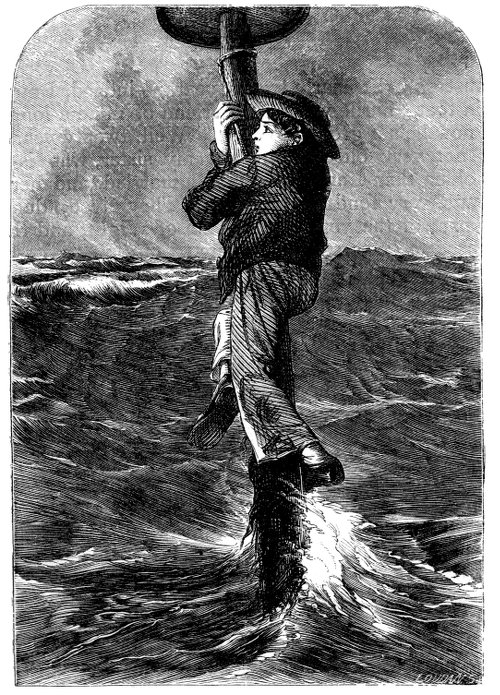

I made the acquaintance of my little friend Charlie under very unusual and startling circumstances. When I saw him for the first time he was situated as you see him in the picture. I saw a lad about thirteen years of age, clinging desperately, for very life, to the topmast of a sunken ship in the British Channel. I will tell you how it happened.
I must go back nearly twenty years;—indeed, I ought to explain that Charlie was a little friend of mine a long time ago; now he’s a grown-up man. Well, twenty years ago I was not very old myself; but my sister, who is some years older than I am, was already married, and her husband was very fond of yachting. They lived, during a great part of the year, in the Isle of Wight, and there I often used to go to stay with them.
The “Swallow”—that was the name of my brother-in-law’s yacht—was a beautiful boat, and many happy hours have I passed on board her, as she skimmed merrily over the sparkling water. I delighted to sit on deck, watching the fishing-boats as they rode bravely from wave to wave; or sometimes wondering at some large ship, as it passed by, on which men live for weeks and months without ever touching land. We used to sail long distances, and occasionally be out for several days and nights together. My brother-in-law’s skipper could tell me what country almost every vessel that we saw was bound for. Some were sailing to climates where the heat is so great that our most sultry summer in England is comparatively cold; others were off northward, perhaps whale-fishing, where they would see huge icebergs, and hear the growling of the polar bears.
We were taking our last cruise of the season: it was already near the end of October, and the weather was becoming stormy. Passing out of the Solent into the Channel, we found the sea much rougher than we expected; and as night came on it blew a regular gale. The wind and sea roared, the rain poured down in torrents, and the night seemed to me to be the darkest I had ever known. But on board the “Swallow” we had no fear; we trusted to the seamanship of our skipper and the goodness of our vessel, and went to bed with minds as free from fear as if the sea were smooth and the sky clear.
I awoke just as dawn was breaking, dressed quickly, and 323 throwing a water-proof cloak over me, popped my head up the companion-ladder to see how things looked. The old skipper was on deck; he had not turned in during the night. I wished him good-morning, and he remarked, in return, that the wind was going down, he thought. Looking at the sea, I observed two or three large fragments of wood floating near, and they attracted his notice at the same moment.
“Has there been a wreck, captain?” I asked, with a feeling of awe.
“That’s about what it is, miss,” answered the old seaman.
“Do you think the people are drowned?” I inquired anxiously.
“Well,” replied Captain Bounce, casting, as I thought, rather a contemptuous glance at me, “people don’t in general live under water, miss.”
“Perhaps they may have had boats,” I said meekly. “Do you think boats could have reached the shore in such a storm?”
“Well,” answered the old captain, “they might have had boats and they mightn’t; and the boats, supposing they had ’em, might have lived through the storm, and at the same time they mightn’t.”
This was not giving me much information, and I thought to myself that my friend the skipper did not seem so much inclined for a chat as usual; I turned to look at the sea in search of more pieces of wreck, when I discovered, in the distance, a dark speck rising out of the water. I pointed it out to the skipper at once, who took his glass out of his pocket, and, after looking through it for a moment, exclaimed,—
“There’s something floating there, and a man clinging to it, as I’m alive!”
As he spoke, my brother-in-law came on deck, and also took a look through the telescope. Then he, the captain, and every sailor on board became eager and excited; you 324 would have thought it was some dear friend of each whose life was to be saved. The yacht was headed in the direction of the object, the boat was quickly lowered, the captain himself, with four sailors, jumping into it; and, in another minute, they caught in their arms a poor little exhausted and fainting boy, as he dropped from the mast of a large sunken ship. We could now distinguish the tops of all the three masts appearing above the waves; for the sea was not deep, and the ship had settled down in an upright position.
Poor Charlie Standish was soon in the cabin of the yacht, and after swallowing some champagne he revived sufficiently to tell us his story. The sunken ship was the “Melbourne,” bound for Australia, and this was Charlie’s first voyage as a midshipman on board. During the darkness of the night she had been run into by a large homeward-bound merchantman of the same class. She sank within an hour of the collision. In the scramble for the boats Charlie thought he had but little chance for finding a place; and as the ship filled, and kept sinking deeper in the water, an instinct of self-preservation led him to climb into the rigging. Then up he went, higher and higher, even to the topmast; and at last, when the vessel went down all at once, he found himself, to his inexpressible relief, still above the surface.
What most astonished us all was that a boy so young should have been able to hold on for more than an hour to a slippery mast, exposed to the fury of the wind, and within reach, even, of the lashing waves. We sailed home at once to the Isle of Wight, and wrote to the boy’s mother, a widow living in London, to tell her of his safety. The boy himself stayed with us two or three days. My brother-in-law took a great fancy to him; he has watched his career, and seen him at intervals, ever since. Charlie Standish is now a chief mate on board a great merchantman of the same class as the “Melbourne.”

Now find out this puzzle page, children. Two of these objects begin with C, one with M, one with O, one with P, and one with S. Try if you can find out what they all are.

Andantino.
1.
Good-bye, daisy pink, and rose, and snow-white lily too;
Every pretty flower that blows, here’s a kiss for you.
Good-bye, merry bird and bee, and take this tiny song....
For the ones you sang to me all the summer long.
2.
Good-bye, mossy little rill, that shivers in the cold;
Leaves, that fall on vale and hill, cover you with gold.
Good-bye, pretty birds that roam, and rills, and flowers, and trees;
But when winter’s gone, come home; come whene’er you please.

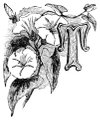
The Lion is called the king of beasts, because he is the most courageous, the strongest, and the grandest-looking of all beasts. The picture represents a great lion and his family; you see he has just caught a poor little gazelle, of which herds are found in the plains of Africa. And that, as I daresay you know, is also the country of the lions.
Lions belong to what is called the cat tribe of animals, as do also tigers and leopards. The members of this tribe are remarkable for their powerful jaw, large fangs, the quickness and grace of their movements, and for the manner in which the sharp hooked claws of the feet are drawn back when not in use, and thrust forward when needed for action.
The colour of the lion is a tawny yellow, lighter on the under parts of the body, and darker above. The ears are almost black, and there is a tuft of black hair at the tip of the tail. When full-grown, the male lion has a thick, shaggy mane of long hair, which falls from the neck and shoulders, covering the throat and breast. He measures some four feet in height at the shoulder, and about eleven feet in length, including the tail. These measurements, however, are only applicable to the animals which have lived in freedom in their native land, with their limbs unshackled, and spirits unbroken.
The lioness is a smaller animal than her mate, the difference in size appearing greater than it really is, because she is without the shaggy mane, which makes the lion seem so grand and imposing. But though smaller, she is quite as terrible as the lion; and if she has cubs to 330 look after and protect, she is a fearful enemy to any who cross her path.
I think it would amuse you to hear an anecdote of a revengeful lioness, which I lately read. The gentleman, who relates the story, was out with a party of hunters in Southern Africa, in search of elephants. They had not had much sport, and as they were going to encamp for a day, this gentleman thought he would ride off alone to a patch of jungle or wood not far away, which appeared likely to harbour wild beasts. He discovered no sign of elephants, but he found a new footprint made by a lion. Now he had never shot a lion, and had a great ambition to do so; accordingly, he followed the lion’s track, which of course was very brave of him, but, I must say, I think, very rash. After a little while he came suddenly upon the savage beast, and luckily shot him dead at the first shot.
Having achieved this exploit, he was anxious to carry back the skin with him as a trophy; and therefore set to work to skin the dead beast, which, it seems to me, must have been a most horrible business. This operation took a long time, and when accomplished, our friend the hunter found great difficulty in persuading his horse to carry the skin. Horses have a great horror of lions, and the poor animal probably did not feel sure that the skin alone could do him no harm.
At last all was satisfactorily arranged, and the hunter started to return to the encampment; but so much time had been lost, that before he had gone far, night began to close in, and he thought it best to bivouac where he was till daylight. There was a stream of water close by; and he had with him a blanket, a flask of brandy, and a box of matches. He took the precaution also, before it was quite dark, to shoot a guinea-fowl for his supper. Then, collecting a quantity of dry wood, he piled it up in a circle, leaving space enough inside for himself, his horse, and the skin. Setting fire to the wood, he considered himself safe from any attack of wild beasts within this magic circle of 331 fire, and made himself comfortable for the night. He cooked and ate his supper, and then, lying down by the side of his horse, soon began to doze.
Presently he was disturbed by a loud snort from his horse. He rose up, and kicking the burning wood together with the heel of his boot, made a brighter blaze, and distinctly saw the head of an old lioness looking through the surrounding bushes. She was gone in an instant, but you may be sure the hunter did not go to sleep again. He suspected at once that she was the widow of the lion he had killed, and that she had followed the scent of his skin to be revenged upon his murderer.
Our hunter made his fire burn as brightly as he could, and remained upon the watch for the lioness. He thought he could see her again among the bushes, and seizing a piece of burning wood, threw it at her; then he detected her slinking away into the darkness. He did not fire, for he saw too imperfectly to be sure of his aim. Not long afterwards he suddenly heard a terrific roar, and at the same moment some large body flew through the air close to him. Then followed a crash, and the hunter saw his poor horse knocked down, as if shot, beneath the weight of the lioness, who stood on him, tearing at him and growling. The hunter fired: the first shot wounded her, the second killed; but she had so far revenged the lion’s death that she had killed the horse.
The hunter now had her skin as well as the lion’s, which must have been a satisfaction to him. He set to work to skin her at once, and then buried both skins in the ground that they might not be eaten or damaged by prowling animals, while he trudged back on foot to the encampment. In the afternoon he returned in a waggon, and fetched away both skins, which he kept as trophies.
My own experience of a lioness is of a very different sort to this, as my acquaintance with either lions or lionesses has been made only at the Zoological gardens. But I remember a few years ago there was a dear old lioness 332 there, who had five little cubs; and I can only say her kindness and tenderness to her young ones would have afforded a good example to many mothers.
I will tell you another anecdote about a lion. It is related of a lion of the Zoological gardens, who died there of inflammation of the lungs many years ago. Sir Edwin Landseer was then just rising into fame as a painter of animals, and a friend of his suggested to the manager of the gardens, that the dead lion should be sent to Sir Edwin, in case he might like to paint it.
So one morning, just at daylight, (this is how the story is told) the artist was awakened by a knocking at his bedroom door. He called out to know who was there.
“Please, sir,” was the reply, “have you ordered a lion?”
“Ordered a what?”
“A lion, sir; have you ordered a lion? because there’s a dead one just come to the door.”
“Oh, very well,” said the great painter, “take him in: I’ll be down directly.”
Dressing hurriedly, he went downstairs, and beheld the enormous beast stretched at full length upon the floor of his studio. The artist quickly arranged his palette, and painted a picture of a lion lying dead in the desert. The picture was exhibited at the Royal Academy in 1849, and added greatly to the artist’s fame.
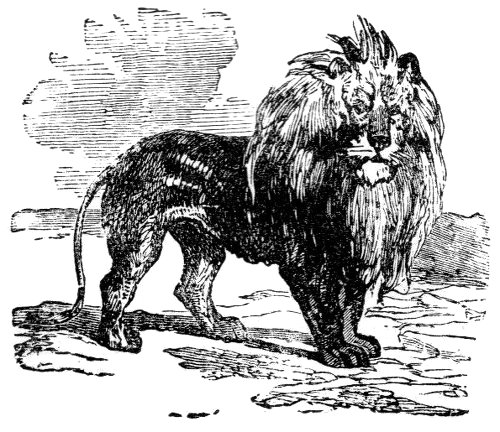
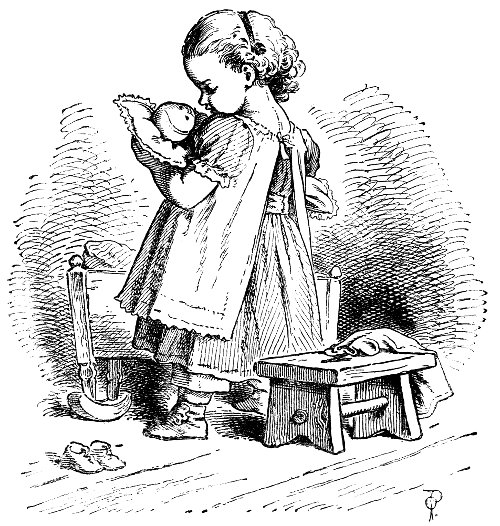

There, go to sleep, Dolly, in own mother’s lap;
I’ve put on your night-gown and neat little cap;
So sleep, pretty baby, and shut up your eye:
By-bye, little Dolly; lie still, and by-bye.
I’ll lay my clean handkerchief over your head,
And then make believe that my arms are your bed,
So hush! little dear, and be sure you don’t cry;
By-bye, little Dolly; lie still, and by-bye.
There, now it is morning, and time to get up,
And I’ll crumb you a mess in my doll’s china cup;
So wake, little baby, and open your eye,
For I think it high time to have done with by-bye.


Little Tiny had a sad habit of tasting everything that came in her way. This was because she was so greedy; and it was very naughty too, because she used to take things that had not been given to her. At 335 last she had a lesson, which I am going to tell you of, and I think it almost cured her of her bad habit.
One day Tiny’s mother was in the kitchen, preparing some nice dish, and she said to her little girl,—“Run into the back kitchen, dear, and bring me a lemon; you will find some upon the shelf.” When Tiny found herself alone in the back kitchen, she looked about to see if there was anything she could taste. On a shelf she saw a number of jars, which looked as if they contained jam, or preserves, or something of that sort; so she placed a stool, and standing on tip-toe upon it, chose a pretty little jar, which she took down. It contained some yellow powder: she put her fingers into the powder without hesitation, and then put them into her mouth. Bah! it was mustard. Crying and spluttering, she went back to her mamma, who simply said,—“My dear, it serves you right.”

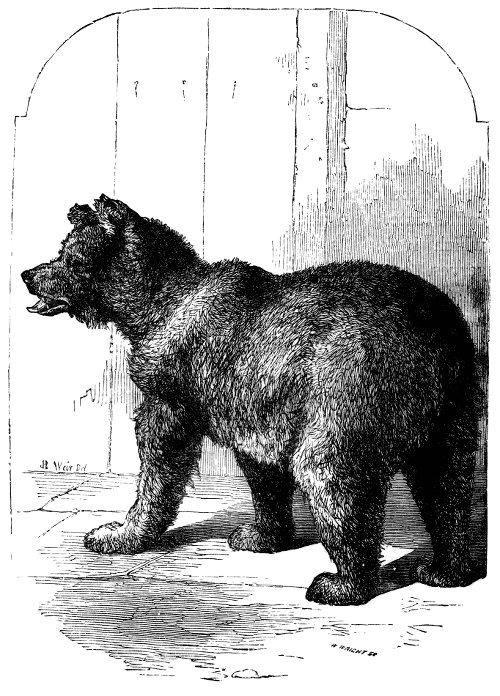

Here is another of Aunt Totty’s stories about her pet animals. I shall tell it to my little readers as nearly as I can in her own words; and they must fancy Aunt Totty seated in the midst of her little nephews and nieces, who are all ready to listen. This is how she begins:—
“Now, my dears, I am going to give you an account of a pet I had whose name was Jacquot. I daresay you think from the name it must have been a monkey or a parrot. No such thing! it was a great brown bear, and this is how I made his acquaintance.
“I was not more than nine years old, and was travelling with my papa and mamma, and my brother, who was two or three years older than myself. We were making a tour in Switzerland, and stopped for a few days at a town of which I forget the name now; for you may suppose it was a great many years ago. However, what I do remember is that a fair was being held in the town at the time, and that is how it happened that the bear was there.
“On the morning after our arrival I came down early,—as I thought, before anyone else of the party—and seated myself at the open window of our sitting-room in the hotel. As I sat there watching all that was going on outside, I saw my brother cross the courtyard of the hotel, coming out from a long low range of buildings on the other side of it. A minute afterwards he entered the room, and coming up to me, said with an air of mystery,—‘Totty, I want to show you something: come with me 338 before mamma and papa are down; you’ll see something curious.’
“‘What is it?’ I inquired, feeling quite excited.
“‘I won’t tell you what it is; but come along and see,’ answered my brother.
“As he spoke, he led me downstairs. We crossed the courtyard hand in hand, and entered the stables of the hotel. I could not help looking about rather nervously, as he led me past a number of horses and mules—keeping always, however, at a safe distance from their heels—till we came to the last stall of all. In a corner of this, I perceived a huge ragged hairy ball, but what it was I could not at first imagine. I saw that a strong chain attached it to a ring in the wall; then I discovered that it was some living creature, for its sides rose and fell with the breath as it slept. A man, who was lying on some straw close by, seeing my brother and me, rose up, and said in French,—‘You need not be afraid, he won’t hurt you.’ Then patting the creature with his hand, he added,—‘You wouldn’t hurt the young lady, would you, Jacquot?’
“The ball uncurled itself, growled, and rose upon four legs. It was a bear: but the saddest-looking, the thinnest, and most ragged you can imagine. It had twenty scars on different parts of its body, and one ear was almost torn away. I must have looked shocked and distressed, for the man seemed to understand my thoughts, and said,—‘Ah, well! what can you expect? poor Jacquot is not happy.’
“Then he went on to tell us the bear’s history. It appeared that he was himself only the keeper or attendant of the bear, not the owner. He told us that Jacquot was born in the Pyrènean mountains: he was caught when quite a baby, and received an excellent education, being able to dance and perform every trick a bear can learn; he was perfect also in point of docility. At one year of age, his education being considered complete, he had been sold to the man who was still his master. This man, at the 339 time he made the purchase, was the owner also of other animals. Jacquot’s first companions were a camel, two monkeys, and a red and blue parrot. One of the monkeys passed the greater part of his time on the bear’s back, the other monkey and the parrot on the back of the camel. But they were not a happy family: the monkeys and parrot bit and scratched, and generally tyrannised over, the patient camel and the good-natured bear.
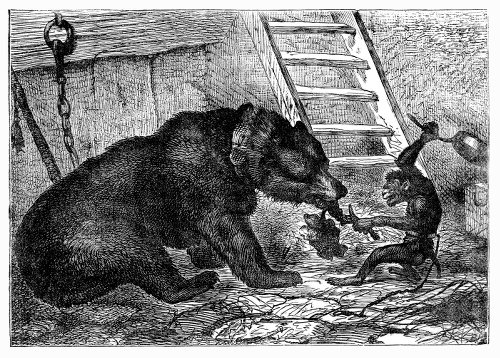
“The owner of these animals used to take them about in a caravan from place to place, to exhibit them; but he was not kind to them, or did not treat them properly, for the camel, one monkey, and the parrot died; and when I made the acquaintance of Jacquot they had lately been replaced by a small leopard. So that the collection consisted then of a bear, a monkey, and a leopard, the latter being kept in a strong-wooden cage.
“Just as the man finished speaking, a monkey jumped 340 down from a manger, and seized upon some cabbage leaves which the man, while talking to us, had given poor Jacquot. The bear, who was enjoying his little bit of greenmeat, objected to part with it; whereupon the monkey, looking like a little fiend, seized upon an old saucepan which lay near, and belaboured the poor bear cruelly upon the head and nose. Not content with this, it jumped upon the bear’s back, and bit and tore the poor creature, until the man took up a whip; at the sight of which the savage monkey quickly made off into its manger again. From that moment I hated the monkey, and loved the poor, patient, oppressed, ill-used bear.
“During the next few days I used to pay a visit to Jacquot whenever I could get my brother to take me into the stable; and on such occasions I always took him a present of fruit or cakes. More than once, also, I saw him performing in the fair, and then it always seemed to me that he looked out of the corner of his little eye as if he recognised me. There was a knowing twinkle in his eye which seemed to say,—‘We don’t appear to be friends in public, but we have our pleasant little secret interviews for all that.’ It went to my heart to see how the patient creature was knocked about and ill-treated by his cruel master, who always acted himself as showman. Poor Jacquot danced and went through his different performances hour after hour, with nothing but blows for his reward. He was the principal performer: the monkey was not very clever, and did not do much; while the only trick that the leopard had been taught was to jump through a hoop, which was thrust into his cage between the bars. When not doing this he only walked backwards and forwards in his cage, to be looked at.
“One evening I had some nice cakes, which mamma had given me from the dessert after dinner, to take to Jacquot. I looked about for my brother to go with me into the stable, but not finding him, at last, after some hesitation, I ventured to go alone. The coast was quite 341 clear; there seemed to be nobody about. I passed by the horses and mules, and went on to the last stall, which was Jacquot’s habitation.
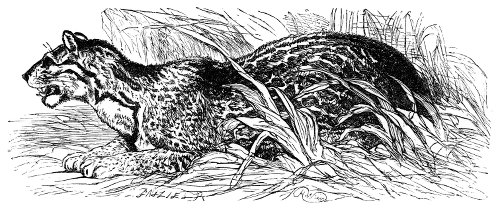
“He welcomed me with a friendly grunt, and while he was munching his cakes, for which he seemed very grateful, I happened to look through an open door which led into a room beyond the stable. This room was probably intended as a harness room, but I knew that in it the leopard was kept. There was his cage, too, standing on the ground, just in the place where I had seen it before; but I noticed, to my inexpressible astonishment, that the cage was empty. I did not observe, or do not remember, whether the cage door was open or the cage was broken; but the conviction on my mind at once was that the leopard had escaped.
“In a corner of the stable was a heap of clean straw, on which the keeper of the animals, Auguste,—the man who had told us the history of Jacquot—was accustomed to lie down; probably it served for his bed at night. While I was wondering what could have become of the leopard, and beginning to feel very frightened, I heard a rustling sound, and saw the handsome, wicked-looking head of the creature peep from beneath the straw; then slowly it crept out altogether, its eyes glaring at me, and showing its teeth the while. It was just going to spring when my friend 342 Jacquot saved my life. As I stood immovable from fear, Jacquot stepped in front of me, the length of his chain just allowing it; and there he stood up, exactly as a man might have done, to defend me. He gave a tremendous growl as the leopard sprang upon him. I saw no more, but ran off as fast as I could.
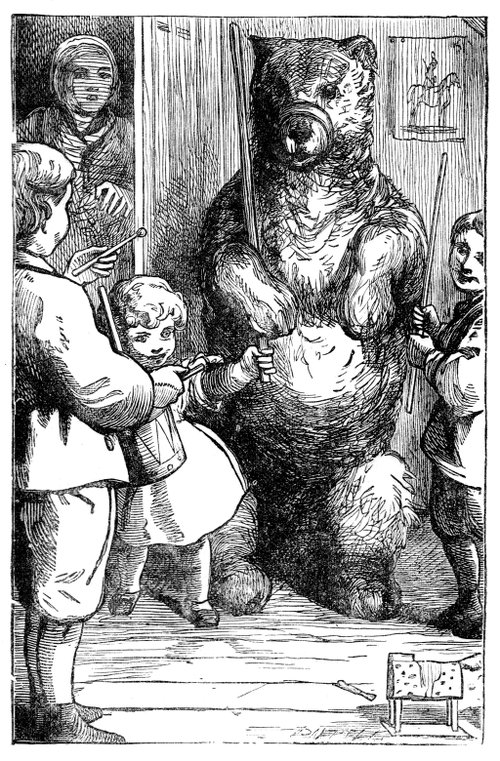
“In the courtyard I met Auguste, who had heard the bear growl, and was running to see what had happened. I afterwards learnt that he had only been able to liberate poor Jacquot and secure the leopard by striking the latter on the head with an iron bar, which he kept always handy for emergencies of the kind. The creature was stunned by the blow and restored to its cage, but both animals were very much hurt in the fight.
“Then the question arose, how was Jacquot to be rewarded for having saved my life? My father said at once that he should like to buy the bear, so as to save it from further ill-treatment by its master, the monkey, or the leopard. But when we had him what were we to do with him? He could not be taken about with us like a pet dog. Then I proposed that it should be bought from its present owner, and made a present to Auguste, who, I felt sure, would always treat it kindly. This plan was carried out; and before we left Switzerland I had the satisfaction of knowing that Jacquot was earning a good living for itself, and for a kind master, by its accomplishments.
“Many years afterwards I was staying at the house of some French friends of ours near Versailles, when one of the children—for there was a large family—ran into the drawing-room, looking very excited, to say that there was a wonderful performing bear, which had come into the garden, and they had now got it in the nursery, which opened on to the garden. The bear was doing the most extraordinary things, the child said, and would we come to see it? We elders of the party went off to the nursery immediately, for it sounded alarming to have a bear playing with the children. As we entered, I at once recognised in the bear’s master, who was standing in a corner of the room, and looking on with great pride at his bear’s performances, my old friend Auguste.
“I told Jacquot’s story to my friends, and you may be sure the bear and its master were both made much of.”


The bird that will not sing,
The bell that will not ring,
The wheel that won’t go round about,
The horse that will not spring,
And the child that won’t be happy
With what each day doth bring,—
Now I call every one of these
A naughty, useless thing.
Little Tommy’s crying;—
What’s it all about?
He cannot tell you why himself,
So greatly he’s put out.
He’s all that he can wish for,
And plenty more beside,—
A drum and a gun,
And a great plum bun,
And a rocking-horse to ride.
Young Master Tommy does not know
What it is he wants to-day;
He can’t enjoy his dinner,
And he does not want to play.
Suppose we send him off to bed,
And take his toys away!
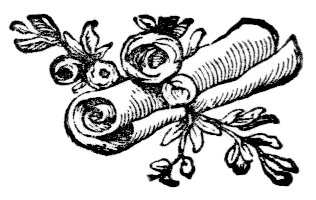
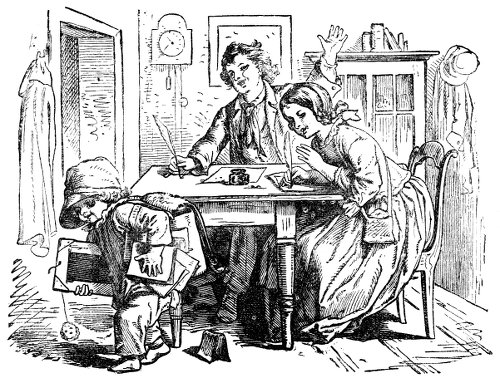

Philip and Rosa work very hard at their lessons. They are the two oldest of a family of seven: Philip goes to college in the day-time, and Rosa has a daily governess, so that in the evening they both have lessons to prepare for the next day; and they like to work quietly together in a little room they call their school-room.
One evening Philip had been having a game with one of his little brothers. Tommy—that was the little brother’s name—had had a present made to him of a bat and ball, and Philip showed him how to play. Now Master Tommy was so pleased with the game, that when evening came on, and it was time for him to go in, and when Philip, too, wanted to go to his lessons, he would not leave off. At last Philip adopted the plan, when Tommy’s back was turned for a moment, of making the bat and ball disappear. Then Tommy began to cry; and his big brother assured him that “Bogy” had taken the bat and ball; adding,—“But 347 if you are a good boy he’ll bring them back to-morrow.” So saying, off he went to his work in the school-room.
Just when Philip and Rosa had settled to their work, with books and slates scattered upon the table, a little figure, with knapsack on his back, and cap much too large for him covering his head, crept quietly into the room. They thought it best to take no notice of Master Tommy, as then perhaps he might go away of himself; but presently, when they were most occupied with their lessons, he suddenly slipped some of the books from the table into his knapsack, and taking others and a slate under his arm, ran out of the room. At the door he turned and cried out, “Bogy’s got ’em; if you good, perhaps he’ll bring ’em ’gain to-morrow.”
Philip and Rosa pursued, and picked up the books, which Tommy dropped as he ran downstairs. They both took the joke very good-naturedly. Philip declared it was only tit for tat; and Rosa supplied Tommy with a lot of old finery, for him to take into the nursery, that he and the other children might amuse themselves by dressing up.
After all, Tommy had capital fun that evening. The children dressed up, and fancied themselves all sorts of wonderful people: kings, and queens, and fairies; judges and generals, and I know not what.
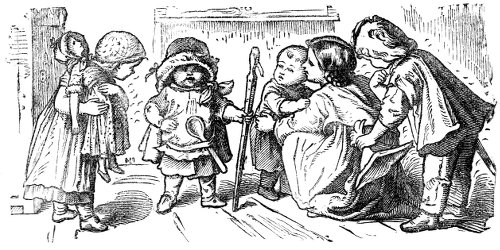
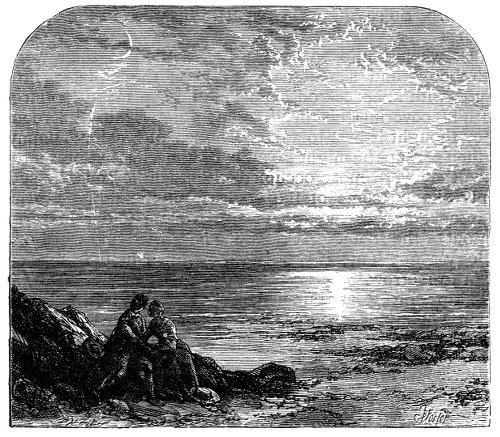
Good-bye, pretty sun, good-bye!
You are sinking behind the sea,
But I know you’ll come back to-morrow
To shine again upon me.
I know that, although you seem
To be taking a bath out there,
You are only gone to shine
Upon other countries fair,
Where people like us live,
Although they are far away:
You shine upon girls and boys,
And light them at their play.
And I hope that every day
That I see the sun once more,
He’ll find me a little wiser
Than I was the day before.
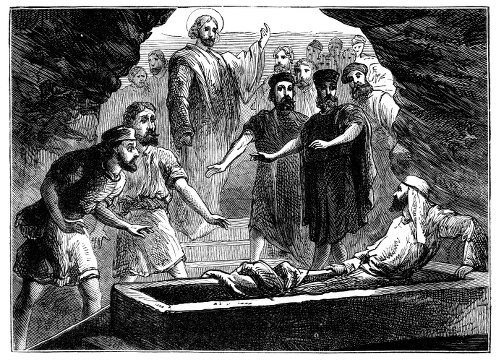

Listen to me, now, my darling children, while I relate a wonderful miracle, called “The Raising of Lazarus.” I have already told you of many instances in which our Saviour restored the sick to health, the blind or deaf to sight or hearing. I have related one case—that of the daughter of Jairus—where He restored a child to life; but I am now going to describe how 350 our Lord brought back to life a man who had been four days dead.
In the little city of Bethany, in Judæa, lived a family which we are told that Jesus loved. This family consisted of two sisters and a brother, and their names were Mary, Martha, and Lazarus. Now Lazarus fell sick, and his sisters sent to tell Jesus of this. The message they sent was simply, “Lord, he whom Thou lovest is sick.” They made no request, but probably they thought that the kind and good Lord who had done so many works of mercy for others, would come and heal their brother.
When Jesus received this message, He was in the country beyond the river Jordan, about thirty miles from Bethany, which is near Jerusalem. He had retired to a distance from the latter city, because the priests and Pharisees had succeeded in stirring up a portion of the populace against Him. His reply to the messengers was as follows:—“This sickness is not unto death, but for the glory of God, that the Son of God might be glorified thereby.” These seemed like words of comfort for the anxious sisters; yet they saw their brother get worse hour after hour. The Saviour came not; and at length their brother died.
And where was Jesus at the time? After receiving the message, He “abode two days still in the place where He was.” But this delay does not appear to have arisen from any hesitation to return to the neighbourhood of Jerusalem. He said to His disciples, at the end of the two days, “Lazarus is dead. And I am glad for your sakes that I was not there, to the intent ye may believe: nevertheless, let us go unto him.”
These words appear to signify that our Saviour was glad He had not been with Lazarus when he was ill, because then He should have cured him, and the miracle would not have been so wonderful as it would be now—not so likely to increase the faith of those who beheld it. Therefore He rejoiced that He should have to raise 351 Lazarus from death to life instead of curing him of sickness.
The disciples attempted to dissuade Christ from returning so near to Jerusalem, but finding Him resolved, they declared their willingness to accompany Him, and they all departed together into the land of Judæa. As they approached Bethany, Martha, hearing that the Lord was coming, went out to meet Him, while Mary remained in the house. As soon as Martha met Jesus, she thought, doubtless, of all the people He had so mercifully healed by a touch of His hand or a word from His mouth, and said to Him, “Lord, if Thou hadst been here, my brother had not died.” Then added immediately afterwards, “But I know that even now, whatever Thou wilt ask of God, God will give it Thee.”
These words of Martha’s prove how strong her faith was. And Jesus answered her, saying, “Thy brother shall rise again.”
She does not seem to have felt sure that this promise was meant in the sense of restoring Lazarus to life; but what followed is best related in the words of St. John, who tells us:—
“Martha saith unto Him, ‘I know that he shall rise again in the resurrection at the last day.’ Jesus said unto her, ‘I am the resurrection and the life: he that believeth in me, though he were dead, yet shall he live. And whosoever liveth and believeth in me shall never die. Believest thou this?’ She saith unto Him, ‘Yea, Lord: I believe that Thou art the Christ, the Son of God, which should come into the world.’ And when she had so said, she went her way, and called Mary her sister secretly, saying, ‘The Master is come, and calleth for thee.’”
It was the custom among the Jews, when anybody died, for the friends and neighbours of the bereaved family to gather round the remaining members of it, and mourn with them, or endeavour to console them. Mary was surrounded by friends when Martha returned to her, and 352 said, “The Master is come.” St. John goes on as follows:—
“As soon as she heard that, she arose quickly, and came unto Him. Now Jesus was not yet come unto the town, but was in that place where Martha met Him. The Jews then which were with her in the house, and comforted her, when they saw Mary, that she rose up hastily and went out, followed her, saying, ‘She goeth unto the grave, to weep there.’ Then when Mary was come where Jesus was, and saw Him, she fell down at His feet, saying unto Him, ‘Lord, if Thou hads’t been here my brother had not died.’ When Jesus therefore saw her weeping, and the Jews also weeping which came with her, He groaned in the spirit, and was troubled; and said, ‘Where have ye laid him?’ They said unto Him, ‘Lord, come and see.’ Jesus wept.”
Christ, the Son of God, wept with the mourners. Although He knew He should raise Lazarus from the dead, He shed tears at the sight of human grief.
They came to the grave. It was a sepulchre hewn out of the rock, and a large stone had been rolled against the entrance. Jesus desired that this stone should be rolled away. Then Martha reminded Him that Lazarus had been dead four days. She said this because in hot countries like Judæa bodies decompose rapidly after death. But Christ replied,—“Said I not unto thee that if thou wouldest believe, thou shouldest see the glory of God?”
The stone was removed. Jesus first lifted up His eyes, and prayed, then He cried in a loud voice,—“Lazarus, come forth!”
And the man who had been dead four days came forth, all wrapped in his grave-clothes, and his face bound about with a napkin. Those who stood round and beheld this miracle, were too astounded to approach Lazarus, until Christ said,—“Loose him, and let him go.” St. John adds:—“Many of the Jews which came with Mary, and had seen the things which Jesus did, believed on Him.”


The name of my little friend, whose picture you see on the last page, is Janey; and I will tell you how I became acquainted with her.
One very cold day in December last year, just before Christmas time, I was walking rather briskly in a London street near my own house, with a certain pair of little pattering feet trotting along beside me, and a certain pair of bright blue eyes looking alternately up to my face and at the brilliantly decorated shops. Now and then we stopped to look in at the windows of the toy-shops, and see the beautiful toys, and other pretty things displayed there. And now and then we did still better, for we went in at the glass doors, and mingling with a host of other merry Christmas folk, bought some of the pretty things we had been looking at from the outside. Both Lily and I would come out of the shops laden with such a number of parcels—such a load of dolls and horses, balls and musical instruments, that it was a wonder and a puzzle to ourselves how we contrived to carry them all. I think my little Lily’s slender arms grew stronger and longer for the occasion. Once, too, we went into a pastrycook’s, and came out with still an additional parcel or two: these were intended for the little ones at home.
My Lily and I had lately made several expeditions of this kind in the service of a certain giant tree at home. For a long time this tree seemed insatiable: the greedy 355 branches never had enough, though every day new ornaments, or toys, or trinkets of some sort were hung upon them. But to-day’s was to be our last expedition; we needed only a few toys to fill up some gaps near the foot of our great Christmas tree.
We had just made up our minds to go into no more shops, but hurry home with the purchases we had made, when, in turning a corner, Lily ran up against a poor little girl scarcely bigger than herself, though probably about eight years old. The little girl had on a dress with short sleeves, although it was so cold; she had a little three-cornered grey woollen shawl upon her shoulders, and a torn straw hat upon her head. This little girl was Janey; and my Lily, who was walking very fast, had almost knocked her over.
As the two children recovered from the shock, I saw Janey turn her pretty brown eyes wistfully towards the parcels of toys and sugar-plums we were carrying; when Lily, touched at the sight of the forlorn little girl, suddenly held out half-a-crown, which had been clutched in her hand ever since we had been out. This half-crown had been given to her that morning by her god-father, and she had brought it out to spend it, but had not done so. I thought it rather much to give to a strange child; but I said nothing, as the girl had already got the money safe in her poor little cold red hand.
“It was my own, you know, mamma dear,” pleaded my Lily, perhaps reading my thoughts.
“Yes, dear,” I replied, as I watched the expression of delight in both the children’s faces: one delighted at receiving, the other at giving the present.
The strange child murmured some words of thanks, and we continued on our way. We had not gone far, however, when I discovered that I had lost my purse, and feeling sure that I had left it on the counter in the last shop we had been to, I and Lily began to retrace our steps as quickly as we could. We had not gone far when we came 356 in sight of the little girl again. She was standing in front of a toy shop, as you see her in the picture; she held the half-crown in her hand, and was glancing, sometimes at the shop window, sometimes at some oranges on a fruit stall in the street, seeming undecided what to buy. Just before we reached her, however, she appeared to have made up her mind, and without entering the shop, she trotted briskly on in front of us.
Presently we saw her walk into a baker’s shop; we passed it, but had not gone far beyond, before she overtook us, walking very fast, and carrying two large loaves under her shawl. Then I stopped her, and asked where she was going.
“Home, ma’am,” she said; “I am taking mother this bread for our little ones: they are so hungry!”
“You didn’t buy yourself a toy, nor even an orange then?” I said. “But you have still money enough to do so.”
“Oh, I have lots left out of what the little lady gave me, but I would rather, please, take it all home to mother. She would give us toys if she could, but it is hard for her to give us bread, and I know she will spend the money better than I can. I did stop at the toy shop window, ma’am, but I am very glad I didn’t buy anything.”
And this was Christmas time!—the time, above all others in the year, when we should help each other, in remembrance of Him who came to us one Christmas night, and living on the earth among the poor, taught us by His precept and example to love and succour all our poorer brethren.
We walked with little Janey to see her mother, and her home, which was very near; and I think the readers of “Wide-awake” will be glad to hear that Janey, her mother, and the little ones have not suffered from want of bread since that day. Besides, on Christmas day itself they had a real Christmas dinner, with roast beef and plum-pudding, and oranges; and good little Janey had some toys given to her into the bargain.
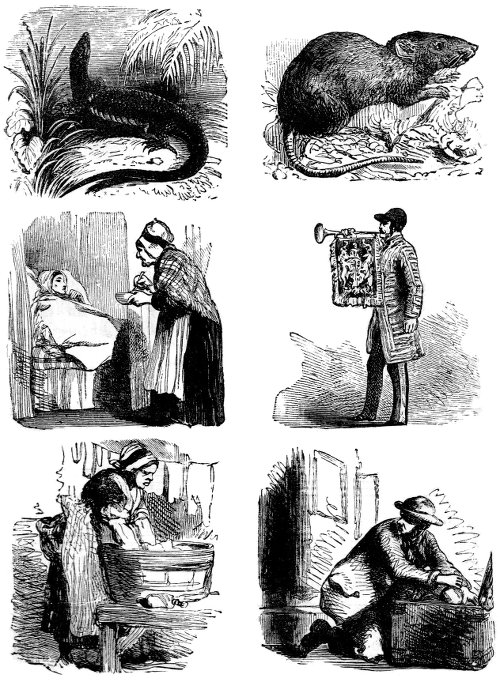
Now, little people, see if you can guess this puzzle-page. One of these objects begins with L, one with N, one with R, two with T, and one with W.

Lively. mf.
1.
The dolls had a tea party: wasn’t it fun!
In ribbons and laces they came one by one;
We girls set the table, and poured out the tea;
And each of us held up a doll on our knee.
2.
You never saw children behave half so well;
Why nobody had any gossip to tell!
And—can you believe it? for badness that day,
No dolly was sent from the table away.
3.
The cups and the saucers they shone lily white:
We helped all the dollies; they looked so polite;
We had cake and jam from our own pantry shelves;
Of course we did most of the eating ourselves.
4.
But housewives don’t know when their cares may begin—
The door it stood open, and pussy popped in;
He jumped on the table,—and what do you think?—
Down fell all the crockery there in a wink.
5.
We picked up the pieces with many a sigh;
Our party broke up, and we all said good-bye.
Do come to our next one:—but then we’ll invite
That very rude pussy to keep out of sight.
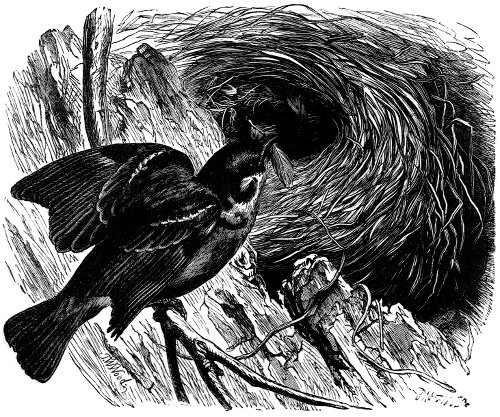

Cissy and Lily are feeding a little tame sparrow. The poor bird had fallen out of its nest, and the gardener picked it up, and gave it to the children. The little creature sits on Cissy’s finger, while Lily feeds it with bread and milk. It is getting quite tame, puts its little head on one side, and looks at Lily out of its pretty bright eye. The children 361 have had it some days: it can fly a little now, but shows no wish at present to fly away.
“I’m the mother of it,” says Lily, “tos I feed it.” Then she adds, after considering a moment: “Cissy can be father if she likes.”
Cissy, aged nine years, smiles at this remark, and says,—“You don’t know what you’re talking about, my dear child; I can be aunt or grandmamma: Johnny can be father, if he likes.”
Johnny is marching up and down the room with a gun over his shoulder. He is two years old, and likes to be one thing at a time, so he answers in a gruff voice,—“No, me tan’t: Donny soldar; tan’t be father now;” and he continues his march.
“I shall call it Tommy,” says Lily.
“Teddy’s a prettier name,” suggests Cissy.
“Shan’t call it Teddy,” rejoins Lily; “peoples ’ill think he’s a donkey.” Lily once knew a donkey who had that name.
“Pretty Teddy! Teddy! Teddy!” cries Cissy in a teazing way. Whereupon Lily, who, I am sorry to say, is very short-tempered, raises her little hand, and brings it down smartly on Cissy’s face. A skirmish takes place: the sparrow flies off to a distant part of the room; and mamma, coming in at the moment, finds voices raised, tears flowing, and red and angry faces.
After hearing what each has to say, mamma thinks that both children have been very naughty, and she tells them to make it up. Neither will say that she is sorry. Then mamma looks very grave, and tells the children how we ought always to ask pardon when we have done wrong.
At last peace is restored: the little girls kiss each other and are quite happy again. Then Cissy says:—“Sometimes people had better not ask pardon, mamma dear. Don’t you remember Hans Christian Andersen’s story in ‘What the Moon saw?’”
“I doubt very much, dear, if there is any story of Hans 362 Christian Andersen’s which teaches us we ought not to ask pardon, when we have done wrong: I don’t know which you can be thinking of. ‘What the Moon saw’ is a collection of little stories, one of which is supposed to be related every evening by the moon to a poor artist, who was fond of looking at her from his window. The moon relates to him something she has seen on the world every evening. But, Cissy dear, get the book, and read us the story you are thinking of; it is sure to be amusing.”
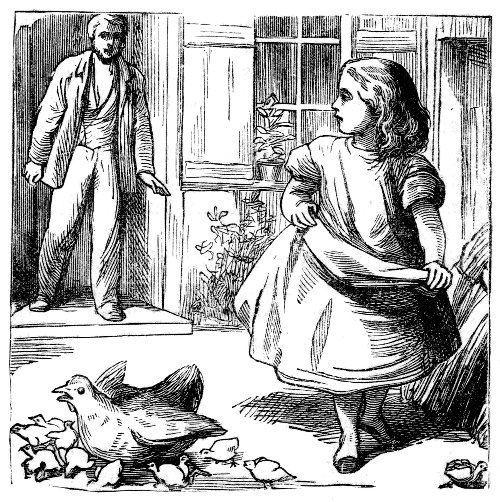
The book is on the table, for Cissy has been reading it to-day. She takes it up, and begins at once to read:—
WHAT THE MOON SAW.
SECOND EVENING.“Yesterday,” said the moon to me, “I looked down upon a small court-yard surrounded on all sides by houses. In the court-yard sat a clucking hen with eleven chickens; 363 and a pretty little girl was running and jumping round them. The hen was frightened, and screamed, and spread out her wings over the little brood. Then the girl’s father came out and scolded her; and I glided away and thought no more of the matter.
“But this evening, only a few minutes ago, I looked down into the same court-yard. Everything was quite quiet. But presently the little girl came forth again, crept quietly to the hen-house, pushed back the bolts, and slipped into the apartment of the hen and chickens. They cried out loudly, and came fluttering down from their perches, and ran about in dismay, and the little girl ran after them. I saw it quite plainly, for I looked through a hole in the hen-house wall. I was angry with the wilful child, and felt glad when her father came out and scolded her more violently than yesterday, holding her roughly by the arm. She held down her head, and her blue eyes were full of large tears. ‘What are you about here?’ he asked. She wept, and said, ‘I wanted to kiss the hen and beg her pardon for frightening her yesterday; but I was afraid to tell you.’
“And the father kissed the innocent child’s forehead, and I kissed her on the mouth and eyes.”
Here ended the story of “What the Moon saw,” and as Cissy leaves off reading, mamma says:—
“Why, my darling Cissy, this story does not teach that it is ever better not to ask forgiveness. The little girl was only silly for thinking that the hen could understand her, and so it happened that she only frightened the poor creature instead of doing any good. If the hen could have understood her, as little girls understand each other, it would have been very glad, I daresay, to let her kiss it. Besides, you see in the story, that directly the father knew his little girl had meant to ask pardon of the hen, he kissed her on the forehead, for he saw how good she really was.”
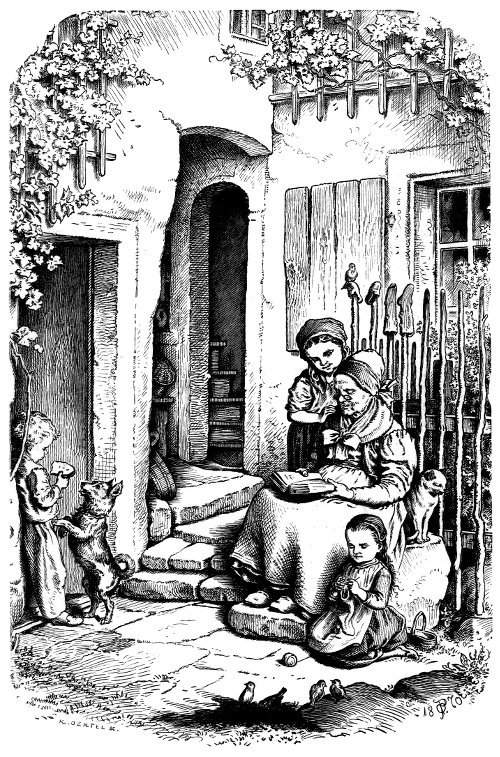

In the quiet summer evening,
The children gather round,
While granny reads aloud to them
With voice of pleasant sound.
A happy cheerful party,
Indeed we all must say;—
Both granny and the children
Enjoy the close of day.
Katrina stands beside her;
Lina’s knitting at her feet;
Karl feeds himself, and Faust the dog,
With bread and jam—a treat!
Even pussy and the dicky-birds
Seem pleased and quiet too:
I think, my little children,
Indeed, and so would you.
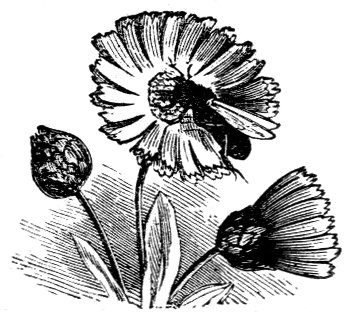
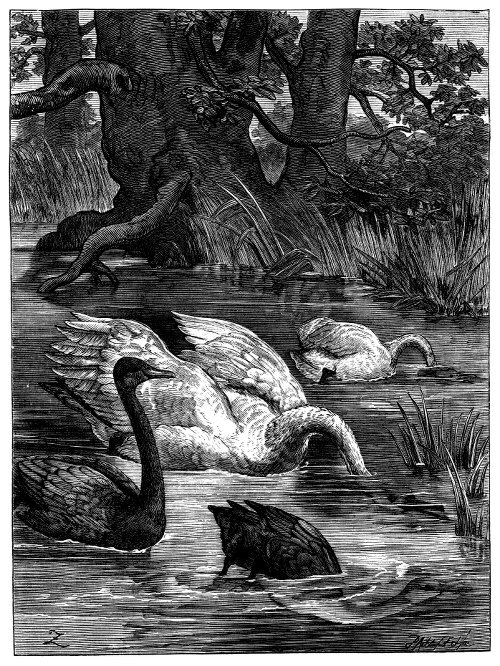

My little readers all know very well what a swan is like. Which of you has not seen the beautiful large bird sailing proudly on the water; either on some river or lake, or perhaps on the Serpentine, or round a pond, in Kensington Gardens? How graceful the Swan is, with its long arched neck and pure white plumage! How grand it looks, turning slowly from side to side, followed perhaps by one or two cygnets! The mother swan casts sharp glances round her to see that no one is daring to interfere with her children. Then, too, how curiously she thrusts her long neck and head under the water, seeking for river weeds or some water insect.
In the picture there we see two swans and two growing-up cygnets. The papa and mamma swans, and one of the cygnets, are all engaged in obtaining food with their heads under water. Swans live upon water plants, frogs, and insects; and some swans get a great deal of bread besides. Certain little friends of mine, and indeed almost all little children living at the west end of London, take delight in carrying out pieces of bread for the swans in Kensington Gardens. These swans are nearly always gentle to children, and will come waddling out of the water, and eat from the children’s hands. I must say, however, if swans could know how awkward they look when waddling about on dry land, they would never—at least if they care for admiration—show themselves out of their proper element. They are as awkward and ungainly in all their movements when on land, as they are graceful in the water. I know few prettier sights than that of a swan moving lazily along in summer on some calm lake or river; his reflection just broken now and then by the tiny wavelets that he makes in swimming.
Swans build their nests on the bank of some river or piece of water, or still more frequently on some small island. In the nest the mother swan lays six or seven greenish-white eggs, on which she sits patiently for two months before the young cygnets appear. She nurses them with the most tender care, teaching them to swim, and sometimes carrying them on her back when the water is rough, or the current strong.
I told you just now how gentle tame swans generally are, but I must add that they are not always so. They are anything but gentle if you go near their nests, or their young ones. When I was a little girl, and was staying at a country house, where there was a large lake, I had a very disagreeable adventure with a swan.
I had been feeding some swans in the morning with bread which I had brought from breakfast. My governess had taken me down to the lake, and we had found the beautiful creatures perfectly tame. In the afternoon, after my early dinner, I took some bread from the table, thinking I would run down and feed them again. I ran off alone, for they had been so gentle in the morning it did not occur to me that there was any danger. Reaching the edge of the water, I found that my friends whom I had fed before had gone off to another part of the lake, but there was a solitary one not far away, sitting among some reeds upon the bank.
I approached it, and tried to make it come to me by calling, and by holding out the bread in my hand; but it took not the slightest notice. Then I threw some bread to it, when I saw its feathers rising as if it was growing angry. But I wanted to make it, either come to me, or go into the water, that I might see it swim; so at last I threw a piece of hard crust at it, calling out at the same time,—“You stupid thing, get up.” It did get up, and more quickly than I expected, for it ran at me as fast as it could waddle, hissing angrily, flapping its wings, and with all its feathers raised up. I was a tall child of eight years old, 369 and could easily have escaped by running, but unluckily I stumbled and fell just as I turned to run away. The swan instantly seized my dress in his bill, while he beat me cruelly with his wings. My screams soon brought a gardener to the spot, who drove the swan away, but I was already dreadfully bruised. Then the gardener warned me solemnly never to go near a sitting swan again: I had disturbed the poor swan while she was sitting on her eggs.
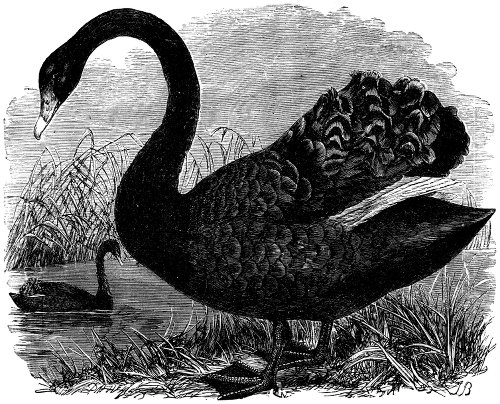
At the top of this page we have a picture of a black swan. I daresay you have seen them, for they are common in England now. They were found in Australia, and are handsome birds with scarlet bills, but their long necks have not the graceful curve seen in the white swans.
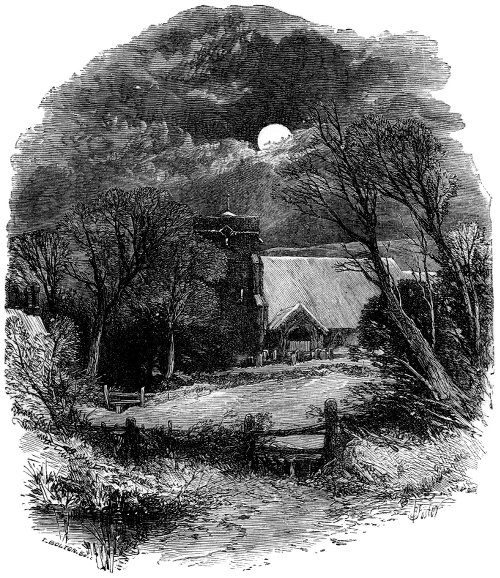
Christmas Eve! the bells are ringing,—
Ringing through the frosty air,
Happiness to each one bringing,
And release from toil and care.
How the merry peal is swelling
From the grey old crumbling tower!
To the simplest creature telling
Of Almighty love and power.
Ankle deep the snow is lying,
Every spray is clothed in white;
Yet abroad the folk are hieing,
Brisk and busy, gay and light.
Now fresh helps and aids are offered
To the agèd and the poor,
And rare love-exchanges proffered
At the lowliest cottage door.
Then while Christmas bells are ringing,
Rich and poor your voices raise,
And, your simple carol singing,
Waft to heaven your grateful praise.
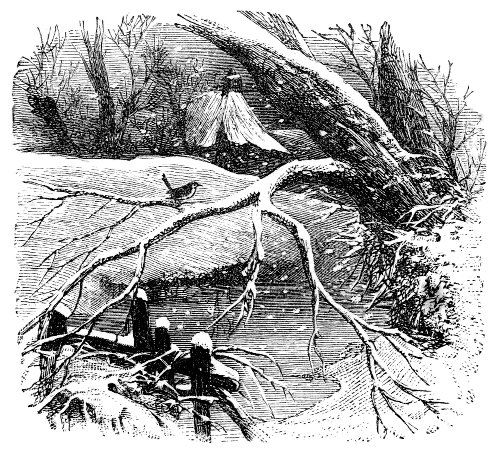
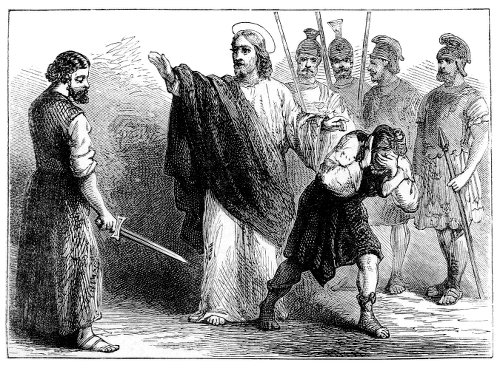
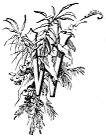
We come now to the last miracle that Jesus did before His crucifixion, and with that I shall finish my description of them. But you must not suppose, my dear children, that I have told you all, or nearly all, the miracles He performed.
The crucifixion itself was marked by miracles: darkness overspread the land; the veil, or curtain, which hung before the sanctuary in the temple, was rent in two; an earthquake tore asunder rocks and opened graves; but all these were signs and wonders 373 sent by God: they hardly can be classed among the miracles performed by Christ Himself.
Our Saviour’s last miracle, then, which I am going to tell you of to-day, took place at the time of His seizure by the soldiers and people the night before the crucifixion. I have already told you, my children, the sad story of our Saviour’s trial and crucifixion: I have told you how He was arrested during the night in the place called the garden of Gethsemane, at the foot of Mount Olivet, just outside Jerusalem. He was there with several of His disciples, and was praying—perhaps for those who He knew were about to inflict upon Him the suffering of a cruel death—when some soldiers and a crowd of people, led by the traitor Judas, approached. What followed is thus described by St. John:—
“Jesus, therefore, knowing all things that should come upon Him, went forth, and said unto them, ‘Whom seek ye?’ They answered Him, ‘Jesus of Nazareth.’ Jesus saith unto them, ‘I am he.’ And Judas also, which betrayed Him, stood with them. As soon, then, as He had said unto them, ‘I am he,’ they went backward, and fell to the ground. Then asked He them again, ‘Whom seek ye?’ And they said, ‘Jesus of Nazareth.’ Jesus answered, ‘I have told you that I am he: if therefore ye seek me, let these go their way.’”
You see even at that moment Christ thought of the safety of His disciples, and in saying, “let these go their way,” He was requesting that they might not be arrested with Him. When He advanced towards the soldiers and people saying, “I am he,” they were at first so impressed with the composure and majesty of His Divine presence, that they started back, and fell prostrate; or, as St. John says, “fell to the ground.” This impression, however, passed quickly away; and, urged on, we may suppose, by the priests and Pharisees who were with them, they kept to their purpose of arresting Christ. The miracle which Jesus then did is thus related by St. Luke:—
“When they which were about Him saw what would follow, they said unto Him, ‘Lord, shall we smite with the sword?’ And one of them smote the servant of the High Priest, and cut off his right ear. And Jesus answered and said, ‘Suffer ye thus far.’ And He touched his ear, and healed him.”
Peter was the disciple, as we learn from the other evangelists, who cut off this man’s ear, and the man’s name was Malchus. He was probably one of the most forward in rudely seizing Jesus: but when he was wounded, the compassion of the Saviour appeared. “Suffer ye thus far,” He cried amidst the strife. They were probably binding Him with cords, and He asked for a moment’s liberty, that He might touch and heal the wounded man.
A word of reproof was addressed at the same time to the rash disciple. Our Saviour reminded Peter how easily He could obtain the protection of legions of angels, if He wished for any protection or defence at all. “But how then,” said He, “shall the scriptures be fulfilled?” And He added:—“The cup which my Father hath given me to drink, shall I not drink it?” He would exert no power to help Himself, but He performed a miracle—His last miracle—to do good to an enemy. After this the disciples fled, and Jesus was conducted bound into Jerusalem.
We are surprised to find that this miracle did not produce any conviction of the Divine mission of our Saviour upon the minds of the priests, Pharisees, and others who witnessed it: We can only suppose that they had become familiar with miracles, and that those men whose interest or pride led them to oppose the teaching of Jesus, tried to persuade themselves that these miracles were not done through a power derived from God. Yet the character of the miracles ought to have removed the possibility of doubt. Christ exercised His power to do good to the suffering and afflicted: the sick were healed; the blind and deaf restored to sight and hearing; the dead brought back to life.
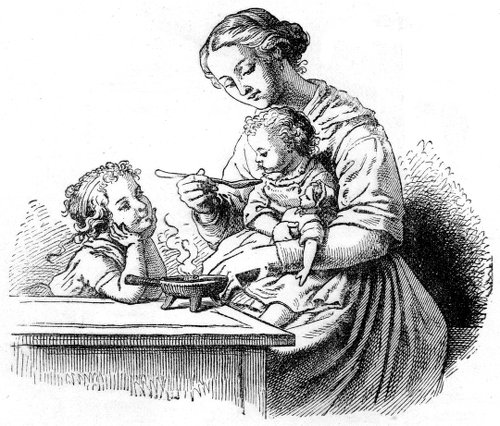
Our little baby is such a darling! He has curly golden hair, and great blue eyes, that he opens very wide. He looks up so earnestly, with such a solemn look in his eyes sometimes, that you would fancy he had all the cares of the world to think about, instead of only what his dinner will be, and when it will come, like other babies of two years old. Baby can talk nicely; he says his prayers night and morning, and before nurse feeds him with his beef-tea, he will fold his hands, and say his grace after her, as well as he can in his baby lisp. This is what he says,—
“Lord, that givest all things good,
To whom the ravens look for food,
Deign to look on us from heaven,
And bless the food that Thou hast given.”
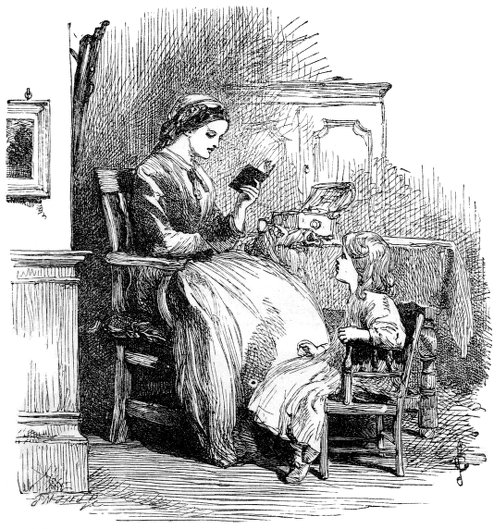

What shall we read to-night?
Of lord and lady bright?
Of the babies in the wood,
And the little robins good?
Of the man with beard so blue,
Or of Cinderella’s shoe?
Of Beauty and the beast,
Or, last, but not the least,
The Belle who slept so long,
Told in story and in song?
When the Prince a kiss did take,
She was “Little Wide-awake.”
Printed by Hazell, Watson, & Viney, London and Aylesbury.
End of the Project Gutenberg EBook of Little Wideawake, by
Lucy Elizabeth Drummond Sale-Barker
*** END OF THIS PROJECT GUTENBERG EBOOK LITTLE WIDEAWAKE ***
***** This file should be named 54050-h.htm or 54050-h.zip *****
This and all associated files of various formats will be found in:
http://www.gutenberg.org/5/4/0/5/54050/
Produced by Delphine Lettau, Stephen Hutcheson, and the
Online Distributed Proofreading Team at http://www.pgdp.net
Updated editions will replace the previous one--the old editions will
be renamed.
Creating the works from print editions not protected by U.S. copyright
law means that no one owns a United States copyright in these works,
so the Foundation (and you!) can copy and distribute it in the United
States without permission and without paying copyright
royalties. Special rules, set forth in the General Terms of Use part
of this license, apply to copying and distributing Project
Gutenberg-tm electronic works to protect the PROJECT GUTENBERG-tm
concept and trademark. Project Gutenberg is a registered trademark,
and may not be used if you charge for the eBooks, unless you receive
specific permission. If you do not charge anything for copies of this
eBook, complying with the rules is very easy. You may use this eBook
for nearly any purpose such as creation of derivative works, reports,
performances and research. They may be modified and printed and given
away--you may do practically ANYTHING in the United States with eBooks
not protected by U.S. copyright law. Redistribution is subject to the
trademark license, especially commercial redistribution.
START: FULL LICENSE
THE FULL PROJECT GUTENBERG LICENSE
PLEASE READ THIS BEFORE YOU DISTRIBUTE OR USE THIS WORK
To protect the Project Gutenberg-tm mission of promoting the free
distribution of electronic works, by using or distributing this work
(or any other work associated in any way with the phrase "Project
Gutenberg"), you agree to comply with all the terms of the Full
Project Gutenberg-tm License available with this file or online at
www.gutenberg.org/license.
Section 1. General Terms of Use and Redistributing Project
Gutenberg-tm electronic works
1.A. By reading or using any part of this Project Gutenberg-tm
electronic work, you indicate that you have read, understand, agree to
and accept all the terms of this license and intellectual property
(trademark/copyright) agreement. If you do not agree to abide by all
the terms of this agreement, you must cease using and return or
destroy all copies of Project Gutenberg-tm electronic works in your
possession. If you paid a fee for obtaining a copy of or access to a
Project Gutenberg-tm electronic work and you do not agree to be bound
by the terms of this agreement, you may obtain a refund from the
person or entity to whom you paid the fee as set forth in paragraph
1.E.8.
1.B. "Project Gutenberg" is a registered trademark. It may only be
used on or associated in any way with an electronic work by people who
agree to be bound by the terms of this agreement. There are a few
things that you can do with most Project Gutenberg-tm electronic works
even without complying with the full terms of this agreement. See
paragraph 1.C below. There are a lot of things you can do with Project
Gutenberg-tm electronic works if you follow the terms of this
agreement and help preserve free future access to Project Gutenberg-tm
electronic works. See paragraph 1.E below.
1.C. The Project Gutenberg Literary Archive Foundation ("the
Foundation" or PGLAF), owns a compilation copyright in the collection
of Project Gutenberg-tm electronic works. Nearly all the individual
works in the collection are in the public domain in the United
States. If an individual work is unprotected by copyright law in the
United States and you are located in the United States, we do not
claim a right to prevent you from copying, distributing, performing,
displaying or creating derivative works based on the work as long as
all references to Project Gutenberg are removed. Of course, we hope
that you will support the Project Gutenberg-tm mission of promoting
free access to electronic works by freely sharing Project Gutenberg-tm
works in compliance with the terms of this agreement for keeping the
Project Gutenberg-tm name associated with the work. You can easily
comply with the terms of this agreement by keeping this work in the
same format with its attached full Project Gutenberg-tm License when
you share it without charge with others.
1.D. The copyright laws of the place where you are located also govern
what you can do with this work. Copyright laws in most countries are
in a constant state of change. If you are outside the United States,
check the laws of your country in addition to the terms of this
agreement before downloading, copying, displaying, performing,
distributing or creating derivative works based on this work or any
other Project Gutenberg-tm work. The Foundation makes no
representations concerning the copyright status of any work in any
country outside the United States.
1.E. Unless you have removed all references to Project Gutenberg:
1.E.1. The following sentence, with active links to, or other
immediate access to, the full Project Gutenberg-tm License must appear
prominently whenever any copy of a Project Gutenberg-tm work (any work
on which the phrase "Project Gutenberg" appears, or with which the
phrase "Project Gutenberg" is associated) is accessed, displayed,
performed, viewed, copied or distributed:
This eBook is for the use of anyone anywhere in the United States and
most other parts of the world at no cost and with almost no
restrictions whatsoever. You may copy it, give it away or re-use it
under the terms of the Project Gutenberg License included with this
eBook or online at www.gutenberg.org. If you are not located in the
United States, you'll have to check the laws of the country where you
are located before using this ebook.
1.E.2. If an individual Project Gutenberg-tm electronic work is
derived from texts not protected by U.S. copyright law (does not
contain a notice indicating that it is posted with permission of the
copyright holder), the work can be copied and distributed to anyone in
the United States without paying any fees or charges. If you are
redistributing or providing access to a work with the phrase "Project
Gutenberg" associated with or appearing on the work, you must comply
either with the requirements of paragraphs 1.E.1 through 1.E.7 or
obtain permission for the use of the work and the Project Gutenberg-tm
trademark as set forth in paragraphs 1.E.8 or 1.E.9.
1.E.3. If an individual Project Gutenberg-tm electronic work is posted
with the permission of the copyright holder, your use and distribution
must comply with both paragraphs 1.E.1 through 1.E.7 and any
additional terms imposed by the copyright holder. Additional terms
will be linked to the Project Gutenberg-tm License for all works
posted with the permission of the copyright holder found at the
beginning of this work.
1.E.4. Do not unlink or detach or remove the full Project Gutenberg-tm
License terms from this work, or any files containing a part of this
work or any other work associated with Project Gutenberg-tm.
1.E.5. Do not copy, display, perform, distribute or redistribute this
electronic work, or any part of this electronic work, without
prominently displaying the sentence set forth in paragraph 1.E.1 with
active links or immediate access to the full terms of the Project
Gutenberg-tm License.
1.E.6. You may convert to and distribute this work in any binary,
compressed, marked up, nonproprietary or proprietary form, including
any word processing or hypertext form. However, if you provide access
to or distribute copies of a Project Gutenberg-tm work in a format
other than "Plain Vanilla ASCII" or other format used in the official
version posted on the official Project Gutenberg-tm web site
(www.gutenberg.org), you must, at no additional cost, fee or expense
to the user, provide a copy, a means of exporting a copy, or a means
of obtaining a copy upon request, of the work in its original "Plain
Vanilla ASCII" or other form. Any alternate format must include the
full Project Gutenberg-tm License as specified in paragraph 1.E.1.
1.E.7. Do not charge a fee for access to, viewing, displaying,
performing, copying or distributing any Project Gutenberg-tm works
unless you comply with paragraph 1.E.8 or 1.E.9.
1.E.8. You may charge a reasonable fee for copies of or providing
access to or distributing Project Gutenberg-tm electronic works
provided that
* You pay a royalty fee of 20% of the gross profits you derive from
the use of Project Gutenberg-tm works calculated using the method
you already use to calculate your applicable taxes. The fee is owed
to the owner of the Project Gutenberg-tm trademark, but he has
agreed to donate royalties under this paragraph to the Project
Gutenberg Literary Archive Foundation. Royalty payments must be paid
within 60 days following each date on which you prepare (or are
legally required to prepare) your periodic tax returns. Royalty
payments should be clearly marked as such and sent to the Project
Gutenberg Literary Archive Foundation at the address specified in
Section 4, "Information about donations to the Project Gutenberg
Literary Archive Foundation."
* You provide a full refund of any money paid by a user who notifies
you in writing (or by e-mail) within 30 days of receipt that s/he
does not agree to the terms of the full Project Gutenberg-tm
License. You must require such a user to return or destroy all
copies of the works possessed in a physical medium and discontinue
all use of and all access to other copies of Project Gutenberg-tm
works.
* You provide, in accordance with paragraph 1.F.3, a full refund of
any money paid for a work or a replacement copy, if a defect in the
electronic work is discovered and reported to you within 90 days of
receipt of the work.
* You comply with all other terms of this agreement for free
distribution of Project Gutenberg-tm works.
1.E.9. If you wish to charge a fee or distribute a Project
Gutenberg-tm electronic work or group of works on different terms than
are set forth in this agreement, you must obtain permission in writing
from both the Project Gutenberg Literary Archive Foundation and The
Project Gutenberg Trademark LLC, the owner of the Project Gutenberg-tm
trademark. Contact the Foundation as set forth in Section 3 below.
1.F.
1.F.1. Project Gutenberg volunteers and employees expend considerable
effort to identify, do copyright research on, transcribe and proofread
works not protected by U.S. copyright law in creating the Project
Gutenberg-tm collection. Despite these efforts, Project Gutenberg-tm
electronic works, and the medium on which they may be stored, may
contain "Defects," such as, but not limited to, incomplete, inaccurate
or corrupt data, transcription errors, a copyright or other
intellectual property infringement, a defective or damaged disk or
other medium, a computer virus, or computer codes that damage or
cannot be read by your equipment.
1.F.2. LIMITED WARRANTY, DISCLAIMER OF DAMAGES - Except for the "Right
of Replacement or Refund" described in paragraph 1.F.3, the Project
Gutenberg Literary Archive Foundation, the owner of the Project
Gutenberg-tm trademark, and any other party distributing a Project
Gutenberg-tm electronic work under this agreement, disclaim all
liability to you for damages, costs and expenses, including legal
fees. YOU AGREE THAT YOU HAVE NO REMEDIES FOR NEGLIGENCE, STRICT
LIABILITY, BREACH OF WARRANTY OR BREACH OF CONTRACT EXCEPT THOSE
PROVIDED IN PARAGRAPH 1.F.3. YOU AGREE THAT THE FOUNDATION, THE
TRADEMARK OWNER, AND ANY DISTRIBUTOR UNDER THIS AGREEMENT WILL NOT BE
LIABLE TO YOU FOR ACTUAL, DIRECT, INDIRECT, CONSEQUENTIAL, PUNITIVE OR
INCIDENTAL DAMAGES EVEN IF YOU GIVE NOTICE OF THE POSSIBILITY OF SUCH
DAMAGE.
1.F.3. LIMITED RIGHT OF REPLACEMENT OR REFUND - If you discover a
defect in this electronic work within 90 days of receiving it, you can
receive a refund of the money (if any) you paid for it by sending a
written explanation to the person you received the work from. If you
received the work on a physical medium, you must return the medium
with your written explanation. The person or entity that provided you
with the defective work may elect to provide a replacement copy in
lieu of a refund. If you received the work electronically, the person
or entity providing it to you may choose to give you a second
opportunity to receive the work electronically in lieu of a refund. If
the second copy is also defective, you may demand a refund in writing
without further opportunities to fix the problem.
1.F.4. Except for the limited right of replacement or refund set forth
in paragraph 1.F.3, this work is provided to you 'AS-IS', WITH NO
OTHER WARRANTIES OF ANY KIND, EXPRESS OR IMPLIED, INCLUDING BUT NOT
LIMITED TO WARRANTIES OF MERCHANTABILITY OR FITNESS FOR ANY PURPOSE.
1.F.5. Some states do not allow disclaimers of certain implied
warranties or the exclusion or limitation of certain types of
damages. If any disclaimer or limitation set forth in this agreement
violates the law of the state applicable to this agreement, the
agreement shall be interpreted to make the maximum disclaimer or
limitation permitted by the applicable state law. The invalidity or
unenforceability of any provision of this agreement shall not void the
remaining provisions.
1.F.6. INDEMNITY - You agree to indemnify and hold the Foundation, the
trademark owner, any agent or employee of the Foundation, anyone
providing copies of Project Gutenberg-tm electronic works in
accordance with this agreement, and any volunteers associated with the
production, promotion and distribution of Project Gutenberg-tm
electronic works, harmless from all liability, costs and expenses,
including legal fees, that arise directly or indirectly from any of
the following which you do or cause to occur: (a) distribution of this
or any Project Gutenberg-tm work, (b) alteration, modification, or
additions or deletions to any Project Gutenberg-tm work, and (c) any
Defect you cause.
Section 2. Information about the Mission of Project Gutenberg-tm
Project Gutenberg-tm is synonymous with the free distribution of
electronic works in formats readable by the widest variety of
computers including obsolete, old, middle-aged and new computers. It
exists because of the efforts of hundreds of volunteers and donations
from people in all walks of life.
Volunteers and financial support to provide volunteers with the
assistance they need are critical to reaching Project Gutenberg-tm's
goals and ensuring that the Project Gutenberg-tm collection will
remain freely available for generations to come. In 2001, the Project
Gutenberg Literary Archive Foundation was created to provide a secure
and permanent future for Project Gutenberg-tm and future
generations. To learn more about the Project Gutenberg Literary
Archive Foundation and how your efforts and donations can help, see
Sections 3 and 4 and the Foundation information page at
www.gutenberg.org
Section 3. Information about the Project Gutenberg Literary Archive Foundation
The Project Gutenberg Literary Archive Foundation is a non profit
501(c)(3) educational corporation organized under the laws of the
state of Mississippi and granted tax exempt status by the Internal
Revenue Service. The Foundation's EIN or federal tax identification
number is 64-6221541. Contributions to the Project Gutenberg Literary
Archive Foundation are tax deductible to the full extent permitted by
U.S. federal laws and your state's laws.
The Foundation's principal office is in Fairbanks, Alaska, with the
mailing address: PO Box 750175, Fairbanks, AK 99775, but its
volunteers and employees are scattered throughout numerous
locations. Its business office is located at 809 North 1500 West, Salt
Lake City, UT 84116, (801) 596-1887. Email contact links and up to
date contact information can be found at the Foundation's web site and
official page at www.gutenberg.org/contact
For additional contact information:
Dr. Gregory B. Newby
Chief Executive and Director
gbnewby@pglaf.org
Section 4. Information about Donations to the Project Gutenberg
Literary Archive Foundation
Project Gutenberg-tm depends upon and cannot survive without wide
spread public support and donations to carry out its mission of
increasing the number of public domain and licensed works that can be
freely distributed in machine readable form accessible by the widest
array of equipment including outdated equipment. Many small donations
($1 to $5,000) are particularly important to maintaining tax exempt
status with the IRS.
The Foundation is committed to complying with the laws regulating
charities and charitable donations in all 50 states of the United
States. Compliance requirements are not uniform and it takes a
considerable effort, much paperwork and many fees to meet and keep up
with these requirements. We do not solicit donations in locations
where we have not received written confirmation of compliance. To SEND
DONATIONS or determine the status of compliance for any particular
state visit www.gutenberg.org/donate
While we cannot and do not solicit contributions from states where we
have not met the solicitation requirements, we know of no prohibition
against accepting unsolicited donations from donors in such states who
approach us with offers to donate.
International donations are gratefully accepted, but we cannot make
any statements concerning tax treatment of donations received from
outside the United States. U.S. laws alone swamp our small staff.
Please check the Project Gutenberg Web pages for current donation
methods and addresses. Donations are accepted in a number of other
ways including checks, online payments and credit card donations. To
donate, please visit: www.gutenberg.org/donate
Section 5. General Information About Project Gutenberg-tm electronic works.
Professor Michael S. Hart was the originator of the Project
Gutenberg-tm concept of a library of electronic works that could be
freely shared with anyone. For forty years, he produced and
distributed Project Gutenberg-tm eBooks with only a loose network of
volunteer support.
Project Gutenberg-tm eBooks are often created from several printed
editions, all of which are confirmed as not protected by copyright in
the U.S. unless a copyright notice is included. Thus, we do not
necessarily keep eBooks in compliance with any particular paper
edition.
Most people start at our Web site which has the main PG search
facility: www.gutenberg.org
This Web site includes information about Project Gutenberg-tm,
including how to make donations to the Project Gutenberg Literary
Archive Foundation, how to help produce our new eBooks, and how to
subscribe to our email newsletter to hear about new eBooks.